1001 Ways to Wow the Media and Speaking Audiences By TJ Walker
VerifiedAdded on 2023/06/19
|72
|28024
|357
AI Summary
In this study we will discuss about mastering media & public speaking and below are the summaries point:-
The book is designed for busy executives and provides quick tips and advice on speaking to the media and audiences.
It is structured so that executives can easily find relevant chapters or sections based on their specific needs or upcoming engagements.
The book covers various topics such as delivering speeches, handling questions and answers, using PowerPoint presentations, participating in panel discussions, conducting media interviews, and more.
Contribute Materials
Your contribution can guide someone’s learning journey. Share your
documents today.
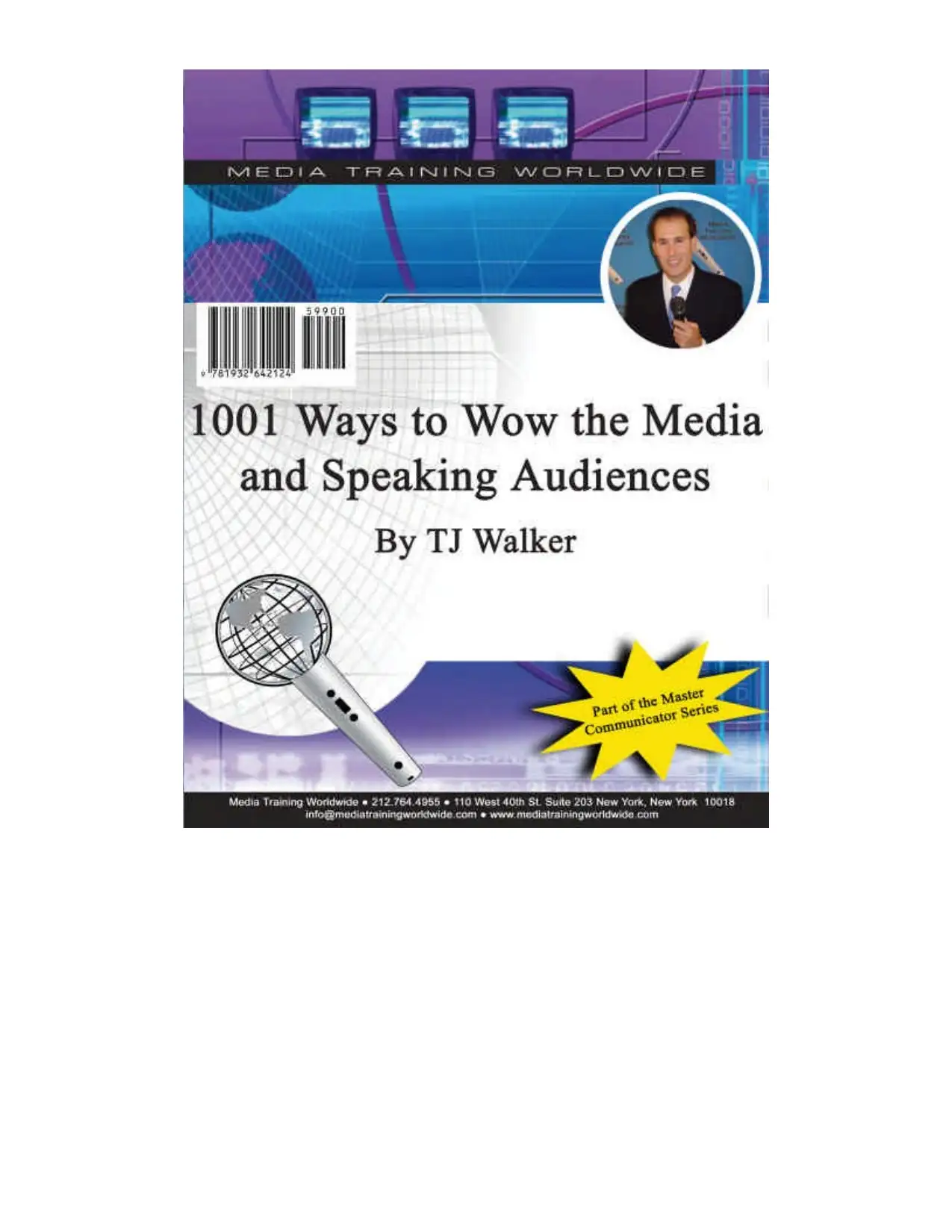
Secure Best Marks with AI Grader
Need help grading? Try our AI Grader for instant feedback on your assignments.
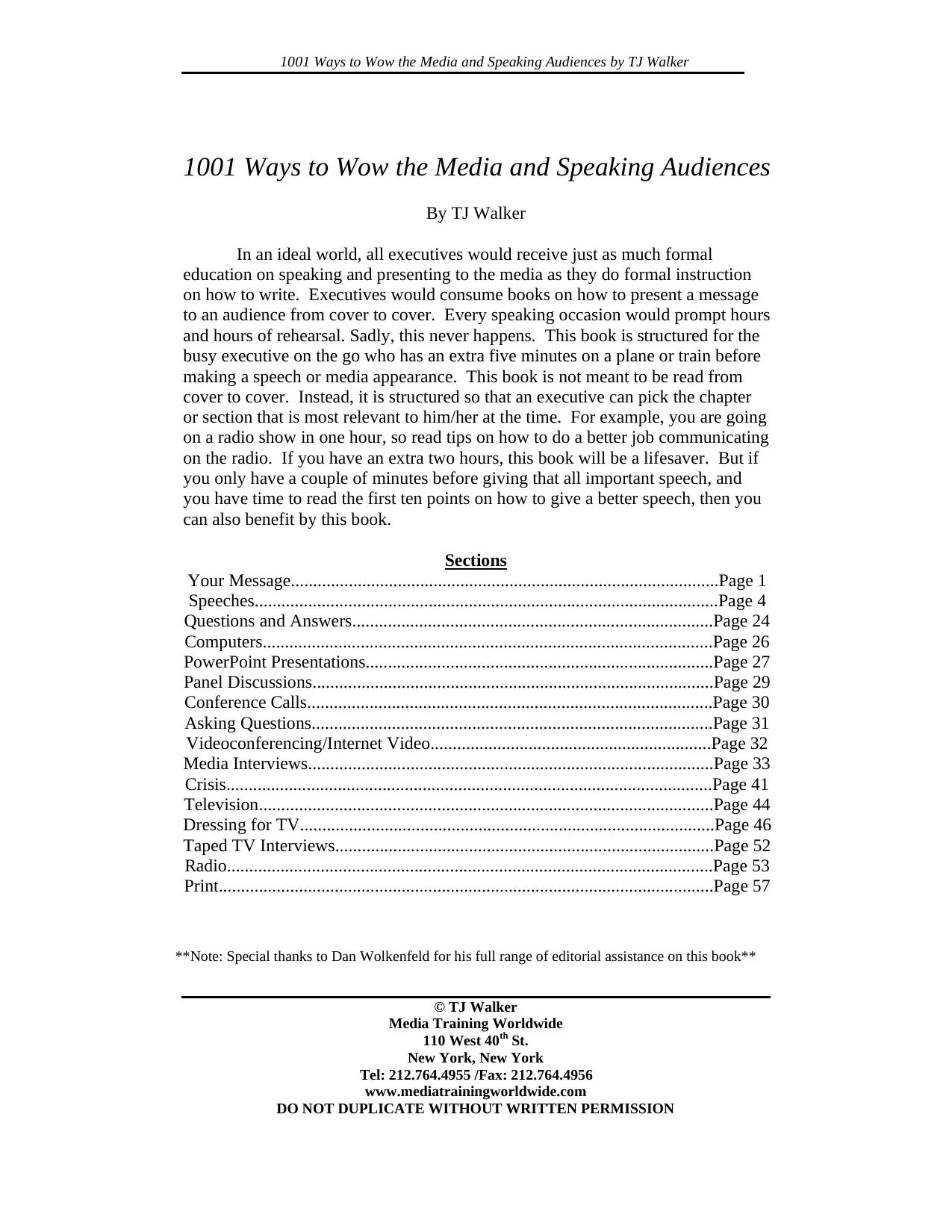
1001 Ways to Wow the Media and Speaking Audiences by TJ Walker
© TJ Walker
Media Training Worldwide
110 West 40th St.
New York, New York
Tel: 212.764.4955 /Fax: 212.764.4956
www.mediatrainingworldwide.com
DO NOT DUPLICATE WITHOUT WRITTEN PERMISSION
1001 Ways to Wow the Media and Speaking Audiences
By TJ Walker
In an ideal world, all executives would receive just as much formal
education on speaking and presenting to the media as they do formal instruction
on how to write. Executives would consume books on how to present a message
to an audience from cover to cover. Every speaking occasion would prompt hours
and hours of rehearsal. Sadly, this never happens. This book is structured for the
busy executive on the go who has an extra five minutes on a plane or train before
making a speech or media appearance. This book is not meant to be read from
cover to cover. Instead, it is structured so that an executive can pick the chapter
or section that is most relevant to him/her at the time. For example, you are going
on a radio show in one hour, so read tips on how to do a better job communicating
on the radio. If you have an extra two hours, this book will be a lifesaver. But if
you only have a couple of minutes before giving that all important speech, and
you have time to read the first ten points on how to give a better speech, then you
can also benefit by this book.
Sections
Your Message................................................................................................Page 1
Speeches........................................................................................................Page 4
Questions and Answers.................................................................................Page 24
Computers.....................................................................................................Page 26
PowerPoint Presentations..............................................................................Page 27
Panel Discussions..........................................................................................Page 29
Conference Calls...........................................................................................Page 30
Asking Questions..........................................................................................Page 31
Videoconferencing/Internet Video...............................................................Page 32
Media Interviews...........................................................................................Page 33
Crisis.............................................................................................................Page 41
Television......................................................................................................Page 44
Dressing for TV.............................................................................................Page 46
Taped TV Interviews.....................................................................................Page 52
Radio.............................................................................................................Page 53
Print...............................................................................................................Page 57
**Note: Special thanks to Dan Wolkenfeld for his full range of editorial assistance on this book**
© TJ Walker
Media Training Worldwide
110 West 40th St.
New York, New York
Tel: 212.764.4955 /Fax: 212.764.4956
www.mediatrainingworldwide.com
DO NOT DUPLICATE WITHOUT WRITTEN PERMISSION
1001 Ways to Wow the Media and Speaking Audiences
By TJ Walker
In an ideal world, all executives would receive just as much formal
education on speaking and presenting to the media as they do formal instruction
on how to write. Executives would consume books on how to present a message
to an audience from cover to cover. Every speaking occasion would prompt hours
and hours of rehearsal. Sadly, this never happens. This book is structured for the
busy executive on the go who has an extra five minutes on a plane or train before
making a speech or media appearance. This book is not meant to be read from
cover to cover. Instead, it is structured so that an executive can pick the chapter
or section that is most relevant to him/her at the time. For example, you are going
on a radio show in one hour, so read tips on how to do a better job communicating
on the radio. If you have an extra two hours, this book will be a lifesaver. But if
you only have a couple of minutes before giving that all important speech, and
you have time to read the first ten points on how to give a better speech, then you
can also benefit by this book.
Sections
Your Message................................................................................................Page 1
Speeches........................................................................................................Page 4
Questions and Answers.................................................................................Page 24
Computers.....................................................................................................Page 26
PowerPoint Presentations..............................................................................Page 27
Panel Discussions..........................................................................................Page 29
Conference Calls...........................................................................................Page 30
Asking Questions..........................................................................................Page 31
Videoconferencing/Internet Video...............................................................Page 32
Media Interviews...........................................................................................Page 33
Crisis.............................................................................................................Page 41
Television......................................................................................................Page 44
Dressing for TV.............................................................................................Page 46
Taped TV Interviews.....................................................................................Page 52
Radio.............................................................................................................Page 53
Print...............................................................................................................Page 57
**Note: Special thanks to Dan Wolkenfeld for his full range of editorial assistance on this book**
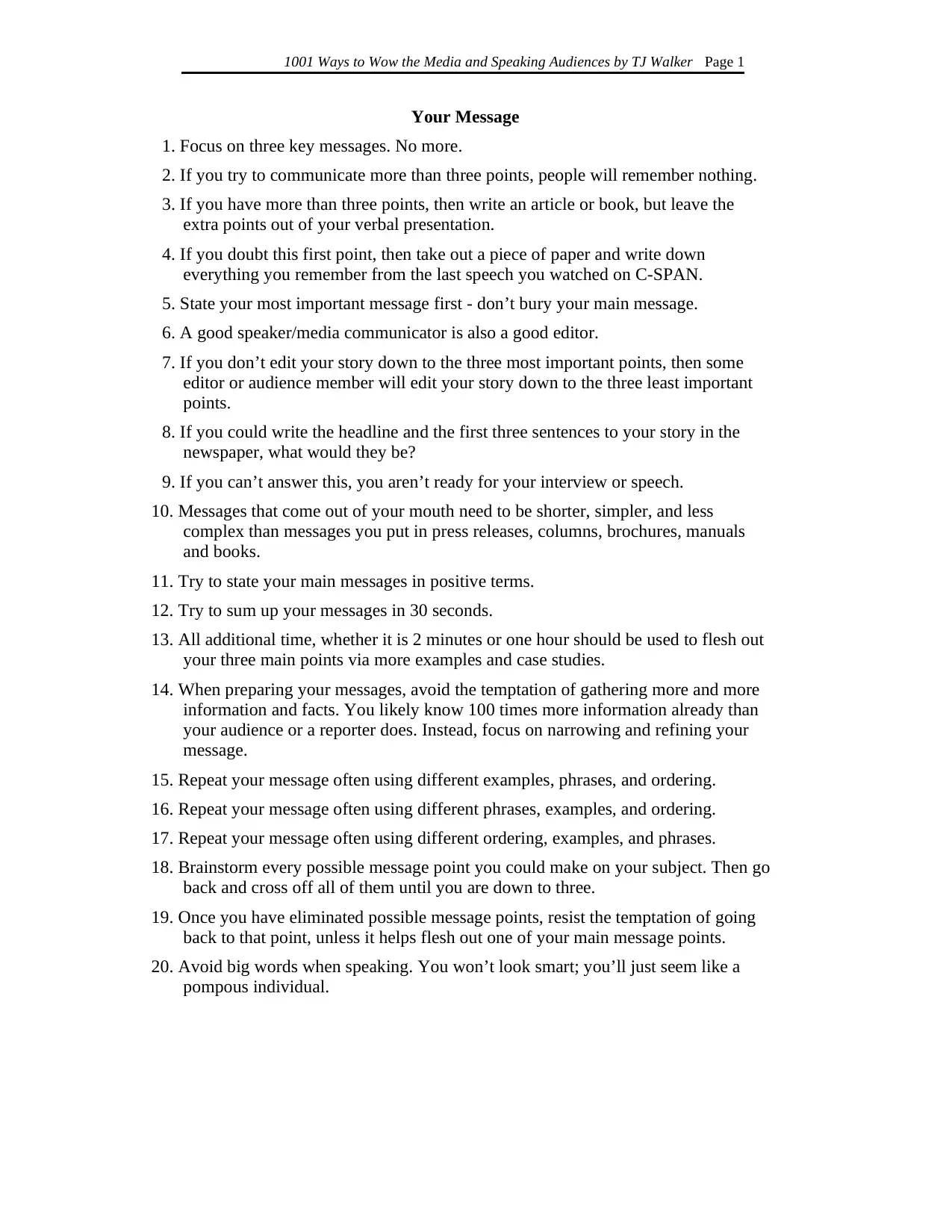
1001 Ways to Wow the Media and Speaking Audiences by TJ Walker Page 1
Your Message
1. Focus on three key messages. No more.
2. If you try to communicate more than three points, people will remember nothing.
3. If you have more than three points, then write an article or book, but leave the
extra points out of your verbal presentation.
4. If you doubt this first point, then take out a piece of paper and write down
everything you remember from the last speech you watched on C-SPAN.
5. State your most important message first - don’t bury your main message.
6. A good speaker/media communicator is also a good editor.
7. If you don’t edit your story down to the three most important points, then some
editor or audience member will edit your story down to the three least important
points.
8. If you could write the headline and the first three sentences to your story in the
newspaper, what would they be?
9. If you can’t answer this, you aren’t ready for your interview or speech.
10. Messages that come out of your mouth need to be shorter, simpler, and less
complex than messages you put in press releases, columns, brochures, manuals
and books.
11. Try to state your main messages in positive terms.
12. Try to sum up your messages in 30 seconds.
13. All additional time, whether it is 2 minutes or one hour should be used to flesh out
your three main points via more examples and case studies.
14. When preparing your messages, avoid the temptation of gathering more and more
information and facts. You likely know 100 times more information already than
your audience or a reporter does. Instead, focus on narrowing and refining your
message.
15. Repeat your message often using different examples, phrases, and ordering.
16. Repeat your message often using different phrases, examples, and ordering.
17. Repeat your message often using different ordering, examples, and phrases.
18. Brainstorm every possible message point you could make on your subject. Then go
back and cross off all of them until you are down to three.
19. Once you have eliminated possible message points, resist the temptation of going
back to that point, unless it helps flesh out one of your main message points.
20. Avoid big words when speaking. You won’t look smart; you’ll just seem like a
pompous individual.
Your Message
1. Focus on three key messages. No more.
2. If you try to communicate more than three points, people will remember nothing.
3. If you have more than three points, then write an article or book, but leave the
extra points out of your verbal presentation.
4. If you doubt this first point, then take out a piece of paper and write down
everything you remember from the last speech you watched on C-SPAN.
5. State your most important message first - don’t bury your main message.
6. A good speaker/media communicator is also a good editor.
7. If you don’t edit your story down to the three most important points, then some
editor or audience member will edit your story down to the three least important
points.
8. If you could write the headline and the first three sentences to your story in the
newspaper, what would they be?
9. If you can’t answer this, you aren’t ready for your interview or speech.
10. Messages that come out of your mouth need to be shorter, simpler, and less
complex than messages you put in press releases, columns, brochures, manuals
and books.
11. Try to state your main messages in positive terms.
12. Try to sum up your messages in 30 seconds.
13. All additional time, whether it is 2 minutes or one hour should be used to flesh out
your three main points via more examples and case studies.
14. When preparing your messages, avoid the temptation of gathering more and more
information and facts. You likely know 100 times more information already than
your audience or a reporter does. Instead, focus on narrowing and refining your
message.
15. Repeat your message often using different examples, phrases, and ordering.
16. Repeat your message often using different phrases, examples, and ordering.
17. Repeat your message often using different ordering, examples, and phrases.
18. Brainstorm every possible message point you could make on your subject. Then go
back and cross off all of them until you are down to three.
19. Once you have eliminated possible message points, resist the temptation of going
back to that point, unless it helps flesh out one of your main message points.
20. Avoid big words when speaking. You won’t look smart; you’ll just seem like a
pompous individual.
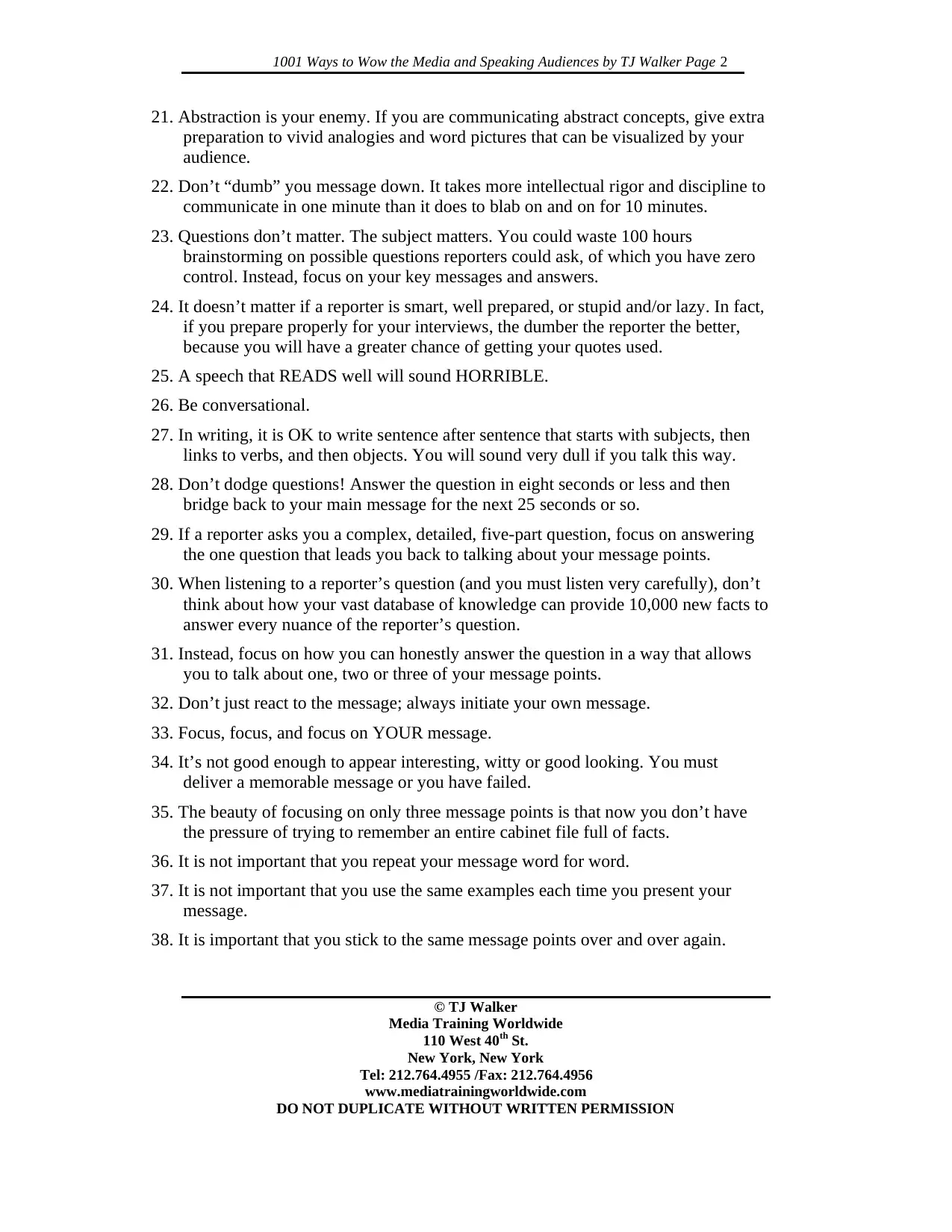
1001 Ways to Wow the Media and Speaking Audiences by TJ Walker Page 2
© TJ Walker
Media Training Worldwide
110 West 40th St.
New York, New York
Tel: 212.764.4955 /Fax: 212.764.4956
www.mediatrainingworldwide.com
DO NOT DUPLICATE WITHOUT WRITTEN PERMISSION
21. Abstraction is your enemy. If you are communicating abstract concepts, give extra
preparation to vivid analogies and word pictures that can be visualized by your
audience.
22. Don’t “dumb” you message down. It takes more intellectual rigor and discipline to
communicate in one minute than it does to blab on and on for 10 minutes.
23. Questions don’t matter. The subject matters. You could waste 100 hours
brainstorming on possible questions reporters could ask, of which you have zero
control. Instead, focus on your key messages and answers.
24. It doesn’t matter if a reporter is smart, well prepared, or stupid and/or lazy. In fact,
if you prepare properly for your interviews, the dumber the reporter the better,
because you will have a greater chance of getting your quotes used.
25. A speech that READS well will sound HORRIBLE.
26. Be conversational.
27. In writing, it is OK to write sentence after sentence that starts with subjects, then
links to verbs, and then objects. You will sound very dull if you talk this way.
28. Don’t dodge questions! Answer the question in eight seconds or less and then
bridge back to your main message for the next 25 seconds or so.
29. If a reporter asks you a complex, detailed, five-part question, focus on answering
the one question that leads you back to talking about your message points.
30. When listening to a reporter’s question (and you must listen very carefully), don’t
think about how your vast database of knowledge can provide 10,000 new facts to
answer every nuance of the reporter’s question.
31. Instead, focus on how you can honestly answer the question in a way that allows
you to talk about one, two or three of your message points.
32. Don’t just react to the message; always initiate your own message.
33. Focus, focus, and focus on YOUR message.
34. It’s not good enough to appear interesting, witty or good looking. You must
deliver a memorable message or you have failed.
35. The beauty of focusing on only three message points is that now you don’t have
the pressure of trying to remember an entire cabinet file full of facts.
36. It is not important that you repeat your message word for word.
37. It is not important that you use the same examples each time you present your
message.
38. It is important that you stick to the same message points over and over again.
© TJ Walker
Media Training Worldwide
110 West 40th St.
New York, New York
Tel: 212.764.4955 /Fax: 212.764.4956
www.mediatrainingworldwide.com
DO NOT DUPLICATE WITHOUT WRITTEN PERMISSION
21. Abstraction is your enemy. If you are communicating abstract concepts, give extra
preparation to vivid analogies and word pictures that can be visualized by your
audience.
22. Don’t “dumb” you message down. It takes more intellectual rigor and discipline to
communicate in one minute than it does to blab on and on for 10 minutes.
23. Questions don’t matter. The subject matters. You could waste 100 hours
brainstorming on possible questions reporters could ask, of which you have zero
control. Instead, focus on your key messages and answers.
24. It doesn’t matter if a reporter is smart, well prepared, or stupid and/or lazy. In fact,
if you prepare properly for your interviews, the dumber the reporter the better,
because you will have a greater chance of getting your quotes used.
25. A speech that READS well will sound HORRIBLE.
26. Be conversational.
27. In writing, it is OK to write sentence after sentence that starts with subjects, then
links to verbs, and then objects. You will sound very dull if you talk this way.
28. Don’t dodge questions! Answer the question in eight seconds or less and then
bridge back to your main message for the next 25 seconds or so.
29. If a reporter asks you a complex, detailed, five-part question, focus on answering
the one question that leads you back to talking about your message points.
30. When listening to a reporter’s question (and you must listen very carefully), don’t
think about how your vast database of knowledge can provide 10,000 new facts to
answer every nuance of the reporter’s question.
31. Instead, focus on how you can honestly answer the question in a way that allows
you to talk about one, two or three of your message points.
32. Don’t just react to the message; always initiate your own message.
33. Focus, focus, and focus on YOUR message.
34. It’s not good enough to appear interesting, witty or good looking. You must
deliver a memorable message or you have failed.
35. The beauty of focusing on only three message points is that now you don’t have
the pressure of trying to remember an entire cabinet file full of facts.
36. It is not important that you repeat your message word for word.
37. It is not important that you use the same examples each time you present your
message.
38. It is important that you stick to the same message points over and over again.
Secure Best Marks with AI Grader
Need help grading? Try our AI Grader for instant feedback on your assignments.
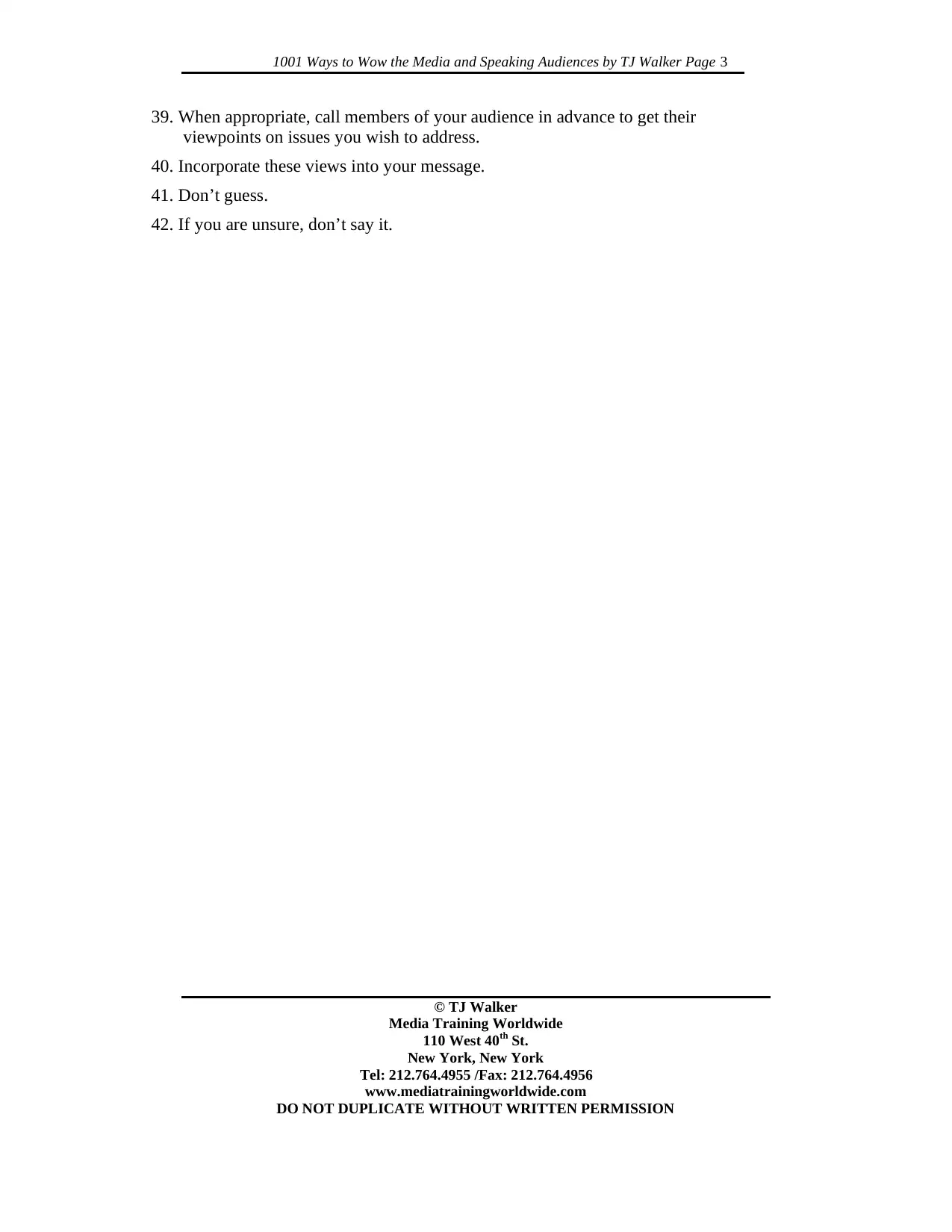
1001 Ways to Wow the Media and Speaking Audiences by TJ Walker Page 3
© TJ Walker
Media Training Worldwide
110 West 40th St.
New York, New York
Tel: 212.764.4955 /Fax: 212.764.4956
www.mediatrainingworldwide.com
DO NOT DUPLICATE WITHOUT WRITTEN PERMISSION
39. When appropriate, call members of your audience in advance to get their
viewpoints on issues you wish to address.
40. Incorporate these views into your message.
41. Don’t guess.
42. If you are unsure, don’t say it.
© TJ Walker
Media Training Worldwide
110 West 40th St.
New York, New York
Tel: 212.764.4955 /Fax: 212.764.4956
www.mediatrainingworldwide.com
DO NOT DUPLICATE WITHOUT WRITTEN PERMISSION
39. When appropriate, call members of your audience in advance to get their
viewpoints on issues you wish to address.
40. Incorporate these views into your message.
41. Don’t guess.
42. If you are unsure, don’t say it.
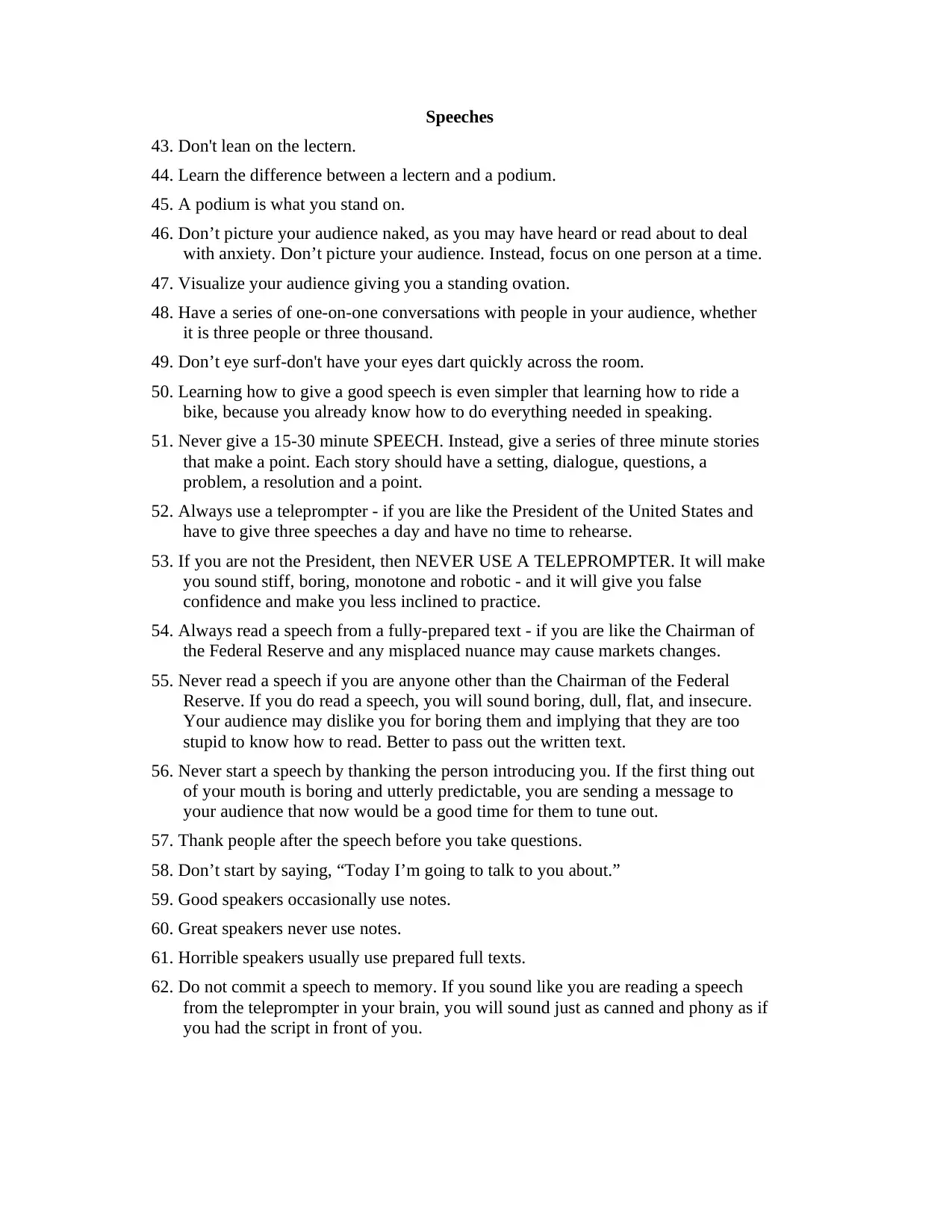
Speeches
43. Don't lean on the lectern.
44. Learn the difference between a lectern and a podium.
45. A podium is what you stand on.
46. Don’t picture your audience naked, as you may have heard or read about to deal
with anxiety. Don’t picture your audience. Instead, focus on one person at a time.
47. Visualize your audience giving you a standing ovation.
48. Have a series of one-on-one conversations with people in your audience, whether
it is three people or three thousand.
49. Don’t eye surf-don't have your eyes dart quickly across the room.
50. Learning how to give a good speech is even simpler that learning how to ride a
bike, because you already know how to do everything needed in speaking.
51. Never give a 15-30 minute SPEECH. Instead, give a series of three minute stories
that make a point. Each story should have a setting, dialogue, questions, a
problem, a resolution and a point.
52. Always use a teleprompter - if you are like the President of the United States and
have to give three speeches a day and have no time to rehearse.
53. If you are not the President, then NEVER USE A TELEPROMPTER. It will make
you sound stiff, boring, monotone and robotic - and it will give you false
confidence and make you less inclined to practice.
54. Always read a speech from a fully-prepared text - if you are like the Chairman of
the Federal Reserve and any misplaced nuance may cause markets changes.
55. Never read a speech if you are anyone other than the Chairman of the Federal
Reserve. If you do read a speech, you will sound boring, dull, flat, and insecure.
Your audience may dislike you for boring them and implying that they are too
stupid to know how to read. Better to pass out the written text.
56. Never start a speech by thanking the person introducing you. If the first thing out
of your mouth is boring and utterly predictable, you are sending a message to
your audience that now would be a good time for them to tune out.
57. Thank people after the speech before you take questions.
58. Don’t start by saying, “Today I’m going to talk to you about.”
59. Good speakers occasionally use notes.
60. Great speakers never use notes.
61. Horrible speakers usually use prepared full texts.
62. Do not commit a speech to memory. If you sound like you are reading a speech
from the teleprompter in your brain, you will sound just as canned and phony as if
you had the script in front of you.
43. Don't lean on the lectern.
44. Learn the difference between a lectern and a podium.
45. A podium is what you stand on.
46. Don’t picture your audience naked, as you may have heard or read about to deal
with anxiety. Don’t picture your audience. Instead, focus on one person at a time.
47. Visualize your audience giving you a standing ovation.
48. Have a series of one-on-one conversations with people in your audience, whether
it is three people or three thousand.
49. Don’t eye surf-don't have your eyes dart quickly across the room.
50. Learning how to give a good speech is even simpler that learning how to ride a
bike, because you already know how to do everything needed in speaking.
51. Never give a 15-30 minute SPEECH. Instead, give a series of three minute stories
that make a point. Each story should have a setting, dialogue, questions, a
problem, a resolution and a point.
52. Always use a teleprompter - if you are like the President of the United States and
have to give three speeches a day and have no time to rehearse.
53. If you are not the President, then NEVER USE A TELEPROMPTER. It will make
you sound stiff, boring, monotone and robotic - and it will give you false
confidence and make you less inclined to practice.
54. Always read a speech from a fully-prepared text - if you are like the Chairman of
the Federal Reserve and any misplaced nuance may cause markets changes.
55. Never read a speech if you are anyone other than the Chairman of the Federal
Reserve. If you do read a speech, you will sound boring, dull, flat, and insecure.
Your audience may dislike you for boring them and implying that they are too
stupid to know how to read. Better to pass out the written text.
56. Never start a speech by thanking the person introducing you. If the first thing out
of your mouth is boring and utterly predictable, you are sending a message to
your audience that now would be a good time for them to tune out.
57. Thank people after the speech before you take questions.
58. Don’t start by saying, “Today I’m going to talk to you about.”
59. Good speakers occasionally use notes.
60. Great speakers never use notes.
61. Horrible speakers usually use prepared full texts.
62. Do not commit a speech to memory. If you sound like you are reading a speech
from the teleprompter in your brain, you will sound just as canned and phony as if
you had the script in front of you.
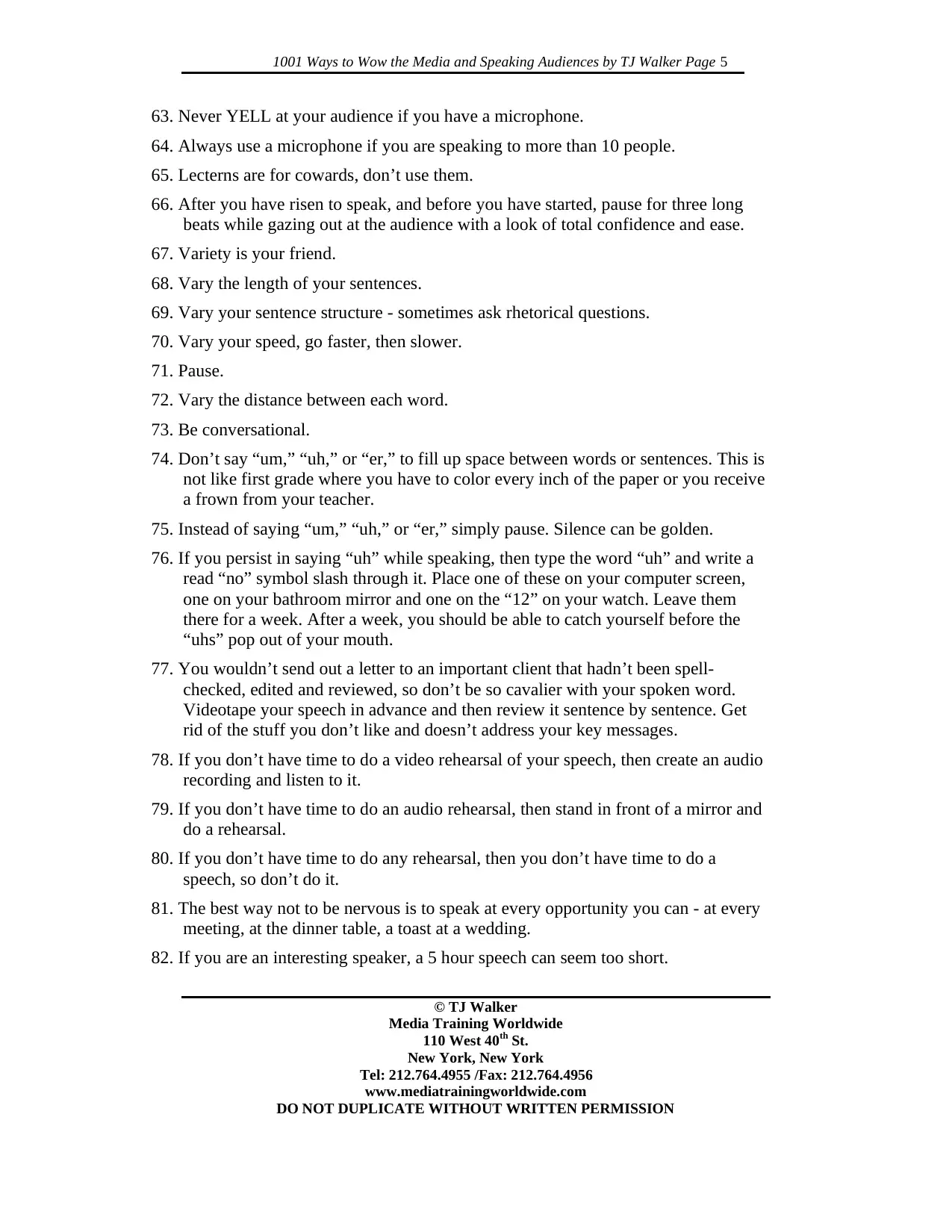
1001 Ways to Wow the Media and Speaking Audiences by TJ Walker Page 5
© TJ Walker
Media Training Worldwide
110 West 40th St.
New York, New York
Tel: 212.764.4955 /Fax: 212.764.4956
www.mediatrainingworldwide.com
DO NOT DUPLICATE WITHOUT WRITTEN PERMISSION
63. Never YELL at your audience if you have a microphone.
64. Always use a microphone if you are speaking to more than 10 people.
65. Lecterns are for cowards, don’t use them.
66. After you have risen to speak, and before you have started, pause for three long
beats while gazing out at the audience with a look of total confidence and ease.
67. Variety is your friend.
68. Vary the length of your sentences.
69. Vary your sentence structure - sometimes ask rhetorical questions.
70. Vary your speed, go faster, then slower.
71. Pause.
72. Vary the distance between each word.
73. Be conversational.
74. Don’t say “um,” “uh,” or “er,” to fill up space between words or sentences. This is
not like first grade where you have to color every inch of the paper or you receive
a frown from your teacher.
75. Instead of saying “um,” “uh,” or “er,” simply pause. Silence can be golden.
76. If you persist in saying “uh” while speaking, then type the word “uh” and write a
read “no” symbol slash through it. Place one of these on your computer screen,
one on your bathroom mirror and one on the “12” on your watch. Leave them
there for a week. After a week, you should be able to catch yourself before the
“uhs” pop out of your mouth.
77. You wouldn’t send out a letter to an important client that hadn’t been spell-
checked, edited and reviewed, so don’t be so cavalier with your spoken word.
Videotape your speech in advance and then review it sentence by sentence. Get
rid of the stuff you don’t like and doesn’t address your key messages.
78. If you don’t have time to do a video rehearsal of your speech, then create an audio
recording and listen to it.
79. If you don’t have time to do an audio rehearsal, then stand in front of a mirror and
do a rehearsal.
80. If you don’t have time to do any rehearsal, then you don’t have time to do a
speech, so don’t do it.
81. The best way not to be nervous is to speak at every opportunity you can - at every
meeting, at the dinner table, a toast at a wedding.
82. If you are an interesting speaker, a 5 hour speech can seem too short.
© TJ Walker
Media Training Worldwide
110 West 40th St.
New York, New York
Tel: 212.764.4955 /Fax: 212.764.4956
www.mediatrainingworldwide.com
DO NOT DUPLICATE WITHOUT WRITTEN PERMISSION
63. Never YELL at your audience if you have a microphone.
64. Always use a microphone if you are speaking to more than 10 people.
65. Lecterns are for cowards, don’t use them.
66. After you have risen to speak, and before you have started, pause for three long
beats while gazing out at the audience with a look of total confidence and ease.
67. Variety is your friend.
68. Vary the length of your sentences.
69. Vary your sentence structure - sometimes ask rhetorical questions.
70. Vary your speed, go faster, then slower.
71. Pause.
72. Vary the distance between each word.
73. Be conversational.
74. Don’t say “um,” “uh,” or “er,” to fill up space between words or sentences. This is
not like first grade where you have to color every inch of the paper or you receive
a frown from your teacher.
75. Instead of saying “um,” “uh,” or “er,” simply pause. Silence can be golden.
76. If you persist in saying “uh” while speaking, then type the word “uh” and write a
read “no” symbol slash through it. Place one of these on your computer screen,
one on your bathroom mirror and one on the “12” on your watch. Leave them
there for a week. After a week, you should be able to catch yourself before the
“uhs” pop out of your mouth.
77. You wouldn’t send out a letter to an important client that hadn’t been spell-
checked, edited and reviewed, so don’t be so cavalier with your spoken word.
Videotape your speech in advance and then review it sentence by sentence. Get
rid of the stuff you don’t like and doesn’t address your key messages.
78. If you don’t have time to do a video rehearsal of your speech, then create an audio
recording and listen to it.
79. If you don’t have time to do an audio rehearsal, then stand in front of a mirror and
do a rehearsal.
80. If you don’t have time to do any rehearsal, then you don’t have time to do a
speech, so don’t do it.
81. The best way not to be nervous is to speak at every opportunity you can - at every
meeting, at the dinner table, a toast at a wedding.
82. If you are an interesting speaker, a 5 hour speech can seem too short.
Paraphrase This Document
Need a fresh take? Get an instant paraphrase of this document with our AI Paraphraser
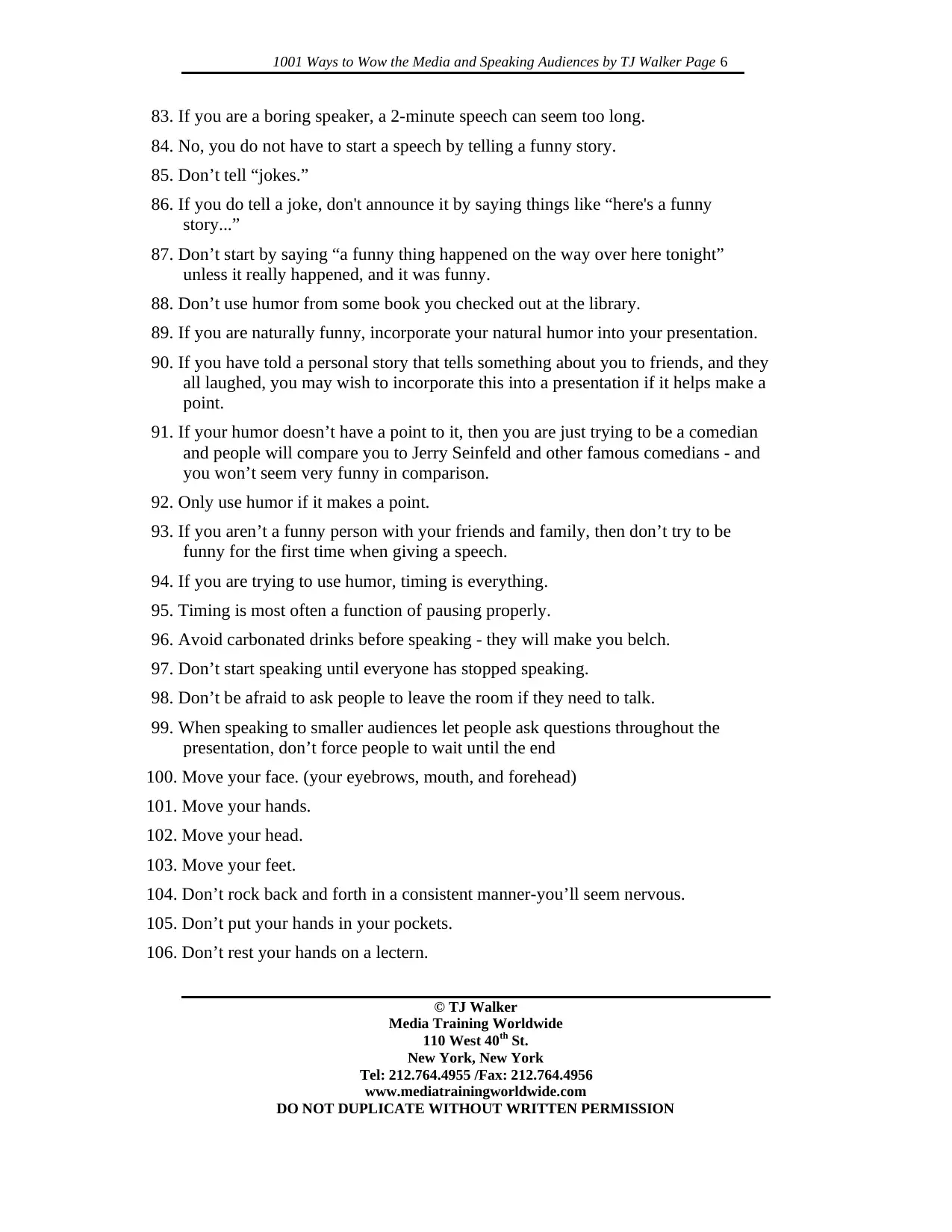
1001 Ways to Wow the Media and Speaking Audiences by TJ Walker Page 6
© TJ Walker
Media Training Worldwide
110 West 40th St.
New York, New York
Tel: 212.764.4955 /Fax: 212.764.4956
www.mediatrainingworldwide.com
DO NOT DUPLICATE WITHOUT WRITTEN PERMISSION
83. If you are a boring speaker, a 2-minute speech can seem too long.
84. No, you do not have to start a speech by telling a funny story.
85. Don’t tell “jokes.”
86. If you do tell a joke, don't announce it by saying things like “here's a funny
story...”
87. Don’t start by saying “a funny thing happened on the way over here tonight”
unless it really happened, and it was funny.
88. Don’t use humor from some book you checked out at the library.
89. If you are naturally funny, incorporate your natural humor into your presentation.
90. If you have told a personal story that tells something about you to friends, and they
all laughed, you may wish to incorporate this into a presentation if it helps make a
point.
91. If your humor doesn’t have a point to it, then you are just trying to be a comedian
and people will compare you to Jerry Seinfeld and other famous comedians - and
you won’t seem very funny in comparison.
92. Only use humor if it makes a point.
93. If you aren’t a funny person with your friends and family, then don’t try to be
funny for the first time when giving a speech.
94. If you are trying to use humor, timing is everything.
95. Timing is most often a function of pausing properly.
96. Avoid carbonated drinks before speaking - they will make you belch.
97. Don’t start speaking until everyone has stopped speaking.
98. Don’t be afraid to ask people to leave the room if they need to talk.
99. When speaking to smaller audiences let people ask questions throughout the
presentation, don’t force people to wait until the end
100. Move your face. (your eyebrows, mouth, and forehead)
101. Move your hands.
102. Move your head.
103. Move your feet.
104. Don’t rock back and forth in a consistent manner-you’ll seem nervous.
105. Don’t put your hands in your pockets.
106. Don’t rest your hands on a lectern.
© TJ Walker
Media Training Worldwide
110 West 40th St.
New York, New York
Tel: 212.764.4955 /Fax: 212.764.4956
www.mediatrainingworldwide.com
DO NOT DUPLICATE WITHOUT WRITTEN PERMISSION
83. If you are a boring speaker, a 2-minute speech can seem too long.
84. No, you do not have to start a speech by telling a funny story.
85. Don’t tell “jokes.”
86. If you do tell a joke, don't announce it by saying things like “here's a funny
story...”
87. Don’t start by saying “a funny thing happened on the way over here tonight”
unless it really happened, and it was funny.
88. Don’t use humor from some book you checked out at the library.
89. If you are naturally funny, incorporate your natural humor into your presentation.
90. If you have told a personal story that tells something about you to friends, and they
all laughed, you may wish to incorporate this into a presentation if it helps make a
point.
91. If your humor doesn’t have a point to it, then you are just trying to be a comedian
and people will compare you to Jerry Seinfeld and other famous comedians - and
you won’t seem very funny in comparison.
92. Only use humor if it makes a point.
93. If you aren’t a funny person with your friends and family, then don’t try to be
funny for the first time when giving a speech.
94. If you are trying to use humor, timing is everything.
95. Timing is most often a function of pausing properly.
96. Avoid carbonated drinks before speaking - they will make you belch.
97. Don’t start speaking until everyone has stopped speaking.
98. Don’t be afraid to ask people to leave the room if they need to talk.
99. When speaking to smaller audiences let people ask questions throughout the
presentation, don’t force people to wait until the end
100. Move your face. (your eyebrows, mouth, and forehead)
101. Move your hands.
102. Move your head.
103. Move your feet.
104. Don’t rock back and forth in a consistent manner-you’ll seem nervous.
105. Don’t put your hands in your pockets.
106. Don’t rest your hands on a lectern.
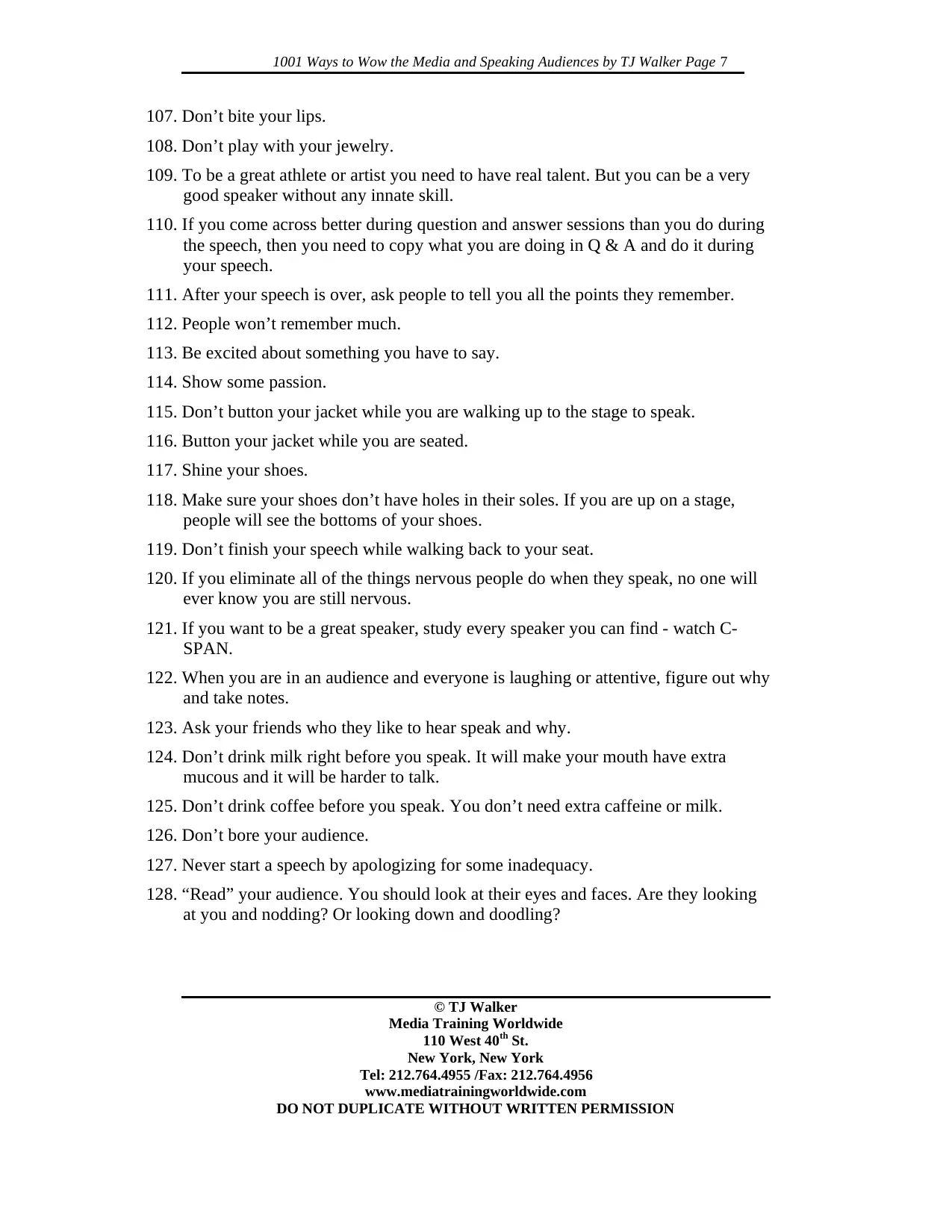
1001 Ways to Wow the Media and Speaking Audiences by TJ Walker Page 7
© TJ Walker
Media Training Worldwide
110 West 40th St.
New York, New York
Tel: 212.764.4955 /Fax: 212.764.4956
www.mediatrainingworldwide.com
DO NOT DUPLICATE WITHOUT WRITTEN PERMISSION
107. Don’t bite your lips.
108. Don’t play with your jewelry.
109. To be a great athlete or artist you need to have real talent. But you can be a very
good speaker without any innate skill.
110. If you come across better during question and answer sessions than you do during
the speech, then you need to copy what you are doing in Q & A and do it during
your speech.
111. After your speech is over, ask people to tell you all the points they remember.
112. People won’t remember much.
113. Be excited about something you have to say.
114. Show some passion.
115. Don’t button your jacket while you are walking up to the stage to speak.
116. Button your jacket while you are seated.
117. Shine your shoes.
118. Make sure your shoes don’t have holes in their soles. If you are up on a stage,
people will see the bottoms of your shoes.
119. Don’t finish your speech while walking back to your seat.
120. If you eliminate all of the things nervous people do when they speak, no one will
ever know you are still nervous.
121. If you want to be a great speaker, study every speaker you can find - watch C-
SPAN.
122. When you are in an audience and everyone is laughing or attentive, figure out why
and take notes.
123. Ask your friends who they like to hear speak and why.
124. Don’t drink milk right before you speak. It will make your mouth have extra
mucous and it will be harder to talk.
125. Don’t drink coffee before you speak. You don’t need extra caffeine or milk.
126. Don’t bore your audience.
127. Never start a speech by apologizing for some inadequacy.
128. “Read” your audience. You should look at their eyes and faces. Are they looking
at you and nodding? Or looking down and doodling?
© TJ Walker
Media Training Worldwide
110 West 40th St.
New York, New York
Tel: 212.764.4955 /Fax: 212.764.4956
www.mediatrainingworldwide.com
DO NOT DUPLICATE WITHOUT WRITTEN PERMISSION
107. Don’t bite your lips.
108. Don’t play with your jewelry.
109. To be a great athlete or artist you need to have real talent. But you can be a very
good speaker without any innate skill.
110. If you come across better during question and answer sessions than you do during
the speech, then you need to copy what you are doing in Q & A and do it during
your speech.
111. After your speech is over, ask people to tell you all the points they remember.
112. People won’t remember much.
113. Be excited about something you have to say.
114. Show some passion.
115. Don’t button your jacket while you are walking up to the stage to speak.
116. Button your jacket while you are seated.
117. Shine your shoes.
118. Make sure your shoes don’t have holes in their soles. If you are up on a stage,
people will see the bottoms of your shoes.
119. Don’t finish your speech while walking back to your seat.
120. If you eliminate all of the things nervous people do when they speak, no one will
ever know you are still nervous.
121. If you want to be a great speaker, study every speaker you can find - watch C-
SPAN.
122. When you are in an audience and everyone is laughing or attentive, figure out why
and take notes.
123. Ask your friends who they like to hear speak and why.
124. Don’t drink milk right before you speak. It will make your mouth have extra
mucous and it will be harder to talk.
125. Don’t drink coffee before you speak. You don’t need extra caffeine or milk.
126. Don’t bore your audience.
127. Never start a speech by apologizing for some inadequacy.
128. “Read” your audience. You should look at their eyes and faces. Are they looking
at you and nodding? Or looking down and doodling?
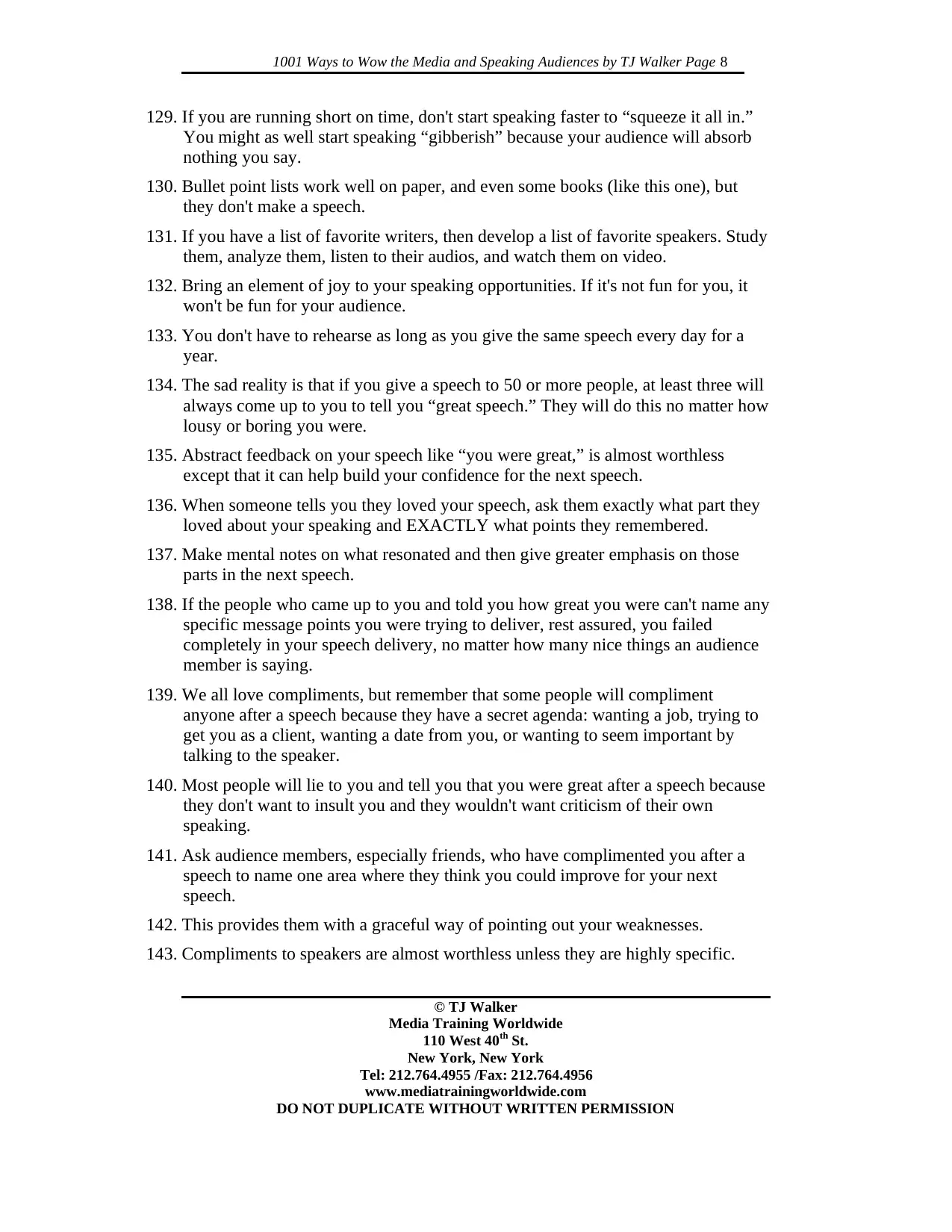
1001 Ways to Wow the Media and Speaking Audiences by TJ Walker Page 8
© TJ Walker
Media Training Worldwide
110 West 40th St.
New York, New York
Tel: 212.764.4955 /Fax: 212.764.4956
www.mediatrainingworldwide.com
DO NOT DUPLICATE WITHOUT WRITTEN PERMISSION
129. If you are running short on time, don't start speaking faster to “squeeze it all in.”
You might as well start speaking “gibberish” because your audience will absorb
nothing you say.
130. Bullet point lists work well on paper, and even some books (like this one), but
they don't make a speech.
131. If you have a list of favorite writers, then develop a list of favorite speakers. Study
them, analyze them, listen to their audios, and watch them on video.
132. Bring an element of joy to your speaking opportunities. If it's not fun for you, it
won't be fun for your audience.
133. You don't have to rehearse as long as you give the same speech every day for a
year.
134. The sad reality is that if you give a speech to 50 or more people, at least three will
always come up to you to tell you “great speech.” They will do this no matter how
lousy or boring you were.
135. Abstract feedback on your speech like “you were great,” is almost worthless
except that it can help build your confidence for the next speech.
136. When someone tells you they loved your speech, ask them exactly what part they
loved about your speaking and EXACTLY what points they remembered.
137. Make mental notes on what resonated and then give greater emphasis on those
parts in the next speech.
138. If the people who came up to you and told you how great you were can't name any
specific message points you were trying to deliver, rest assured, you failed
completely in your speech delivery, no matter how many nice things an audience
member is saying.
139. We all love compliments, but remember that some people will compliment
anyone after a speech because they have a secret agenda: wanting a job, trying to
get you as a client, wanting a date from you, or wanting to seem important by
talking to the speaker.
140. Most people will lie to you and tell you that you were great after a speech because
they don't want to insult you and they wouldn't want criticism of their own
speaking.
141. Ask audience members, especially friends, who have complimented you after a
speech to name one area where they think you could improve for your next
speech.
142. This provides them with a graceful way of pointing out your weaknesses.
143. Compliments to speakers are almost worthless unless they are highly specific.
© TJ Walker
Media Training Worldwide
110 West 40th St.
New York, New York
Tel: 212.764.4955 /Fax: 212.764.4956
www.mediatrainingworldwide.com
DO NOT DUPLICATE WITHOUT WRITTEN PERMISSION
129. If you are running short on time, don't start speaking faster to “squeeze it all in.”
You might as well start speaking “gibberish” because your audience will absorb
nothing you say.
130. Bullet point lists work well on paper, and even some books (like this one), but
they don't make a speech.
131. If you have a list of favorite writers, then develop a list of favorite speakers. Study
them, analyze them, listen to their audios, and watch them on video.
132. Bring an element of joy to your speaking opportunities. If it's not fun for you, it
won't be fun for your audience.
133. You don't have to rehearse as long as you give the same speech every day for a
year.
134. The sad reality is that if you give a speech to 50 or more people, at least three will
always come up to you to tell you “great speech.” They will do this no matter how
lousy or boring you were.
135. Abstract feedback on your speech like “you were great,” is almost worthless
except that it can help build your confidence for the next speech.
136. When someone tells you they loved your speech, ask them exactly what part they
loved about your speaking and EXACTLY what points they remembered.
137. Make mental notes on what resonated and then give greater emphasis on those
parts in the next speech.
138. If the people who came up to you and told you how great you were can't name any
specific message points you were trying to deliver, rest assured, you failed
completely in your speech delivery, no matter how many nice things an audience
member is saying.
139. We all love compliments, but remember that some people will compliment
anyone after a speech because they have a secret agenda: wanting a job, trying to
get you as a client, wanting a date from you, or wanting to seem important by
talking to the speaker.
140. Most people will lie to you and tell you that you were great after a speech because
they don't want to insult you and they wouldn't want criticism of their own
speaking.
141. Ask audience members, especially friends, who have complimented you after a
speech to name one area where they think you could improve for your next
speech.
142. This provides them with a graceful way of pointing out your weaknesses.
143. Compliments to speakers are almost worthless unless they are highly specific.
Secure Best Marks with AI Grader
Need help grading? Try our AI Grader for instant feedback on your assignments.
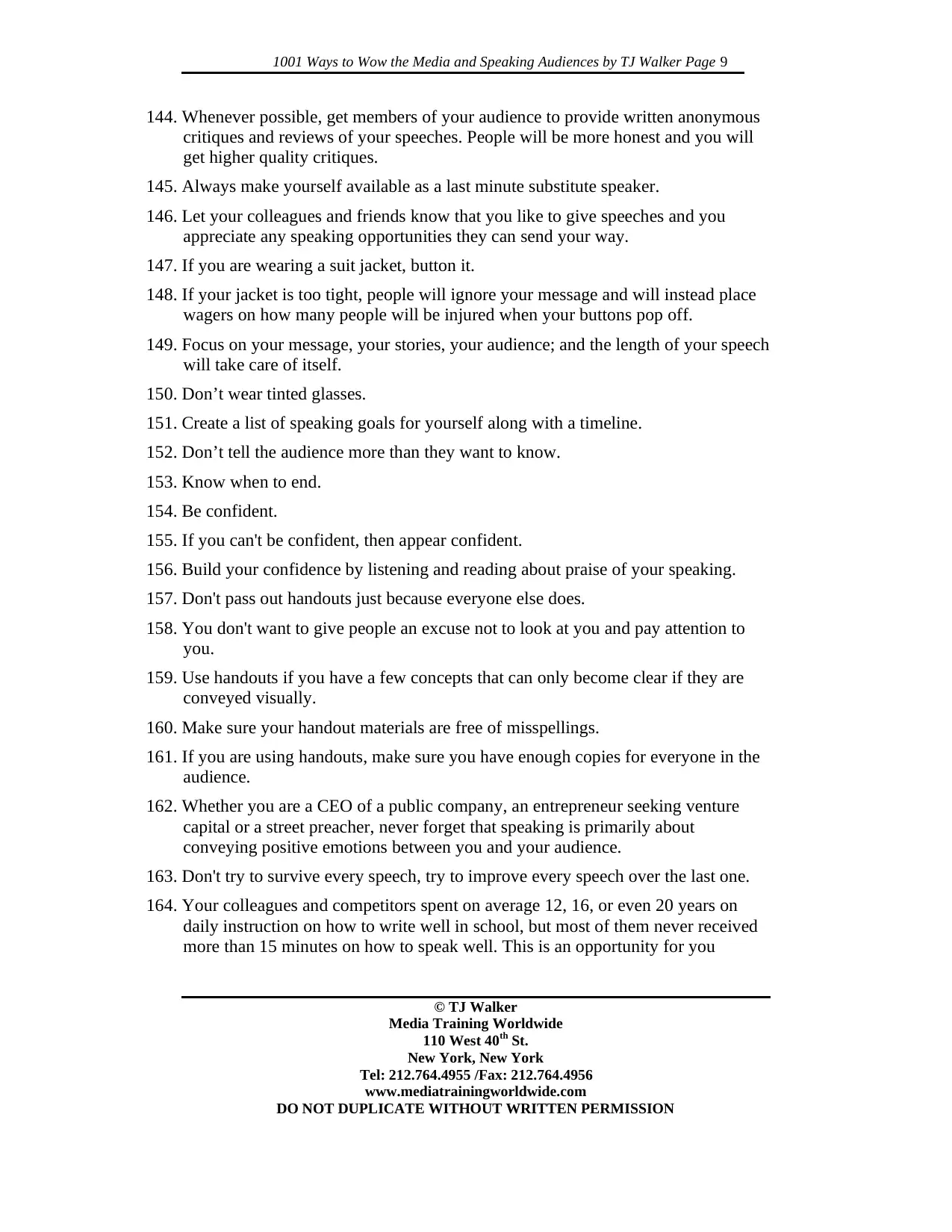
1001 Ways to Wow the Media and Speaking Audiences by TJ Walker Page 9
© TJ Walker
Media Training Worldwide
110 West 40th St.
New York, New York
Tel: 212.764.4955 /Fax: 212.764.4956
www.mediatrainingworldwide.com
DO NOT DUPLICATE WITHOUT WRITTEN PERMISSION
144. Whenever possible, get members of your audience to provide written anonymous
critiques and reviews of your speeches. People will be more honest and you will
get higher quality critiques.
145. Always make yourself available as a last minute substitute speaker.
146. Let your colleagues and friends know that you like to give speeches and you
appreciate any speaking opportunities they can send your way.
147. If you are wearing a suit jacket, button it.
148. If your jacket is too tight, people will ignore your message and will instead place
wagers on how many people will be injured when your buttons pop off.
149. Focus on your message, your stories, your audience; and the length of your speech
will take care of itself.
150. Don’t wear tinted glasses.
151. Create a list of speaking goals for yourself along with a timeline.
152. Don’t tell the audience more than they want to know.
153. Know when to end.
154. Be confident.
155. If you can't be confident, then appear confident.
156. Build your confidence by listening and reading about praise of your speaking.
157. Don't pass out handouts just because everyone else does.
158. You don't want to give people an excuse not to look at you and pay attention to
you.
159. Use handouts if you have a few concepts that can only become clear if they are
conveyed visually.
160. Make sure your handout materials are free of misspellings.
161. If you are using handouts, make sure you have enough copies for everyone in the
audience.
162. Whether you are a CEO of a public company, an entrepreneur seeking venture
capital or a street preacher, never forget that speaking is primarily about
conveying positive emotions between you and your audience.
163. Don't try to survive every speech, try to improve every speech over the last one.
164. Your colleagues and competitors spent on average 12, 16, or even 20 years on
daily instruction on how to write well in school, but most of them never received
more than 15 minutes on how to speak well. This is an opportunity for you
© TJ Walker
Media Training Worldwide
110 West 40th St.
New York, New York
Tel: 212.764.4955 /Fax: 212.764.4956
www.mediatrainingworldwide.com
DO NOT DUPLICATE WITHOUT WRITTEN PERMISSION
144. Whenever possible, get members of your audience to provide written anonymous
critiques and reviews of your speeches. People will be more honest and you will
get higher quality critiques.
145. Always make yourself available as a last minute substitute speaker.
146. Let your colleagues and friends know that you like to give speeches and you
appreciate any speaking opportunities they can send your way.
147. If you are wearing a suit jacket, button it.
148. If your jacket is too tight, people will ignore your message and will instead place
wagers on how many people will be injured when your buttons pop off.
149. Focus on your message, your stories, your audience; and the length of your speech
will take care of itself.
150. Don’t wear tinted glasses.
151. Create a list of speaking goals for yourself along with a timeline.
152. Don’t tell the audience more than they want to know.
153. Know when to end.
154. Be confident.
155. If you can't be confident, then appear confident.
156. Build your confidence by listening and reading about praise of your speaking.
157. Don't pass out handouts just because everyone else does.
158. You don't want to give people an excuse not to look at you and pay attention to
you.
159. Use handouts if you have a few concepts that can only become clear if they are
conveyed visually.
160. Make sure your handout materials are free of misspellings.
161. If you are using handouts, make sure you have enough copies for everyone in the
audience.
162. Whether you are a CEO of a public company, an entrepreneur seeking venture
capital or a street preacher, never forget that speaking is primarily about
conveying positive emotions between you and your audience.
163. Don't try to survive every speech, try to improve every speech over the last one.
164. Your colleagues and competitors spent on average 12, 16, or even 20 years on
daily instruction on how to write well in school, but most of them never received
more than 15 minutes on how to speak well. This is an opportunity for you
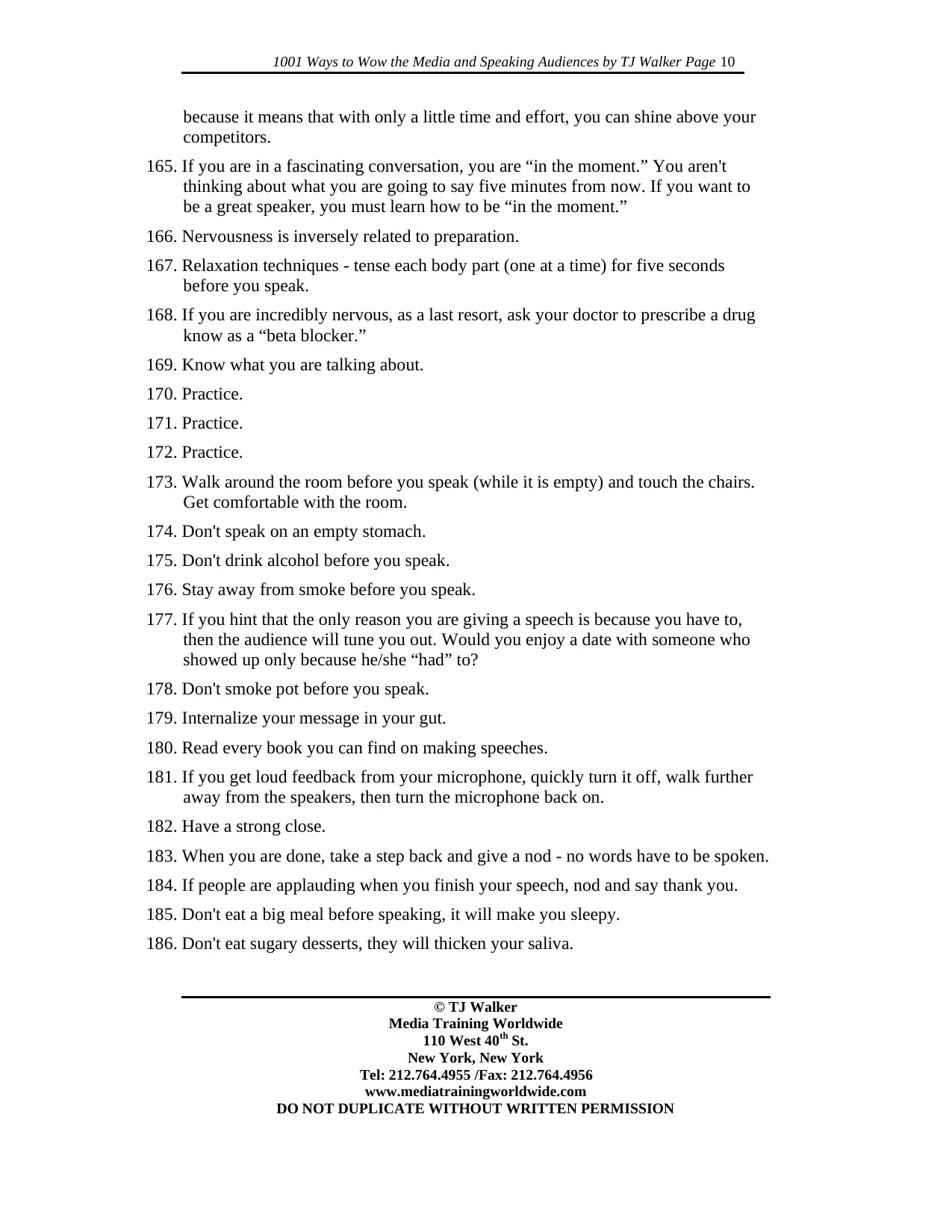
1001 Ways to Wow the Media and Speaking Audiences by TJ Walker Page 10
© TJ Walker
Media Training Worldwide
110 West 40th St.
New York, New York
Tel: 212.764.4955 /Fax: 212.764.4956
www.mediatrainingworldwide.com
DO NOT DUPLICATE WITHOUT WRITTEN PERMISSION
because it means that with only a little time and effort, you can shine above your
competitors.
165. If you are in a fascinating conversation, you are “in the moment.” You aren't
thinking about what you are going to say five minutes from now. If you want to
be a great speaker, you must learn how to be “in the moment.”
166. Nervousness is inversely related to preparation.
167. Relaxation techniques - tense each body part (one at a time) for five seconds
before you speak.
168. If you are incredibly nervous, as a last resort, ask your doctor to prescribe a drug
know as a “beta blocker.”
169. Know what you are talking about.
170. Practice.
171. Practice.
172. Practice.
173. Walk around the room before you speak (while it is empty) and touch the chairs.
Get comfortable with the room.
174. Don't speak on an empty stomach.
175. Don't drink alcohol before you speak.
176. Stay away from smoke before you speak.
177. If you hint that the only reason you are giving a speech is because you have to,
then the audience will tune you out. Would you enjoy a date with someone who
showed up only because he/she “had” to?
178. Don't smoke pot before you speak.
179. Internalize your message in your gut.
180. Read every book you can find on making speeches.
181. If you get loud feedback from your microphone, quickly turn it off, walk further
away from the speakers, then turn the microphone back on.
182. Have a strong close.
183. When you are done, take a step back and give a nod - no words have to be spoken.
184. If people are applauding when you finish your speech, nod and say thank you.
185. Don't eat a big meal before speaking, it will make you sleepy.
186. Don't eat sugary desserts, they will thicken your saliva.
© TJ Walker
Media Training Worldwide
110 West 40th St.
New York, New York
Tel: 212.764.4955 /Fax: 212.764.4956
www.mediatrainingworldwide.com
DO NOT DUPLICATE WITHOUT WRITTEN PERMISSION
because it means that with only a little time and effort, you can shine above your
competitors.
165. If you are in a fascinating conversation, you are “in the moment.” You aren't
thinking about what you are going to say five minutes from now. If you want to
be a great speaker, you must learn how to be “in the moment.”
166. Nervousness is inversely related to preparation.
167. Relaxation techniques - tense each body part (one at a time) for five seconds
before you speak.
168. If you are incredibly nervous, as a last resort, ask your doctor to prescribe a drug
know as a “beta blocker.”
169. Know what you are talking about.
170. Practice.
171. Practice.
172. Practice.
173. Walk around the room before you speak (while it is empty) and touch the chairs.
Get comfortable with the room.
174. Don't speak on an empty stomach.
175. Don't drink alcohol before you speak.
176. Stay away from smoke before you speak.
177. If you hint that the only reason you are giving a speech is because you have to,
then the audience will tune you out. Would you enjoy a date with someone who
showed up only because he/she “had” to?
178. Don't smoke pot before you speak.
179. Internalize your message in your gut.
180. Read every book you can find on making speeches.
181. If you get loud feedback from your microphone, quickly turn it off, walk further
away from the speakers, then turn the microphone back on.
182. Have a strong close.
183. When you are done, take a step back and give a nod - no words have to be spoken.
184. If people are applauding when you finish your speech, nod and say thank you.
185. Don't eat a big meal before speaking, it will make you sleepy.
186. Don't eat sugary desserts, they will thicken your saliva.
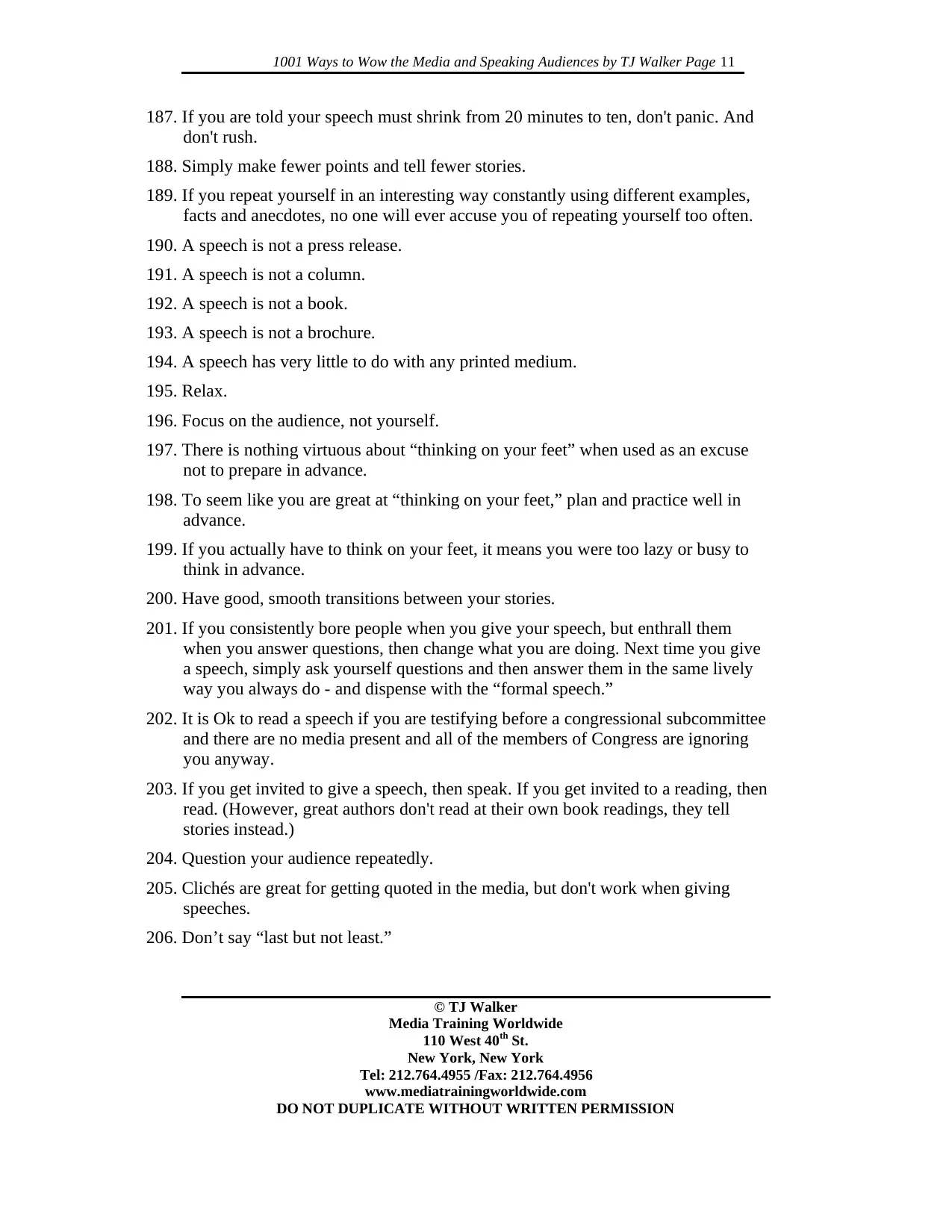
1001 Ways to Wow the Media and Speaking Audiences by TJ Walker Page 11
© TJ Walker
Media Training Worldwide
110 West 40th St.
New York, New York
Tel: 212.764.4955 /Fax: 212.764.4956
www.mediatrainingworldwide.com
DO NOT DUPLICATE WITHOUT WRITTEN PERMISSION
187. If you are told your speech must shrink from 20 minutes to ten, don't panic. And
don't rush.
188. Simply make fewer points and tell fewer stories.
189. If you repeat yourself in an interesting way constantly using different examples,
facts and anecdotes, no one will ever accuse you of repeating yourself too often.
190. A speech is not a press release.
191. A speech is not a column.
192. A speech is not a book.
193. A speech is not a brochure.
194. A speech has very little to do with any printed medium.
195. Relax.
196. Focus on the audience, not yourself.
197. There is nothing virtuous about “thinking on your feet” when used as an excuse
not to prepare in advance.
198. To seem like you are great at “thinking on your feet,” plan and practice well in
advance.
199. If you actually have to think on your feet, it means you were too lazy or busy to
think in advance.
200. Have good, smooth transitions between your stories.
201. If you consistently bore people when you give your speech, but enthrall them
when you answer questions, then change what you are doing. Next time you give
a speech, simply ask yourself questions and then answer them in the same lively
way you always do - and dispense with the “formal speech.”
202. It is Ok to read a speech if you are testifying before a congressional subcommittee
and there are no media present and all of the members of Congress are ignoring
you anyway.
203. If you get invited to give a speech, then speak. If you get invited to a reading, then
read. (However, great authors don't read at their own book readings, they tell
stories instead.)
204. Question your audience repeatedly.
205. Clichés are great for getting quoted in the media, but don't work when giving
speeches.
206. Don’t say “last but not least.”
© TJ Walker
Media Training Worldwide
110 West 40th St.
New York, New York
Tel: 212.764.4955 /Fax: 212.764.4956
www.mediatrainingworldwide.com
DO NOT DUPLICATE WITHOUT WRITTEN PERMISSION
187. If you are told your speech must shrink from 20 minutes to ten, don't panic. And
don't rush.
188. Simply make fewer points and tell fewer stories.
189. If you repeat yourself in an interesting way constantly using different examples,
facts and anecdotes, no one will ever accuse you of repeating yourself too often.
190. A speech is not a press release.
191. A speech is not a column.
192. A speech is not a book.
193. A speech is not a brochure.
194. A speech has very little to do with any printed medium.
195. Relax.
196. Focus on the audience, not yourself.
197. There is nothing virtuous about “thinking on your feet” when used as an excuse
not to prepare in advance.
198. To seem like you are great at “thinking on your feet,” plan and practice well in
advance.
199. If you actually have to think on your feet, it means you were too lazy or busy to
think in advance.
200. Have good, smooth transitions between your stories.
201. If you consistently bore people when you give your speech, but enthrall them
when you answer questions, then change what you are doing. Next time you give
a speech, simply ask yourself questions and then answer them in the same lively
way you always do - and dispense with the “formal speech.”
202. It is Ok to read a speech if you are testifying before a congressional subcommittee
and there are no media present and all of the members of Congress are ignoring
you anyway.
203. If you get invited to give a speech, then speak. If you get invited to a reading, then
read. (However, great authors don't read at their own book readings, they tell
stories instead.)
204. Question your audience repeatedly.
205. Clichés are great for getting quoted in the media, but don't work when giving
speeches.
206. Don’t say “last but not least.”
Paraphrase This Document
Need a fresh take? Get an instant paraphrase of this document with our AI Paraphraser
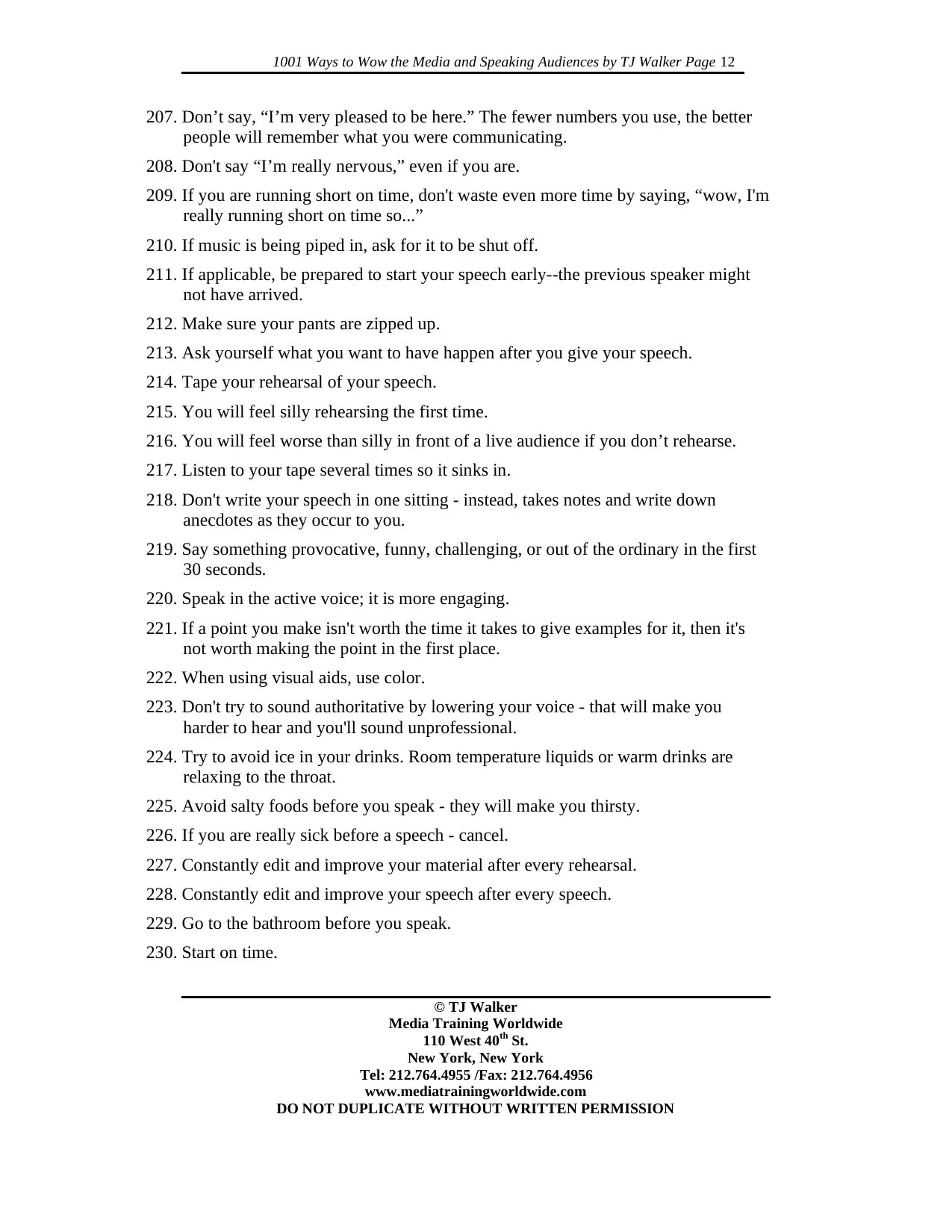
1001 Ways to Wow the Media and Speaking Audiences by TJ Walker Page 12
© TJ Walker
Media Training Worldwide
110 West 40th St.
New York, New York
Tel: 212.764.4955 /Fax: 212.764.4956
www.mediatrainingworldwide.com
DO NOT DUPLICATE WITHOUT WRITTEN PERMISSION
207. Don’t say, “I’m very pleased to be here.” The fewer numbers you use, the better
people will remember what you were communicating.
208. Don't say “I’m really nervous,” even if you are.
209. If you are running short on time, don't waste even more time by saying, “wow, I'm
really running short on time so...”
210. If music is being piped in, ask for it to be shut off.
211. If applicable, be prepared to start your speech early--the previous speaker might
not have arrived.
212. Make sure your pants are zipped up.
213. Ask yourself what you want to have happen after you give your speech.
214. Tape your rehearsal of your speech.
215. You will feel silly rehearsing the first time.
216. You will feel worse than silly in front of a live audience if you don’t rehearse.
217. Listen to your tape several times so it sinks in.
218. Don't write your speech in one sitting - instead, takes notes and write down
anecdotes as they occur to you.
219. Say something provocative, funny, challenging, or out of the ordinary in the first
30 seconds.
220. Speak in the active voice; it is more engaging.
221. If a point you make isn't worth the time it takes to give examples for it, then it's
not worth making the point in the first place.
222. When using visual aids, use color.
223. Don't try to sound authoritative by lowering your voice - that will make you
harder to hear and you'll sound unprofessional.
224. Try to avoid ice in your drinks. Room temperature liquids or warm drinks are
relaxing to the throat.
225. Avoid salty foods before you speak - they will make you thirsty.
226. If you are really sick before a speech - cancel.
227. Constantly edit and improve your material after every rehearsal.
228. Constantly edit and improve your speech after every speech.
229. Go to the bathroom before you speak.
230. Start on time.
© TJ Walker
Media Training Worldwide
110 West 40th St.
New York, New York
Tel: 212.764.4955 /Fax: 212.764.4956
www.mediatrainingworldwide.com
DO NOT DUPLICATE WITHOUT WRITTEN PERMISSION
207. Don’t say, “I’m very pleased to be here.” The fewer numbers you use, the better
people will remember what you were communicating.
208. Don't say “I’m really nervous,” even if you are.
209. If you are running short on time, don't waste even more time by saying, “wow, I'm
really running short on time so...”
210. If music is being piped in, ask for it to be shut off.
211. If applicable, be prepared to start your speech early--the previous speaker might
not have arrived.
212. Make sure your pants are zipped up.
213. Ask yourself what you want to have happen after you give your speech.
214. Tape your rehearsal of your speech.
215. You will feel silly rehearsing the first time.
216. You will feel worse than silly in front of a live audience if you don’t rehearse.
217. Listen to your tape several times so it sinks in.
218. Don't write your speech in one sitting - instead, takes notes and write down
anecdotes as they occur to you.
219. Say something provocative, funny, challenging, or out of the ordinary in the first
30 seconds.
220. Speak in the active voice; it is more engaging.
221. If a point you make isn't worth the time it takes to give examples for it, then it's
not worth making the point in the first place.
222. When using visual aids, use color.
223. Don't try to sound authoritative by lowering your voice - that will make you
harder to hear and you'll sound unprofessional.
224. Try to avoid ice in your drinks. Room temperature liquids or warm drinks are
relaxing to the throat.
225. Avoid salty foods before you speak - they will make you thirsty.
226. If you are really sick before a speech - cancel.
227. Constantly edit and improve your material after every rehearsal.
228. Constantly edit and improve your speech after every speech.
229. Go to the bathroom before you speak.
230. Start on time.
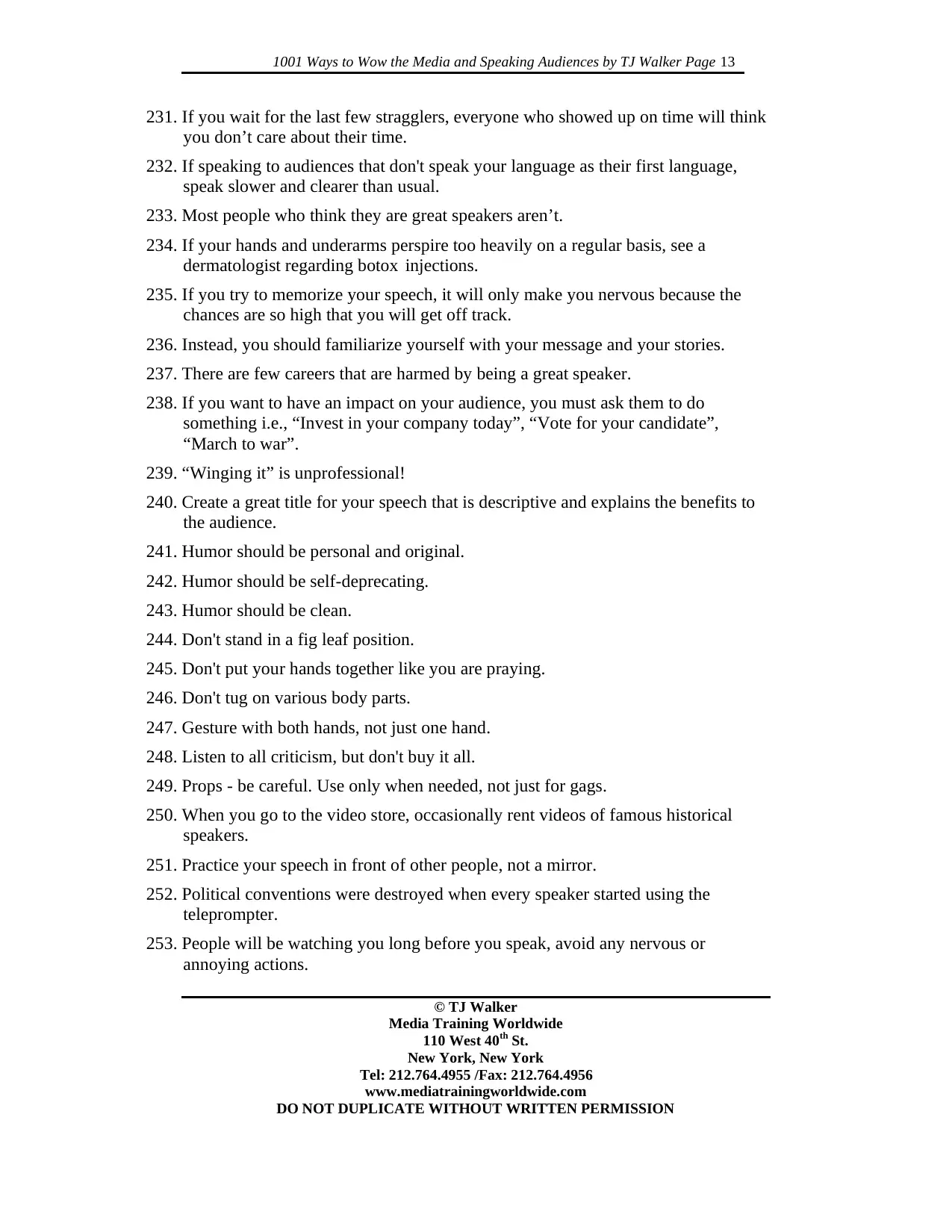
1001 Ways to Wow the Media and Speaking Audiences by TJ Walker Page 13
© TJ Walker
Media Training Worldwide
110 West 40th St.
New York, New York
Tel: 212.764.4955 /Fax: 212.764.4956
www.mediatrainingworldwide.com
DO NOT DUPLICATE WITHOUT WRITTEN PERMISSION
231. If you wait for the last few stragglers, everyone who showed up on time will think
you don’t care about their time.
232. If speaking to audiences that don't speak your language as their first language,
speak slower and clearer than usual.
233. Most people who think they are great speakers aren’t.
234. If your hands and underarms perspire too heavily on a regular basis, see a
dermatologist regarding botox injections.
235. If you try to memorize your speech, it will only make you nervous because the
chances are so high that you will get off track.
236. Instead, you should familiarize yourself with your message and your stories.
237. There are few careers that are harmed by being a great speaker.
238. If you want to have an impact on your audience, you must ask them to do
something i.e., “Invest in your company today”, “Vote for your candidate”,
“March to war”.
239. “Winging it” is unprofessional!
240. Create a great title for your speech that is descriptive and explains the benefits to
the audience.
241. Humor should be personal and original.
242. Humor should be self-deprecating.
243. Humor should be clean.
244. Don't stand in a fig leaf position.
245. Don't put your hands together like you are praying.
246. Don't tug on various body parts.
247. Gesture with both hands, not just one hand.
248. Listen to all criticism, but don't buy it all.
249. Props - be careful. Use only when needed, not just for gags.
250. When you go to the video store, occasionally rent videos of famous historical
speakers.
251. Practice your speech in front of other people, not a mirror.
252. Political conventions were destroyed when every speaker started using the
teleprompter.
253. People will be watching you long before you speak, avoid any nervous or
annoying actions.
© TJ Walker
Media Training Worldwide
110 West 40th St.
New York, New York
Tel: 212.764.4955 /Fax: 212.764.4956
www.mediatrainingworldwide.com
DO NOT DUPLICATE WITHOUT WRITTEN PERMISSION
231. If you wait for the last few stragglers, everyone who showed up on time will think
you don’t care about their time.
232. If speaking to audiences that don't speak your language as their first language,
speak slower and clearer than usual.
233. Most people who think they are great speakers aren’t.
234. If your hands and underarms perspire too heavily on a regular basis, see a
dermatologist regarding botox injections.
235. If you try to memorize your speech, it will only make you nervous because the
chances are so high that you will get off track.
236. Instead, you should familiarize yourself with your message and your stories.
237. There are few careers that are harmed by being a great speaker.
238. If you want to have an impact on your audience, you must ask them to do
something i.e., “Invest in your company today”, “Vote for your candidate”,
“March to war”.
239. “Winging it” is unprofessional!
240. Create a great title for your speech that is descriptive and explains the benefits to
the audience.
241. Humor should be personal and original.
242. Humor should be self-deprecating.
243. Humor should be clean.
244. Don't stand in a fig leaf position.
245. Don't put your hands together like you are praying.
246. Don't tug on various body parts.
247. Gesture with both hands, not just one hand.
248. Listen to all criticism, but don't buy it all.
249. Props - be careful. Use only when needed, not just for gags.
250. When you go to the video store, occasionally rent videos of famous historical
speakers.
251. Practice your speech in front of other people, not a mirror.
252. Political conventions were destroyed when every speaker started using the
teleprompter.
253. People will be watching you long before you speak, avoid any nervous or
annoying actions.
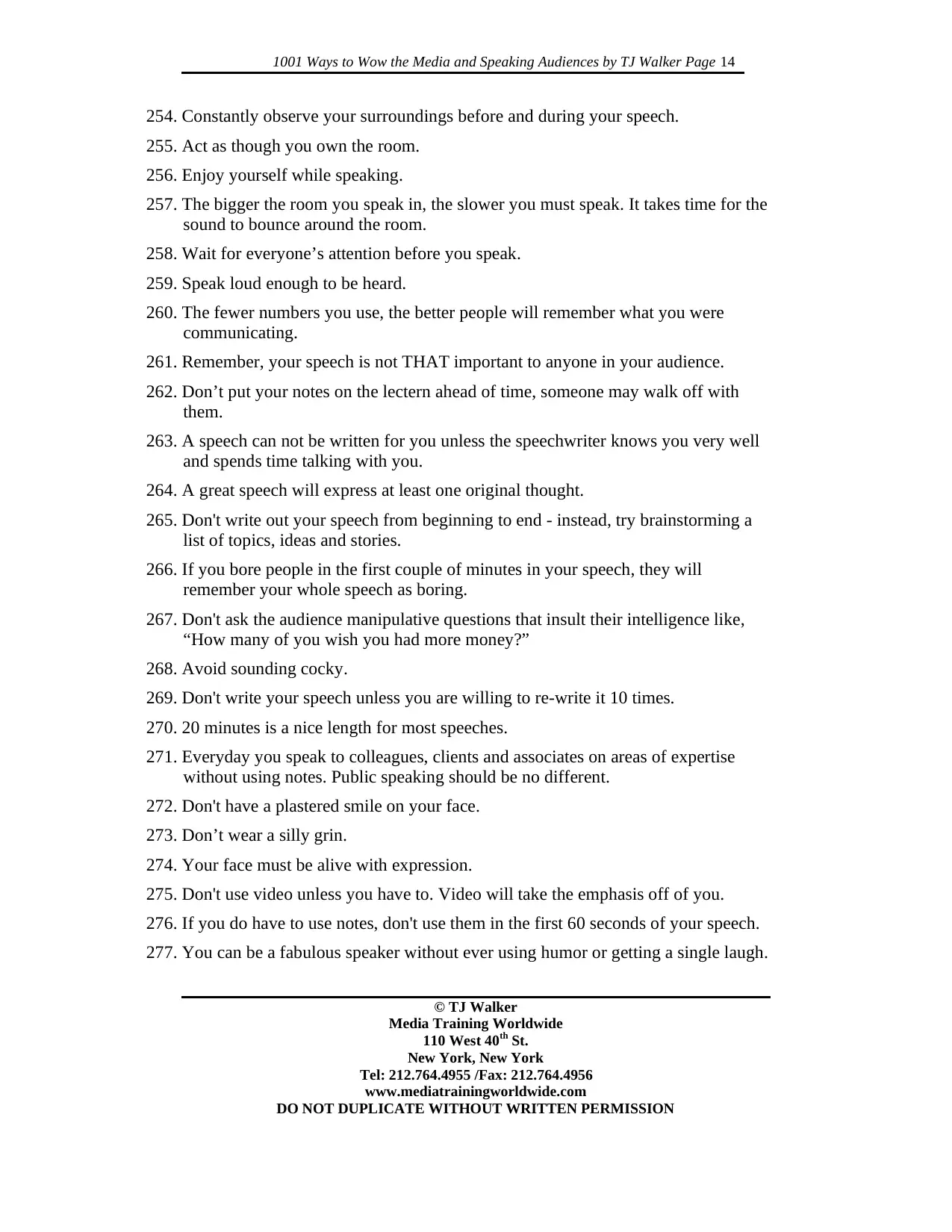
1001 Ways to Wow the Media and Speaking Audiences by TJ Walker Page 14
© TJ Walker
Media Training Worldwide
110 West 40th St.
New York, New York
Tel: 212.764.4955 /Fax: 212.764.4956
www.mediatrainingworldwide.com
DO NOT DUPLICATE WITHOUT WRITTEN PERMISSION
254. Constantly observe your surroundings before and during your speech.
255. Act as though you own the room.
256. Enjoy yourself while speaking.
257. The bigger the room you speak in, the slower you must speak. It takes time for the
sound to bounce around the room.
258. Wait for everyone’s attention before you speak.
259. Speak loud enough to be heard.
260. The fewer numbers you use, the better people will remember what you were
communicating.
261. Remember, your speech is not THAT important to anyone in your audience.
262. Don’t put your notes on the lectern ahead of time, someone may walk off with
them.
263. A speech can not be written for you unless the speechwriter knows you very well
and spends time talking with you.
264. A great speech will express at least one original thought.
265. Don't write out your speech from beginning to end - instead, try brainstorming a
list of topics, ideas and stories.
266. If you bore people in the first couple of minutes in your speech, they will
remember your whole speech as boring.
267. Don't ask the audience manipulative questions that insult their intelligence like,
“How many of you wish you had more money?”
268. Avoid sounding cocky.
269. Don't write your speech unless you are willing to re-write it 10 times.
270. 20 minutes is a nice length for most speeches.
271. Everyday you speak to colleagues, clients and associates on areas of expertise
without using notes. Public speaking should be no different.
272. Don't have a plastered smile on your face.
273. Don’t wear a silly grin.
274. Your face must be alive with expression.
275. Don't use video unless you have to. Video will take the emphasis off of you.
276. If you do have to use notes, don't use them in the first 60 seconds of your speech.
277. You can be a fabulous speaker without ever using humor or getting a single laugh.
© TJ Walker
Media Training Worldwide
110 West 40th St.
New York, New York
Tel: 212.764.4955 /Fax: 212.764.4956
www.mediatrainingworldwide.com
DO NOT DUPLICATE WITHOUT WRITTEN PERMISSION
254. Constantly observe your surroundings before and during your speech.
255. Act as though you own the room.
256. Enjoy yourself while speaking.
257. The bigger the room you speak in, the slower you must speak. It takes time for the
sound to bounce around the room.
258. Wait for everyone’s attention before you speak.
259. Speak loud enough to be heard.
260. The fewer numbers you use, the better people will remember what you were
communicating.
261. Remember, your speech is not THAT important to anyone in your audience.
262. Don’t put your notes on the lectern ahead of time, someone may walk off with
them.
263. A speech can not be written for you unless the speechwriter knows you very well
and spends time talking with you.
264. A great speech will express at least one original thought.
265. Don't write out your speech from beginning to end - instead, try brainstorming a
list of topics, ideas and stories.
266. If you bore people in the first couple of minutes in your speech, they will
remember your whole speech as boring.
267. Don't ask the audience manipulative questions that insult their intelligence like,
“How many of you wish you had more money?”
268. Avoid sounding cocky.
269. Don't write your speech unless you are willing to re-write it 10 times.
270. 20 minutes is a nice length for most speeches.
271. Everyday you speak to colleagues, clients and associates on areas of expertise
without using notes. Public speaking should be no different.
272. Don't have a plastered smile on your face.
273. Don’t wear a silly grin.
274. Your face must be alive with expression.
275. Don't use video unless you have to. Video will take the emphasis off of you.
276. If you do have to use notes, don't use them in the first 60 seconds of your speech.
277. You can be a fabulous speaker without ever using humor or getting a single laugh.
Secure Best Marks with AI Grader
Need help grading? Try our AI Grader for instant feedback on your assignments.
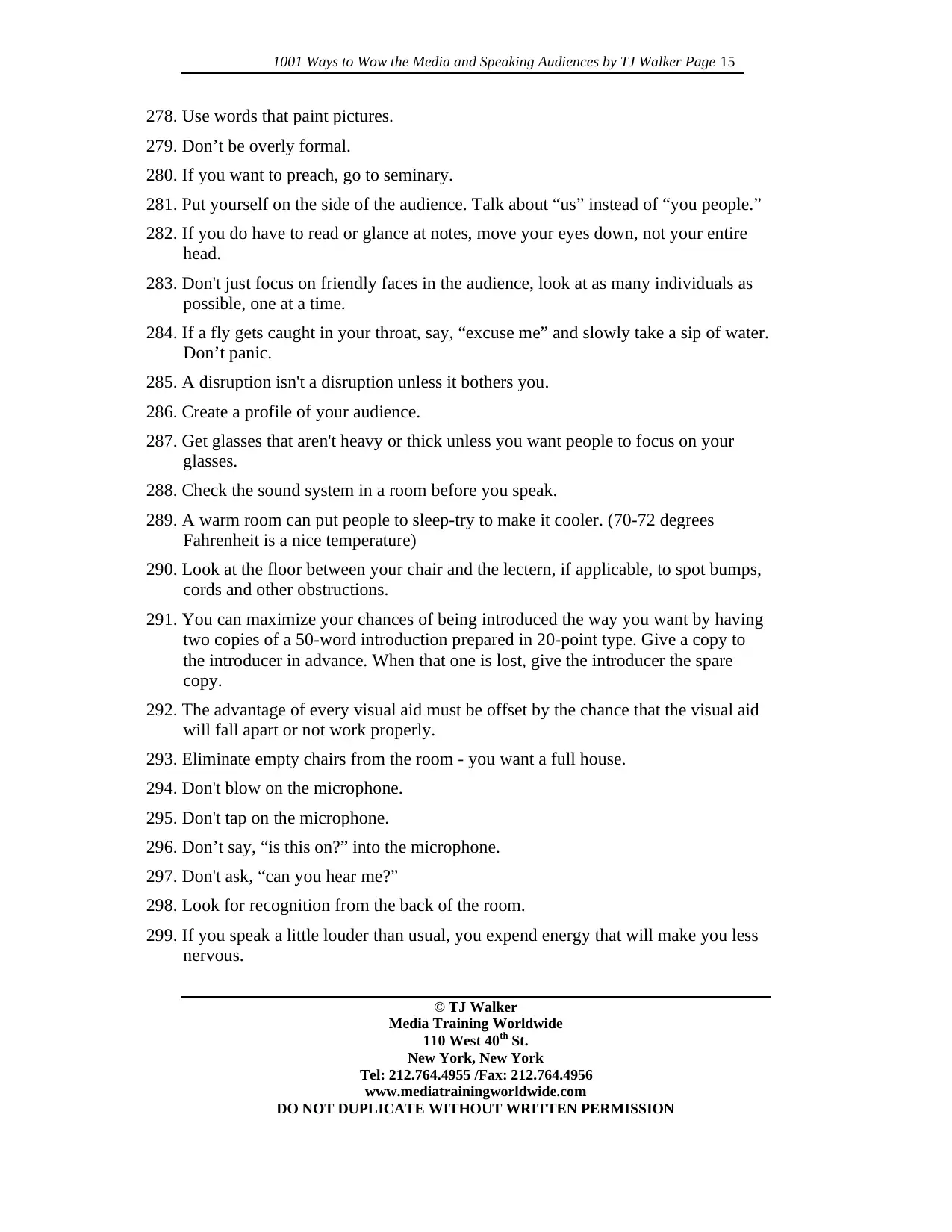
1001 Ways to Wow the Media and Speaking Audiences by TJ Walker Page 15
© TJ Walker
Media Training Worldwide
110 West 40th St.
New York, New York
Tel: 212.764.4955 /Fax: 212.764.4956
www.mediatrainingworldwide.com
DO NOT DUPLICATE WITHOUT WRITTEN PERMISSION
278. Use words that paint pictures.
279. Don’t be overly formal.
280. If you want to preach, go to seminary.
281. Put yourself on the side of the audience. Talk about “us” instead of “you people.”
282. If you do have to read or glance at notes, move your eyes down, not your entire
head.
283. Don't just focus on friendly faces in the audience, look at as many individuals as
possible, one at a time.
284. If a fly gets caught in your throat, say, “excuse me” and slowly take a sip of water.
Don’t panic.
285. A disruption isn't a disruption unless it bothers you.
286. Create a profile of your audience.
287. Get glasses that aren't heavy or thick unless you want people to focus on your
glasses.
288. Check the sound system in a room before you speak.
289. A warm room can put people to sleep-try to make it cooler. (70-72 degrees
Fahrenheit is a nice temperature)
290. Look at the floor between your chair and the lectern, if applicable, to spot bumps,
cords and other obstructions.
291. You can maximize your chances of being introduced the way you want by having
two copies of a 50-word introduction prepared in 20-point type. Give a copy to
the introducer in advance. When that one is lost, give the introducer the spare
copy.
292. The advantage of every visual aid must be offset by the chance that the visual aid
will fall apart or not work properly.
293. Eliminate empty chairs from the room - you want a full house.
294. Don't blow on the microphone.
295. Don't tap on the microphone.
296. Don’t say, “is this on?” into the microphone.
297. Don't ask, “can you hear me?”
298. Look for recognition from the back of the room.
299. If you speak a little louder than usual, you expend energy that will make you less
nervous.
© TJ Walker
Media Training Worldwide
110 West 40th St.
New York, New York
Tel: 212.764.4955 /Fax: 212.764.4956
www.mediatrainingworldwide.com
DO NOT DUPLICATE WITHOUT WRITTEN PERMISSION
278. Use words that paint pictures.
279. Don’t be overly formal.
280. If you want to preach, go to seminary.
281. Put yourself on the side of the audience. Talk about “us” instead of “you people.”
282. If you do have to read or glance at notes, move your eyes down, not your entire
head.
283. Don't just focus on friendly faces in the audience, look at as many individuals as
possible, one at a time.
284. If a fly gets caught in your throat, say, “excuse me” and slowly take a sip of water.
Don’t panic.
285. A disruption isn't a disruption unless it bothers you.
286. Create a profile of your audience.
287. Get glasses that aren't heavy or thick unless you want people to focus on your
glasses.
288. Check the sound system in a room before you speak.
289. A warm room can put people to sleep-try to make it cooler. (70-72 degrees
Fahrenheit is a nice temperature)
290. Look at the floor between your chair and the lectern, if applicable, to spot bumps,
cords and other obstructions.
291. You can maximize your chances of being introduced the way you want by having
two copies of a 50-word introduction prepared in 20-point type. Give a copy to
the introducer in advance. When that one is lost, give the introducer the spare
copy.
292. The advantage of every visual aid must be offset by the chance that the visual aid
will fall apart or not work properly.
293. Eliminate empty chairs from the room - you want a full house.
294. Don't blow on the microphone.
295. Don't tap on the microphone.
296. Don’t say, “is this on?” into the microphone.
297. Don't ask, “can you hear me?”
298. Look for recognition from the back of the room.
299. If you speak a little louder than usual, you expend energy that will make you less
nervous.
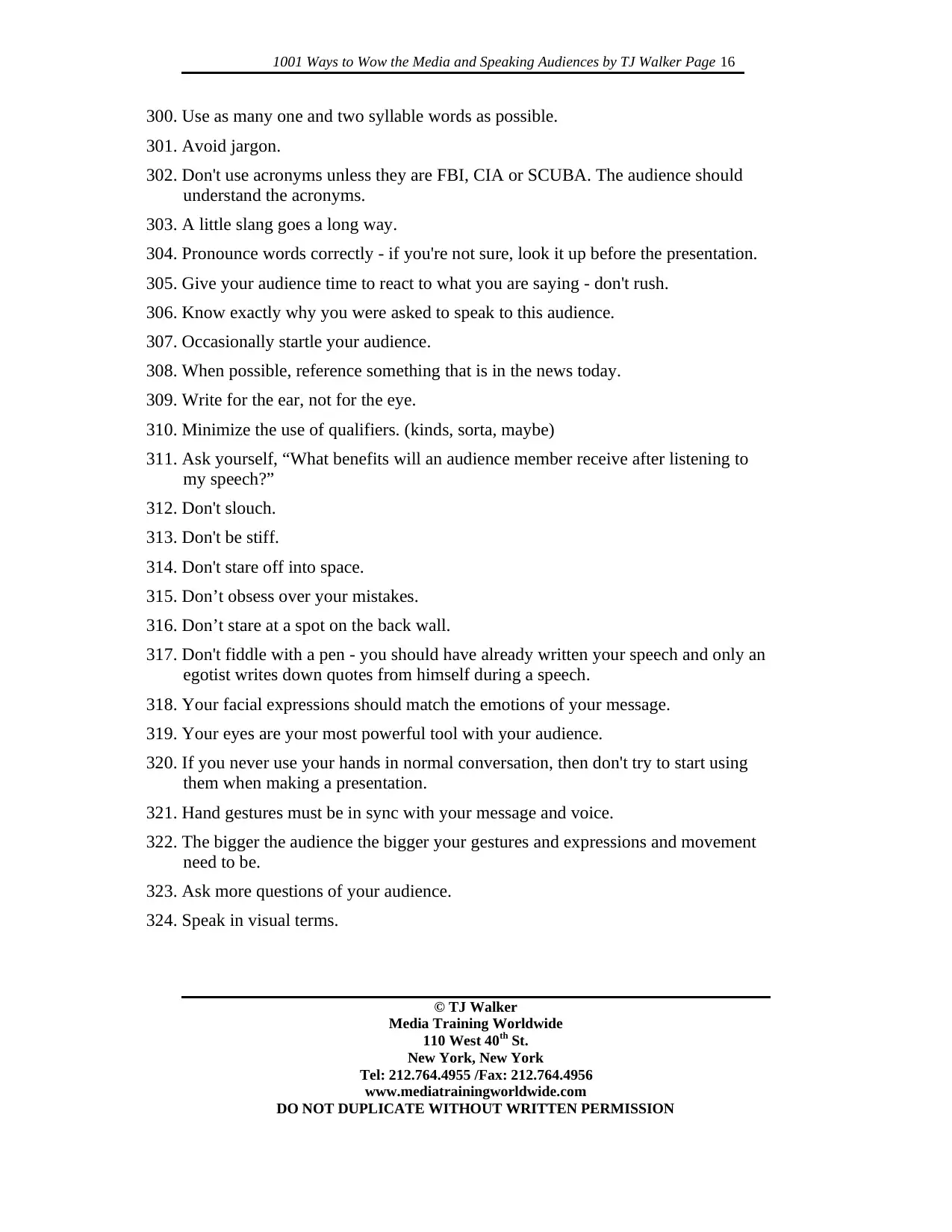
1001 Ways to Wow the Media and Speaking Audiences by TJ Walker Page 16
© TJ Walker
Media Training Worldwide
110 West 40th St.
New York, New York
Tel: 212.764.4955 /Fax: 212.764.4956
www.mediatrainingworldwide.com
DO NOT DUPLICATE WITHOUT WRITTEN PERMISSION
300. Use as many one and two syllable words as possible.
301. Avoid jargon.
302. Don't use acronyms unless they are FBI, CIA or SCUBA. The audience should
understand the acronyms.
303. A little slang goes a long way.
304. Pronounce words correctly - if you're not sure, look it up before the presentation.
305. Give your audience time to react to what you are saying - don't rush.
306. Know exactly why you were asked to speak to this audience.
307. Occasionally startle your audience.
308. When possible, reference something that is in the news today.
309. Write for the ear, not for the eye.
310. Minimize the use of qualifiers. (kinds, sorta, maybe)
311. Ask yourself, “What benefits will an audience member receive after listening to
my speech?”
312. Don't slouch.
313. Don't be stiff.
314. Don't stare off into space.
315. Don’t obsess over your mistakes.
316. Don’t stare at a spot on the back wall.
317. Don't fiddle with a pen - you should have already written your speech and only an
egotist writes down quotes from himself during a speech.
318. Your facial expressions should match the emotions of your message.
319. Your eyes are your most powerful tool with your audience.
320. If you never use your hands in normal conversation, then don't try to start using
them when making a presentation.
321. Hand gestures must be in sync with your message and voice.
322. The bigger the audience the bigger your gestures and expressions and movement
need to be.
323. Ask more questions of your audience.
324. Speak in visual terms.
© TJ Walker
Media Training Worldwide
110 West 40th St.
New York, New York
Tel: 212.764.4955 /Fax: 212.764.4956
www.mediatrainingworldwide.com
DO NOT DUPLICATE WITHOUT WRITTEN PERMISSION
300. Use as many one and two syllable words as possible.
301. Avoid jargon.
302. Don't use acronyms unless they are FBI, CIA or SCUBA. The audience should
understand the acronyms.
303. A little slang goes a long way.
304. Pronounce words correctly - if you're not sure, look it up before the presentation.
305. Give your audience time to react to what you are saying - don't rush.
306. Know exactly why you were asked to speak to this audience.
307. Occasionally startle your audience.
308. When possible, reference something that is in the news today.
309. Write for the ear, not for the eye.
310. Minimize the use of qualifiers. (kinds, sorta, maybe)
311. Ask yourself, “What benefits will an audience member receive after listening to
my speech?”
312. Don't slouch.
313. Don't be stiff.
314. Don't stare off into space.
315. Don’t obsess over your mistakes.
316. Don’t stare at a spot on the back wall.
317. Don't fiddle with a pen - you should have already written your speech and only an
egotist writes down quotes from himself during a speech.
318. Your facial expressions should match the emotions of your message.
319. Your eyes are your most powerful tool with your audience.
320. If you never use your hands in normal conversation, then don't try to start using
them when making a presentation.
321. Hand gestures must be in sync with your message and voice.
322. The bigger the audience the bigger your gestures and expressions and movement
need to be.
323. Ask more questions of your audience.
324. Speak in visual terms.
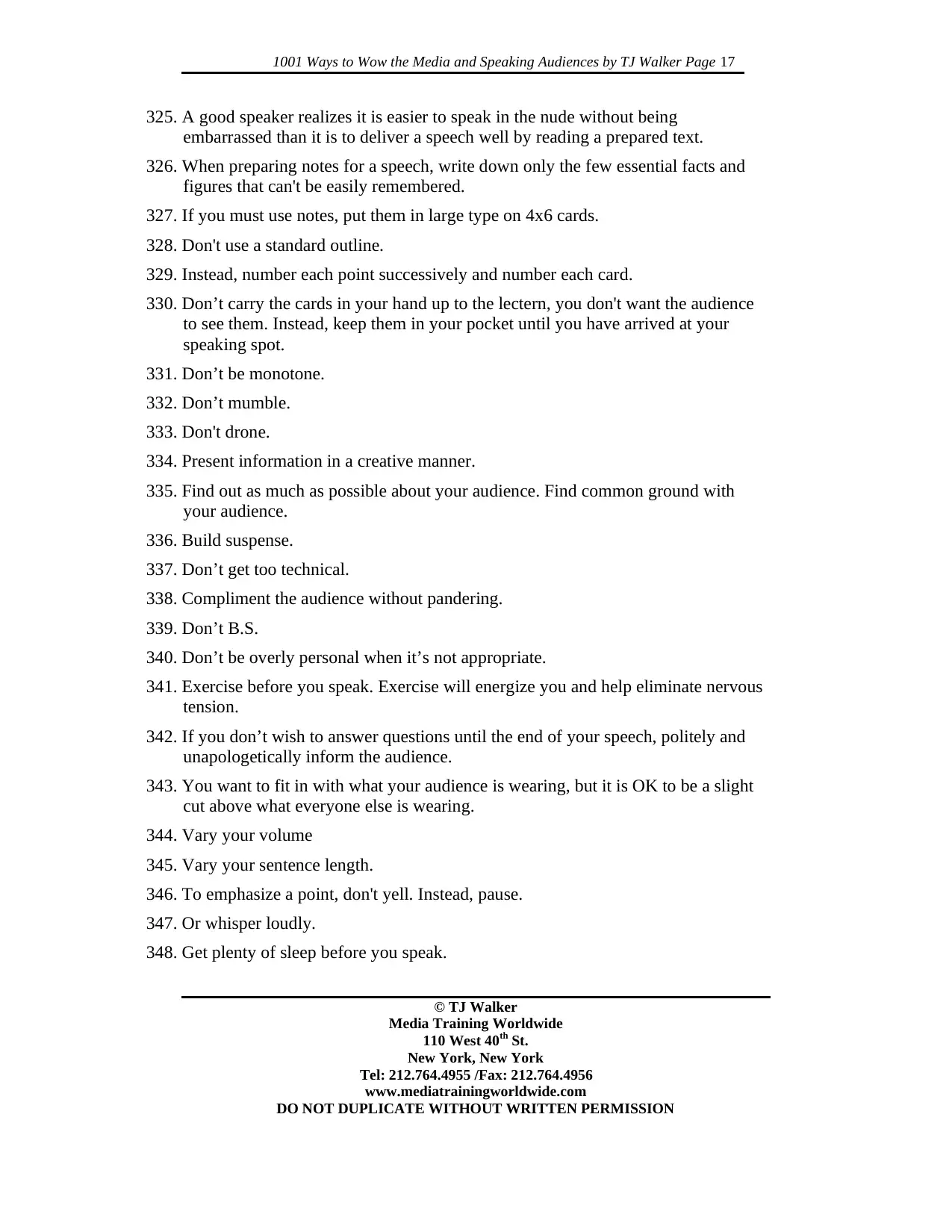
1001 Ways to Wow the Media and Speaking Audiences by TJ Walker Page 17
© TJ Walker
Media Training Worldwide
110 West 40th St.
New York, New York
Tel: 212.764.4955 /Fax: 212.764.4956
www.mediatrainingworldwide.com
DO NOT DUPLICATE WITHOUT WRITTEN PERMISSION
325. A good speaker realizes it is easier to speak in the nude without being
embarrassed than it is to deliver a speech well by reading a prepared text.
326. When preparing notes for a speech, write down only the few essential facts and
figures that can't be easily remembered.
327. If you must use notes, put them in large type on 4x6 cards.
328. Don't use a standard outline.
329. Instead, number each point successively and number each card.
330. Don’t carry the cards in your hand up to the lectern, you don't want the audience
to see them. Instead, keep them in your pocket until you have arrived at your
speaking spot.
331. Don’t be monotone.
332. Don’t mumble.
333. Don't drone.
334. Present information in a creative manner.
335. Find out as much as possible about your audience. Find common ground with
your audience.
336. Build suspense.
337. Don’t get too technical.
338. Compliment the audience without pandering.
339. Don’t B.S.
340. Don’t be overly personal when it’s not appropriate.
341. Exercise before you speak. Exercise will energize you and help eliminate nervous
tension.
342. If you don’t wish to answer questions until the end of your speech, politely and
unapologetically inform the audience.
343. You want to fit in with what your audience is wearing, but it is OK to be a slight
cut above what everyone else is wearing.
344. Vary your volume
345. Vary your sentence length.
346. To emphasize a point, don't yell. Instead, pause.
347. Or whisper loudly.
348. Get plenty of sleep before you speak.
© TJ Walker
Media Training Worldwide
110 West 40th St.
New York, New York
Tel: 212.764.4955 /Fax: 212.764.4956
www.mediatrainingworldwide.com
DO NOT DUPLICATE WITHOUT WRITTEN PERMISSION
325. A good speaker realizes it is easier to speak in the nude without being
embarrassed than it is to deliver a speech well by reading a prepared text.
326. When preparing notes for a speech, write down only the few essential facts and
figures that can't be easily remembered.
327. If you must use notes, put them in large type on 4x6 cards.
328. Don't use a standard outline.
329. Instead, number each point successively and number each card.
330. Don’t carry the cards in your hand up to the lectern, you don't want the audience
to see them. Instead, keep them in your pocket until you have arrived at your
speaking spot.
331. Don’t be monotone.
332. Don’t mumble.
333. Don't drone.
334. Present information in a creative manner.
335. Find out as much as possible about your audience. Find common ground with
your audience.
336. Build suspense.
337. Don’t get too technical.
338. Compliment the audience without pandering.
339. Don’t B.S.
340. Don’t be overly personal when it’s not appropriate.
341. Exercise before you speak. Exercise will energize you and help eliminate nervous
tension.
342. If you don’t wish to answer questions until the end of your speech, politely and
unapologetically inform the audience.
343. You want to fit in with what your audience is wearing, but it is OK to be a slight
cut above what everyone else is wearing.
344. Vary your volume
345. Vary your sentence length.
346. To emphasize a point, don't yell. Instead, pause.
347. Or whisper loudly.
348. Get plenty of sleep before you speak.
Paraphrase This Document
Need a fresh take? Get an instant paraphrase of this document with our AI Paraphraser
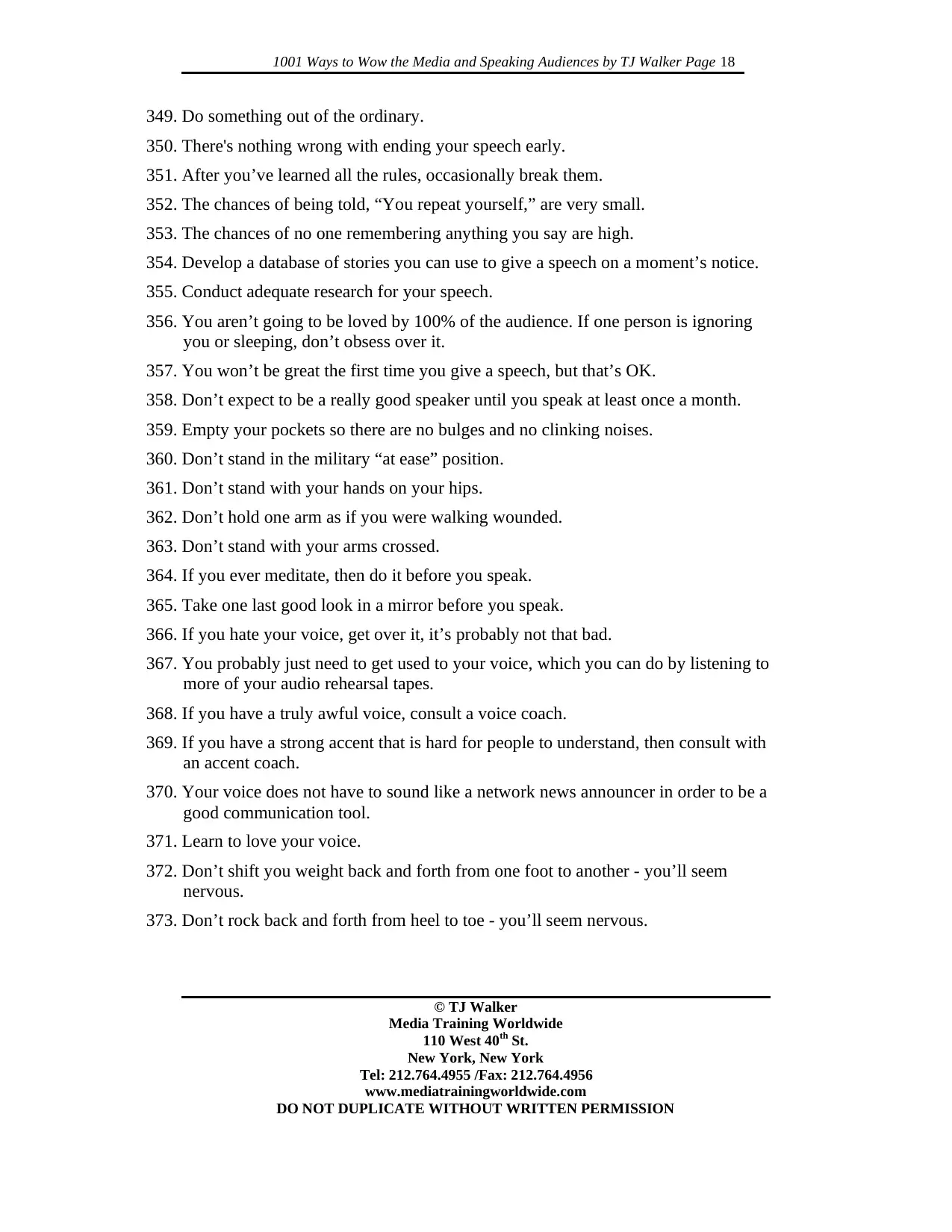
1001 Ways to Wow the Media and Speaking Audiences by TJ Walker Page 18
© TJ Walker
Media Training Worldwide
110 West 40th St.
New York, New York
Tel: 212.764.4955 /Fax: 212.764.4956
www.mediatrainingworldwide.com
DO NOT DUPLICATE WITHOUT WRITTEN PERMISSION
349. Do something out of the ordinary.
350. There's nothing wrong with ending your speech early.
351. After you’ve learned all the rules, occasionally break them.
352. The chances of being told, “You repeat yourself,” are very small.
353. The chances of no one remembering anything you say are high.
354. Develop a database of stories you can use to give a speech on a moment’s notice.
355. Conduct adequate research for your speech.
356. You aren’t going to be loved by 100% of the audience. If one person is ignoring
you or sleeping, don’t obsess over it.
357. You won’t be great the first time you give a speech, but that’s OK.
358. Don’t expect to be a really good speaker until you speak at least once a month.
359. Empty your pockets so there are no bulges and no clinking noises.
360. Don’t stand in the military “at ease” position.
361. Don’t stand with your hands on your hips.
362. Don’t hold one arm as if you were walking wounded.
363. Don’t stand with your arms crossed.
364. If you ever meditate, then do it before you speak.
365. Take one last good look in a mirror before you speak.
366. If you hate your voice, get over it, it’s probably not that bad.
367. You probably just need to get used to your voice, which you can do by listening to
more of your audio rehearsal tapes.
368. If you have a truly awful voice, consult a voice coach.
369. If you have a strong accent that is hard for people to understand, then consult with
an accent coach.
370. Your voice does not have to sound like a network news announcer in order to be a
good communication tool.
371. Learn to love your voice.
372. Don’t shift you weight back and forth from one foot to another - you’ll seem
nervous.
373. Don’t rock back and forth from heel to toe - you’ll seem nervous.
© TJ Walker
Media Training Worldwide
110 West 40th St.
New York, New York
Tel: 212.764.4955 /Fax: 212.764.4956
www.mediatrainingworldwide.com
DO NOT DUPLICATE WITHOUT WRITTEN PERMISSION
349. Do something out of the ordinary.
350. There's nothing wrong with ending your speech early.
351. After you’ve learned all the rules, occasionally break them.
352. The chances of being told, “You repeat yourself,” are very small.
353. The chances of no one remembering anything you say are high.
354. Develop a database of stories you can use to give a speech on a moment’s notice.
355. Conduct adequate research for your speech.
356. You aren’t going to be loved by 100% of the audience. If one person is ignoring
you or sleeping, don’t obsess over it.
357. You won’t be great the first time you give a speech, but that’s OK.
358. Don’t expect to be a really good speaker until you speak at least once a month.
359. Empty your pockets so there are no bulges and no clinking noises.
360. Don’t stand in the military “at ease” position.
361. Don’t stand with your hands on your hips.
362. Don’t hold one arm as if you were walking wounded.
363. Don’t stand with your arms crossed.
364. If you ever meditate, then do it before you speak.
365. Take one last good look in a mirror before you speak.
366. If you hate your voice, get over it, it’s probably not that bad.
367. You probably just need to get used to your voice, which you can do by listening to
more of your audio rehearsal tapes.
368. If you have a truly awful voice, consult a voice coach.
369. If you have a strong accent that is hard for people to understand, then consult with
an accent coach.
370. Your voice does not have to sound like a network news announcer in order to be a
good communication tool.
371. Learn to love your voice.
372. Don’t shift you weight back and forth from one foot to another - you’ll seem
nervous.
373. Don’t rock back and forth from heel to toe - you’ll seem nervous.
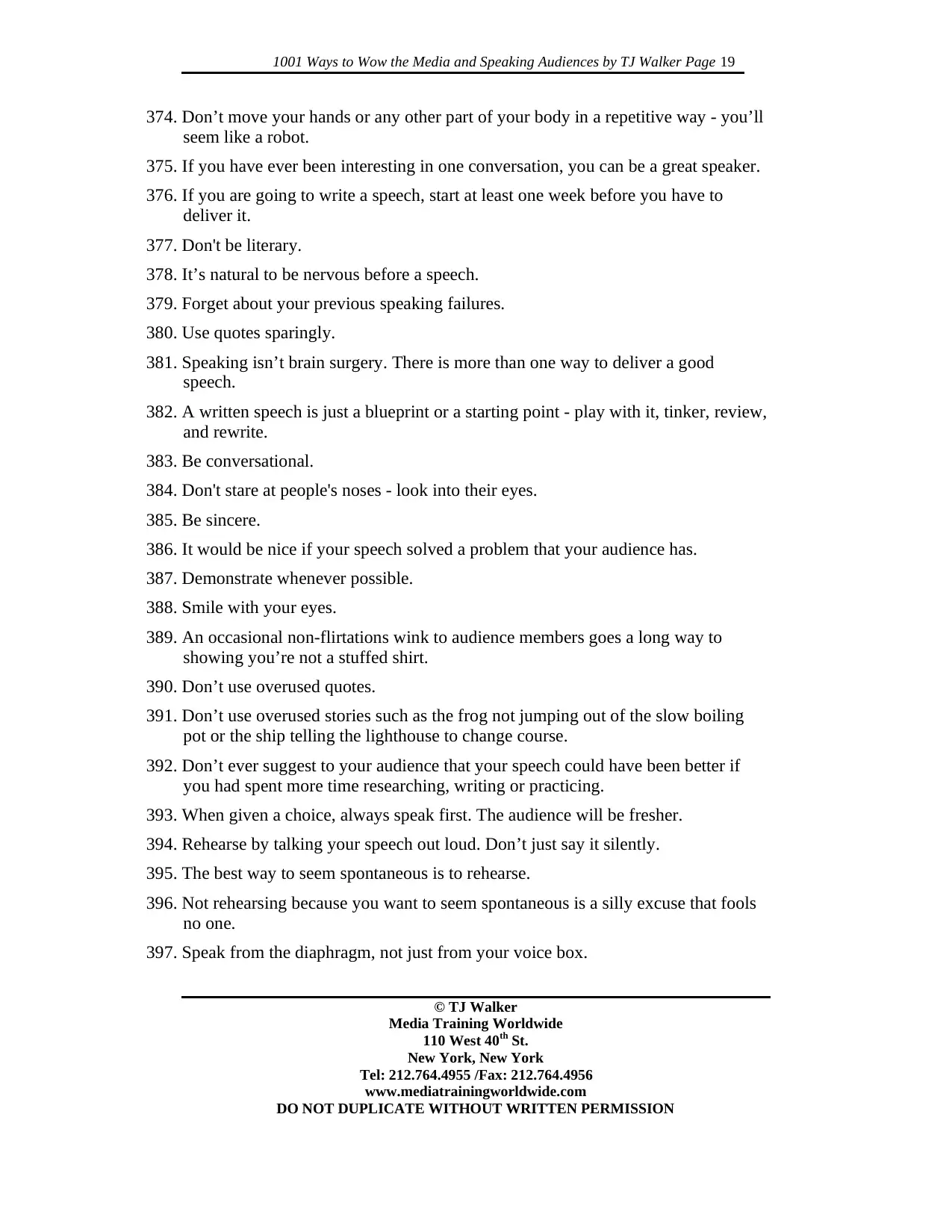
1001 Ways to Wow the Media and Speaking Audiences by TJ Walker Page 19
© TJ Walker
Media Training Worldwide
110 West 40th St.
New York, New York
Tel: 212.764.4955 /Fax: 212.764.4956
www.mediatrainingworldwide.com
DO NOT DUPLICATE WITHOUT WRITTEN PERMISSION
374. Don’t move your hands or any other part of your body in a repetitive way - you’ll
seem like a robot.
375. If you have ever been interesting in one conversation, you can be a great speaker.
376. If you are going to write a speech, start at least one week before you have to
deliver it.
377. Don't be literary.
378. It’s natural to be nervous before a speech.
379. Forget about your previous speaking failures.
380. Use quotes sparingly.
381. Speaking isn’t brain surgery. There is more than one way to deliver a good
speech.
382. A written speech is just a blueprint or a starting point - play with it, tinker, review,
and rewrite.
383. Be conversational.
384. Don't stare at people's noses - look into their eyes.
385. Be sincere.
386. It would be nice if your speech solved a problem that your audience has.
387. Demonstrate whenever possible.
388. Smile with your eyes.
389. An occasional non-flirtations wink to audience members goes a long way to
showing you’re not a stuffed shirt.
390. Don’t use overused quotes.
391. Don’t use overused stories such as the frog not jumping out of the slow boiling
pot or the ship telling the lighthouse to change course.
392. Don’t ever suggest to your audience that your speech could have been better if
you had spent more time researching, writing or practicing.
393. When given a choice, always speak first. The audience will be fresher.
394. Rehearse by talking your speech out loud. Don’t just say it silently.
395. The best way to seem spontaneous is to rehearse.
396. Not rehearsing because you want to seem spontaneous is a silly excuse that fools
no one.
397. Speak from the diaphragm, not just from your voice box.
© TJ Walker
Media Training Worldwide
110 West 40th St.
New York, New York
Tel: 212.764.4955 /Fax: 212.764.4956
www.mediatrainingworldwide.com
DO NOT DUPLICATE WITHOUT WRITTEN PERMISSION
374. Don’t move your hands or any other part of your body in a repetitive way - you’ll
seem like a robot.
375. If you have ever been interesting in one conversation, you can be a great speaker.
376. If you are going to write a speech, start at least one week before you have to
deliver it.
377. Don't be literary.
378. It’s natural to be nervous before a speech.
379. Forget about your previous speaking failures.
380. Use quotes sparingly.
381. Speaking isn’t brain surgery. There is more than one way to deliver a good
speech.
382. A written speech is just a blueprint or a starting point - play with it, tinker, review,
and rewrite.
383. Be conversational.
384. Don't stare at people's noses - look into their eyes.
385. Be sincere.
386. It would be nice if your speech solved a problem that your audience has.
387. Demonstrate whenever possible.
388. Smile with your eyes.
389. An occasional non-flirtations wink to audience members goes a long way to
showing you’re not a stuffed shirt.
390. Don’t use overused quotes.
391. Don’t use overused stories such as the frog not jumping out of the slow boiling
pot or the ship telling the lighthouse to change course.
392. Don’t ever suggest to your audience that your speech could have been better if
you had spent more time researching, writing or practicing.
393. When given a choice, always speak first. The audience will be fresher.
394. Rehearse by talking your speech out loud. Don’t just say it silently.
395. The best way to seem spontaneous is to rehearse.
396. Not rehearsing because you want to seem spontaneous is a silly excuse that fools
no one.
397. Speak from the diaphragm, not just from your voice box.
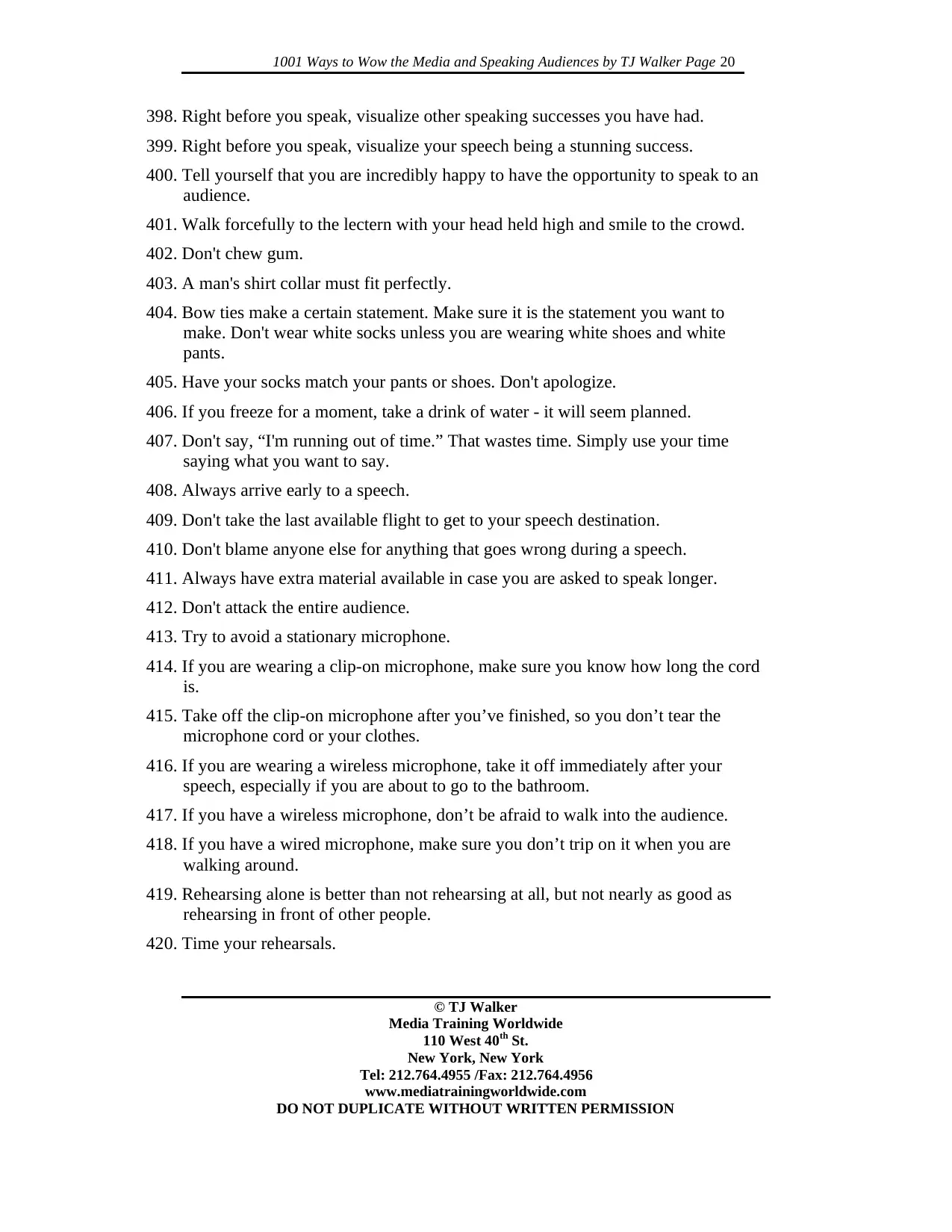
1001 Ways to Wow the Media and Speaking Audiences by TJ Walker Page 20
© TJ Walker
Media Training Worldwide
110 West 40th St.
New York, New York
Tel: 212.764.4955 /Fax: 212.764.4956
www.mediatrainingworldwide.com
DO NOT DUPLICATE WITHOUT WRITTEN PERMISSION
398. Right before you speak, visualize other speaking successes you have had.
399. Right before you speak, visualize your speech being a stunning success.
400. Tell yourself that you are incredibly happy to have the opportunity to speak to an
audience.
401. Walk forcefully to the lectern with your head held high and smile to the crowd.
402. Don't chew gum.
403. A man's shirt collar must fit perfectly.
404. Bow ties make a certain statement. Make sure it is the statement you want to
make. Don't wear white socks unless you are wearing white shoes and white
pants.
405. Have your socks match your pants or shoes. Don't apologize.
406. If you freeze for a moment, take a drink of water - it will seem planned.
407. Don't say, “I'm running out of time.” That wastes time. Simply use your time
saying what you want to say.
408. Always arrive early to a speech.
409. Don't take the last available flight to get to your speech destination.
410. Don't blame anyone else for anything that goes wrong during a speech.
411. Always have extra material available in case you are asked to speak longer.
412. Don't attack the entire audience.
413. Try to avoid a stationary microphone.
414. If you are wearing a clip-on microphone, make sure you know how long the cord
is.
415. Take off the clip-on microphone after you’ve finished, so you don’t tear the
microphone cord or your clothes.
416. If you are wearing a wireless microphone, take it off immediately after your
speech, especially if you are about to go to the bathroom.
417. If you have a wireless microphone, don’t be afraid to walk into the audience.
418. If you have a wired microphone, make sure you don’t trip on it when you are
walking around.
419. Rehearsing alone is better than not rehearsing at all, but not nearly as good as
rehearsing in front of other people.
420. Time your rehearsals.
© TJ Walker
Media Training Worldwide
110 West 40th St.
New York, New York
Tel: 212.764.4955 /Fax: 212.764.4956
www.mediatrainingworldwide.com
DO NOT DUPLICATE WITHOUT WRITTEN PERMISSION
398. Right before you speak, visualize other speaking successes you have had.
399. Right before you speak, visualize your speech being a stunning success.
400. Tell yourself that you are incredibly happy to have the opportunity to speak to an
audience.
401. Walk forcefully to the lectern with your head held high and smile to the crowd.
402. Don't chew gum.
403. A man's shirt collar must fit perfectly.
404. Bow ties make a certain statement. Make sure it is the statement you want to
make. Don't wear white socks unless you are wearing white shoes and white
pants.
405. Have your socks match your pants or shoes. Don't apologize.
406. If you freeze for a moment, take a drink of water - it will seem planned.
407. Don't say, “I'm running out of time.” That wastes time. Simply use your time
saying what you want to say.
408. Always arrive early to a speech.
409. Don't take the last available flight to get to your speech destination.
410. Don't blame anyone else for anything that goes wrong during a speech.
411. Always have extra material available in case you are asked to speak longer.
412. Don't attack the entire audience.
413. Try to avoid a stationary microphone.
414. If you are wearing a clip-on microphone, make sure you know how long the cord
is.
415. Take off the clip-on microphone after you’ve finished, so you don’t tear the
microphone cord or your clothes.
416. If you are wearing a wireless microphone, take it off immediately after your
speech, especially if you are about to go to the bathroom.
417. If you have a wireless microphone, don’t be afraid to walk into the audience.
418. If you have a wired microphone, make sure you don’t trip on it when you are
walking around.
419. Rehearsing alone is better than not rehearsing at all, but not nearly as good as
rehearsing in front of other people.
420. Time your rehearsals.
Secure Best Marks with AI Grader
Need help grading? Try our AI Grader for instant feedback on your assignments.
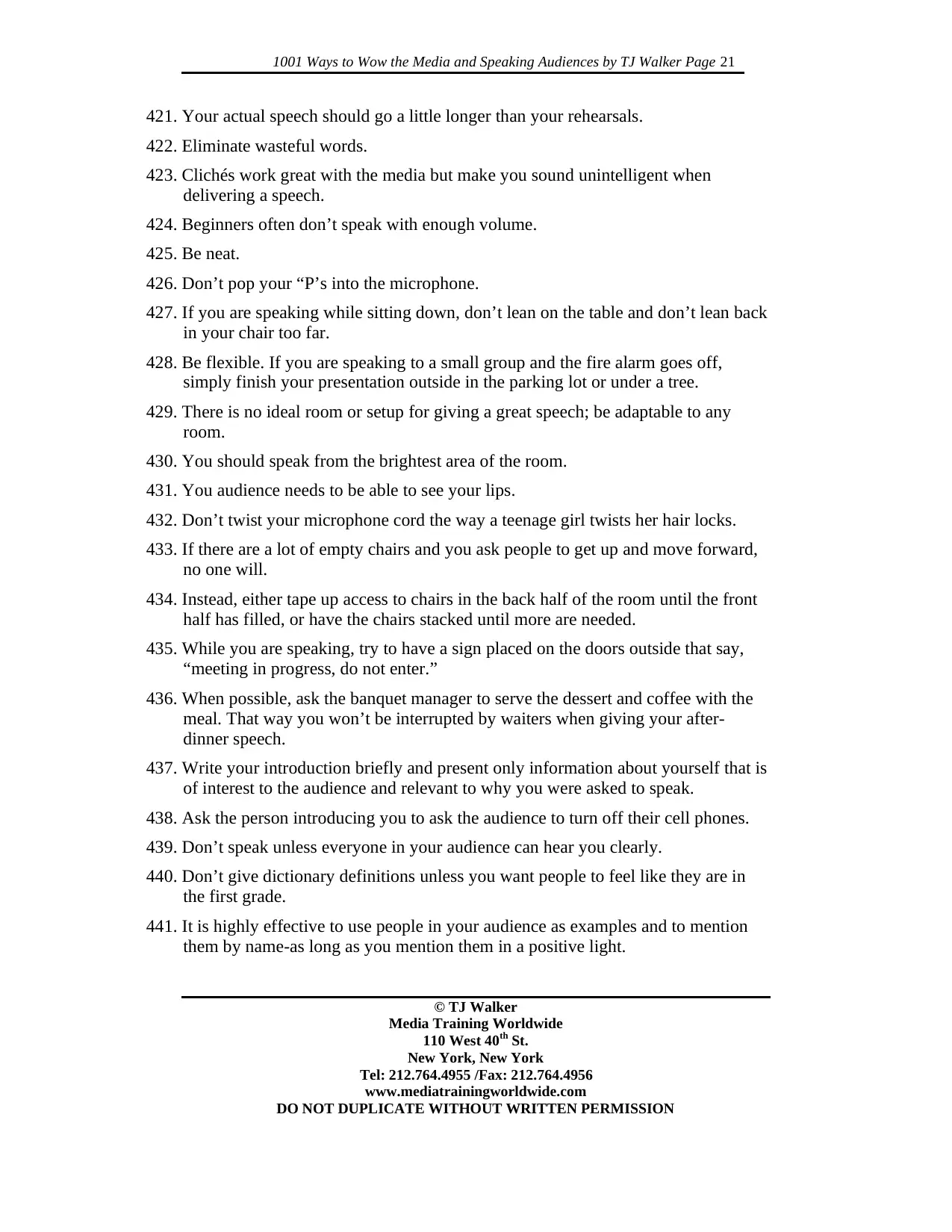
1001 Ways to Wow the Media and Speaking Audiences by TJ Walker Page 21
© TJ Walker
Media Training Worldwide
110 West 40th St.
New York, New York
Tel: 212.764.4955 /Fax: 212.764.4956
www.mediatrainingworldwide.com
DO NOT DUPLICATE WITHOUT WRITTEN PERMISSION
421. Your actual speech should go a little longer than your rehearsals.
422. Eliminate wasteful words.
423. Clichés work great with the media but make you sound unintelligent when
delivering a speech.
424. Beginners often don’t speak with enough volume.
425. Be neat.
426. Don’t pop your “P’s into the microphone.
427. If you are speaking while sitting down, don’t lean on the table and don’t lean back
in your chair too far.
428. Be flexible. If you are speaking to a small group and the fire alarm goes off,
simply finish your presentation outside in the parking lot or under a tree.
429. There is no ideal room or setup for giving a great speech; be adaptable to any
room.
430. You should speak from the brightest area of the room.
431. You audience needs to be able to see your lips.
432. Don’t twist your microphone cord the way a teenage girl twists her hair locks.
433. If there are a lot of empty chairs and you ask people to get up and move forward,
no one will.
434. Instead, either tape up access to chairs in the back half of the room until the front
half has filled, or have the chairs stacked until more are needed.
435. While you are speaking, try to have a sign placed on the doors outside that say,
“meeting in progress, do not enter.”
436. When possible, ask the banquet manager to serve the dessert and coffee with the
meal. That way you won’t be interrupted by waiters when giving your after-
dinner speech.
437. Write your introduction briefly and present only information about yourself that is
of interest to the audience and relevant to why you were asked to speak.
438. Ask the person introducing you to ask the audience to turn off their cell phones.
439. Don’t speak unless everyone in your audience can hear you clearly.
440. Don’t give dictionary definitions unless you want people to feel like they are in
the first grade.
441. It is highly effective to use people in your audience as examples and to mention
them by name-as long as you mention them in a positive light.
© TJ Walker
Media Training Worldwide
110 West 40th St.
New York, New York
Tel: 212.764.4955 /Fax: 212.764.4956
www.mediatrainingworldwide.com
DO NOT DUPLICATE WITHOUT WRITTEN PERMISSION
421. Your actual speech should go a little longer than your rehearsals.
422. Eliminate wasteful words.
423. Clichés work great with the media but make you sound unintelligent when
delivering a speech.
424. Beginners often don’t speak with enough volume.
425. Be neat.
426. Don’t pop your “P’s into the microphone.
427. If you are speaking while sitting down, don’t lean on the table and don’t lean back
in your chair too far.
428. Be flexible. If you are speaking to a small group and the fire alarm goes off,
simply finish your presentation outside in the parking lot or under a tree.
429. There is no ideal room or setup for giving a great speech; be adaptable to any
room.
430. You should speak from the brightest area of the room.
431. You audience needs to be able to see your lips.
432. Don’t twist your microphone cord the way a teenage girl twists her hair locks.
433. If there are a lot of empty chairs and you ask people to get up and move forward,
no one will.
434. Instead, either tape up access to chairs in the back half of the room until the front
half has filled, or have the chairs stacked until more are needed.
435. While you are speaking, try to have a sign placed on the doors outside that say,
“meeting in progress, do not enter.”
436. When possible, ask the banquet manager to serve the dessert and coffee with the
meal. That way you won’t be interrupted by waiters when giving your after-
dinner speech.
437. Write your introduction briefly and present only information about yourself that is
of interest to the audience and relevant to why you were asked to speak.
438. Ask the person introducing you to ask the audience to turn off their cell phones.
439. Don’t speak unless everyone in your audience can hear you clearly.
440. Don’t give dictionary definitions unless you want people to feel like they are in
the first grade.
441. It is highly effective to use people in your audience as examples and to mention
them by name-as long as you mention them in a positive light.
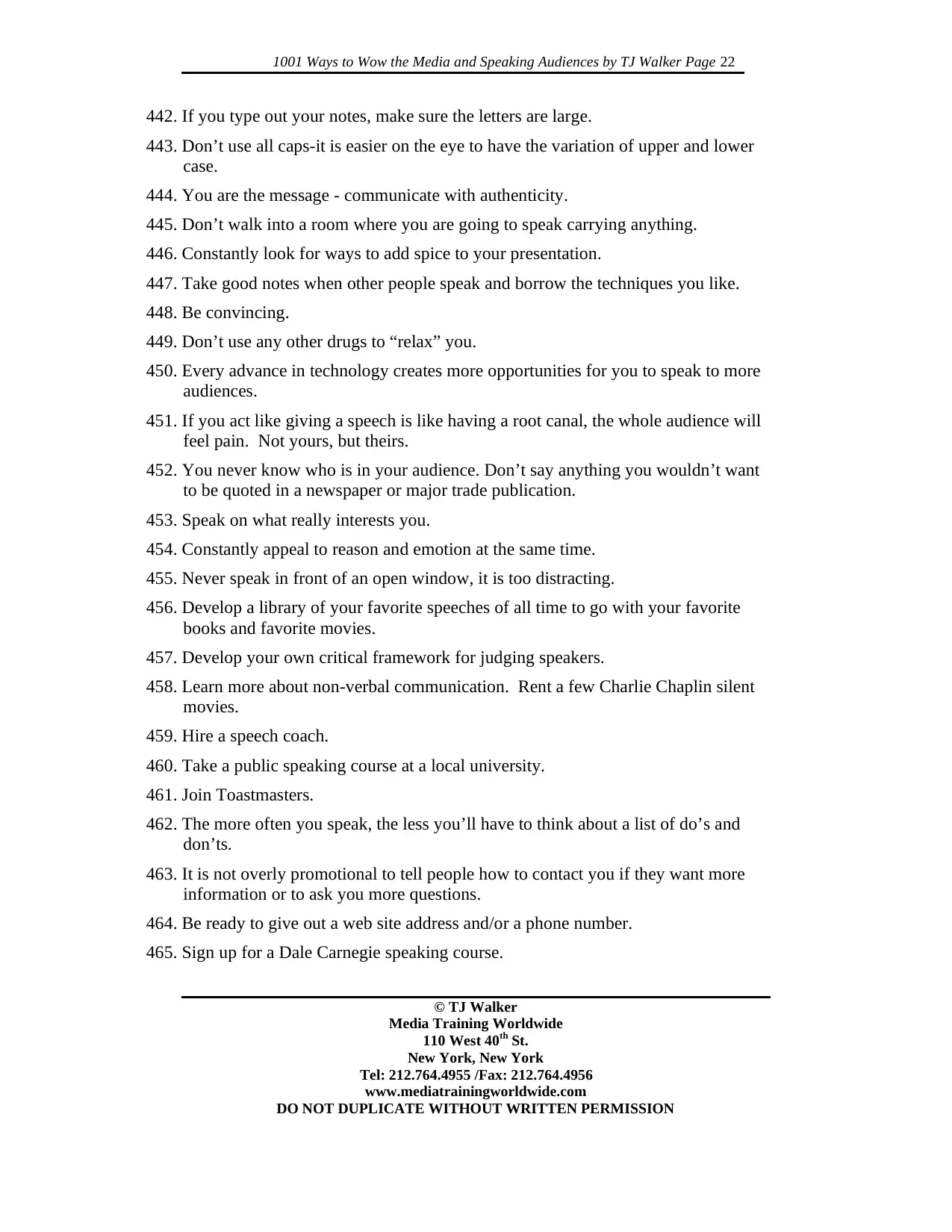
1001 Ways to Wow the Media and Speaking Audiences by TJ Walker Page 22
© TJ Walker
Media Training Worldwide
110 West 40th St.
New York, New York
Tel: 212.764.4955 /Fax: 212.764.4956
www.mediatrainingworldwide.com
DO NOT DUPLICATE WITHOUT WRITTEN PERMISSION
442. If you type out your notes, make sure the letters are large.
443. Don’t use all caps-it is easier on the eye to have the variation of upper and lower
case.
444. You are the message - communicate with authenticity.
445. Don’t walk into a room where you are going to speak carrying anything.
446. Constantly look for ways to add spice to your presentation.
447. Take good notes when other people speak and borrow the techniques you like.
448. Be convincing.
449. Don’t use any other drugs to “relax” you.
450. Every advance in technology creates more opportunities for you to speak to more
audiences.
451. If you act like giving a speech is like having a root canal, the whole audience will
feel pain. Not yours, but theirs.
452. You never know who is in your audience. Don’t say anything you wouldn’t want
to be quoted in a newspaper or major trade publication.
453. Speak on what really interests you.
454. Constantly appeal to reason and emotion at the same time.
455. Never speak in front of an open window, it is too distracting.
456. Develop a library of your favorite speeches of all time to go with your favorite
books and favorite movies.
457. Develop your own critical framework for judging speakers.
458. Learn more about non-verbal communication. Rent a few Charlie Chaplin silent
movies.
459. Hire a speech coach.
460. Take a public speaking course at a local university.
461. Join Toastmasters.
462. The more often you speak, the less you’ll have to think about a list of do’s and
don’ts.
463. It is not overly promotional to tell people how to contact you if they want more
information or to ask you more questions.
464. Be ready to give out a web site address and/or a phone number.
465. Sign up for a Dale Carnegie speaking course.
© TJ Walker
Media Training Worldwide
110 West 40th St.
New York, New York
Tel: 212.764.4955 /Fax: 212.764.4956
www.mediatrainingworldwide.com
DO NOT DUPLICATE WITHOUT WRITTEN PERMISSION
442. If you type out your notes, make sure the letters are large.
443. Don’t use all caps-it is easier on the eye to have the variation of upper and lower
case.
444. You are the message - communicate with authenticity.
445. Don’t walk into a room where you are going to speak carrying anything.
446. Constantly look for ways to add spice to your presentation.
447. Take good notes when other people speak and borrow the techniques you like.
448. Be convincing.
449. Don’t use any other drugs to “relax” you.
450. Every advance in technology creates more opportunities for you to speak to more
audiences.
451. If you act like giving a speech is like having a root canal, the whole audience will
feel pain. Not yours, but theirs.
452. You never know who is in your audience. Don’t say anything you wouldn’t want
to be quoted in a newspaper or major trade publication.
453. Speak on what really interests you.
454. Constantly appeal to reason and emotion at the same time.
455. Never speak in front of an open window, it is too distracting.
456. Develop a library of your favorite speeches of all time to go with your favorite
books and favorite movies.
457. Develop your own critical framework for judging speakers.
458. Learn more about non-verbal communication. Rent a few Charlie Chaplin silent
movies.
459. Hire a speech coach.
460. Take a public speaking course at a local university.
461. Join Toastmasters.
462. The more often you speak, the less you’ll have to think about a list of do’s and
don’ts.
463. It is not overly promotional to tell people how to contact you if they want more
information or to ask you more questions.
464. Be ready to give out a web site address and/or a phone number.
465. Sign up for a Dale Carnegie speaking course.
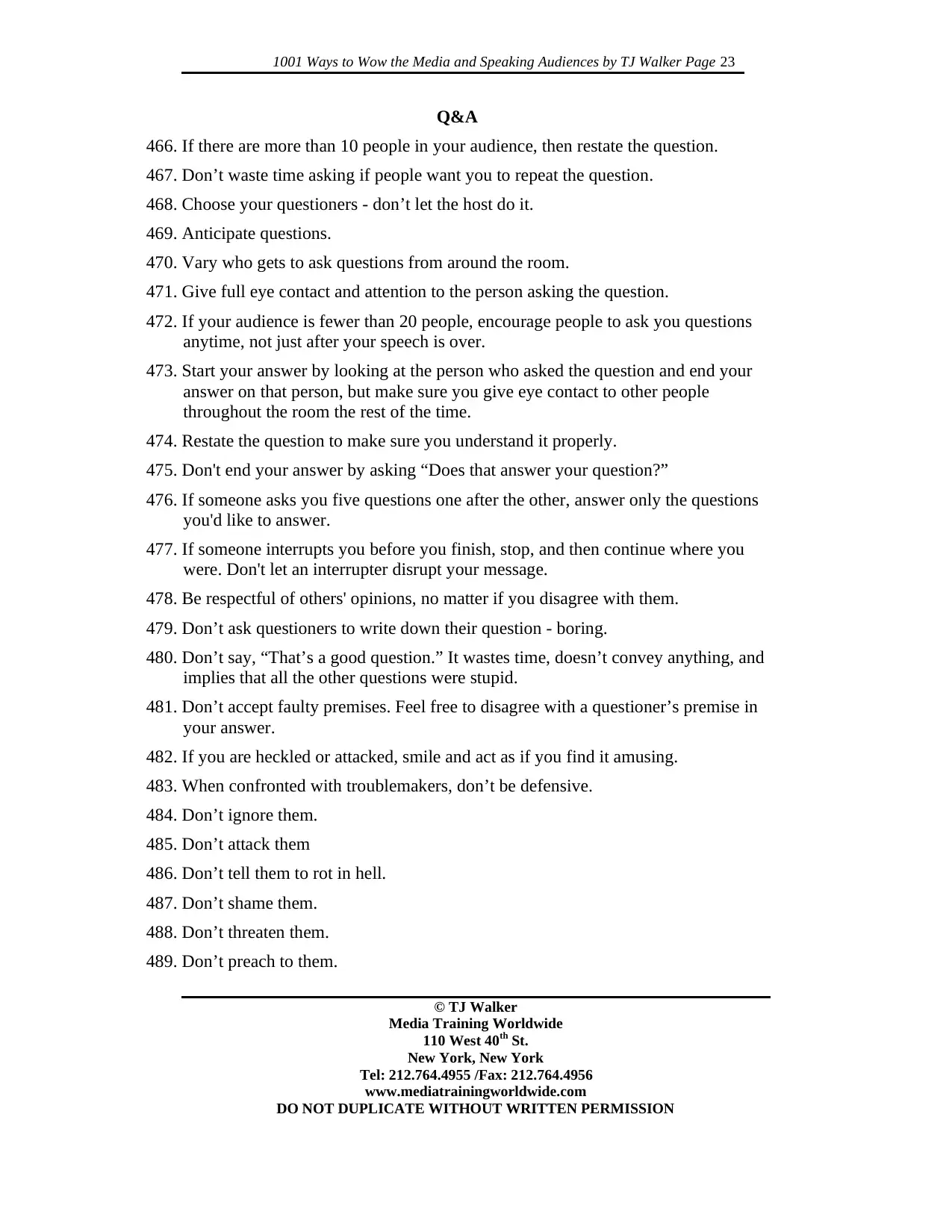
1001 Ways to Wow the Media and Speaking Audiences by TJ Walker Page 23
© TJ Walker
Media Training Worldwide
110 West 40th St.
New York, New York
Tel: 212.764.4955 /Fax: 212.764.4956
www.mediatrainingworldwide.com
DO NOT DUPLICATE WITHOUT WRITTEN PERMISSION
Q&A
466. If there are more than 10 people in your audience, then restate the question.
467. Don’t waste time asking if people want you to repeat the question.
468. Choose your questioners - don’t let the host do it.
469. Anticipate questions.
470. Vary who gets to ask questions from around the room.
471. Give full eye contact and attention to the person asking the question.
472. If your audience is fewer than 20 people, encourage people to ask you questions
anytime, not just after your speech is over.
473. Start your answer by looking at the person who asked the question and end your
answer on that person, but make sure you give eye contact to other people
throughout the room the rest of the time.
474. Restate the question to make sure you understand it properly.
475. Don't end your answer by asking “Does that answer your question?”
476. If someone asks you five questions one after the other, answer only the questions
you'd like to answer.
477. If someone interrupts you before you finish, stop, and then continue where you
were. Don't let an interrupter disrupt your message.
478. Be respectful of others' opinions, no matter if you disagree with them.
479. Don’t ask questioners to write down their question - boring.
480. Don’t say, “That’s a good question.” It wastes time, doesn’t convey anything, and
implies that all the other questions were stupid.
481. Don’t accept faulty premises. Feel free to disagree with a questioner’s premise in
your answer.
482. If you are heckled or attacked, smile and act as if you find it amusing.
483. When confronted with troublemakers, don’t be defensive.
484. Don’t ignore them.
485. Don’t attack them
486. Don’t tell them to rot in hell.
487. Don’t shame them.
488. Don’t threaten them.
489. Don’t preach to them.
© TJ Walker
Media Training Worldwide
110 West 40th St.
New York, New York
Tel: 212.764.4955 /Fax: 212.764.4956
www.mediatrainingworldwide.com
DO NOT DUPLICATE WITHOUT WRITTEN PERMISSION
Q&A
466. If there are more than 10 people in your audience, then restate the question.
467. Don’t waste time asking if people want you to repeat the question.
468. Choose your questioners - don’t let the host do it.
469. Anticipate questions.
470. Vary who gets to ask questions from around the room.
471. Give full eye contact and attention to the person asking the question.
472. If your audience is fewer than 20 people, encourage people to ask you questions
anytime, not just after your speech is over.
473. Start your answer by looking at the person who asked the question and end your
answer on that person, but make sure you give eye contact to other people
throughout the room the rest of the time.
474. Restate the question to make sure you understand it properly.
475. Don't end your answer by asking “Does that answer your question?”
476. If someone asks you five questions one after the other, answer only the questions
you'd like to answer.
477. If someone interrupts you before you finish, stop, and then continue where you
were. Don't let an interrupter disrupt your message.
478. Be respectful of others' opinions, no matter if you disagree with them.
479. Don’t ask questioners to write down their question - boring.
480. Don’t say, “That’s a good question.” It wastes time, doesn’t convey anything, and
implies that all the other questions were stupid.
481. Don’t accept faulty premises. Feel free to disagree with a questioner’s premise in
your answer.
482. If you are heckled or attacked, smile and act as if you find it amusing.
483. When confronted with troublemakers, don’t be defensive.
484. Don’t ignore them.
485. Don’t attack them
486. Don’t tell them to rot in hell.
487. Don’t shame them.
488. Don’t threaten them.
489. Don’t preach to them.
Paraphrase This Document
Need a fresh take? Get an instant paraphrase of this document with our AI Paraphraser
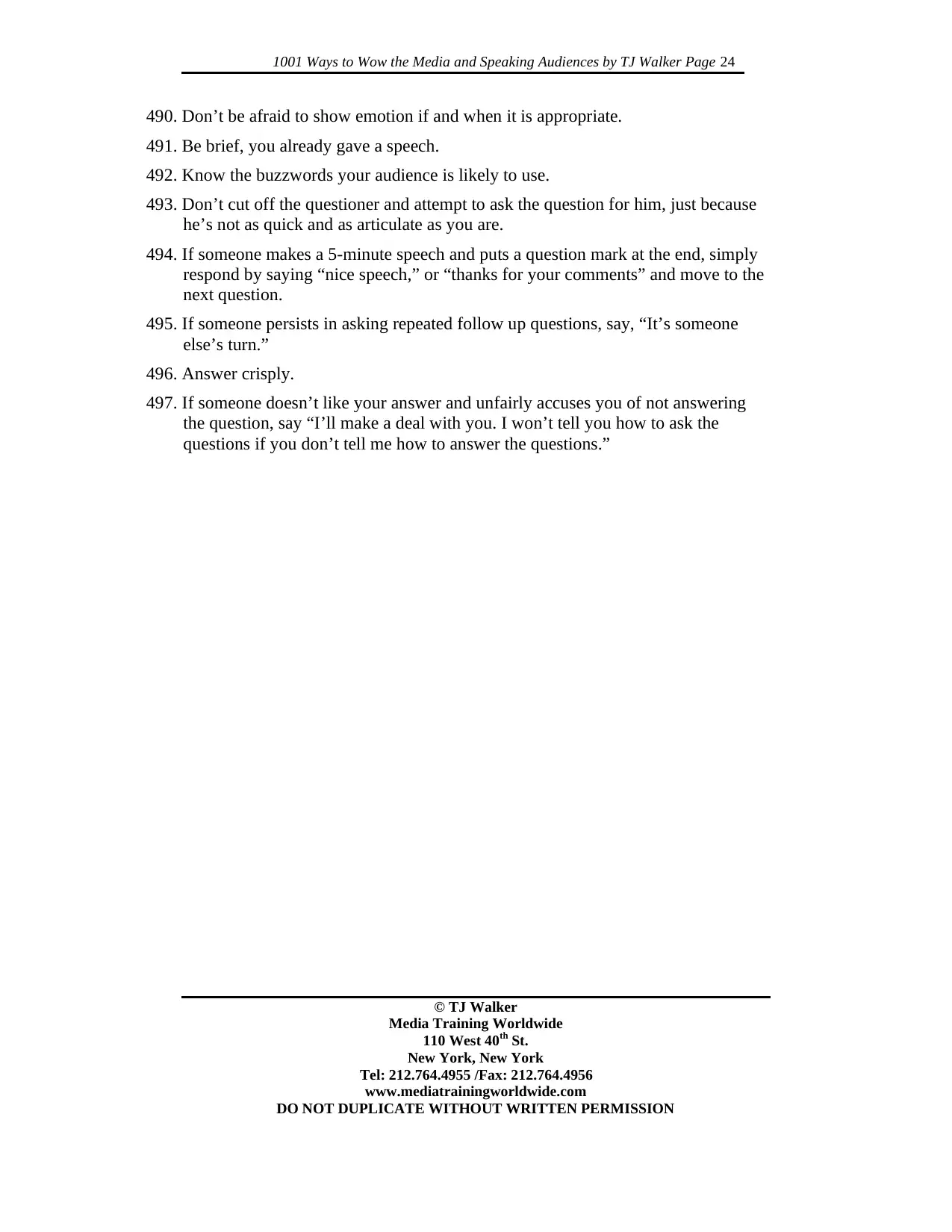
1001 Ways to Wow the Media and Speaking Audiences by TJ Walker Page 24
© TJ Walker
Media Training Worldwide
110 West 40th St.
New York, New York
Tel: 212.764.4955 /Fax: 212.764.4956
www.mediatrainingworldwide.com
DO NOT DUPLICATE WITHOUT WRITTEN PERMISSION
490. Don’t be afraid to show emotion if and when it is appropriate.
491. Be brief, you already gave a speech.
492. Know the buzzwords your audience is likely to use.
493. Don’t cut off the questioner and attempt to ask the question for him, just because
he’s not as quick and as articulate as you are.
494. If someone makes a 5-minute speech and puts a question mark at the end, simply
respond by saying “nice speech,” or “thanks for your comments” and move to the
next question.
495. If someone persists in asking repeated follow up questions, say, “It’s someone
else’s turn.”
496. Answer crisply.
497. If someone doesn’t like your answer and unfairly accuses you of not answering
the question, say “I’ll make a deal with you. I won’t tell you how to ask the
questions if you don’t tell me how to answer the questions.”
© TJ Walker
Media Training Worldwide
110 West 40th St.
New York, New York
Tel: 212.764.4955 /Fax: 212.764.4956
www.mediatrainingworldwide.com
DO NOT DUPLICATE WITHOUT WRITTEN PERMISSION
490. Don’t be afraid to show emotion if and when it is appropriate.
491. Be brief, you already gave a speech.
492. Know the buzzwords your audience is likely to use.
493. Don’t cut off the questioner and attempt to ask the question for him, just because
he’s not as quick and as articulate as you are.
494. If someone makes a 5-minute speech and puts a question mark at the end, simply
respond by saying “nice speech,” or “thanks for your comments” and move to the
next question.
495. If someone persists in asking repeated follow up questions, say, “It’s someone
else’s turn.”
496. Answer crisply.
497. If someone doesn’t like your answer and unfairly accuses you of not answering
the question, say “I’ll make a deal with you. I won’t tell you how to ask the
questions if you don’t tell me how to answer the questions.”
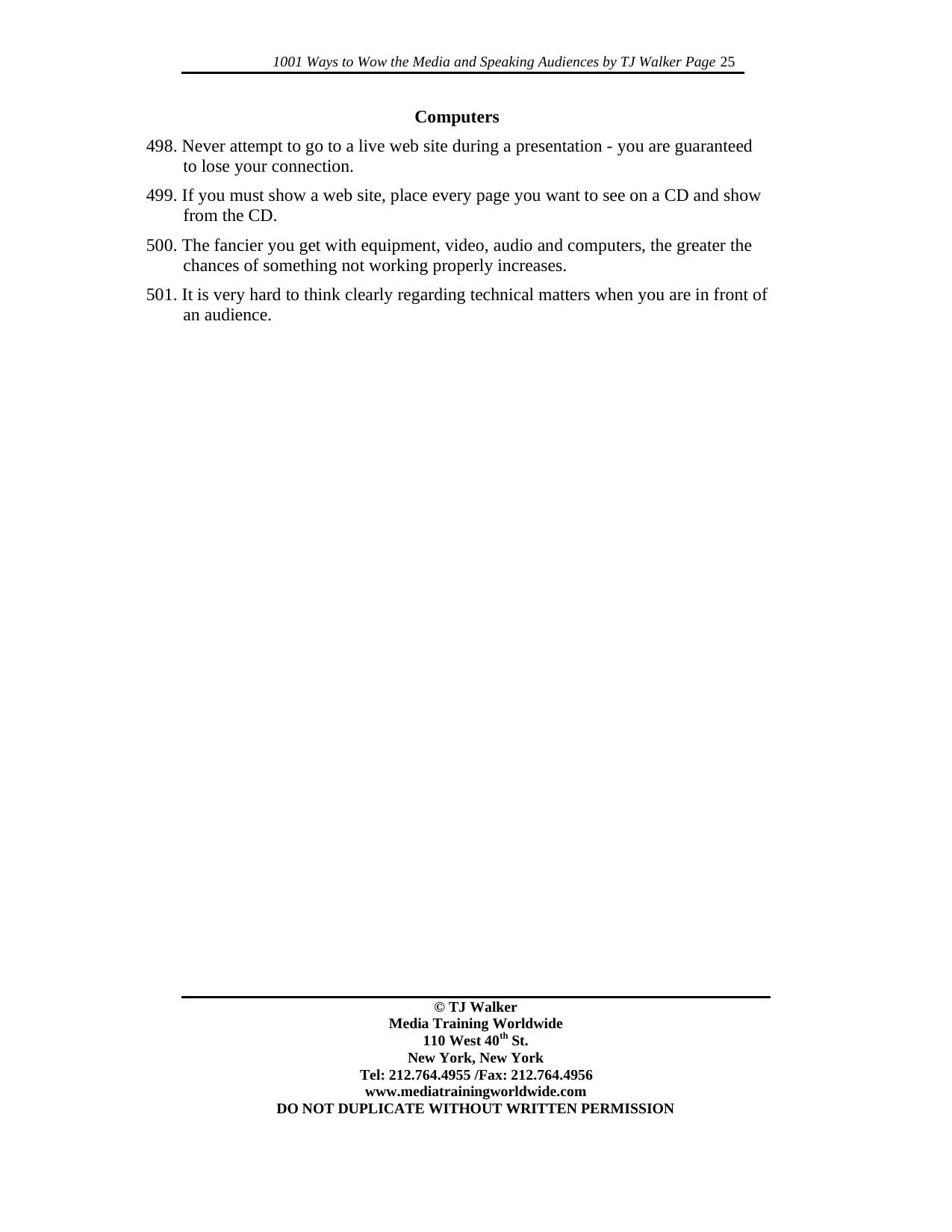
1001 Ways to Wow the Media and Speaking Audiences by TJ Walker Page 25
© TJ Walker
Media Training Worldwide
110 West 40th St.
New York, New York
Tel: 212.764.4955 /Fax: 212.764.4956
www.mediatrainingworldwide.com
DO NOT DUPLICATE WITHOUT WRITTEN PERMISSION
Computers
498. Never attempt to go to a live web site during a presentation - you are guaranteed
to lose your connection.
499. If you must show a web site, place every page you want to see on a CD and show
from the CD.
500. The fancier you get with equipment, video, audio and computers, the greater the
chances of something not working properly increases.
501. It is very hard to think clearly regarding technical matters when you are in front of
an audience.
© TJ Walker
Media Training Worldwide
110 West 40th St.
New York, New York
Tel: 212.764.4955 /Fax: 212.764.4956
www.mediatrainingworldwide.com
DO NOT DUPLICATE WITHOUT WRITTEN PERMISSION
Computers
498. Never attempt to go to a live web site during a presentation - you are guaranteed
to lose your connection.
499. If you must show a web site, place every page you want to see on a CD and show
from the CD.
500. The fancier you get with equipment, video, audio and computers, the greater the
chances of something not working properly increases.
501. It is very hard to think clearly regarding technical matters when you are in front of
an audience.
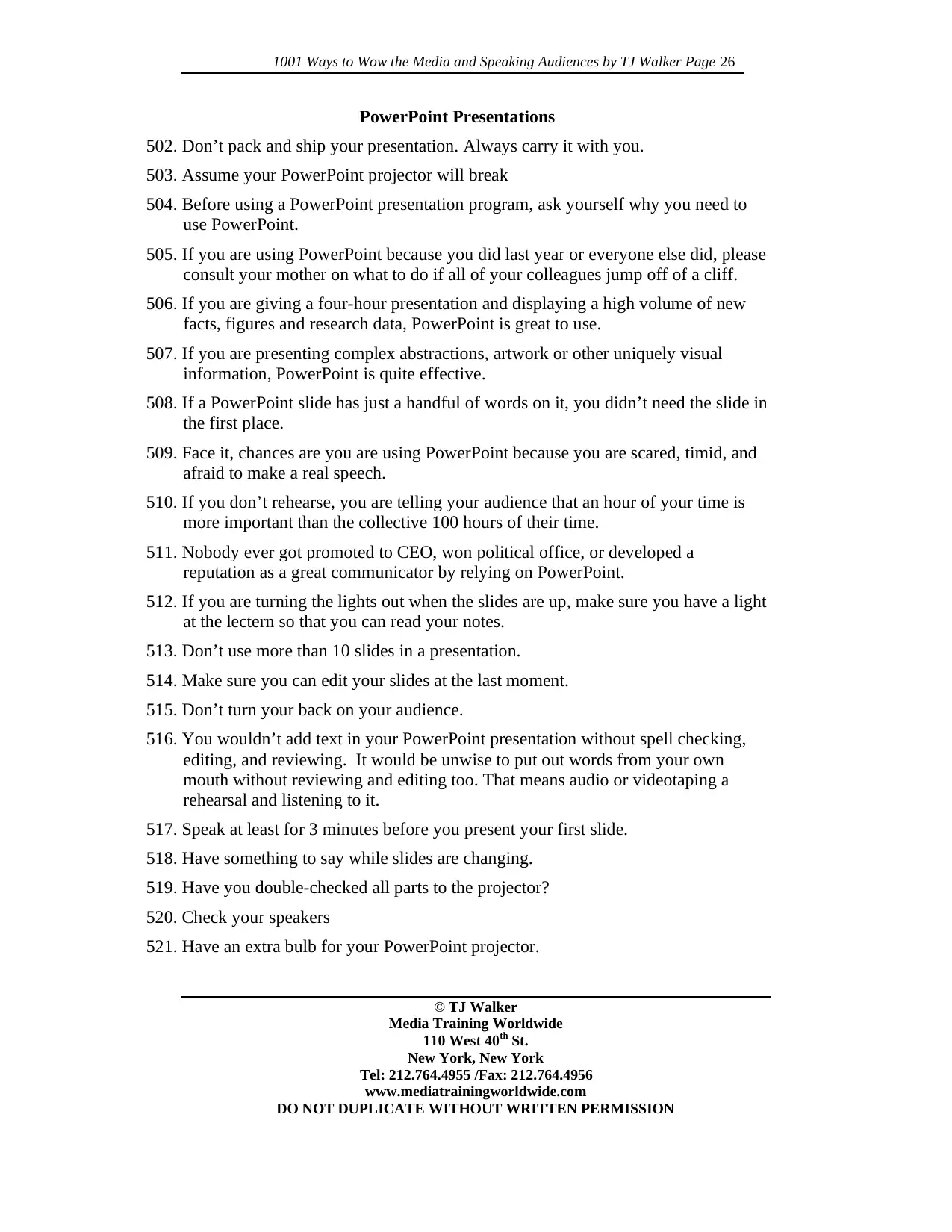
1001 Ways to Wow the Media and Speaking Audiences by TJ Walker Page 26
© TJ Walker
Media Training Worldwide
110 West 40th St.
New York, New York
Tel: 212.764.4955 /Fax: 212.764.4956
www.mediatrainingworldwide.com
DO NOT DUPLICATE WITHOUT WRITTEN PERMISSION
PowerPoint Presentations
502. Don’t pack and ship your presentation. Always carry it with you.
503. Assume your PowerPoint projector will break
504. Before using a PowerPoint presentation program, ask yourself why you need to
use PowerPoint.
505. If you are using PowerPoint because you did last year or everyone else did, please
consult your mother on what to do if all of your colleagues jump off of a cliff.
506. If you are giving a four-hour presentation and displaying a high volume of new
facts, figures and research data, PowerPoint is great to use.
507. If you are presenting complex abstractions, artwork or other uniquely visual
information, PowerPoint is quite effective.
508. If a PowerPoint slide has just a handful of words on it, you didn’t need the slide in
the first place.
509. Face it, chances are you are using PowerPoint because you are scared, timid, and
afraid to make a real speech.
510. If you don’t rehearse, you are telling your audience that an hour of your time is
more important than the collective 100 hours of their time.
511. Nobody ever got promoted to CEO, won political office, or developed a
reputation as a great communicator by relying on PowerPoint.
512. If you are turning the lights out when the slides are up, make sure you have a light
at the lectern so that you can read your notes.
513. Don’t use more than 10 slides in a presentation.
514. Make sure you can edit your slides at the last moment.
515. Don’t turn your back on your audience.
516. You wouldn’t add text in your PowerPoint presentation without spell checking,
editing, and reviewing. It would be unwise to put out words from your own
mouth without reviewing and editing too. That means audio or videotaping a
rehearsal and listening to it.
517. Speak at least for 3 minutes before you present your first slide.
518. Have something to say while slides are changing.
519. Have you double-checked all parts to the projector?
520. Check your speakers
521. Have an extra bulb for your PowerPoint projector.
© TJ Walker
Media Training Worldwide
110 West 40th St.
New York, New York
Tel: 212.764.4955 /Fax: 212.764.4956
www.mediatrainingworldwide.com
DO NOT DUPLICATE WITHOUT WRITTEN PERMISSION
PowerPoint Presentations
502. Don’t pack and ship your presentation. Always carry it with you.
503. Assume your PowerPoint projector will break
504. Before using a PowerPoint presentation program, ask yourself why you need to
use PowerPoint.
505. If you are using PowerPoint because you did last year or everyone else did, please
consult your mother on what to do if all of your colleagues jump off of a cliff.
506. If you are giving a four-hour presentation and displaying a high volume of new
facts, figures and research data, PowerPoint is great to use.
507. If you are presenting complex abstractions, artwork or other uniquely visual
information, PowerPoint is quite effective.
508. If a PowerPoint slide has just a handful of words on it, you didn’t need the slide in
the first place.
509. Face it, chances are you are using PowerPoint because you are scared, timid, and
afraid to make a real speech.
510. If you don’t rehearse, you are telling your audience that an hour of your time is
more important than the collective 100 hours of their time.
511. Nobody ever got promoted to CEO, won political office, or developed a
reputation as a great communicator by relying on PowerPoint.
512. If you are turning the lights out when the slides are up, make sure you have a light
at the lectern so that you can read your notes.
513. Don’t use more than 10 slides in a presentation.
514. Make sure you can edit your slides at the last moment.
515. Don’t turn your back on your audience.
516. You wouldn’t add text in your PowerPoint presentation without spell checking,
editing, and reviewing. It would be unwise to put out words from your own
mouth without reviewing and editing too. That means audio or videotaping a
rehearsal and listening to it.
517. Speak at least for 3 minutes before you present your first slide.
518. Have something to say while slides are changing.
519. Have you double-checked all parts to the projector?
520. Check your speakers
521. Have an extra bulb for your PowerPoint projector.
Secure Best Marks with AI Grader
Need help grading? Try our AI Grader for instant feedback on your assignments.
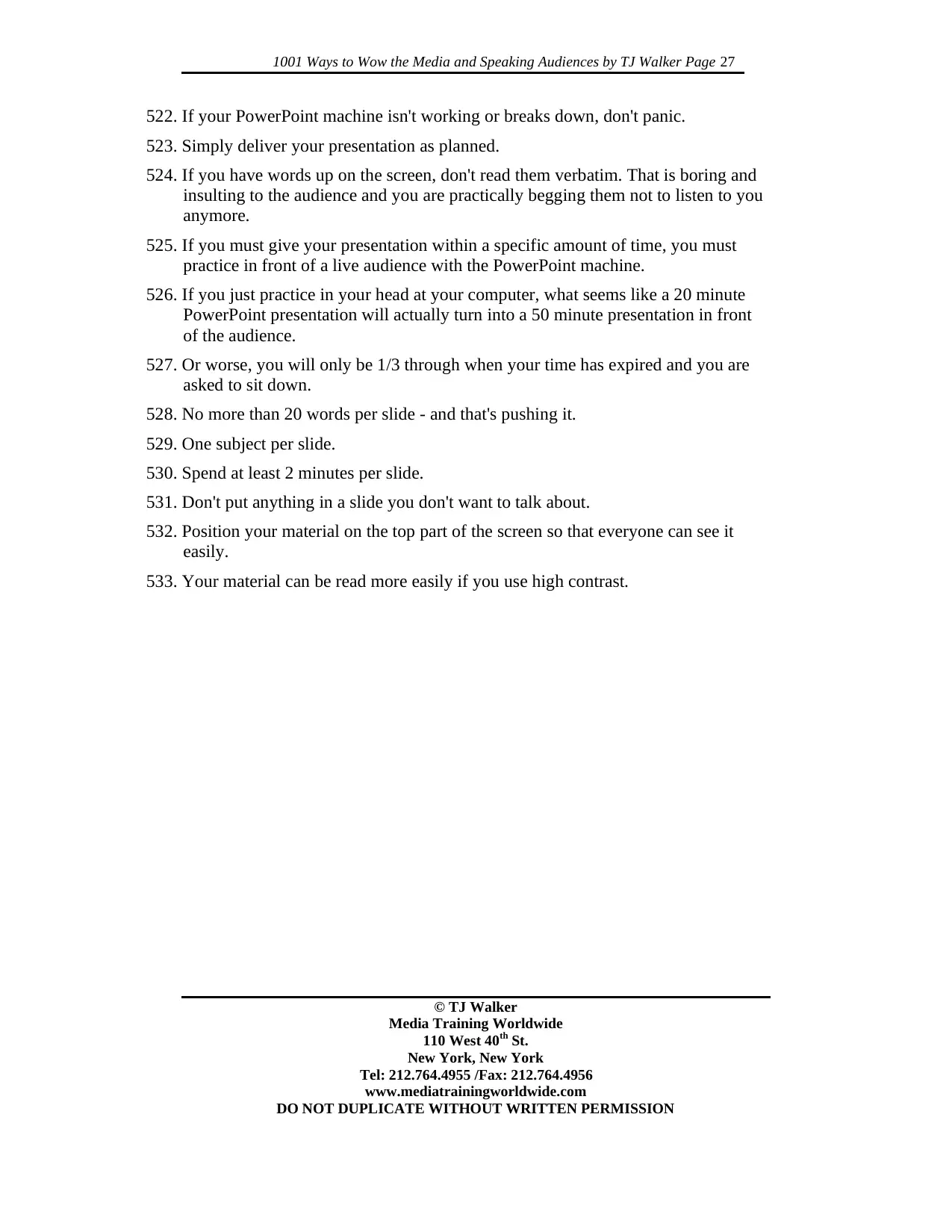
1001 Ways to Wow the Media and Speaking Audiences by TJ Walker Page 27
© TJ Walker
Media Training Worldwide
110 West 40th St.
New York, New York
Tel: 212.764.4955 /Fax: 212.764.4956
www.mediatrainingworldwide.com
DO NOT DUPLICATE WITHOUT WRITTEN PERMISSION
522. If your PowerPoint machine isn't working or breaks down, don't panic.
523. Simply deliver your presentation as planned.
524. If you have words up on the screen, don't read them verbatim. That is boring and
insulting to the audience and you are practically begging them not to listen to you
anymore.
525. If you must give your presentation within a specific amount of time, you must
practice in front of a live audience with the PowerPoint machine.
526. If you just practice in your head at your computer, what seems like a 20 minute
PowerPoint presentation will actually turn into a 50 minute presentation in front
of the audience.
527. Or worse, you will only be 1/3 through when your time has expired and you are
asked to sit down.
528. No more than 20 words per slide - and that's pushing it.
529. One subject per slide.
530. Spend at least 2 minutes per slide.
531. Don't put anything in a slide you don't want to talk about.
532. Position your material on the top part of the screen so that everyone can see it
easily.
533. Your material can be read more easily if you use high contrast.
© TJ Walker
Media Training Worldwide
110 West 40th St.
New York, New York
Tel: 212.764.4955 /Fax: 212.764.4956
www.mediatrainingworldwide.com
DO NOT DUPLICATE WITHOUT WRITTEN PERMISSION
522. If your PowerPoint machine isn't working or breaks down, don't panic.
523. Simply deliver your presentation as planned.
524. If you have words up on the screen, don't read them verbatim. That is boring and
insulting to the audience and you are practically begging them not to listen to you
anymore.
525. If you must give your presentation within a specific amount of time, you must
practice in front of a live audience with the PowerPoint machine.
526. If you just practice in your head at your computer, what seems like a 20 minute
PowerPoint presentation will actually turn into a 50 minute presentation in front
of the audience.
527. Or worse, you will only be 1/3 through when your time has expired and you are
asked to sit down.
528. No more than 20 words per slide - and that's pushing it.
529. One subject per slide.
530. Spend at least 2 minutes per slide.
531. Don't put anything in a slide you don't want to talk about.
532. Position your material on the top part of the screen so that everyone can see it
easily.
533. Your material can be read more easily if you use high contrast.
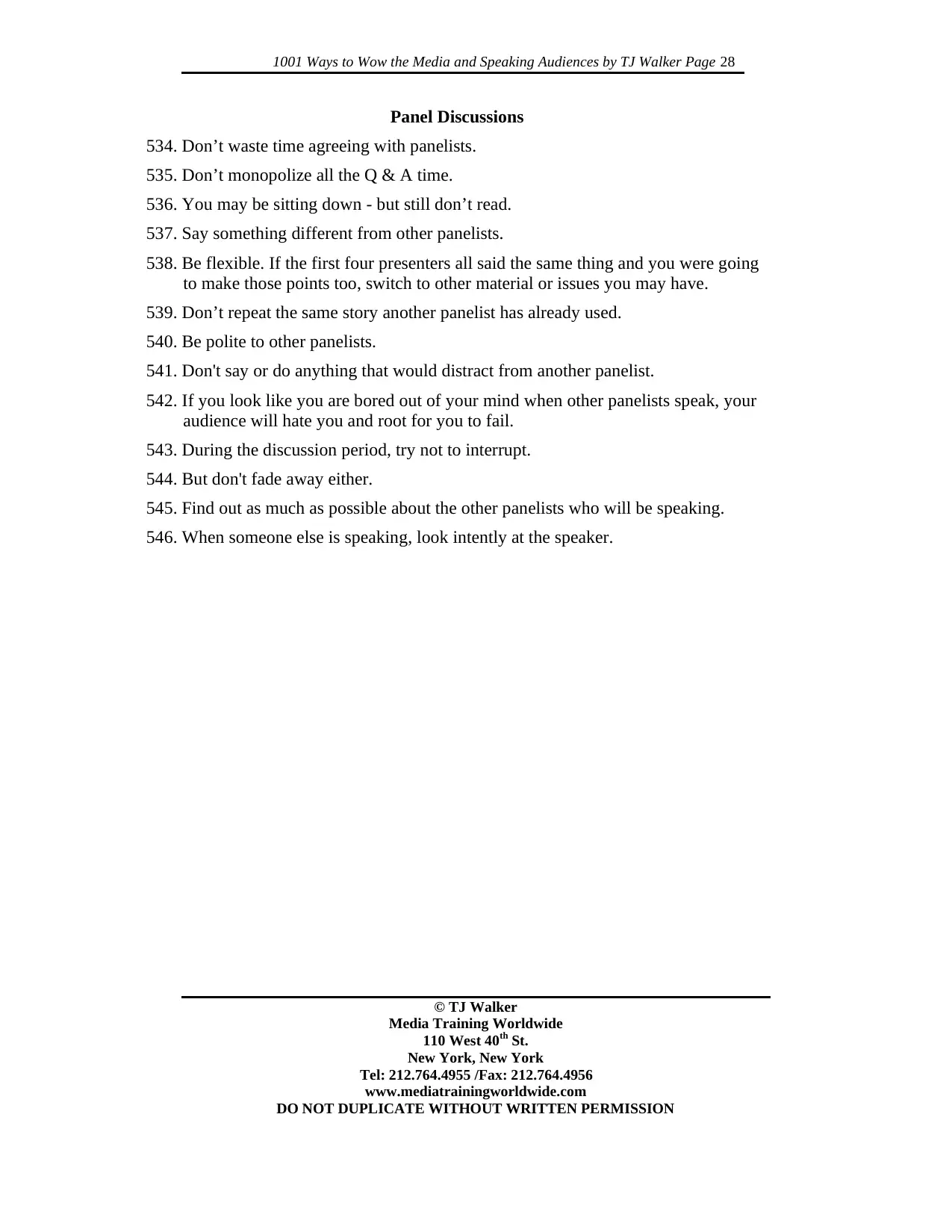
1001 Ways to Wow the Media and Speaking Audiences by TJ Walker Page 28
© TJ Walker
Media Training Worldwide
110 West 40th St.
New York, New York
Tel: 212.764.4955 /Fax: 212.764.4956
www.mediatrainingworldwide.com
DO NOT DUPLICATE WITHOUT WRITTEN PERMISSION
Panel Discussions
534. Don’t waste time agreeing with panelists.
535. Don’t monopolize all the Q & A time.
536. You may be sitting down - but still don’t read.
537. Say something different from other panelists.
538. Be flexible. If the first four presenters all said the same thing and you were going
to make those points too, switch to other material or issues you may have.
539. Don’t repeat the same story another panelist has already used.
540. Be polite to other panelists.
541. Don't say or do anything that would distract from another panelist.
542. If you look like you are bored out of your mind when other panelists speak, your
audience will hate you and root for you to fail.
543. During the discussion period, try not to interrupt.
544. But don't fade away either.
545. Find out as much as possible about the other panelists who will be speaking.
546. When someone else is speaking, look intently at the speaker.
© TJ Walker
Media Training Worldwide
110 West 40th St.
New York, New York
Tel: 212.764.4955 /Fax: 212.764.4956
www.mediatrainingworldwide.com
DO NOT DUPLICATE WITHOUT WRITTEN PERMISSION
Panel Discussions
534. Don’t waste time agreeing with panelists.
535. Don’t monopolize all the Q & A time.
536. You may be sitting down - but still don’t read.
537. Say something different from other panelists.
538. Be flexible. If the first four presenters all said the same thing and you were going
to make those points too, switch to other material or issues you may have.
539. Don’t repeat the same story another panelist has already used.
540. Be polite to other panelists.
541. Don't say or do anything that would distract from another panelist.
542. If you look like you are bored out of your mind when other panelists speak, your
audience will hate you and root for you to fail.
543. During the discussion period, try not to interrupt.
544. But don't fade away either.
545. Find out as much as possible about the other panelists who will be speaking.
546. When someone else is speaking, look intently at the speaker.
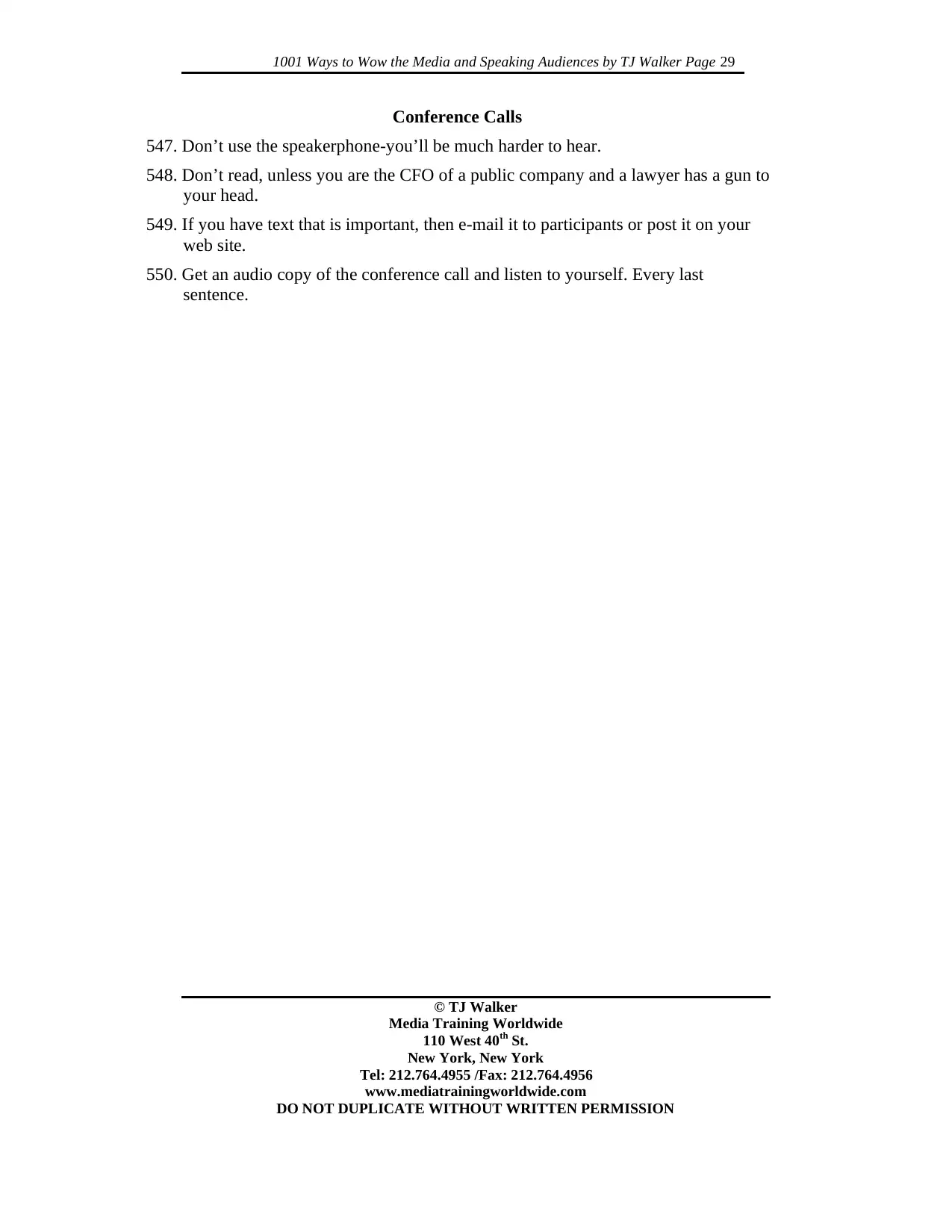
1001 Ways to Wow the Media and Speaking Audiences by TJ Walker Page 29
© TJ Walker
Media Training Worldwide
110 West 40th St.
New York, New York
Tel: 212.764.4955 /Fax: 212.764.4956
www.mediatrainingworldwide.com
DO NOT DUPLICATE WITHOUT WRITTEN PERMISSION
Conference Calls
547. Don’t use the speakerphone-you’ll be much harder to hear.
548. Don’t read, unless you are the CFO of a public company and a lawyer has a gun to
your head.
549. If you have text that is important, then e-mail it to participants or post it on your
web site.
550. Get an audio copy of the conference call and listen to yourself. Every last
sentence.
© TJ Walker
Media Training Worldwide
110 West 40th St.
New York, New York
Tel: 212.764.4955 /Fax: 212.764.4956
www.mediatrainingworldwide.com
DO NOT DUPLICATE WITHOUT WRITTEN PERMISSION
Conference Calls
547. Don’t use the speakerphone-you’ll be much harder to hear.
548. Don’t read, unless you are the CFO of a public company and a lawyer has a gun to
your head.
549. If you have text that is important, then e-mail it to participants or post it on your
web site.
550. Get an audio copy of the conference call and listen to yourself. Every last
sentence.
Paraphrase This Document
Need a fresh take? Get an instant paraphrase of this document with our AI Paraphraser
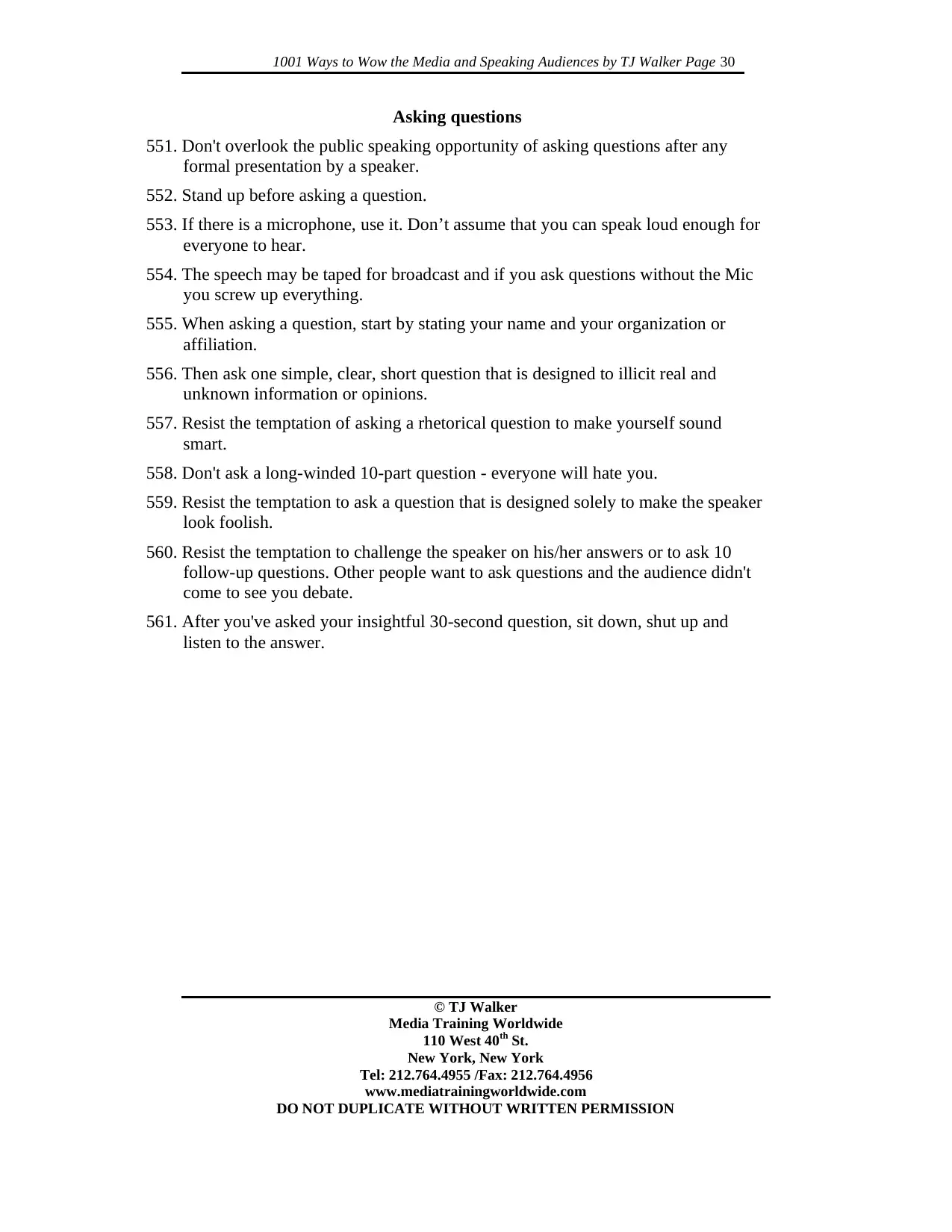
1001 Ways to Wow the Media and Speaking Audiences by TJ Walker Page 30
© TJ Walker
Media Training Worldwide
110 West 40th St.
New York, New York
Tel: 212.764.4955 /Fax: 212.764.4956
www.mediatrainingworldwide.com
DO NOT DUPLICATE WITHOUT WRITTEN PERMISSION
Asking questions
551. Don't overlook the public speaking opportunity of asking questions after any
formal presentation by a speaker.
552. Stand up before asking a question.
553. If there is a microphone, use it. Don’t assume that you can speak loud enough for
everyone to hear.
554. The speech may be taped for broadcast and if you ask questions without the Mic
you screw up everything.
555. When asking a question, start by stating your name and your organization or
affiliation.
556. Then ask one simple, clear, short question that is designed to illicit real and
unknown information or opinions.
557. Resist the temptation of asking a rhetorical question to make yourself sound
smart.
558. Don't ask a long-winded 10-part question - everyone will hate you.
559. Resist the temptation to ask a question that is designed solely to make the speaker
look foolish.
560. Resist the temptation to challenge the speaker on his/her answers or to ask 10
follow-up questions. Other people want to ask questions and the audience didn't
come to see you debate.
561. After you've asked your insightful 30-second question, sit down, shut up and
listen to the answer.
© TJ Walker
Media Training Worldwide
110 West 40th St.
New York, New York
Tel: 212.764.4955 /Fax: 212.764.4956
www.mediatrainingworldwide.com
DO NOT DUPLICATE WITHOUT WRITTEN PERMISSION
Asking questions
551. Don't overlook the public speaking opportunity of asking questions after any
formal presentation by a speaker.
552. Stand up before asking a question.
553. If there is a microphone, use it. Don’t assume that you can speak loud enough for
everyone to hear.
554. The speech may be taped for broadcast and if you ask questions without the Mic
you screw up everything.
555. When asking a question, start by stating your name and your organization or
affiliation.
556. Then ask one simple, clear, short question that is designed to illicit real and
unknown information or opinions.
557. Resist the temptation of asking a rhetorical question to make yourself sound
smart.
558. Don't ask a long-winded 10-part question - everyone will hate you.
559. Resist the temptation to ask a question that is designed solely to make the speaker
look foolish.
560. Resist the temptation to challenge the speaker on his/her answers or to ask 10
follow-up questions. Other people want to ask questions and the audience didn't
come to see you debate.
561. After you've asked your insightful 30-second question, sit down, shut up and
listen to the answer.
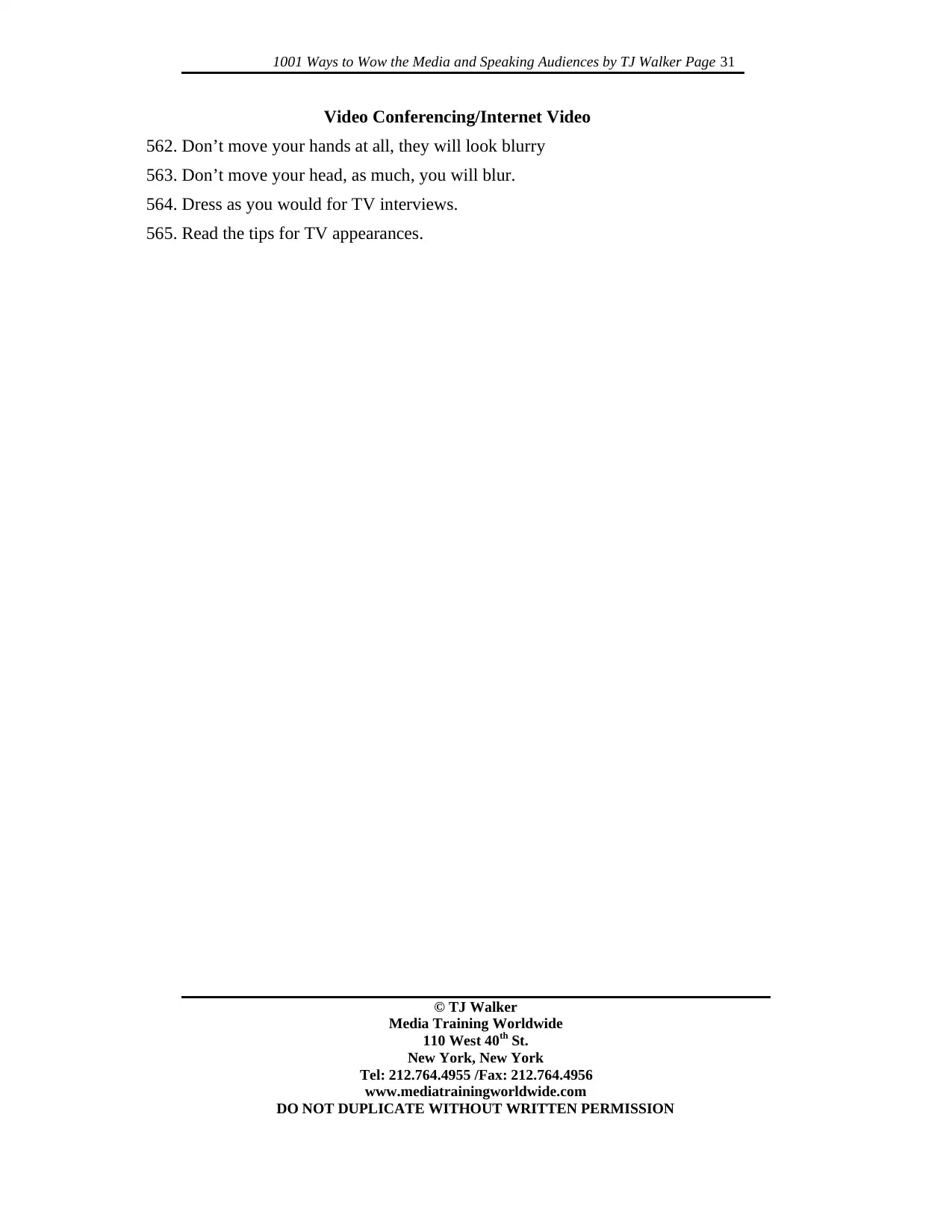
1001 Ways to Wow the Media and Speaking Audiences by TJ Walker Page 31
© TJ Walker
Media Training Worldwide
110 West 40th St.
New York, New York
Tel: 212.764.4955 /Fax: 212.764.4956
www.mediatrainingworldwide.com
DO NOT DUPLICATE WITHOUT WRITTEN PERMISSION
Video Conferencing/Internet Video
562. Don’t move your hands at all, they will look blurry
563. Don’t move your head, as much, you will blur.
564. Dress as you would for TV interviews.
565. Read the tips for TV appearances.
© TJ Walker
Media Training Worldwide
110 West 40th St.
New York, New York
Tel: 212.764.4955 /Fax: 212.764.4956
www.mediatrainingworldwide.com
DO NOT DUPLICATE WITHOUT WRITTEN PERMISSION
Video Conferencing/Internet Video
562. Don’t move your hands at all, they will look blurry
563. Don’t move your head, as much, you will blur.
564. Dress as you would for TV interviews.
565. Read the tips for TV appearances.
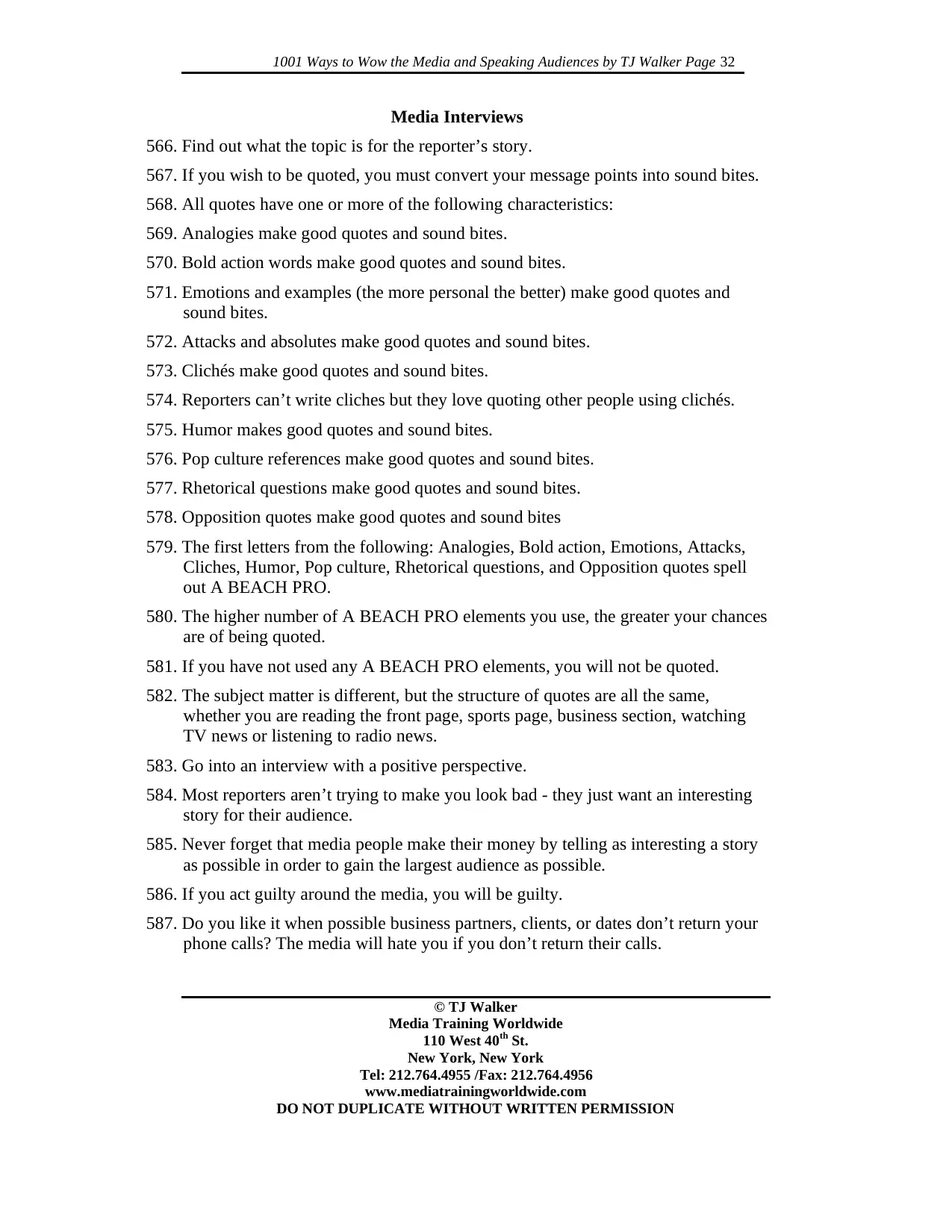
1001 Ways to Wow the Media and Speaking Audiences by TJ Walker Page 32
© TJ Walker
Media Training Worldwide
110 West 40th St.
New York, New York
Tel: 212.764.4955 /Fax: 212.764.4956
www.mediatrainingworldwide.com
DO NOT DUPLICATE WITHOUT WRITTEN PERMISSION
Media Interviews
566. Find out what the topic is for the reporter’s story.
567. If you wish to be quoted, you must convert your message points into sound bites.
568. All quotes have one or more of the following characteristics:
569. Analogies make good quotes and sound bites.
570. Bold action words make good quotes and sound bites.
571. Emotions and examples (the more personal the better) make good quotes and
sound bites.
572. Attacks and absolutes make good quotes and sound bites.
573. Clichés make good quotes and sound bites.
574. Reporters can’t write cliches but they love quoting other people using clichés.
575. Humor makes good quotes and sound bites.
576. Pop culture references make good quotes and sound bites.
577. Rhetorical questions make good quotes and sound bites.
578. Opposition quotes make good quotes and sound bites
579. The first letters from the following: Analogies, Bold action, Emotions, Attacks,
Cliches, Humor, Pop culture, Rhetorical questions, and Opposition quotes spell
out A BEACH PRO.
580. The higher number of A BEACH PRO elements you use, the greater your chances
are of being quoted.
581. If you have not used any A BEACH PRO elements, you will not be quoted.
582. The subject matter is different, but the structure of quotes are all the same,
whether you are reading the front page, sports page, business section, watching
TV news or listening to radio news.
583. Go into an interview with a positive perspective.
584. Most reporters aren’t trying to make you look bad - they just want an interesting
story for their audience.
585. Never forget that media people make their money by telling as interesting a story
as possible in order to gain the largest audience as possible.
586. If you act guilty around the media, you will be guilty.
587. Do you like it when possible business partners, clients, or dates don’t return your
phone calls? The media will hate you if you don’t return their calls.
© TJ Walker
Media Training Worldwide
110 West 40th St.
New York, New York
Tel: 212.764.4955 /Fax: 212.764.4956
www.mediatrainingworldwide.com
DO NOT DUPLICATE WITHOUT WRITTEN PERMISSION
Media Interviews
566. Find out what the topic is for the reporter’s story.
567. If you wish to be quoted, you must convert your message points into sound bites.
568. All quotes have one or more of the following characteristics:
569. Analogies make good quotes and sound bites.
570. Bold action words make good quotes and sound bites.
571. Emotions and examples (the more personal the better) make good quotes and
sound bites.
572. Attacks and absolutes make good quotes and sound bites.
573. Clichés make good quotes and sound bites.
574. Reporters can’t write cliches but they love quoting other people using clichés.
575. Humor makes good quotes and sound bites.
576. Pop culture references make good quotes and sound bites.
577. Rhetorical questions make good quotes and sound bites.
578. Opposition quotes make good quotes and sound bites
579. The first letters from the following: Analogies, Bold action, Emotions, Attacks,
Cliches, Humor, Pop culture, Rhetorical questions, and Opposition quotes spell
out A BEACH PRO.
580. The higher number of A BEACH PRO elements you use, the greater your chances
are of being quoted.
581. If you have not used any A BEACH PRO elements, you will not be quoted.
582. The subject matter is different, but the structure of quotes are all the same,
whether you are reading the front page, sports page, business section, watching
TV news or listening to radio news.
583. Go into an interview with a positive perspective.
584. Most reporters aren’t trying to make you look bad - they just want an interesting
story for their audience.
585. Never forget that media people make their money by telling as interesting a story
as possible in order to gain the largest audience as possible.
586. If you act guilty around the media, you will be guilty.
587. Do you like it when possible business partners, clients, or dates don’t return your
phone calls? The media will hate you if you don’t return their calls.
Secure Best Marks with AI Grader
Need help grading? Try our AI Grader for instant feedback on your assignments.
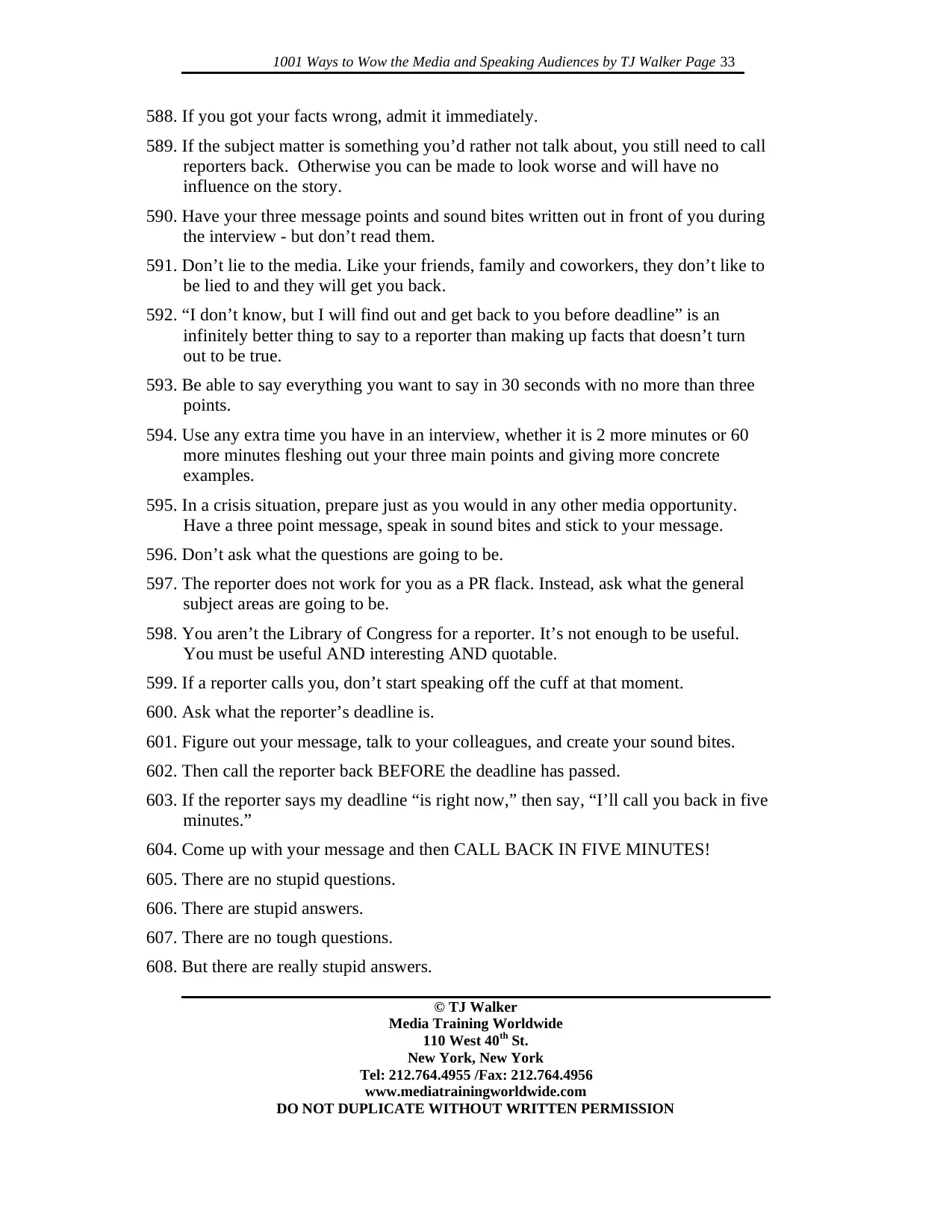
1001 Ways to Wow the Media and Speaking Audiences by TJ Walker Page 33
© TJ Walker
Media Training Worldwide
110 West 40th St.
New York, New York
Tel: 212.764.4955 /Fax: 212.764.4956
www.mediatrainingworldwide.com
DO NOT DUPLICATE WITHOUT WRITTEN PERMISSION
588. If you got your facts wrong, admit it immediately.
589. If the subject matter is something you’d rather not talk about, you still need to call
reporters back. Otherwise you can be made to look worse and will have no
influence on the story.
590. Have your three message points and sound bites written out in front of you during
the interview - but don’t read them.
591. Don’t lie to the media. Like your friends, family and coworkers, they don’t like to
be lied to and they will get you back.
592. “I don’t know, but I will find out and get back to you before deadline” is an
infinitely better thing to say to a reporter than making up facts that doesn’t turn
out to be true.
593. Be able to say everything you want to say in 30 seconds with no more than three
points.
594. Use any extra time you have in an interview, whether it is 2 more minutes or 60
more minutes fleshing out your three main points and giving more concrete
examples.
595. In a crisis situation, prepare just as you would in any other media opportunity.
Have a three point message, speak in sound bites and stick to your message.
596. Don’t ask what the questions are going to be.
597. The reporter does not work for you as a PR flack. Instead, ask what the general
subject areas are going to be.
598. You aren’t the Library of Congress for a reporter. It’s not enough to be useful.
You must be useful AND interesting AND quotable.
599. If a reporter calls you, don’t start speaking off the cuff at that moment.
600. Ask what the reporter’s deadline is.
601. Figure out your message, talk to your colleagues, and create your sound bites.
602. Then call the reporter back BEFORE the deadline has passed.
603. If the reporter says my deadline “is right now,” then say, “I’ll call you back in five
minutes.”
604. Come up with your message and then CALL BACK IN FIVE MINUTES!
605. There are no stupid questions.
606. There are stupid answers.
607. There are no tough questions.
608. But there are really stupid answers.
© TJ Walker
Media Training Worldwide
110 West 40th St.
New York, New York
Tel: 212.764.4955 /Fax: 212.764.4956
www.mediatrainingworldwide.com
DO NOT DUPLICATE WITHOUT WRITTEN PERMISSION
588. If you got your facts wrong, admit it immediately.
589. If the subject matter is something you’d rather not talk about, you still need to call
reporters back. Otherwise you can be made to look worse and will have no
influence on the story.
590. Have your three message points and sound bites written out in front of you during
the interview - but don’t read them.
591. Don’t lie to the media. Like your friends, family and coworkers, they don’t like to
be lied to and they will get you back.
592. “I don’t know, but I will find out and get back to you before deadline” is an
infinitely better thing to say to a reporter than making up facts that doesn’t turn
out to be true.
593. Be able to say everything you want to say in 30 seconds with no more than three
points.
594. Use any extra time you have in an interview, whether it is 2 more minutes or 60
more minutes fleshing out your three main points and giving more concrete
examples.
595. In a crisis situation, prepare just as you would in any other media opportunity.
Have a three point message, speak in sound bites and stick to your message.
596. Don’t ask what the questions are going to be.
597. The reporter does not work for you as a PR flack. Instead, ask what the general
subject areas are going to be.
598. You aren’t the Library of Congress for a reporter. It’s not enough to be useful.
You must be useful AND interesting AND quotable.
599. If a reporter calls you, don’t start speaking off the cuff at that moment.
600. Ask what the reporter’s deadline is.
601. Figure out your message, talk to your colleagues, and create your sound bites.
602. Then call the reporter back BEFORE the deadline has passed.
603. If the reporter says my deadline “is right now,” then say, “I’ll call you back in five
minutes.”
604. Come up with your message and then CALL BACK IN FIVE MINUTES!
605. There are no stupid questions.
606. There are stupid answers.
607. There are no tough questions.
608. But there are really stupid answers.
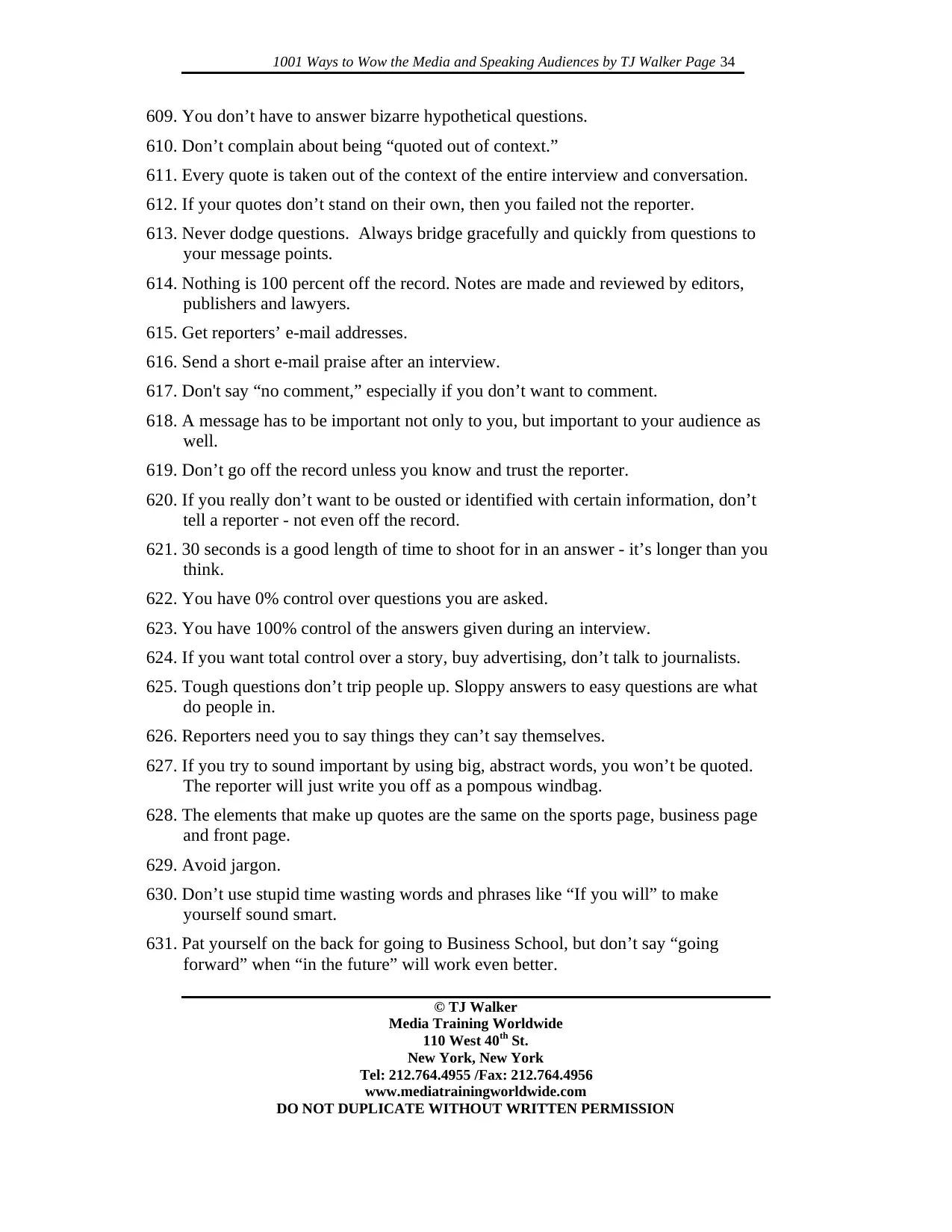
1001 Ways to Wow the Media and Speaking Audiences by TJ Walker Page 34
© TJ Walker
Media Training Worldwide
110 West 40th St.
New York, New York
Tel: 212.764.4955 /Fax: 212.764.4956
www.mediatrainingworldwide.com
DO NOT DUPLICATE WITHOUT WRITTEN PERMISSION
609. You don’t have to answer bizarre hypothetical questions.
610. Don’t complain about being “quoted out of context.”
611. Every quote is taken out of the context of the entire interview and conversation.
612. If your quotes don’t stand on their own, then you failed not the reporter.
613. Never dodge questions. Always bridge gracefully and quickly from questions to
your message points.
614. Nothing is 100 percent off the record. Notes are made and reviewed by editors,
publishers and lawyers.
615. Get reporters’ e-mail addresses.
616. Send a short e-mail praise after an interview.
617. Don't say “no comment,” especially if you don’t want to comment.
618. A message has to be important not only to you, but important to your audience as
well.
619. Don’t go off the record unless you know and trust the reporter.
620. If you really don’t want to be ousted or identified with certain information, don’t
tell a reporter - not even off the record.
621. 30 seconds is a good length of time to shoot for in an answer - it’s longer than you
think.
622. You have 0% control over questions you are asked.
623. You have 100% control of the answers given during an interview.
624. If you want total control over a story, buy advertising, don’t talk to journalists.
625. Tough questions don’t trip people up. Sloppy answers to easy questions are what
do people in.
626. Reporters need you to say things they can’t say themselves.
627. If you try to sound important by using big, abstract words, you won’t be quoted.
The reporter will just write you off as a pompous windbag.
628. The elements that make up quotes are the same on the sports page, business page
and front page.
629. Avoid jargon.
630. Don’t use stupid time wasting words and phrases like “If you will” to make
yourself sound smart.
631. Pat yourself on the back for going to Business School, but don’t say “going
forward” when “in the future” will work even better.
© TJ Walker
Media Training Worldwide
110 West 40th St.
New York, New York
Tel: 212.764.4955 /Fax: 212.764.4956
www.mediatrainingworldwide.com
DO NOT DUPLICATE WITHOUT WRITTEN PERMISSION
609. You don’t have to answer bizarre hypothetical questions.
610. Don’t complain about being “quoted out of context.”
611. Every quote is taken out of the context of the entire interview and conversation.
612. If your quotes don’t stand on their own, then you failed not the reporter.
613. Never dodge questions. Always bridge gracefully and quickly from questions to
your message points.
614. Nothing is 100 percent off the record. Notes are made and reviewed by editors,
publishers and lawyers.
615. Get reporters’ e-mail addresses.
616. Send a short e-mail praise after an interview.
617. Don't say “no comment,” especially if you don’t want to comment.
618. A message has to be important not only to you, but important to your audience as
well.
619. Don’t go off the record unless you know and trust the reporter.
620. If you really don’t want to be ousted or identified with certain information, don’t
tell a reporter - not even off the record.
621. 30 seconds is a good length of time to shoot for in an answer - it’s longer than you
think.
622. You have 0% control over questions you are asked.
623. You have 100% control of the answers given during an interview.
624. If you want total control over a story, buy advertising, don’t talk to journalists.
625. Tough questions don’t trip people up. Sloppy answers to easy questions are what
do people in.
626. Reporters need you to say things they can’t say themselves.
627. If you try to sound important by using big, abstract words, you won’t be quoted.
The reporter will just write you off as a pompous windbag.
628. The elements that make up quotes are the same on the sports page, business page
and front page.
629. Avoid jargon.
630. Don’t use stupid time wasting words and phrases like “If you will” to make
yourself sound smart.
631. Pat yourself on the back for going to Business School, but don’t say “going
forward” when “in the future” will work even better.
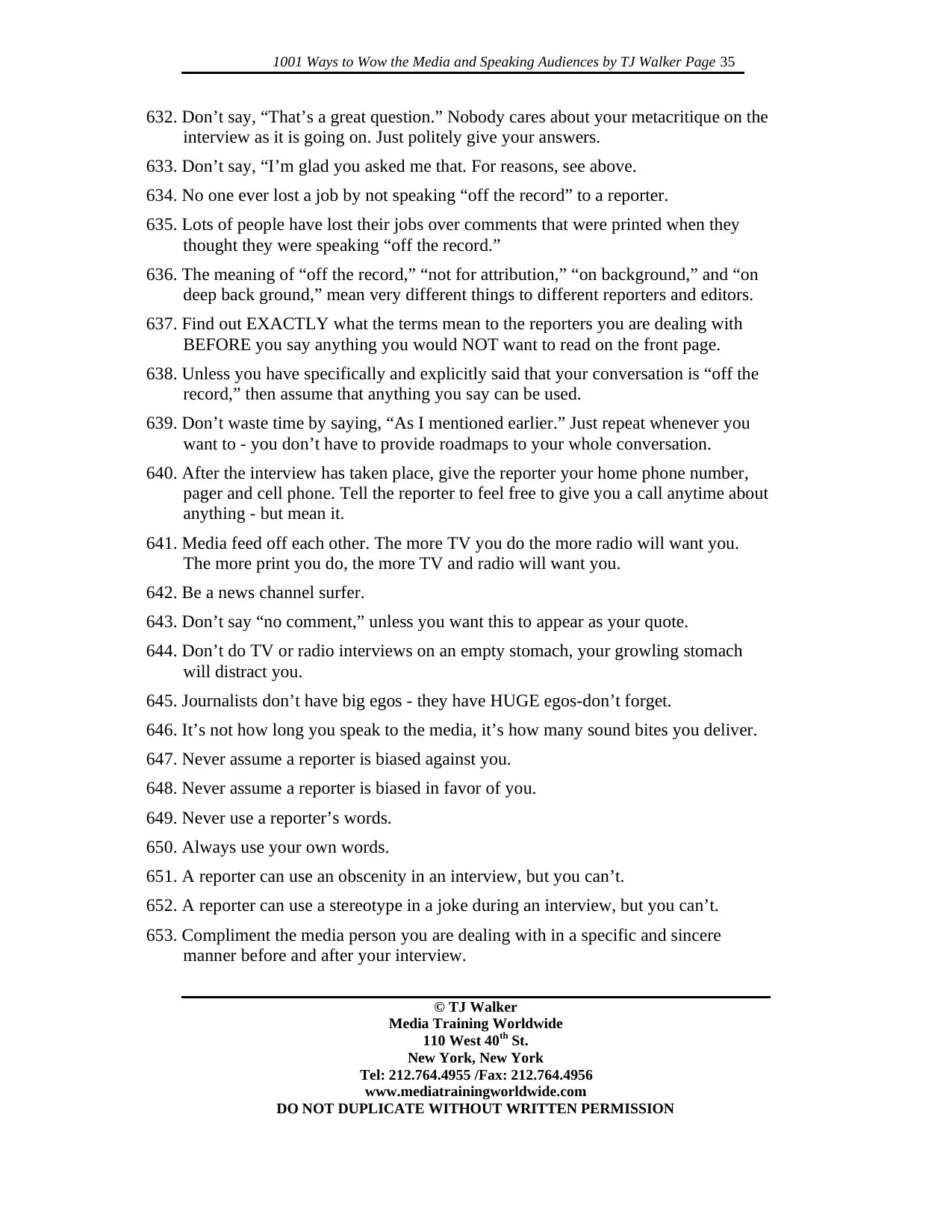
1001 Ways to Wow the Media and Speaking Audiences by TJ Walker Page 35
© TJ Walker
Media Training Worldwide
110 West 40th St.
New York, New York
Tel: 212.764.4955 /Fax: 212.764.4956
www.mediatrainingworldwide.com
DO NOT DUPLICATE WITHOUT WRITTEN PERMISSION
632. Don’t say, “That’s a great question.” Nobody cares about your metacritique on the
interview as it is going on. Just politely give your answers.
633. Don’t say, “I’m glad you asked me that. For reasons, see above.
634. No one ever lost a job by not speaking “off the record” to a reporter.
635. Lots of people have lost their jobs over comments that were printed when they
thought they were speaking “off the record.”
636. The meaning of “off the record,” “not for attribution,” “on background,” and “on
deep back ground,” mean very different things to different reporters and editors.
637. Find out EXACTLY what the terms mean to the reporters you are dealing with
BEFORE you say anything you would NOT want to read on the front page.
638. Unless you have specifically and explicitly said that your conversation is “off the
record,” then assume that anything you say can be used.
639. Don’t waste time by saying, “As I mentioned earlier.” Just repeat whenever you
want to - you don’t have to provide roadmaps to your whole conversation.
640. After the interview has taken place, give the reporter your home phone number,
pager and cell phone. Tell the reporter to feel free to give you a call anytime about
anything - but mean it.
641. Media feed off each other. The more TV you do the more radio will want you.
The more print you do, the more TV and radio will want you.
642. Be a news channel surfer.
643. Don’t say “no comment,” unless you want this to appear as your quote.
644. Don’t do TV or radio interviews on an empty stomach, your growling stomach
will distract you.
645. Journalists don’t have big egos - they have HUGE egos-don’t forget.
646. It’s not how long you speak to the media, it’s how many sound bites you deliver.
647. Never assume a reporter is biased against you.
648. Never assume a reporter is biased in favor of you.
649. Never use a reporter’s words.
650. Always use your own words.
651. A reporter can use an obscenity in an interview, but you can’t.
652. A reporter can use a stereotype in a joke during an interview, but you can’t.
653. Compliment the media person you are dealing with in a specific and sincere
manner before and after your interview.
© TJ Walker
Media Training Worldwide
110 West 40th St.
New York, New York
Tel: 212.764.4955 /Fax: 212.764.4956
www.mediatrainingworldwide.com
DO NOT DUPLICATE WITHOUT WRITTEN PERMISSION
632. Don’t say, “That’s a great question.” Nobody cares about your metacritique on the
interview as it is going on. Just politely give your answers.
633. Don’t say, “I’m glad you asked me that. For reasons, see above.
634. No one ever lost a job by not speaking “off the record” to a reporter.
635. Lots of people have lost their jobs over comments that were printed when they
thought they were speaking “off the record.”
636. The meaning of “off the record,” “not for attribution,” “on background,” and “on
deep back ground,” mean very different things to different reporters and editors.
637. Find out EXACTLY what the terms mean to the reporters you are dealing with
BEFORE you say anything you would NOT want to read on the front page.
638. Unless you have specifically and explicitly said that your conversation is “off the
record,” then assume that anything you say can be used.
639. Don’t waste time by saying, “As I mentioned earlier.” Just repeat whenever you
want to - you don’t have to provide roadmaps to your whole conversation.
640. After the interview has taken place, give the reporter your home phone number,
pager and cell phone. Tell the reporter to feel free to give you a call anytime about
anything - but mean it.
641. Media feed off each other. The more TV you do the more radio will want you.
The more print you do, the more TV and radio will want you.
642. Be a news channel surfer.
643. Don’t say “no comment,” unless you want this to appear as your quote.
644. Don’t do TV or radio interviews on an empty stomach, your growling stomach
will distract you.
645. Journalists don’t have big egos - they have HUGE egos-don’t forget.
646. It’s not how long you speak to the media, it’s how many sound bites you deliver.
647. Never assume a reporter is biased against you.
648. Never assume a reporter is biased in favor of you.
649. Never use a reporter’s words.
650. Always use your own words.
651. A reporter can use an obscenity in an interview, but you can’t.
652. A reporter can use a stereotype in a joke during an interview, but you can’t.
653. Compliment the media person you are dealing with in a specific and sincere
manner before and after your interview.
Paraphrase This Document
Need a fresh take? Get an instant paraphrase of this document with our AI Paraphraser
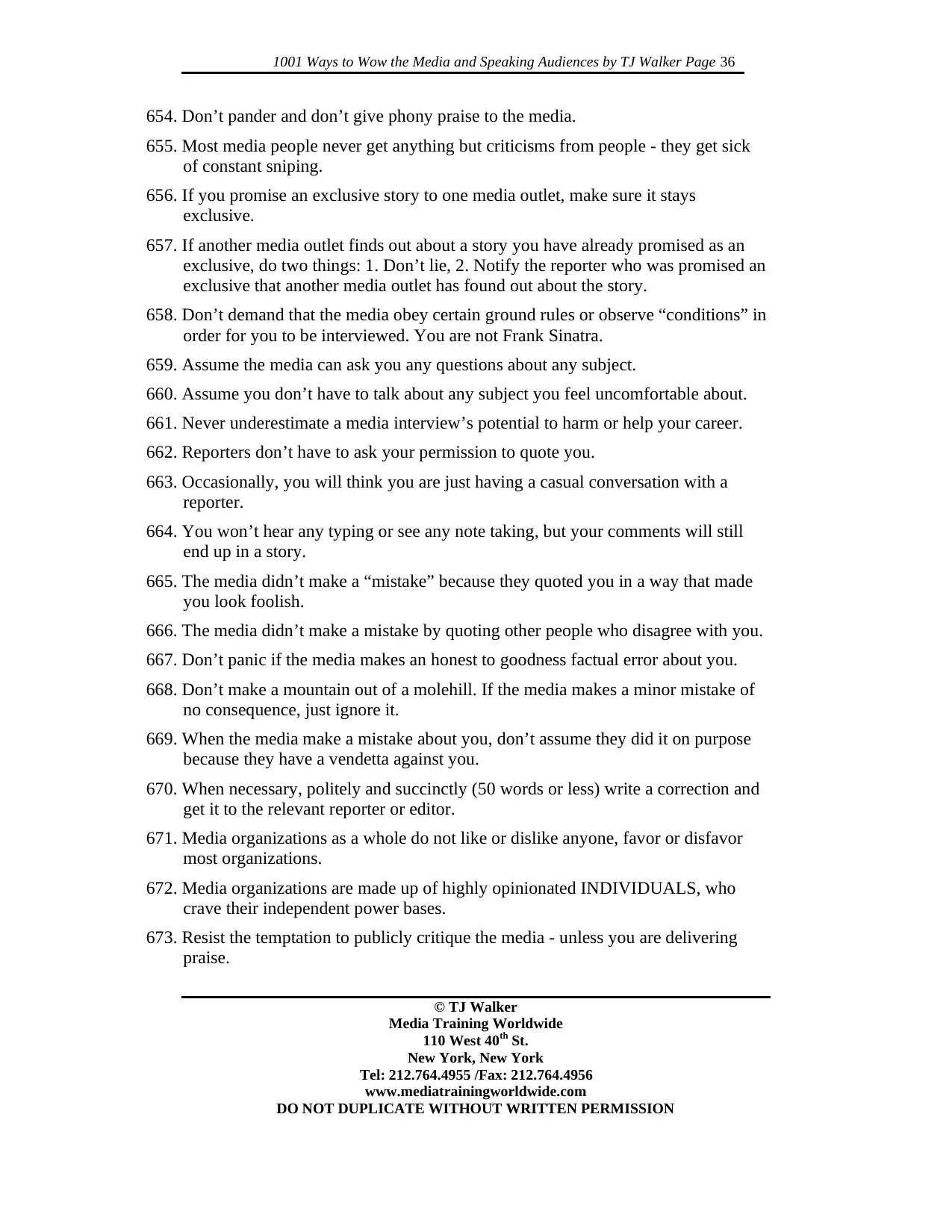
1001 Ways to Wow the Media and Speaking Audiences by TJ Walker Page 36
© TJ Walker
Media Training Worldwide
110 West 40th St.
New York, New York
Tel: 212.764.4955 /Fax: 212.764.4956
www.mediatrainingworldwide.com
DO NOT DUPLICATE WITHOUT WRITTEN PERMISSION
654. Don’t pander and don’t give phony praise to the media.
655. Most media people never get anything but criticisms from people - they get sick
of constant sniping.
656. If you promise an exclusive story to one media outlet, make sure it stays
exclusive.
657. If another media outlet finds out about a story you have already promised as an
exclusive, do two things: 1. Don’t lie, 2. Notify the reporter who was promised an
exclusive that another media outlet has found out about the story.
658. Don’t demand that the media obey certain ground rules or observe “conditions” in
order for you to be interviewed. You are not Frank Sinatra.
659. Assume the media can ask you any questions about any subject.
660. Assume you don’t have to talk about any subject you feel uncomfortable about.
661. Never underestimate a media interview’s potential to harm or help your career.
662. Reporters don’t have to ask your permission to quote you.
663. Occasionally, you will think you are just having a casual conversation with a
reporter.
664. You won’t hear any typing or see any note taking, but your comments will still
end up in a story.
665. The media didn’t make a “mistake” because they quoted you in a way that made
you look foolish.
666. The media didn’t make a mistake by quoting other people who disagree with you.
667. Don’t panic if the media makes an honest to goodness factual error about you.
668. Don’t make a mountain out of a molehill. If the media makes a minor mistake of
no consequence, just ignore it.
669. When the media make a mistake about you, don’t assume they did it on purpose
because they have a vendetta against you.
670. When necessary, politely and succinctly (50 words or less) write a correction and
get it to the relevant reporter or editor.
671. Media organizations as a whole do not like or dislike anyone, favor or disfavor
most organizations.
672. Media organizations are made up of highly opinionated INDIVIDUALS, who
crave their independent power bases.
673. Resist the temptation to publicly critique the media - unless you are delivering
praise.
© TJ Walker
Media Training Worldwide
110 West 40th St.
New York, New York
Tel: 212.764.4955 /Fax: 212.764.4956
www.mediatrainingworldwide.com
DO NOT DUPLICATE WITHOUT WRITTEN PERMISSION
654. Don’t pander and don’t give phony praise to the media.
655. Most media people never get anything but criticisms from people - they get sick
of constant sniping.
656. If you promise an exclusive story to one media outlet, make sure it stays
exclusive.
657. If another media outlet finds out about a story you have already promised as an
exclusive, do two things: 1. Don’t lie, 2. Notify the reporter who was promised an
exclusive that another media outlet has found out about the story.
658. Don’t demand that the media obey certain ground rules or observe “conditions” in
order for you to be interviewed. You are not Frank Sinatra.
659. Assume the media can ask you any questions about any subject.
660. Assume you don’t have to talk about any subject you feel uncomfortable about.
661. Never underestimate a media interview’s potential to harm or help your career.
662. Reporters don’t have to ask your permission to quote you.
663. Occasionally, you will think you are just having a casual conversation with a
reporter.
664. You won’t hear any typing or see any note taking, but your comments will still
end up in a story.
665. The media didn’t make a “mistake” because they quoted you in a way that made
you look foolish.
666. The media didn’t make a mistake by quoting other people who disagree with you.
667. Don’t panic if the media makes an honest to goodness factual error about you.
668. Don’t make a mountain out of a molehill. If the media makes a minor mistake of
no consequence, just ignore it.
669. When the media make a mistake about you, don’t assume they did it on purpose
because they have a vendetta against you.
670. When necessary, politely and succinctly (50 words or less) write a correction and
get it to the relevant reporter or editor.
671. Media organizations as a whole do not like or dislike anyone, favor or disfavor
most organizations.
672. Media organizations are made up of highly opinionated INDIVIDUALS, who
crave their independent power bases.
673. Resist the temptation to publicly critique the media - unless you are delivering
praise.
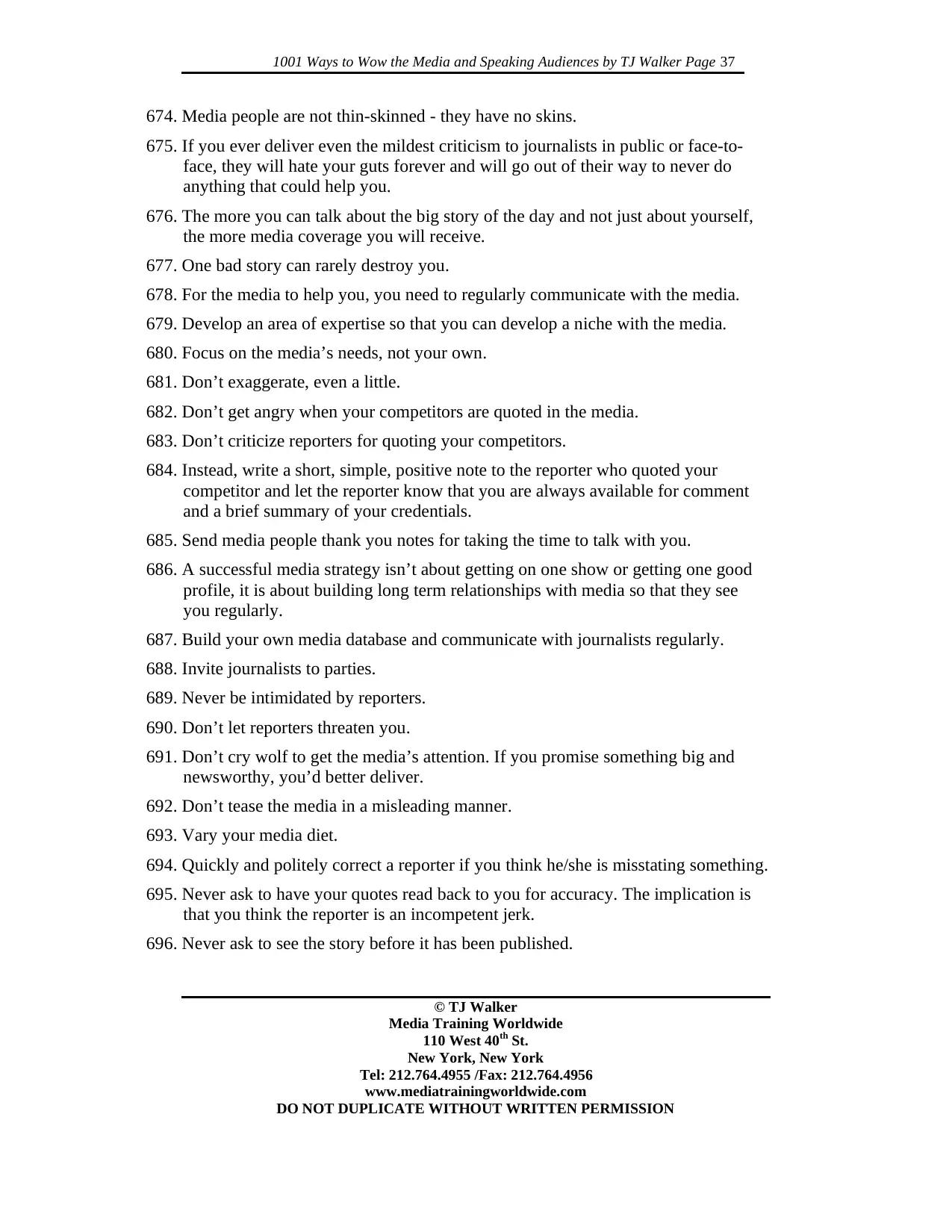
1001 Ways to Wow the Media and Speaking Audiences by TJ Walker Page 37
© TJ Walker
Media Training Worldwide
110 West 40th St.
New York, New York
Tel: 212.764.4955 /Fax: 212.764.4956
www.mediatrainingworldwide.com
DO NOT DUPLICATE WITHOUT WRITTEN PERMISSION
674. Media people are not thin-skinned - they have no skins.
675. If you ever deliver even the mildest criticism to journalists in public or face-to-
face, they will hate your guts forever and will go out of their way to never do
anything that could help you.
676. The more you can talk about the big story of the day and not just about yourself,
the more media coverage you will receive.
677. One bad story can rarely destroy you.
678. For the media to help you, you need to regularly communicate with the media.
679. Develop an area of expertise so that you can develop a niche with the media.
680. Focus on the media’s needs, not your own.
681. Don’t exaggerate, even a little.
682. Don’t get angry when your competitors are quoted in the media.
683. Don’t criticize reporters for quoting your competitors.
684. Instead, write a short, simple, positive note to the reporter who quoted your
competitor and let the reporter know that you are always available for comment
and a brief summary of your credentials.
685. Send media people thank you notes for taking the time to talk with you.
686. A successful media strategy isn’t about getting on one show or getting one good
profile, it is about building long term relationships with media so that they see
you regularly.
687. Build your own media database and communicate with journalists regularly.
688. Invite journalists to parties.
689. Never be intimidated by reporters.
690. Don’t let reporters threaten you.
691. Don’t cry wolf to get the media’s attention. If you promise something big and
newsworthy, you’d better deliver.
692. Don’t tease the media in a misleading manner.
693. Vary your media diet.
694. Quickly and politely correct a reporter if you think he/she is misstating something.
695. Never ask to have your quotes read back to you for accuracy. The implication is
that you think the reporter is an incompetent jerk.
696. Never ask to see the story before it has been published.
© TJ Walker
Media Training Worldwide
110 West 40th St.
New York, New York
Tel: 212.764.4955 /Fax: 212.764.4956
www.mediatrainingworldwide.com
DO NOT DUPLICATE WITHOUT WRITTEN PERMISSION
674. Media people are not thin-skinned - they have no skins.
675. If you ever deliver even the mildest criticism to journalists in public or face-to-
face, they will hate your guts forever and will go out of their way to never do
anything that could help you.
676. The more you can talk about the big story of the day and not just about yourself,
the more media coverage you will receive.
677. One bad story can rarely destroy you.
678. For the media to help you, you need to regularly communicate with the media.
679. Develop an area of expertise so that you can develop a niche with the media.
680. Focus on the media’s needs, not your own.
681. Don’t exaggerate, even a little.
682. Don’t get angry when your competitors are quoted in the media.
683. Don’t criticize reporters for quoting your competitors.
684. Instead, write a short, simple, positive note to the reporter who quoted your
competitor and let the reporter know that you are always available for comment
and a brief summary of your credentials.
685. Send media people thank you notes for taking the time to talk with you.
686. A successful media strategy isn’t about getting on one show or getting one good
profile, it is about building long term relationships with media so that they see
you regularly.
687. Build your own media database and communicate with journalists regularly.
688. Invite journalists to parties.
689. Never be intimidated by reporters.
690. Don’t let reporters threaten you.
691. Don’t cry wolf to get the media’s attention. If you promise something big and
newsworthy, you’d better deliver.
692. Don’t tease the media in a misleading manner.
693. Vary your media diet.
694. Quickly and politely correct a reporter if you think he/she is misstating something.
695. Never ask to have your quotes read back to you for accuracy. The implication is
that you think the reporter is an incompetent jerk.
696. Never ask to see the story before it has been published.
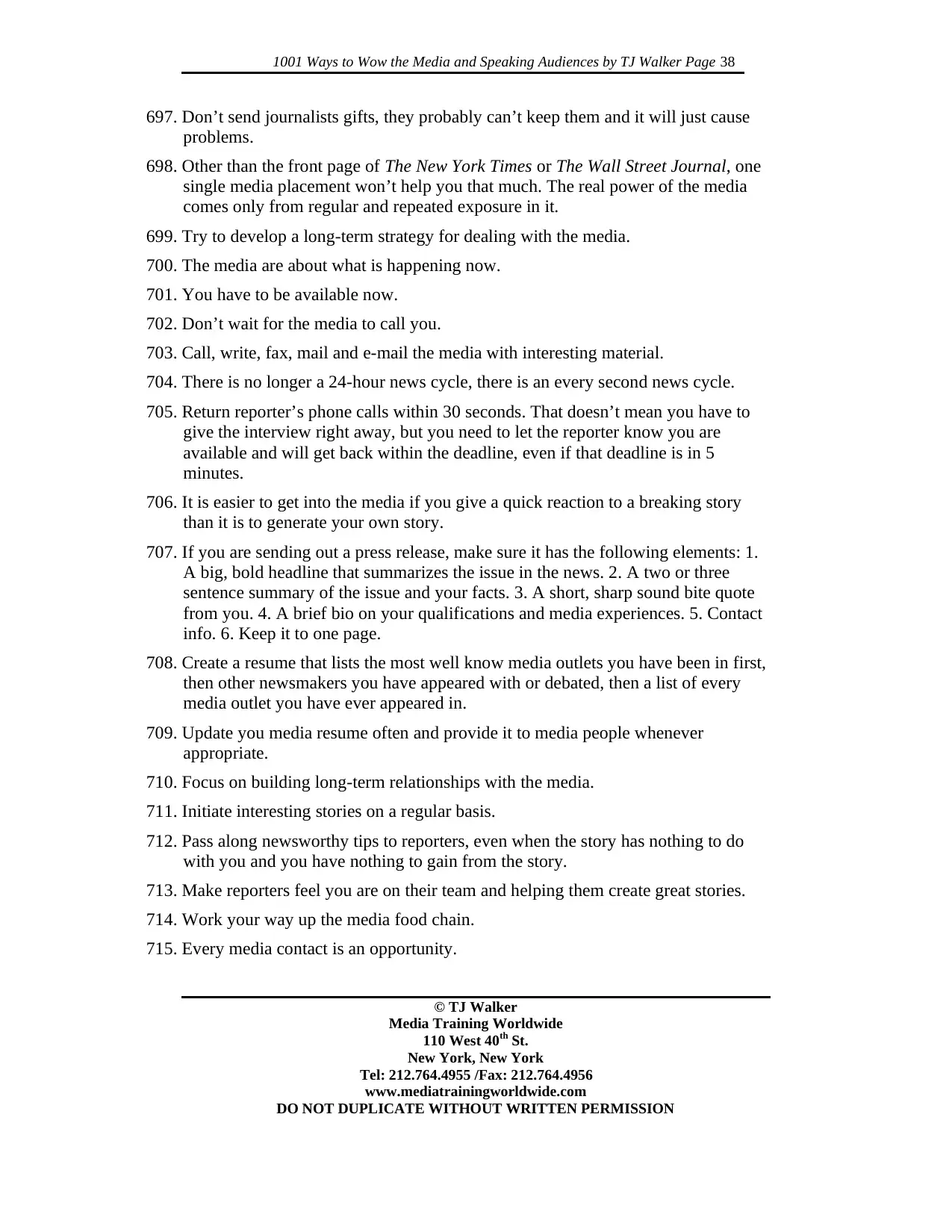
1001 Ways to Wow the Media and Speaking Audiences by TJ Walker Page 38
© TJ Walker
Media Training Worldwide
110 West 40th St.
New York, New York
Tel: 212.764.4955 /Fax: 212.764.4956
www.mediatrainingworldwide.com
DO NOT DUPLICATE WITHOUT WRITTEN PERMISSION
697. Don’t send journalists gifts, they probably can’t keep them and it will just cause
problems.
698. Other than the front page of The New York Times or The Wall Street Journal, one
single media placement won’t help you that much. The real power of the media
comes only from regular and repeated exposure in it.
699. Try to develop a long-term strategy for dealing with the media.
700. The media are about what is happening now.
701. You have to be available now.
702. Don’t wait for the media to call you.
703. Call, write, fax, mail and e-mail the media with interesting material.
704. There is no longer a 24-hour news cycle, there is an every second news cycle.
705. Return reporter’s phone calls within 30 seconds. That doesn’t mean you have to
give the interview right away, but you need to let the reporter know you are
available and will get back within the deadline, even if that deadline is in 5
minutes.
706. It is easier to get into the media if you give a quick reaction to a breaking story
than it is to generate your own story.
707. If you are sending out a press release, make sure it has the following elements: 1.
A big, bold headline that summarizes the issue in the news. 2. A two or three
sentence summary of the issue and your facts. 3. A short, sharp sound bite quote
from you. 4. A brief bio on your qualifications and media experiences. 5. Contact
info. 6. Keep it to one page.
708. Create a resume that lists the most well know media outlets you have been in first,
then other newsmakers you have appeared with or debated, then a list of every
media outlet you have ever appeared in.
709. Update you media resume often and provide it to media people whenever
appropriate.
710. Focus on building long-term relationships with the media.
711. Initiate interesting stories on a regular basis.
712. Pass along newsworthy tips to reporters, even when the story has nothing to do
with you and you have nothing to gain from the story.
713. Make reporters feel you are on their team and helping them create great stories.
714. Work your way up the media food chain.
715. Every media contact is an opportunity.
© TJ Walker
Media Training Worldwide
110 West 40th St.
New York, New York
Tel: 212.764.4955 /Fax: 212.764.4956
www.mediatrainingworldwide.com
DO NOT DUPLICATE WITHOUT WRITTEN PERMISSION
697. Don’t send journalists gifts, they probably can’t keep them and it will just cause
problems.
698. Other than the front page of The New York Times or The Wall Street Journal, one
single media placement won’t help you that much. The real power of the media
comes only from regular and repeated exposure in it.
699. Try to develop a long-term strategy for dealing with the media.
700. The media are about what is happening now.
701. You have to be available now.
702. Don’t wait for the media to call you.
703. Call, write, fax, mail and e-mail the media with interesting material.
704. There is no longer a 24-hour news cycle, there is an every second news cycle.
705. Return reporter’s phone calls within 30 seconds. That doesn’t mean you have to
give the interview right away, but you need to let the reporter know you are
available and will get back within the deadline, even if that deadline is in 5
minutes.
706. It is easier to get into the media if you give a quick reaction to a breaking story
than it is to generate your own story.
707. If you are sending out a press release, make sure it has the following elements: 1.
A big, bold headline that summarizes the issue in the news. 2. A two or three
sentence summary of the issue and your facts. 3. A short, sharp sound bite quote
from you. 4. A brief bio on your qualifications and media experiences. 5. Contact
info. 6. Keep it to one page.
708. Create a resume that lists the most well know media outlets you have been in first,
then other newsmakers you have appeared with or debated, then a list of every
media outlet you have ever appeared in.
709. Update you media resume often and provide it to media people whenever
appropriate.
710. Focus on building long-term relationships with the media.
711. Initiate interesting stories on a regular basis.
712. Pass along newsworthy tips to reporters, even when the story has nothing to do
with you and you have nothing to gain from the story.
713. Make reporters feel you are on their team and helping them create great stories.
714. Work your way up the media food chain.
715. Every media contact is an opportunity.
Secure Best Marks with AI Grader
Need help grading? Try our AI Grader for instant feedback on your assignments.
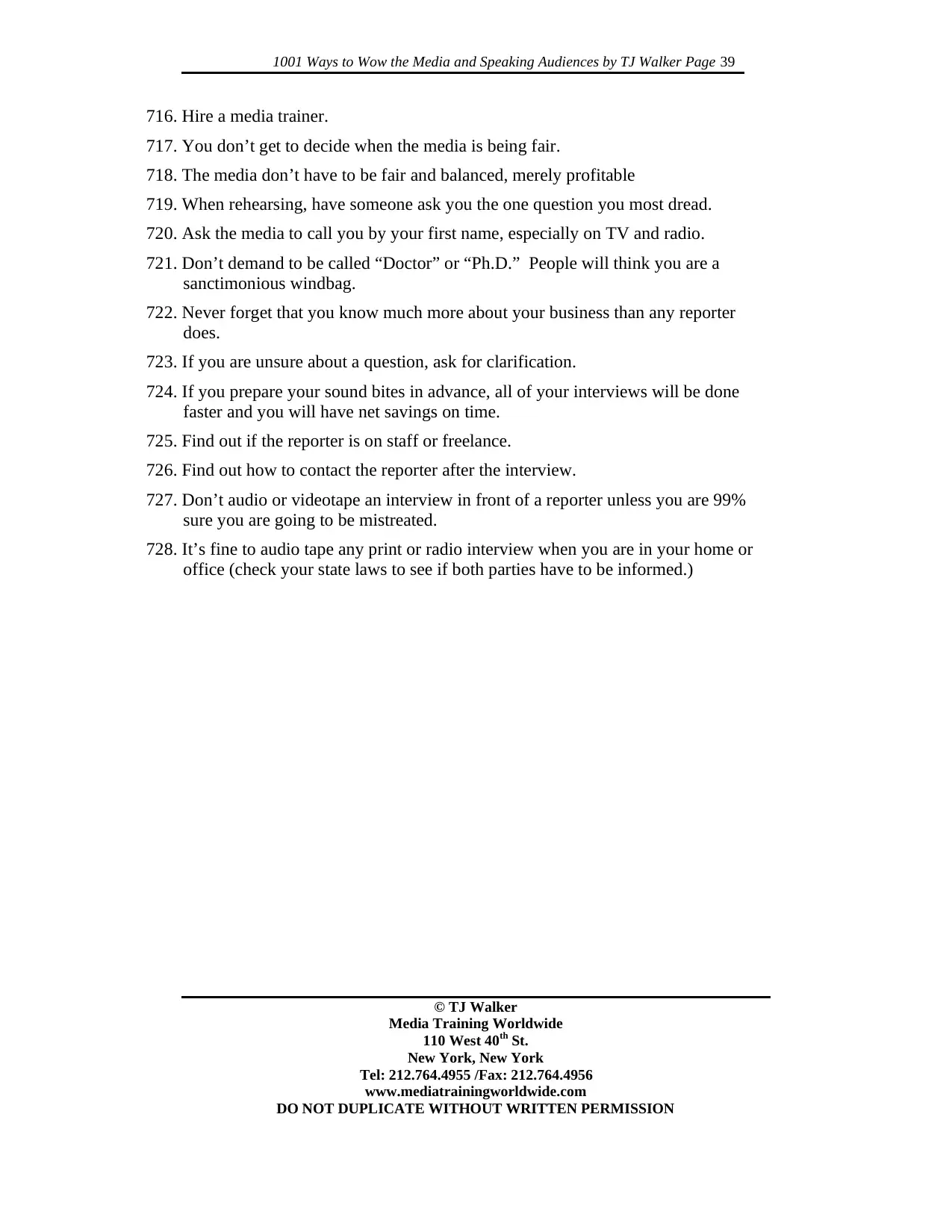
1001 Ways to Wow the Media and Speaking Audiences by TJ Walker Page 39
© TJ Walker
Media Training Worldwide
110 West 40th St.
New York, New York
Tel: 212.764.4955 /Fax: 212.764.4956
www.mediatrainingworldwide.com
DO NOT DUPLICATE WITHOUT WRITTEN PERMISSION
716. Hire a media trainer.
717. You don’t get to decide when the media is being fair.
718. The media don’t have to be fair and balanced, merely profitable
719. When rehearsing, have someone ask you the one question you most dread.
720. Ask the media to call you by your first name, especially on TV and radio.
721. Don’t demand to be called “Doctor” or “Ph.D.” People will think you are a
sanctimonious windbag.
722. Never forget that you know much more about your business than any reporter
does.
723. If you are unsure about a question, ask for clarification.
724. If you prepare your sound bites in advance, all of your interviews will be done
faster and you will have net savings on time.
725. Find out if the reporter is on staff or freelance.
726. Find out how to contact the reporter after the interview.
727. Don’t audio or videotape an interview in front of a reporter unless you are 99%
sure you are going to be mistreated.
728. It’s fine to audio tape any print or radio interview when you are in your home or
office (check your state laws to see if both parties have to be informed.)
© TJ Walker
Media Training Worldwide
110 West 40th St.
New York, New York
Tel: 212.764.4955 /Fax: 212.764.4956
www.mediatrainingworldwide.com
DO NOT DUPLICATE WITHOUT WRITTEN PERMISSION
716. Hire a media trainer.
717. You don’t get to decide when the media is being fair.
718. The media don’t have to be fair and balanced, merely profitable
719. When rehearsing, have someone ask you the one question you most dread.
720. Ask the media to call you by your first name, especially on TV and radio.
721. Don’t demand to be called “Doctor” or “Ph.D.” People will think you are a
sanctimonious windbag.
722. Never forget that you know much more about your business than any reporter
does.
723. If you are unsure about a question, ask for clarification.
724. If you prepare your sound bites in advance, all of your interviews will be done
faster and you will have net savings on time.
725. Find out if the reporter is on staff or freelance.
726. Find out how to contact the reporter after the interview.
727. Don’t audio or videotape an interview in front of a reporter unless you are 99%
sure you are going to be mistreated.
728. It’s fine to audio tape any print or radio interview when you are in your home or
office (check your state laws to see if both parties have to be informed.)
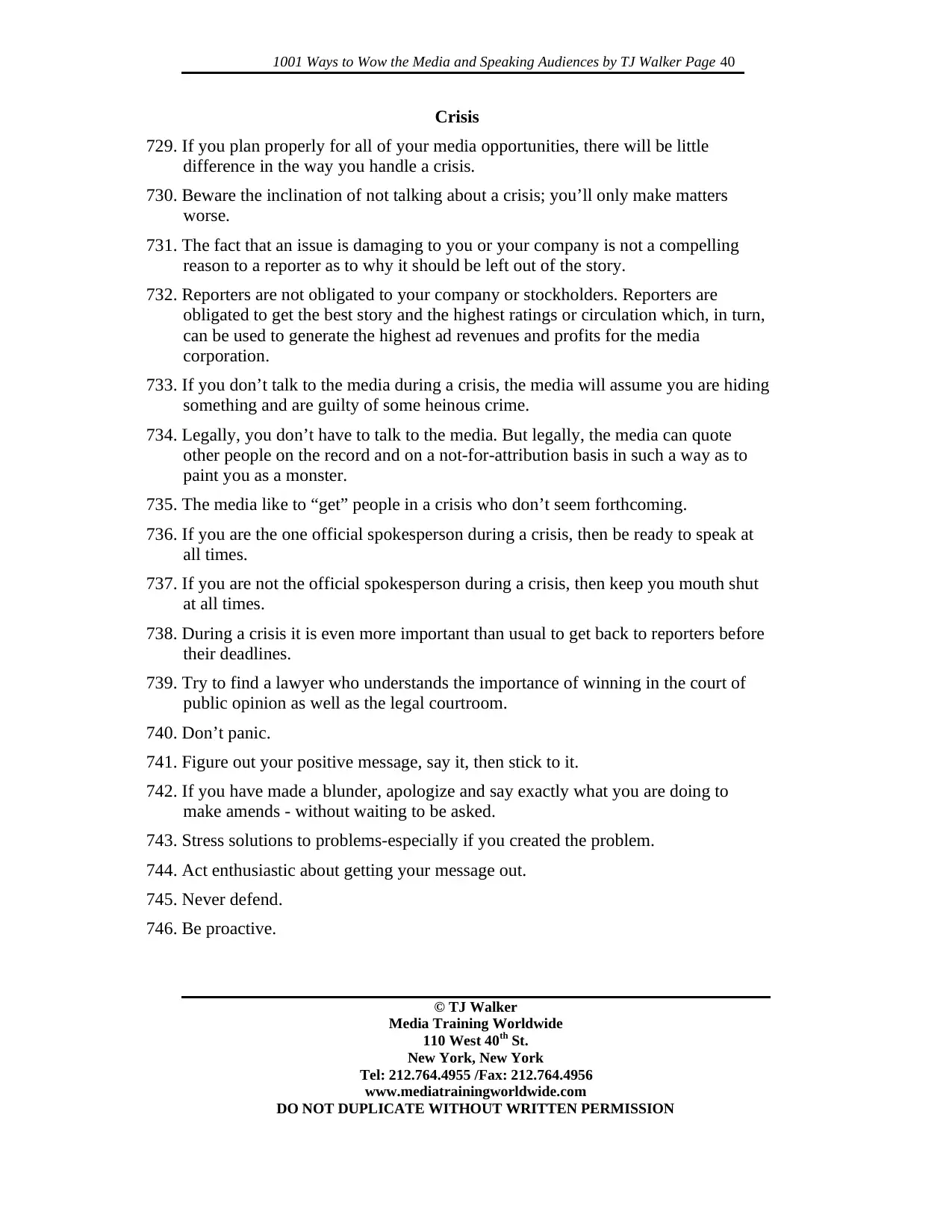
1001 Ways to Wow the Media and Speaking Audiences by TJ Walker Page 40
© TJ Walker
Media Training Worldwide
110 West 40th St.
New York, New York
Tel: 212.764.4955 /Fax: 212.764.4956
www.mediatrainingworldwide.com
DO NOT DUPLICATE WITHOUT WRITTEN PERMISSION
Crisis
729. If you plan properly for all of your media opportunities, there will be little
difference in the way you handle a crisis.
730. Beware the inclination of not talking about a crisis; you’ll only make matters
worse.
731. The fact that an issue is damaging to you or your company is not a compelling
reason to a reporter as to why it should be left out of the story.
732. Reporters are not obligated to your company or stockholders. Reporters are
obligated to get the best story and the highest ratings or circulation which, in turn,
can be used to generate the highest ad revenues and profits for the media
corporation.
733. If you don’t talk to the media during a crisis, the media will assume you are hiding
something and are guilty of some heinous crime.
734. Legally, you don’t have to talk to the media. But legally, the media can quote
other people on the record and on a not-for-attribution basis in such a way as to
paint you as a monster.
735. The media like to “get” people in a crisis who don’t seem forthcoming.
736. If you are the one official spokesperson during a crisis, then be ready to speak at
all times.
737. If you are not the official spokesperson during a crisis, then keep you mouth shut
at all times.
738. During a crisis it is even more important than usual to get back to reporters before
their deadlines.
739. Try to find a lawyer who understands the importance of winning in the court of
public opinion as well as the legal courtroom.
740. Don’t panic.
741. Figure out your positive message, say it, then stick to it.
742. If you have made a blunder, apologize and say exactly what you are doing to
make amends - without waiting to be asked.
743. Stress solutions to problems-especially if you created the problem.
744. Act enthusiastic about getting your message out.
745. Never defend.
746. Be proactive.
© TJ Walker
Media Training Worldwide
110 West 40th St.
New York, New York
Tel: 212.764.4955 /Fax: 212.764.4956
www.mediatrainingworldwide.com
DO NOT DUPLICATE WITHOUT WRITTEN PERMISSION
Crisis
729. If you plan properly for all of your media opportunities, there will be little
difference in the way you handle a crisis.
730. Beware the inclination of not talking about a crisis; you’ll only make matters
worse.
731. The fact that an issue is damaging to you or your company is not a compelling
reason to a reporter as to why it should be left out of the story.
732. Reporters are not obligated to your company or stockholders. Reporters are
obligated to get the best story and the highest ratings or circulation which, in turn,
can be used to generate the highest ad revenues and profits for the media
corporation.
733. If you don’t talk to the media during a crisis, the media will assume you are hiding
something and are guilty of some heinous crime.
734. Legally, you don’t have to talk to the media. But legally, the media can quote
other people on the record and on a not-for-attribution basis in such a way as to
paint you as a monster.
735. The media like to “get” people in a crisis who don’t seem forthcoming.
736. If you are the one official spokesperson during a crisis, then be ready to speak at
all times.
737. If you are not the official spokesperson during a crisis, then keep you mouth shut
at all times.
738. During a crisis it is even more important than usual to get back to reporters before
their deadlines.
739. Try to find a lawyer who understands the importance of winning in the court of
public opinion as well as the legal courtroom.
740. Don’t panic.
741. Figure out your positive message, say it, then stick to it.
742. If you have made a blunder, apologize and say exactly what you are doing to
make amends - without waiting to be asked.
743. Stress solutions to problems-especially if you created the problem.
744. Act enthusiastic about getting your message out.
745. Never defend.
746. Be proactive.
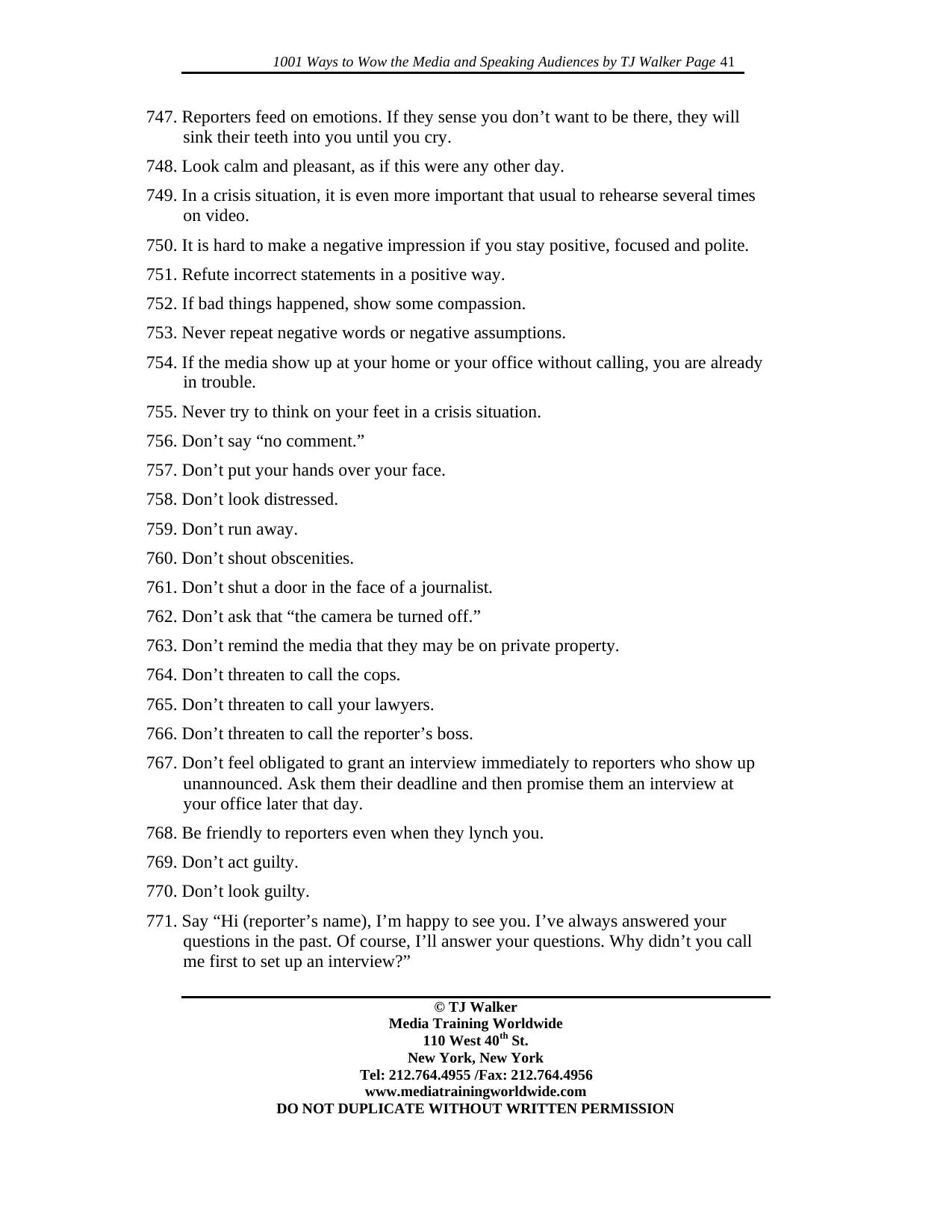
1001 Ways to Wow the Media and Speaking Audiences by TJ Walker Page 41
© TJ Walker
Media Training Worldwide
110 West 40th St.
New York, New York
Tel: 212.764.4955 /Fax: 212.764.4956
www.mediatrainingworldwide.com
DO NOT DUPLICATE WITHOUT WRITTEN PERMISSION
747. Reporters feed on emotions. If they sense you don’t want to be there, they will
sink their teeth into you until you cry.
748. Look calm and pleasant, as if this were any other day.
749. In a crisis situation, it is even more important that usual to rehearse several times
on video.
750. It is hard to make a negative impression if you stay positive, focused and polite.
751. Refute incorrect statements in a positive way.
752. If bad things happened, show some compassion.
753. Never repeat negative words or negative assumptions.
754. If the media show up at your home or your office without calling, you are already
in trouble.
755. Never try to think on your feet in a crisis situation.
756. Don’t say “no comment.”
757. Don’t put your hands over your face.
758. Don’t look distressed.
759. Don’t run away.
760. Don’t shout obscenities.
761. Don’t shut a door in the face of a journalist.
762. Don’t ask that “the camera be turned off.”
763. Don’t remind the media that they may be on private property.
764. Don’t threaten to call the cops.
765. Don’t threaten to call your lawyers.
766. Don’t threaten to call the reporter’s boss.
767. Don’t feel obligated to grant an interview immediately to reporters who show up
unannounced. Ask them their deadline and then promise them an interview at
your office later that day.
768. Be friendly to reporters even when they lynch you.
769. Don’t act guilty.
770. Don’t look guilty.
771. Say “Hi (reporter’s name), I’m happy to see you. I’ve always answered your
questions in the past. Of course, I’ll answer your questions. Why didn’t you call
me first to set up an interview?”
© TJ Walker
Media Training Worldwide
110 West 40th St.
New York, New York
Tel: 212.764.4955 /Fax: 212.764.4956
www.mediatrainingworldwide.com
DO NOT DUPLICATE WITHOUT WRITTEN PERMISSION
747. Reporters feed on emotions. If they sense you don’t want to be there, they will
sink their teeth into you until you cry.
748. Look calm and pleasant, as if this were any other day.
749. In a crisis situation, it is even more important that usual to rehearse several times
on video.
750. It is hard to make a negative impression if you stay positive, focused and polite.
751. Refute incorrect statements in a positive way.
752. If bad things happened, show some compassion.
753. Never repeat negative words or negative assumptions.
754. If the media show up at your home or your office without calling, you are already
in trouble.
755. Never try to think on your feet in a crisis situation.
756. Don’t say “no comment.”
757. Don’t put your hands over your face.
758. Don’t look distressed.
759. Don’t run away.
760. Don’t shout obscenities.
761. Don’t shut a door in the face of a journalist.
762. Don’t ask that “the camera be turned off.”
763. Don’t remind the media that they may be on private property.
764. Don’t threaten to call the cops.
765. Don’t threaten to call your lawyers.
766. Don’t threaten to call the reporter’s boss.
767. Don’t feel obligated to grant an interview immediately to reporters who show up
unannounced. Ask them their deadline and then promise them an interview at
your office later that day.
768. Be friendly to reporters even when they lynch you.
769. Don’t act guilty.
770. Don’t look guilty.
771. Say “Hi (reporter’s name), I’m happy to see you. I’ve always answered your
questions in the past. Of course, I’ll answer your questions. Why didn’t you call
me first to set up an interview?”
Paraphrase This Document
Need a fresh take? Get an instant paraphrase of this document with our AI Paraphraser
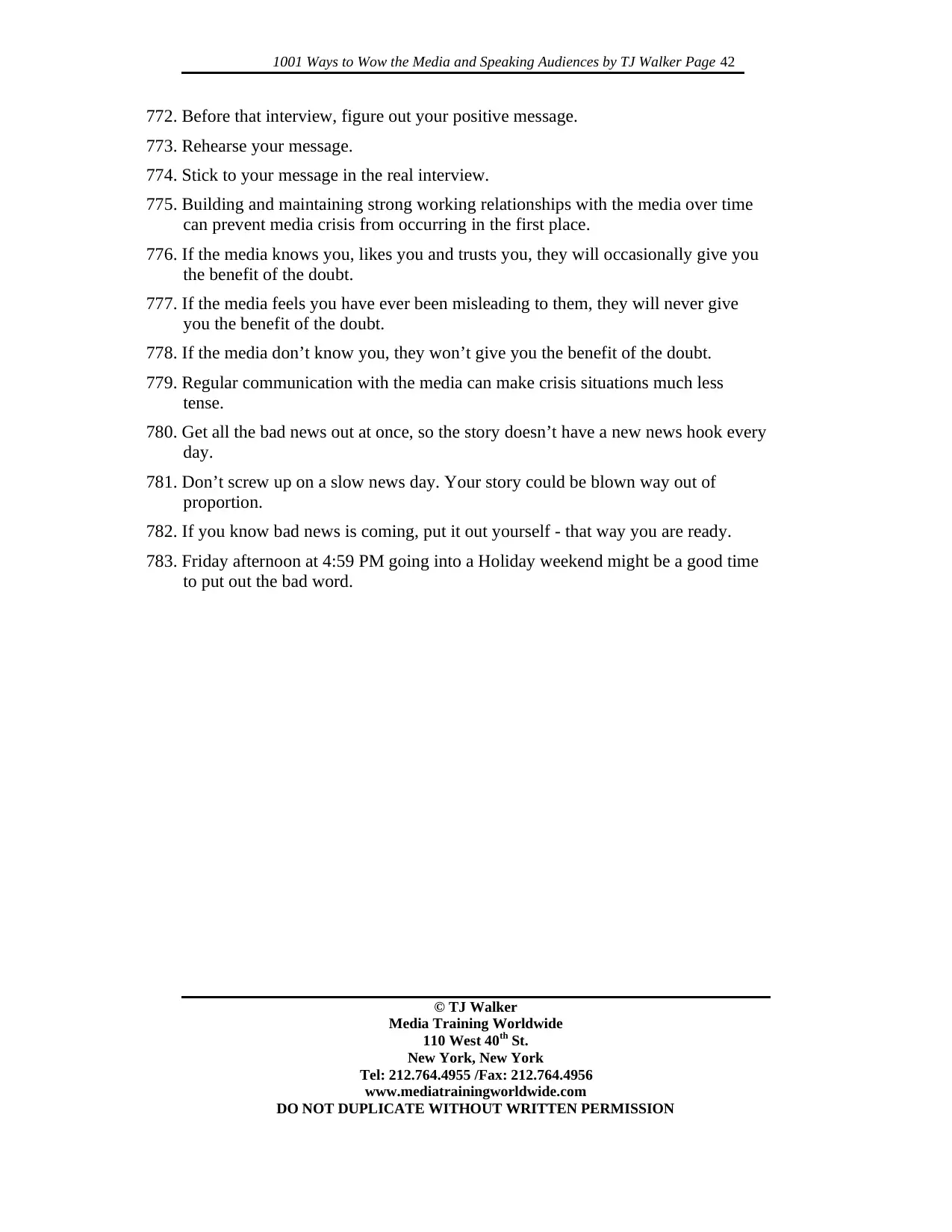
1001 Ways to Wow the Media and Speaking Audiences by TJ Walker Page 42
© TJ Walker
Media Training Worldwide
110 West 40th St.
New York, New York
Tel: 212.764.4955 /Fax: 212.764.4956
www.mediatrainingworldwide.com
DO NOT DUPLICATE WITHOUT WRITTEN PERMISSION
772. Before that interview, figure out your positive message.
773. Rehearse your message.
774. Stick to your message in the real interview.
775. Building and maintaining strong working relationships with the media over time
can prevent media crisis from occurring in the first place.
776. If the media knows you, likes you and trusts you, they will occasionally give you
the benefit of the doubt.
777. If the media feels you have ever been misleading to them, they will never give
you the benefit of the doubt.
778. If the media don’t know you, they won’t give you the benefit of the doubt.
779. Regular communication with the media can make crisis situations much less
tense.
780. Get all the bad news out at once, so the story doesn’t have a new news hook every
day.
781. Don’t screw up on a slow news day. Your story could be blown way out of
proportion.
782. If you know bad news is coming, put it out yourself - that way you are ready.
783. Friday afternoon at 4:59 PM going into a Holiday weekend might be a good time
to put out the bad word.
© TJ Walker
Media Training Worldwide
110 West 40th St.
New York, New York
Tel: 212.764.4955 /Fax: 212.764.4956
www.mediatrainingworldwide.com
DO NOT DUPLICATE WITHOUT WRITTEN PERMISSION
772. Before that interview, figure out your positive message.
773. Rehearse your message.
774. Stick to your message in the real interview.
775. Building and maintaining strong working relationships with the media over time
can prevent media crisis from occurring in the first place.
776. If the media knows you, likes you and trusts you, they will occasionally give you
the benefit of the doubt.
777. If the media feels you have ever been misleading to them, they will never give
you the benefit of the doubt.
778. If the media don’t know you, they won’t give you the benefit of the doubt.
779. Regular communication with the media can make crisis situations much less
tense.
780. Get all the bad news out at once, so the story doesn’t have a new news hook every
day.
781. Don’t screw up on a slow news day. Your story could be blown way out of
proportion.
782. If you know bad news is coming, put it out yourself - that way you are ready.
783. Friday afternoon at 4:59 PM going into a Holiday weekend might be a good time
to put out the bad word.
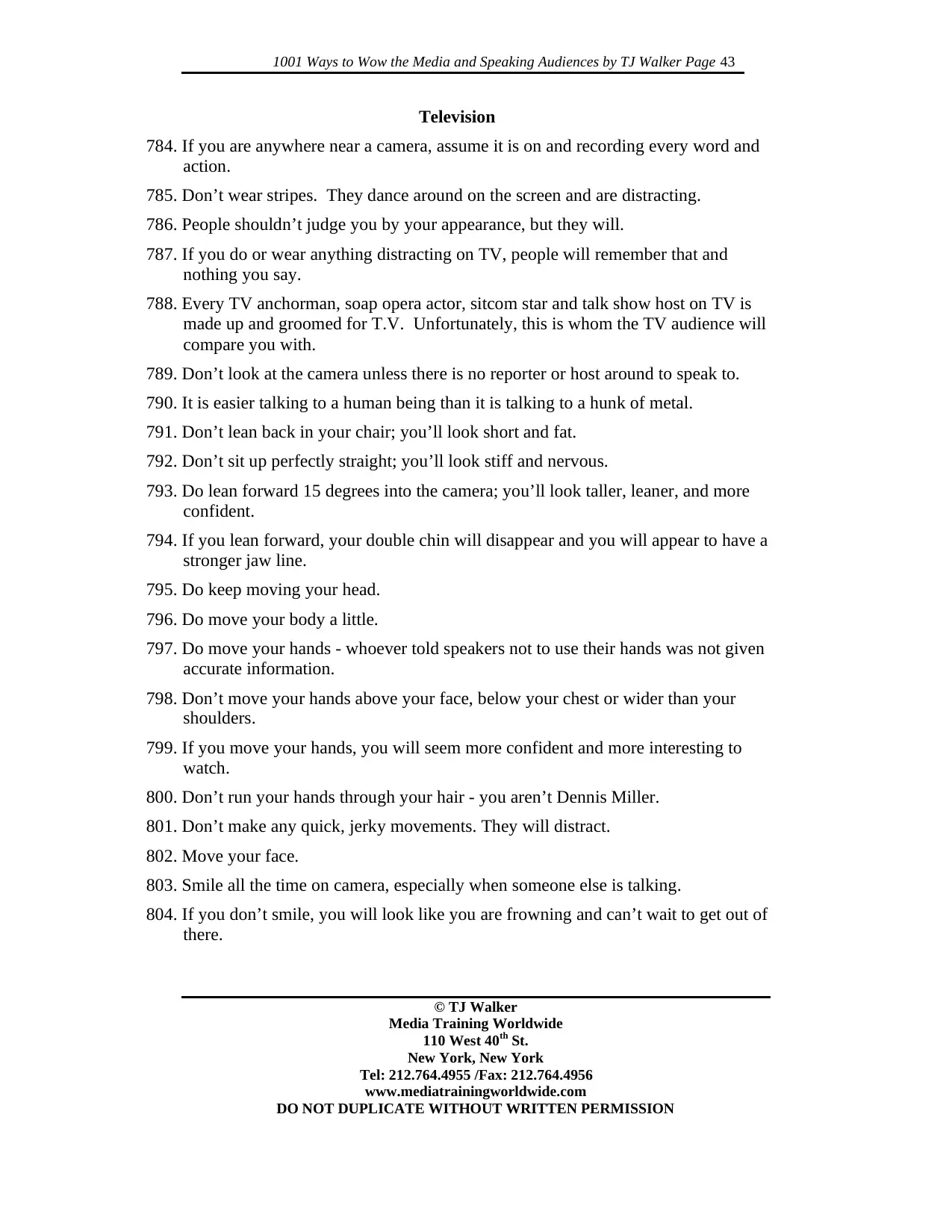
1001 Ways to Wow the Media and Speaking Audiences by TJ Walker Page 43
© TJ Walker
Media Training Worldwide
110 West 40th St.
New York, New York
Tel: 212.764.4955 /Fax: 212.764.4956
www.mediatrainingworldwide.com
DO NOT DUPLICATE WITHOUT WRITTEN PERMISSION
Television
784. If you are anywhere near a camera, assume it is on and recording every word and
action.
785. Don’t wear stripes. They dance around on the screen and are distracting.
786. People shouldn’t judge you by your appearance, but they will.
787. If you do or wear anything distracting on TV, people will remember that and
nothing you say.
788. Every TV anchorman, soap opera actor, sitcom star and talk show host on TV is
made up and groomed for T.V. Unfortunately, this is whom the TV audience will
compare you with.
789. Don’t look at the camera unless there is no reporter or host around to speak to.
790. It is easier talking to a human being than it is talking to a hunk of metal.
791. Don’t lean back in your chair; you’ll look short and fat.
792. Don’t sit up perfectly straight; you’ll look stiff and nervous.
793. Do lean forward 15 degrees into the camera; you’ll look taller, leaner, and more
confident.
794. If you lean forward, your double chin will disappear and you will appear to have a
stronger jaw line.
795. Do keep moving your head.
796. Do move your body a little.
797. Do move your hands - whoever told speakers not to use their hands was not given
accurate information.
798. Don’t move your hands above your face, below your chest or wider than your
shoulders.
799. If you move your hands, you will seem more confident and more interesting to
watch.
800. Don’t run your hands through your hair - you aren’t Dennis Miller.
801. Don’t make any quick, jerky movements. They will distract.
802. Move your face.
803. Smile all the time on camera, especially when someone else is talking.
804. If you don’t smile, you will look like you are frowning and can’t wait to get out of
there.
© TJ Walker
Media Training Worldwide
110 West 40th St.
New York, New York
Tel: 212.764.4955 /Fax: 212.764.4956
www.mediatrainingworldwide.com
DO NOT DUPLICATE WITHOUT WRITTEN PERMISSION
Television
784. If you are anywhere near a camera, assume it is on and recording every word and
action.
785. Don’t wear stripes. They dance around on the screen and are distracting.
786. People shouldn’t judge you by your appearance, but they will.
787. If you do or wear anything distracting on TV, people will remember that and
nothing you say.
788. Every TV anchorman, soap opera actor, sitcom star and talk show host on TV is
made up and groomed for T.V. Unfortunately, this is whom the TV audience will
compare you with.
789. Don’t look at the camera unless there is no reporter or host around to speak to.
790. It is easier talking to a human being than it is talking to a hunk of metal.
791. Don’t lean back in your chair; you’ll look short and fat.
792. Don’t sit up perfectly straight; you’ll look stiff and nervous.
793. Do lean forward 15 degrees into the camera; you’ll look taller, leaner, and more
confident.
794. If you lean forward, your double chin will disappear and you will appear to have a
stronger jaw line.
795. Do keep moving your head.
796. Do move your body a little.
797. Do move your hands - whoever told speakers not to use their hands was not given
accurate information.
798. Don’t move your hands above your face, below your chest or wider than your
shoulders.
799. If you move your hands, you will seem more confident and more interesting to
watch.
800. Don’t run your hands through your hair - you aren’t Dennis Miller.
801. Don’t make any quick, jerky movements. They will distract.
802. Move your face.
803. Smile all the time on camera, especially when someone else is talking.
804. If you don’t smile, you will look like you are frowning and can’t wait to get out of
there.
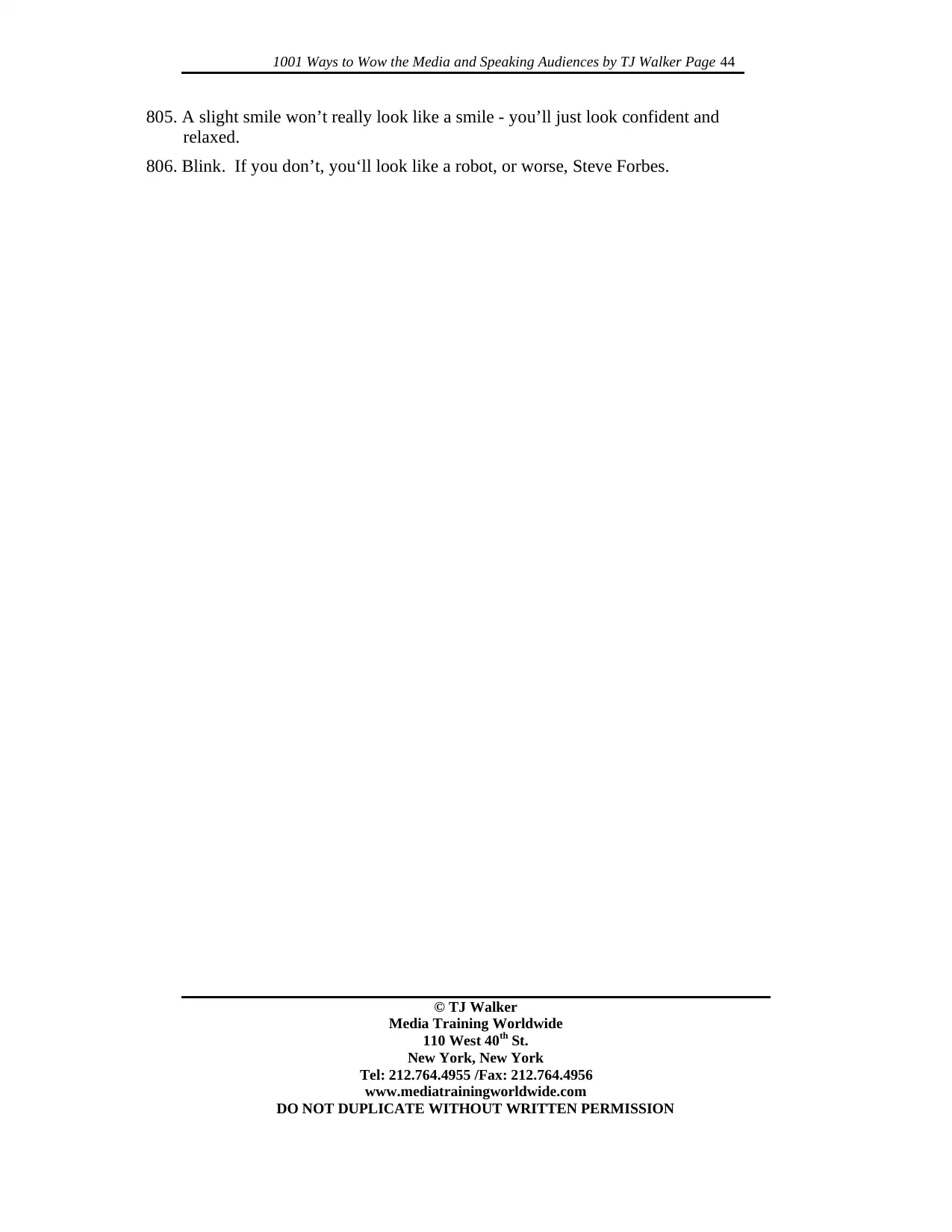
1001 Ways to Wow the Media and Speaking Audiences by TJ Walker Page 44
© TJ Walker
Media Training Worldwide
110 West 40th St.
New York, New York
Tel: 212.764.4955 /Fax: 212.764.4956
www.mediatrainingworldwide.com
DO NOT DUPLICATE WITHOUT WRITTEN PERMISSION
805. A slight smile won’t really look like a smile - you’ll just look confident and
relaxed.
806. Blink. If you don’t, you‘ll look like a robot, or worse, Steve Forbes.
© TJ Walker
Media Training Worldwide
110 West 40th St.
New York, New York
Tel: 212.764.4955 /Fax: 212.764.4956
www.mediatrainingworldwide.com
DO NOT DUPLICATE WITHOUT WRITTEN PERMISSION
805. A slight smile won’t really look like a smile - you’ll just look confident and
relaxed.
806. Blink. If you don’t, you‘ll look like a robot, or worse, Steve Forbes.
Secure Best Marks with AI Grader
Need help grading? Try our AI Grader for instant feedback on your assignments.
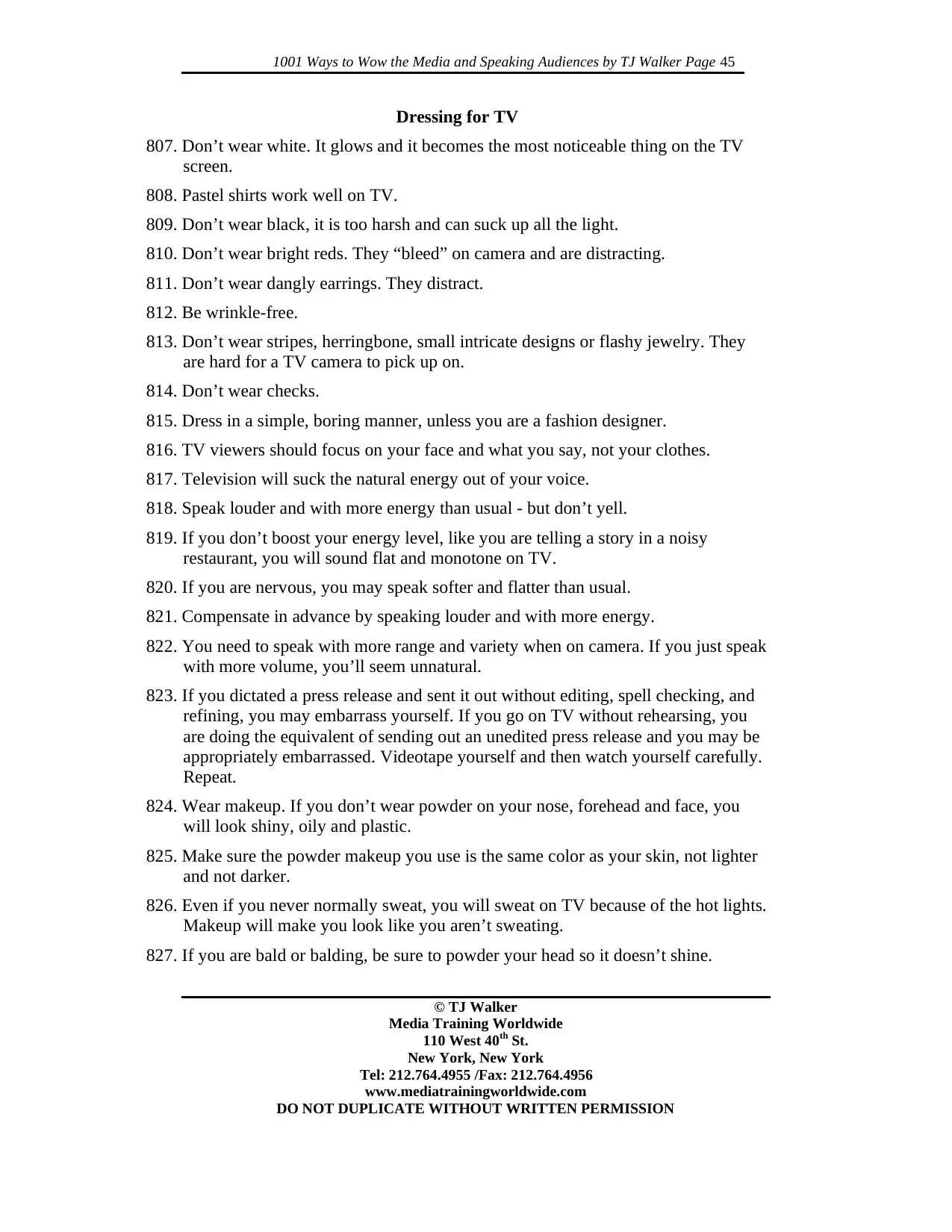
1001 Ways to Wow the Media and Speaking Audiences by TJ Walker Page 45
© TJ Walker
Media Training Worldwide
110 West 40th St.
New York, New York
Tel: 212.764.4955 /Fax: 212.764.4956
www.mediatrainingworldwide.com
DO NOT DUPLICATE WITHOUT WRITTEN PERMISSION
Dressing for TV
807. Don’t wear white. It glows and it becomes the most noticeable thing on the TV
screen.
808. Pastel shirts work well on TV.
809. Don’t wear black, it is too harsh and can suck up all the light.
810. Don’t wear bright reds. They “bleed” on camera and are distracting.
811. Don’t wear dangly earrings. They distract.
812. Be wrinkle-free.
813. Don’t wear stripes, herringbone, small intricate designs or flashy jewelry. They
are hard for a TV camera to pick up on.
814. Don’t wear checks.
815. Dress in a simple, boring manner, unless you are a fashion designer.
816. TV viewers should focus on your face and what you say, not your clothes.
817. Television will suck the natural energy out of your voice.
818. Speak louder and with more energy than usual - but don’t yell.
819. If you don’t boost your energy level, like you are telling a story in a noisy
restaurant, you will sound flat and monotone on TV.
820. If you are nervous, you may speak softer and flatter than usual.
821. Compensate in advance by speaking louder and with more energy.
822. You need to speak with more range and variety when on camera. If you just speak
with more volume, you’ll seem unnatural.
823. If you dictated a press release and sent it out without editing, spell checking, and
refining, you may embarrass yourself. If you go on TV without rehearsing, you
are doing the equivalent of sending out an unedited press release and you may be
appropriately embarrassed. Videotape yourself and then watch yourself carefully.
Repeat.
824. Wear makeup. If you don’t wear powder on your nose, forehead and face, you
will look shiny, oily and plastic.
825. Make sure the powder makeup you use is the same color as your skin, not lighter
and not darker.
826. Even if you never normally sweat, you will sweat on TV because of the hot lights.
Makeup will make you look like you aren’t sweating.
827. If you are bald or balding, be sure to powder your head so it doesn’t shine.
© TJ Walker
Media Training Worldwide
110 West 40th St.
New York, New York
Tel: 212.764.4955 /Fax: 212.764.4956
www.mediatrainingworldwide.com
DO NOT DUPLICATE WITHOUT WRITTEN PERMISSION
Dressing for TV
807. Don’t wear white. It glows and it becomes the most noticeable thing on the TV
screen.
808. Pastel shirts work well on TV.
809. Don’t wear black, it is too harsh and can suck up all the light.
810. Don’t wear bright reds. They “bleed” on camera and are distracting.
811. Don’t wear dangly earrings. They distract.
812. Be wrinkle-free.
813. Don’t wear stripes, herringbone, small intricate designs or flashy jewelry. They
are hard for a TV camera to pick up on.
814. Don’t wear checks.
815. Dress in a simple, boring manner, unless you are a fashion designer.
816. TV viewers should focus on your face and what you say, not your clothes.
817. Television will suck the natural energy out of your voice.
818. Speak louder and with more energy than usual - but don’t yell.
819. If you don’t boost your energy level, like you are telling a story in a noisy
restaurant, you will sound flat and monotone on TV.
820. If you are nervous, you may speak softer and flatter than usual.
821. Compensate in advance by speaking louder and with more energy.
822. You need to speak with more range and variety when on camera. If you just speak
with more volume, you’ll seem unnatural.
823. If you dictated a press release and sent it out without editing, spell checking, and
refining, you may embarrass yourself. If you go on TV without rehearsing, you
are doing the equivalent of sending out an unedited press release and you may be
appropriately embarrassed. Videotape yourself and then watch yourself carefully.
Repeat.
824. Wear makeup. If you don’t wear powder on your nose, forehead and face, you
will look shiny, oily and plastic.
825. Make sure the powder makeup you use is the same color as your skin, not lighter
and not darker.
826. Even if you never normally sweat, you will sweat on TV because of the hot lights.
Makeup will make you look like you aren’t sweating.
827. If you are bald or balding, be sure to powder your head so it doesn’t shine.
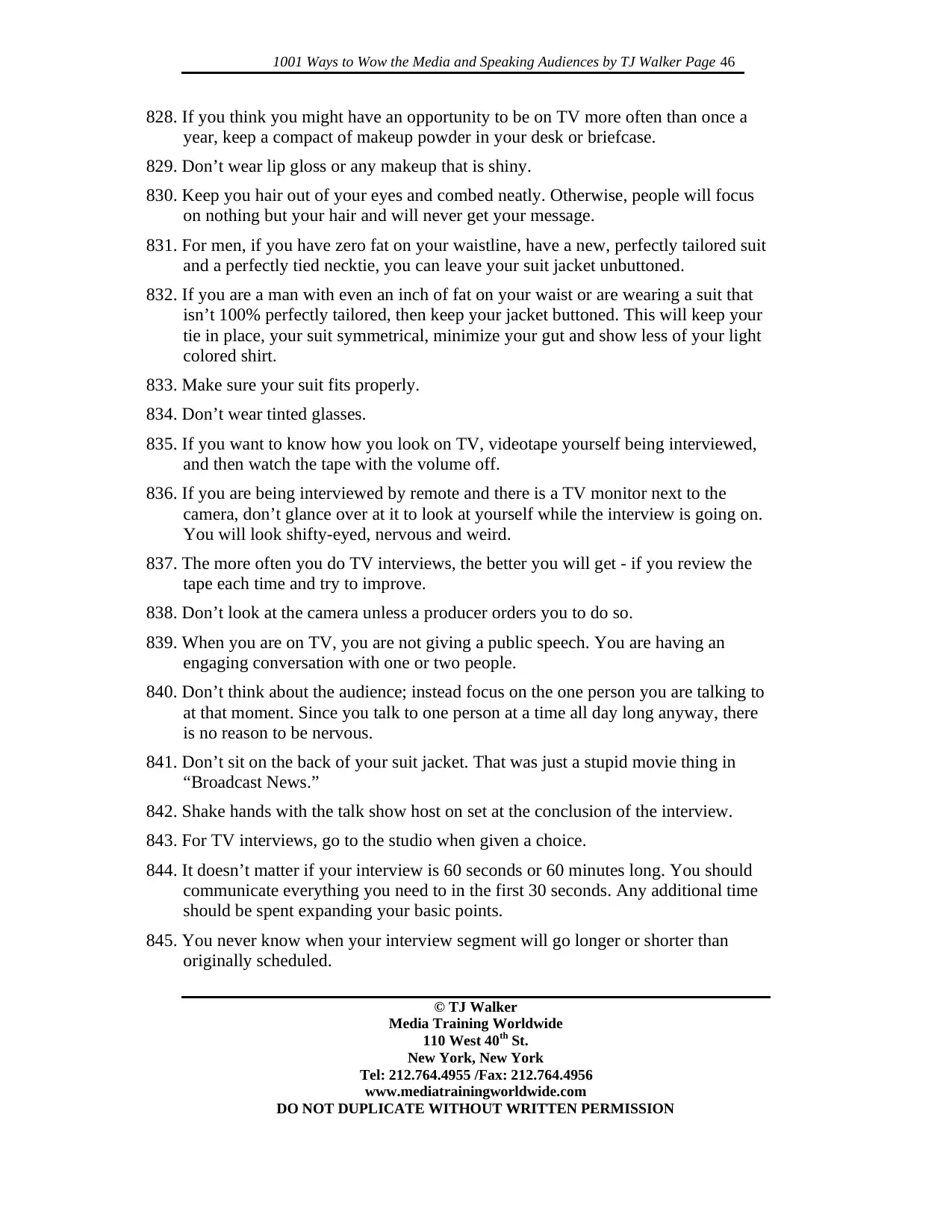
1001 Ways to Wow the Media and Speaking Audiences by TJ Walker Page 46
© TJ Walker
Media Training Worldwide
110 West 40th St.
New York, New York
Tel: 212.764.4955 /Fax: 212.764.4956
www.mediatrainingworldwide.com
DO NOT DUPLICATE WITHOUT WRITTEN PERMISSION
828. If you think you might have an opportunity to be on TV more often than once a
year, keep a compact of makeup powder in your desk or briefcase.
829. Don’t wear lip gloss or any makeup that is shiny.
830. Keep you hair out of your eyes and combed neatly. Otherwise, people will focus
on nothing but your hair and will never get your message.
831. For men, if you have zero fat on your waistline, have a new, perfectly tailored suit
and a perfectly tied necktie, you can leave your suit jacket unbuttoned.
832. If you are a man with even an inch of fat on your waist or are wearing a suit that
isn’t 100% perfectly tailored, then keep your jacket buttoned. This will keep your
tie in place, your suit symmetrical, minimize your gut and show less of your light
colored shirt.
833. Make sure your suit fits properly.
834. Don’t wear tinted glasses.
835. If you want to know how you look on TV, videotape yourself being interviewed,
and then watch the tape with the volume off.
836. If you are being interviewed by remote and there is a TV monitor next to the
camera, don’t glance over at it to look at yourself while the interview is going on.
You will look shifty-eyed, nervous and weird.
837. The more often you do TV interviews, the better you will get - if you review the
tape each time and try to improve.
838. Don’t look at the camera unless a producer orders you to do so.
839. When you are on TV, you are not giving a public speech. You are having an
engaging conversation with one or two people.
840. Don’t think about the audience; instead focus on the one person you are talking to
at that moment. Since you talk to one person at a time all day long anyway, there
is no reason to be nervous.
841. Don’t sit on the back of your suit jacket. That was just a stupid movie thing in
“Broadcast News.”
842. Shake hands with the talk show host on set at the conclusion of the interview.
843. For TV interviews, go to the studio when given a choice.
844. It doesn’t matter if your interview is 60 seconds or 60 minutes long. You should
communicate everything you need to in the first 30 seconds. Any additional time
should be spent expanding your basic points.
845. You never know when your interview segment will go longer or shorter than
originally scheduled.
© TJ Walker
Media Training Worldwide
110 West 40th St.
New York, New York
Tel: 212.764.4955 /Fax: 212.764.4956
www.mediatrainingworldwide.com
DO NOT DUPLICATE WITHOUT WRITTEN PERMISSION
828. If you think you might have an opportunity to be on TV more often than once a
year, keep a compact of makeup powder in your desk or briefcase.
829. Don’t wear lip gloss or any makeup that is shiny.
830. Keep you hair out of your eyes and combed neatly. Otherwise, people will focus
on nothing but your hair and will never get your message.
831. For men, if you have zero fat on your waistline, have a new, perfectly tailored suit
and a perfectly tied necktie, you can leave your suit jacket unbuttoned.
832. If you are a man with even an inch of fat on your waist or are wearing a suit that
isn’t 100% perfectly tailored, then keep your jacket buttoned. This will keep your
tie in place, your suit symmetrical, minimize your gut and show less of your light
colored shirt.
833. Make sure your suit fits properly.
834. Don’t wear tinted glasses.
835. If you want to know how you look on TV, videotape yourself being interviewed,
and then watch the tape with the volume off.
836. If you are being interviewed by remote and there is a TV monitor next to the
camera, don’t glance over at it to look at yourself while the interview is going on.
You will look shifty-eyed, nervous and weird.
837. The more often you do TV interviews, the better you will get - if you review the
tape each time and try to improve.
838. Don’t look at the camera unless a producer orders you to do so.
839. When you are on TV, you are not giving a public speech. You are having an
engaging conversation with one or two people.
840. Don’t think about the audience; instead focus on the one person you are talking to
at that moment. Since you talk to one person at a time all day long anyway, there
is no reason to be nervous.
841. Don’t sit on the back of your suit jacket. That was just a stupid movie thing in
“Broadcast News.”
842. Shake hands with the talk show host on set at the conclusion of the interview.
843. For TV interviews, go to the studio when given a choice.
844. It doesn’t matter if your interview is 60 seconds or 60 minutes long. You should
communicate everything you need to in the first 30 seconds. Any additional time
should be spent expanding your basic points.
845. You never know when your interview segment will go longer or shorter than
originally scheduled.
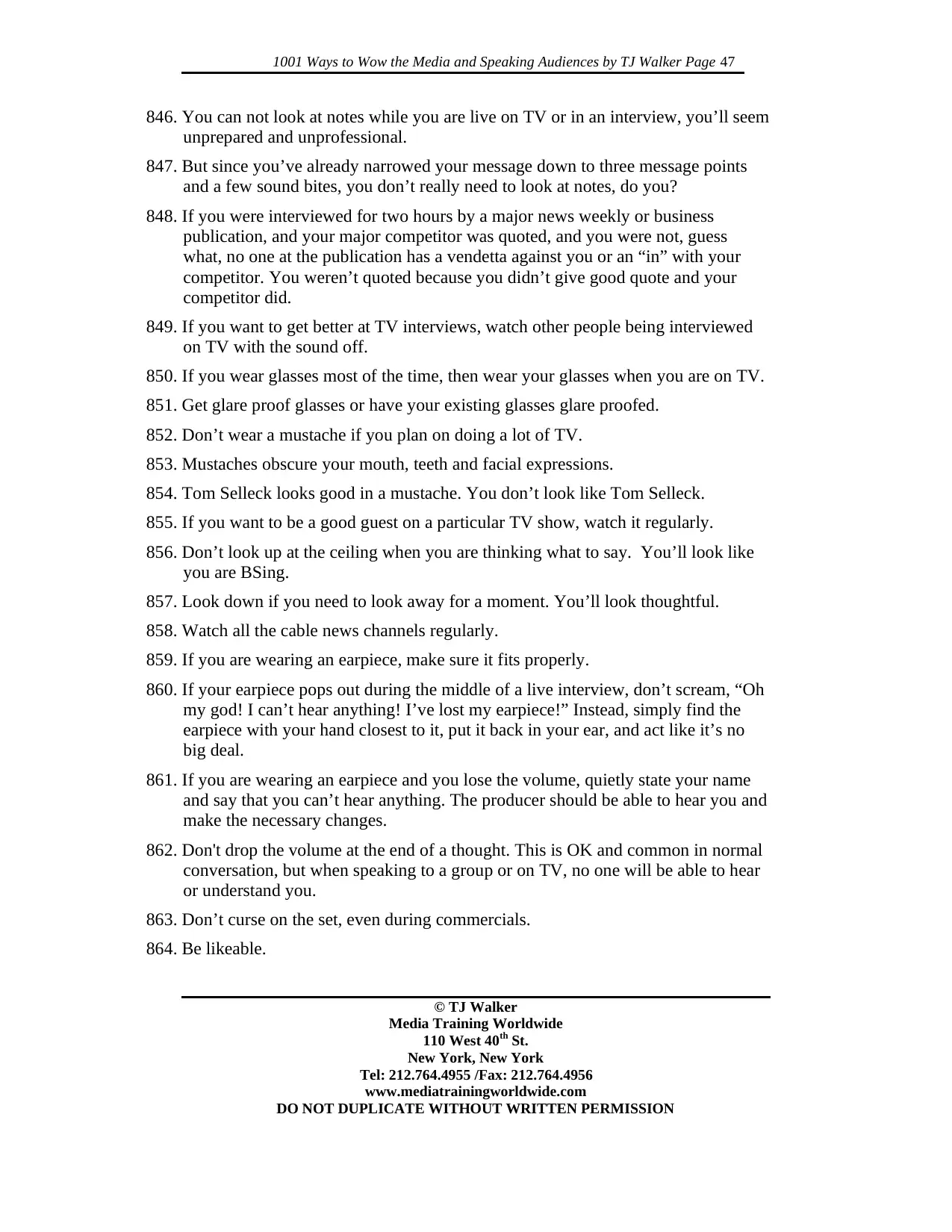
1001 Ways to Wow the Media and Speaking Audiences by TJ Walker Page 47
© TJ Walker
Media Training Worldwide
110 West 40th St.
New York, New York
Tel: 212.764.4955 /Fax: 212.764.4956
www.mediatrainingworldwide.com
DO NOT DUPLICATE WITHOUT WRITTEN PERMISSION
846. You can not look at notes while you are live on TV or in an interview, you’ll seem
unprepared and unprofessional.
847. But since you’ve already narrowed your message down to three message points
and a few sound bites, you don’t really need to look at notes, do you?
848. If you were interviewed for two hours by a major news weekly or business
publication, and your major competitor was quoted, and you were not, guess
what, no one at the publication has a vendetta against you or an “in” with your
competitor. You weren’t quoted because you didn’t give good quote and your
competitor did.
849. If you want to get better at TV interviews, watch other people being interviewed
on TV with the sound off.
850. If you wear glasses most of the time, then wear your glasses when you are on TV.
851. Get glare proof glasses or have your existing glasses glare proofed.
852. Don’t wear a mustache if you plan on doing a lot of TV.
853. Mustaches obscure your mouth, teeth and facial expressions.
854. Tom Selleck looks good in a mustache. You don’t look like Tom Selleck.
855. If you want to be a good guest on a particular TV show, watch it regularly.
856. Don’t look up at the ceiling when you are thinking what to say. You’ll look like
you are BSing.
857. Look down if you need to look away for a moment. You’ll look thoughtful.
858. Watch all the cable news channels regularly.
859. If you are wearing an earpiece, make sure it fits properly.
860. If your earpiece pops out during the middle of a live interview, don’t scream, “Oh
my god! I can’t hear anything! I’ve lost my earpiece!” Instead, simply find the
earpiece with your hand closest to it, put it back in your ear, and act like it’s no
big deal.
861. If you are wearing an earpiece and you lose the volume, quietly state your name
and say that you can’t hear anything. The producer should be able to hear you and
make the necessary changes.
862. Don't drop the volume at the end of a thought. This is OK and common in normal
conversation, but when speaking to a group or on TV, no one will be able to hear
or understand you.
863. Don’t curse on the set, even during commercials.
864. Be likeable.
© TJ Walker
Media Training Worldwide
110 West 40th St.
New York, New York
Tel: 212.764.4955 /Fax: 212.764.4956
www.mediatrainingworldwide.com
DO NOT DUPLICATE WITHOUT WRITTEN PERMISSION
846. You can not look at notes while you are live on TV or in an interview, you’ll seem
unprepared and unprofessional.
847. But since you’ve already narrowed your message down to three message points
and a few sound bites, you don’t really need to look at notes, do you?
848. If you were interviewed for two hours by a major news weekly or business
publication, and your major competitor was quoted, and you were not, guess
what, no one at the publication has a vendetta against you or an “in” with your
competitor. You weren’t quoted because you didn’t give good quote and your
competitor did.
849. If you want to get better at TV interviews, watch other people being interviewed
on TV with the sound off.
850. If you wear glasses most of the time, then wear your glasses when you are on TV.
851. Get glare proof glasses or have your existing glasses glare proofed.
852. Don’t wear a mustache if you plan on doing a lot of TV.
853. Mustaches obscure your mouth, teeth and facial expressions.
854. Tom Selleck looks good in a mustache. You don’t look like Tom Selleck.
855. If you want to be a good guest on a particular TV show, watch it regularly.
856. Don’t look up at the ceiling when you are thinking what to say. You’ll look like
you are BSing.
857. Look down if you need to look away for a moment. You’ll look thoughtful.
858. Watch all the cable news channels regularly.
859. If you are wearing an earpiece, make sure it fits properly.
860. If your earpiece pops out during the middle of a live interview, don’t scream, “Oh
my god! I can’t hear anything! I’ve lost my earpiece!” Instead, simply find the
earpiece with your hand closest to it, put it back in your ear, and act like it’s no
big deal.
861. If you are wearing an earpiece and you lose the volume, quietly state your name
and say that you can’t hear anything. The producer should be able to hear you and
make the necessary changes.
862. Don't drop the volume at the end of a thought. This is OK and common in normal
conversation, but when speaking to a group or on TV, no one will be able to hear
or understand you.
863. Don’t curse on the set, even during commercials.
864. Be likeable.
Paraphrase This Document
Need a fresh take? Get an instant paraphrase of this document with our AI Paraphraser
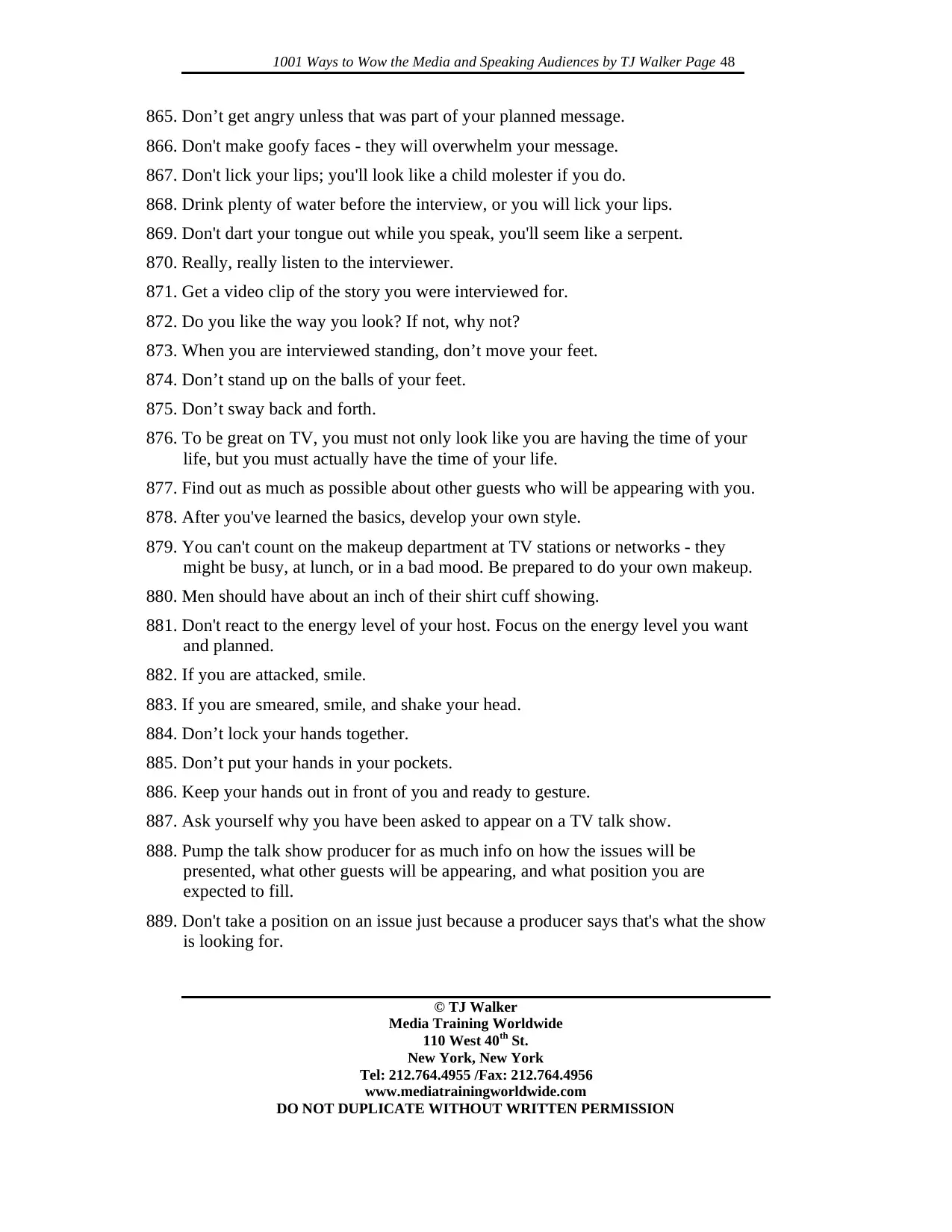
1001 Ways to Wow the Media and Speaking Audiences by TJ Walker Page 48
© TJ Walker
Media Training Worldwide
110 West 40th St.
New York, New York
Tel: 212.764.4955 /Fax: 212.764.4956
www.mediatrainingworldwide.com
DO NOT DUPLICATE WITHOUT WRITTEN PERMISSION
865. Don’t get angry unless that was part of your planned message.
866. Don't make goofy faces - they will overwhelm your message.
867. Don't lick your lips; you'll look like a child molester if you do.
868. Drink plenty of water before the interview, or you will lick your lips.
869. Don't dart your tongue out while you speak, you'll seem like a serpent.
870. Really, really listen to the interviewer.
871. Get a video clip of the story you were interviewed for.
872. Do you like the way you look? If not, why not?
873. When you are interviewed standing, don’t move your feet.
874. Don’t stand up on the balls of your feet.
875. Don’t sway back and forth.
876. To be great on TV, you must not only look like you are having the time of your
life, but you must actually have the time of your life.
877. Find out as much as possible about other guests who will be appearing with you.
878. After you've learned the basics, develop your own style.
879. You can't count on the makeup department at TV stations or networks - they
might be busy, at lunch, or in a bad mood. Be prepared to do your own makeup.
880. Men should have about an inch of their shirt cuff showing.
881. Don't react to the energy level of your host. Focus on the energy level you want
and planned.
882. If you are attacked, smile.
883. If you are smeared, smile, and shake your head.
884. Don’t lock your hands together.
885. Don’t put your hands in your pockets.
886. Keep your hands out in front of you and ready to gesture.
887. Ask yourself why you have been asked to appear on a TV talk show.
888. Pump the talk show producer for as much info on how the issues will be
presented, what other guests will be appearing, and what position you are
expected to fill.
889. Don't take a position on an issue just because a producer says that's what the show
is looking for.
© TJ Walker
Media Training Worldwide
110 West 40th St.
New York, New York
Tel: 212.764.4955 /Fax: 212.764.4956
www.mediatrainingworldwide.com
DO NOT DUPLICATE WITHOUT WRITTEN PERMISSION
865. Don’t get angry unless that was part of your planned message.
866. Don't make goofy faces - they will overwhelm your message.
867. Don't lick your lips; you'll look like a child molester if you do.
868. Drink plenty of water before the interview, or you will lick your lips.
869. Don't dart your tongue out while you speak, you'll seem like a serpent.
870. Really, really listen to the interviewer.
871. Get a video clip of the story you were interviewed for.
872. Do you like the way you look? If not, why not?
873. When you are interviewed standing, don’t move your feet.
874. Don’t stand up on the balls of your feet.
875. Don’t sway back and forth.
876. To be great on TV, you must not only look like you are having the time of your
life, but you must actually have the time of your life.
877. Find out as much as possible about other guests who will be appearing with you.
878. After you've learned the basics, develop your own style.
879. You can't count on the makeup department at TV stations or networks - they
might be busy, at lunch, or in a bad mood. Be prepared to do your own makeup.
880. Men should have about an inch of their shirt cuff showing.
881. Don't react to the energy level of your host. Focus on the energy level you want
and planned.
882. If you are attacked, smile.
883. If you are smeared, smile, and shake your head.
884. Don’t lock your hands together.
885. Don’t put your hands in your pockets.
886. Keep your hands out in front of you and ready to gesture.
887. Ask yourself why you have been asked to appear on a TV talk show.
888. Pump the talk show producer for as much info on how the issues will be
presented, what other guests will be appearing, and what position you are
expected to fill.
889. Don't take a position on an issue just because a producer says that's what the show
is looking for.
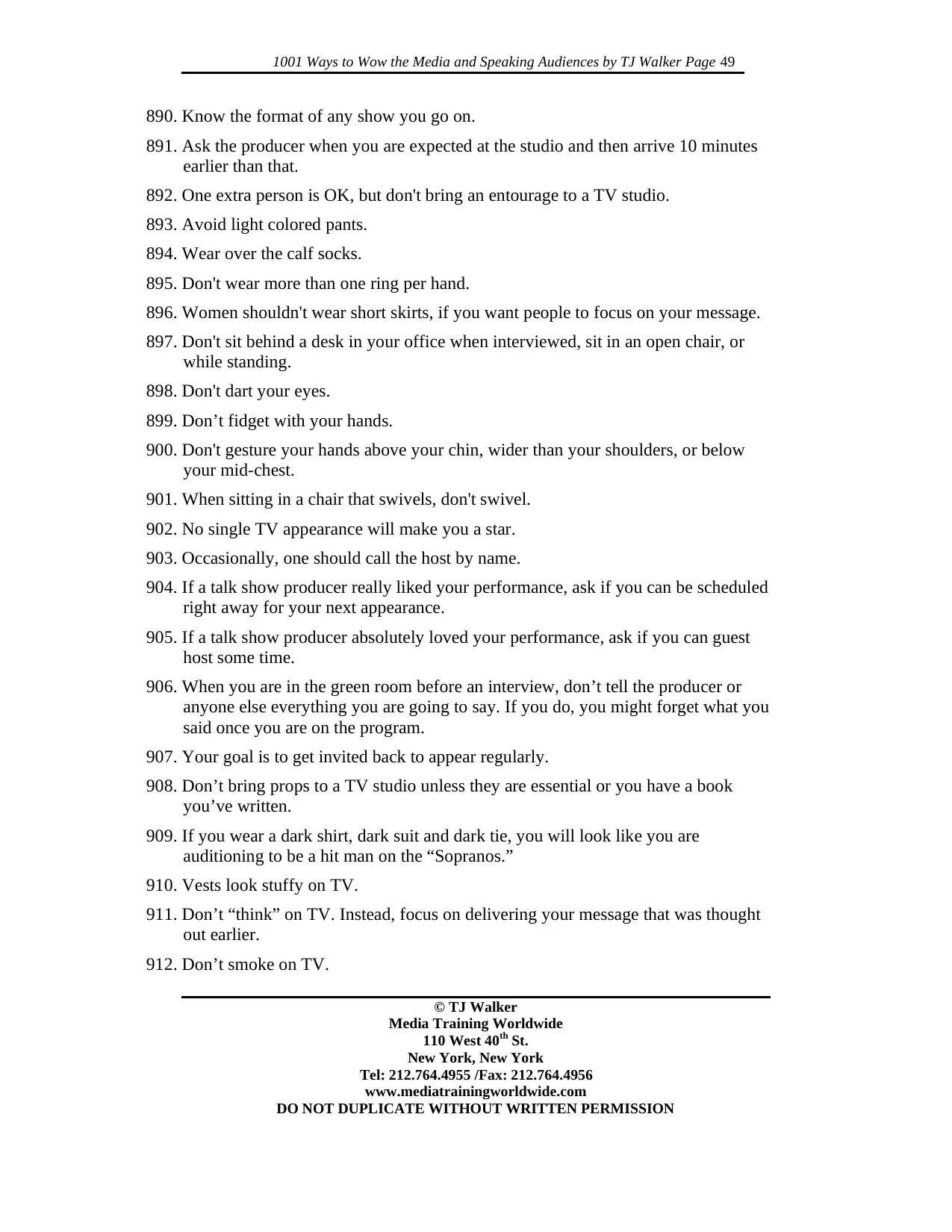
1001 Ways to Wow the Media and Speaking Audiences by TJ Walker Page 49
© TJ Walker
Media Training Worldwide
110 West 40th St.
New York, New York
Tel: 212.764.4955 /Fax: 212.764.4956
www.mediatrainingworldwide.com
DO NOT DUPLICATE WITHOUT WRITTEN PERMISSION
890. Know the format of any show you go on.
891. Ask the producer when you are expected at the studio and then arrive 10 minutes
earlier than that.
892. One extra person is OK, but don't bring an entourage to a TV studio.
893. Avoid light colored pants.
894. Wear over the calf socks.
895. Don't wear more than one ring per hand.
896. Women shouldn't wear short skirts, if you want people to focus on your message.
897. Don't sit behind a desk in your office when interviewed, sit in an open chair, or
while standing.
898. Don't dart your eyes.
899. Don’t fidget with your hands.
900. Don't gesture your hands above your chin, wider than your shoulders, or below
your mid-chest.
901. When sitting in a chair that swivels, don't swivel.
902. No single TV appearance will make you a star.
903. Occasionally, one should call the host by name.
904. If a talk show producer really liked your performance, ask if you can be scheduled
right away for your next appearance.
905. If a talk show producer absolutely loved your performance, ask if you can guest
host some time.
906. When you are in the green room before an interview, don’t tell the producer or
anyone else everything you are going to say. If you do, you might forget what you
said once you are on the program.
907. Your goal is to get invited back to appear regularly.
908. Don’t bring props to a TV studio unless they are essential or you have a book
you’ve written.
909. If you wear a dark shirt, dark suit and dark tie, you will look like you are
auditioning to be a hit man on the “Sopranos.”
910. Vests look stuffy on TV.
911. Don’t “think” on TV. Instead, focus on delivering your message that was thought
out earlier.
912. Don’t smoke on TV.
© TJ Walker
Media Training Worldwide
110 West 40th St.
New York, New York
Tel: 212.764.4955 /Fax: 212.764.4956
www.mediatrainingworldwide.com
DO NOT DUPLICATE WITHOUT WRITTEN PERMISSION
890. Know the format of any show you go on.
891. Ask the producer when you are expected at the studio and then arrive 10 minutes
earlier than that.
892. One extra person is OK, but don't bring an entourage to a TV studio.
893. Avoid light colored pants.
894. Wear over the calf socks.
895. Don't wear more than one ring per hand.
896. Women shouldn't wear short skirts, if you want people to focus on your message.
897. Don't sit behind a desk in your office when interviewed, sit in an open chair, or
while standing.
898. Don't dart your eyes.
899. Don’t fidget with your hands.
900. Don't gesture your hands above your chin, wider than your shoulders, or below
your mid-chest.
901. When sitting in a chair that swivels, don't swivel.
902. No single TV appearance will make you a star.
903. Occasionally, one should call the host by name.
904. If a talk show producer really liked your performance, ask if you can be scheduled
right away for your next appearance.
905. If a talk show producer absolutely loved your performance, ask if you can guest
host some time.
906. When you are in the green room before an interview, don’t tell the producer or
anyone else everything you are going to say. If you do, you might forget what you
said once you are on the program.
907. Your goal is to get invited back to appear regularly.
908. Don’t bring props to a TV studio unless they are essential or you have a book
you’ve written.
909. If you wear a dark shirt, dark suit and dark tie, you will look like you are
auditioning to be a hit man on the “Sopranos.”
910. Vests look stuffy on TV.
911. Don’t “think” on TV. Instead, focus on delivering your message that was thought
out earlier.
912. Don’t smoke on TV.
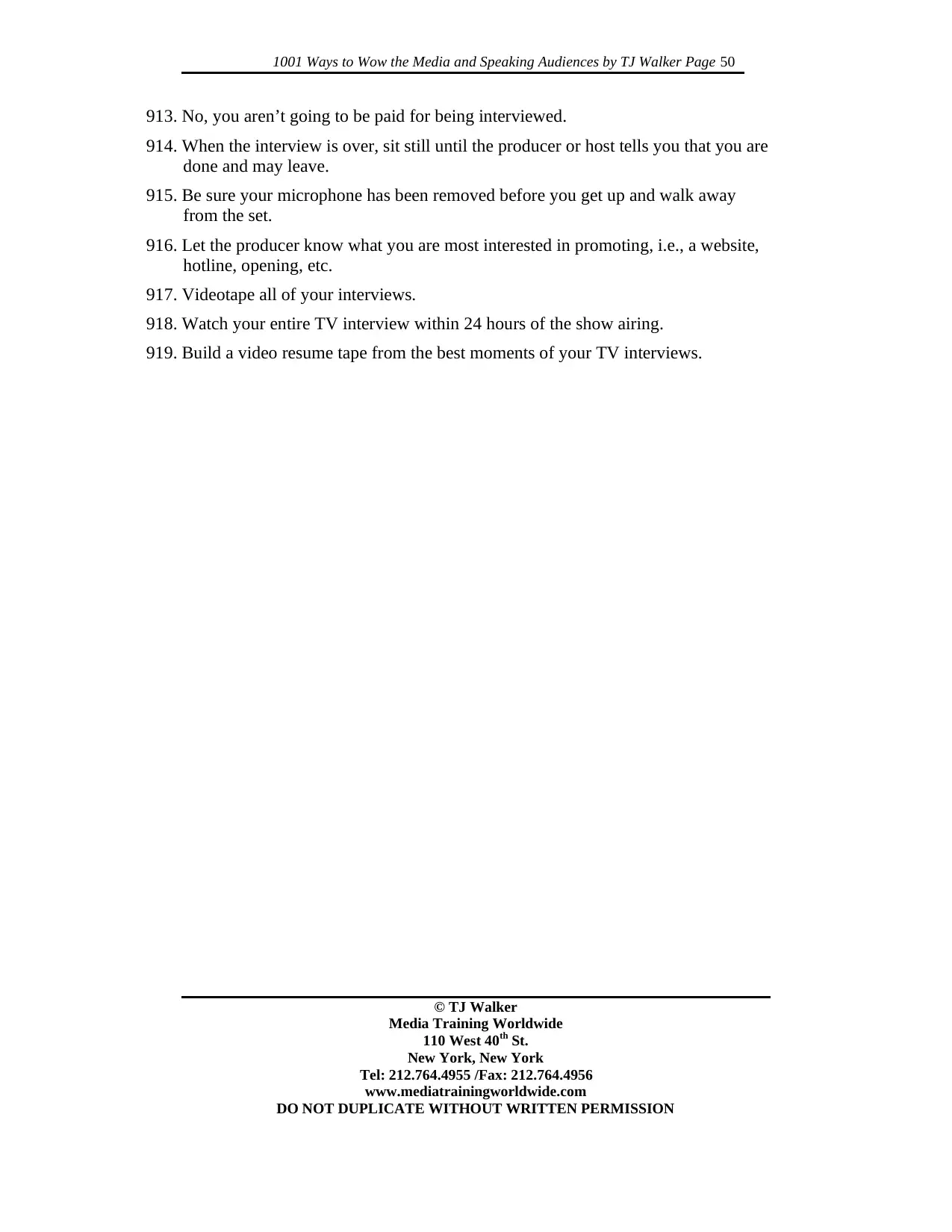
1001 Ways to Wow the Media and Speaking Audiences by TJ Walker Page 50
© TJ Walker
Media Training Worldwide
110 West 40th St.
New York, New York
Tel: 212.764.4955 /Fax: 212.764.4956
www.mediatrainingworldwide.com
DO NOT DUPLICATE WITHOUT WRITTEN PERMISSION
913. No, you aren’t going to be paid for being interviewed.
914. When the interview is over, sit still until the producer or host tells you that you are
done and may leave.
915. Be sure your microphone has been removed before you get up and walk away
from the set.
916. Let the producer know what you are most interested in promoting, i.e., a website,
hotline, opening, etc.
917. Videotape all of your interviews.
918. Watch your entire TV interview within 24 hours of the show airing.
919. Build a video resume tape from the best moments of your TV interviews.
© TJ Walker
Media Training Worldwide
110 West 40th St.
New York, New York
Tel: 212.764.4955 /Fax: 212.764.4956
www.mediatrainingworldwide.com
DO NOT DUPLICATE WITHOUT WRITTEN PERMISSION
913. No, you aren’t going to be paid for being interviewed.
914. When the interview is over, sit still until the producer or host tells you that you are
done and may leave.
915. Be sure your microphone has been removed before you get up and walk away
from the set.
916. Let the producer know what you are most interested in promoting, i.e., a website,
hotline, opening, etc.
917. Videotape all of your interviews.
918. Watch your entire TV interview within 24 hours of the show airing.
919. Build a video resume tape from the best moments of your TV interviews.
Secure Best Marks with AI Grader
Need help grading? Try our AI Grader for instant feedback on your assignments.
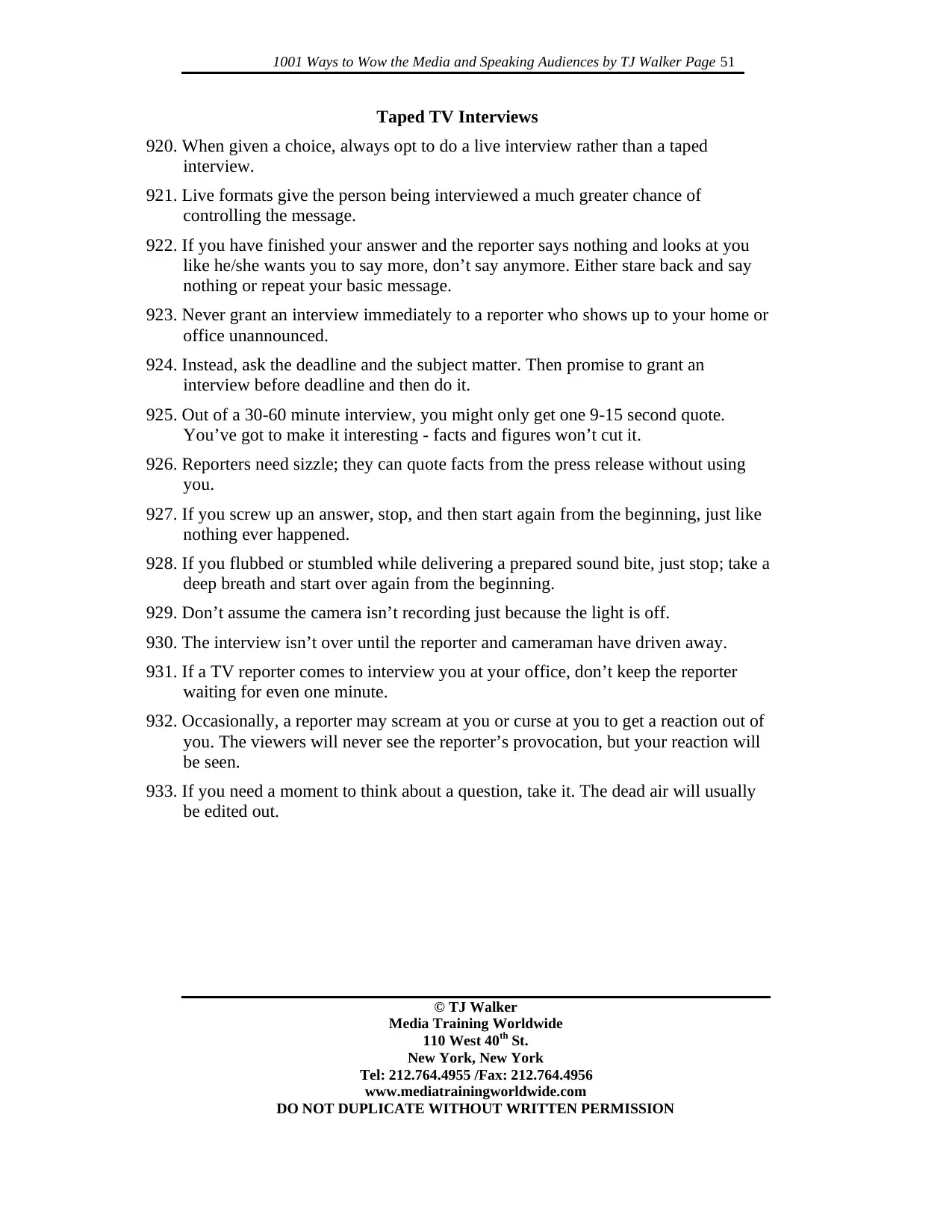
1001 Ways to Wow the Media and Speaking Audiences by TJ Walker Page 51
© TJ Walker
Media Training Worldwide
110 West 40th St.
New York, New York
Tel: 212.764.4955 /Fax: 212.764.4956
www.mediatrainingworldwide.com
DO NOT DUPLICATE WITHOUT WRITTEN PERMISSION
Taped TV Interviews
920. When given a choice, always opt to do a live interview rather than a taped
interview.
921. Live formats give the person being interviewed a much greater chance of
controlling the message.
922. If you have finished your answer and the reporter says nothing and looks at you
like he/she wants you to say more, don’t say anymore. Either stare back and say
nothing or repeat your basic message.
923. Never grant an interview immediately to a reporter who shows up to your home or
office unannounced.
924. Instead, ask the deadline and the subject matter. Then promise to grant an
interview before deadline and then do it.
925. Out of a 30-60 minute interview, you might only get one 9-15 second quote.
You’ve got to make it interesting - facts and figures won’t cut it.
926. Reporters need sizzle; they can quote facts from the press release without using
you.
927. If you screw up an answer, stop, and then start again from the beginning, just like
nothing ever happened.
928. If you flubbed or stumbled while delivering a prepared sound bite, just stop; take a
deep breath and start over again from the beginning.
929. Don’t assume the camera isn’t recording just because the light is off.
930. The interview isn’t over until the reporter and cameraman have driven away.
931. If a TV reporter comes to interview you at your office, don’t keep the reporter
waiting for even one minute.
932. Occasionally, a reporter may scream at you or curse at you to get a reaction out of
you. The viewers will never see the reporter’s provocation, but your reaction will
be seen.
933. If you need a moment to think about a question, take it. The dead air will usually
be edited out.
© TJ Walker
Media Training Worldwide
110 West 40th St.
New York, New York
Tel: 212.764.4955 /Fax: 212.764.4956
www.mediatrainingworldwide.com
DO NOT DUPLICATE WITHOUT WRITTEN PERMISSION
Taped TV Interviews
920. When given a choice, always opt to do a live interview rather than a taped
interview.
921. Live formats give the person being interviewed a much greater chance of
controlling the message.
922. If you have finished your answer and the reporter says nothing and looks at you
like he/she wants you to say more, don’t say anymore. Either stare back and say
nothing or repeat your basic message.
923. Never grant an interview immediately to a reporter who shows up to your home or
office unannounced.
924. Instead, ask the deadline and the subject matter. Then promise to grant an
interview before deadline and then do it.
925. Out of a 30-60 minute interview, you might only get one 9-15 second quote.
You’ve got to make it interesting - facts and figures won’t cut it.
926. Reporters need sizzle; they can quote facts from the press release without using
you.
927. If you screw up an answer, stop, and then start again from the beginning, just like
nothing ever happened.
928. If you flubbed or stumbled while delivering a prepared sound bite, just stop; take a
deep breath and start over again from the beginning.
929. Don’t assume the camera isn’t recording just because the light is off.
930. The interview isn’t over until the reporter and cameraman have driven away.
931. If a TV reporter comes to interview you at your office, don’t keep the reporter
waiting for even one minute.
932. Occasionally, a reporter may scream at you or curse at you to get a reaction out of
you. The viewers will never see the reporter’s provocation, but your reaction will
be seen.
933. If you need a moment to think about a question, take it. The dead air will usually
be edited out.
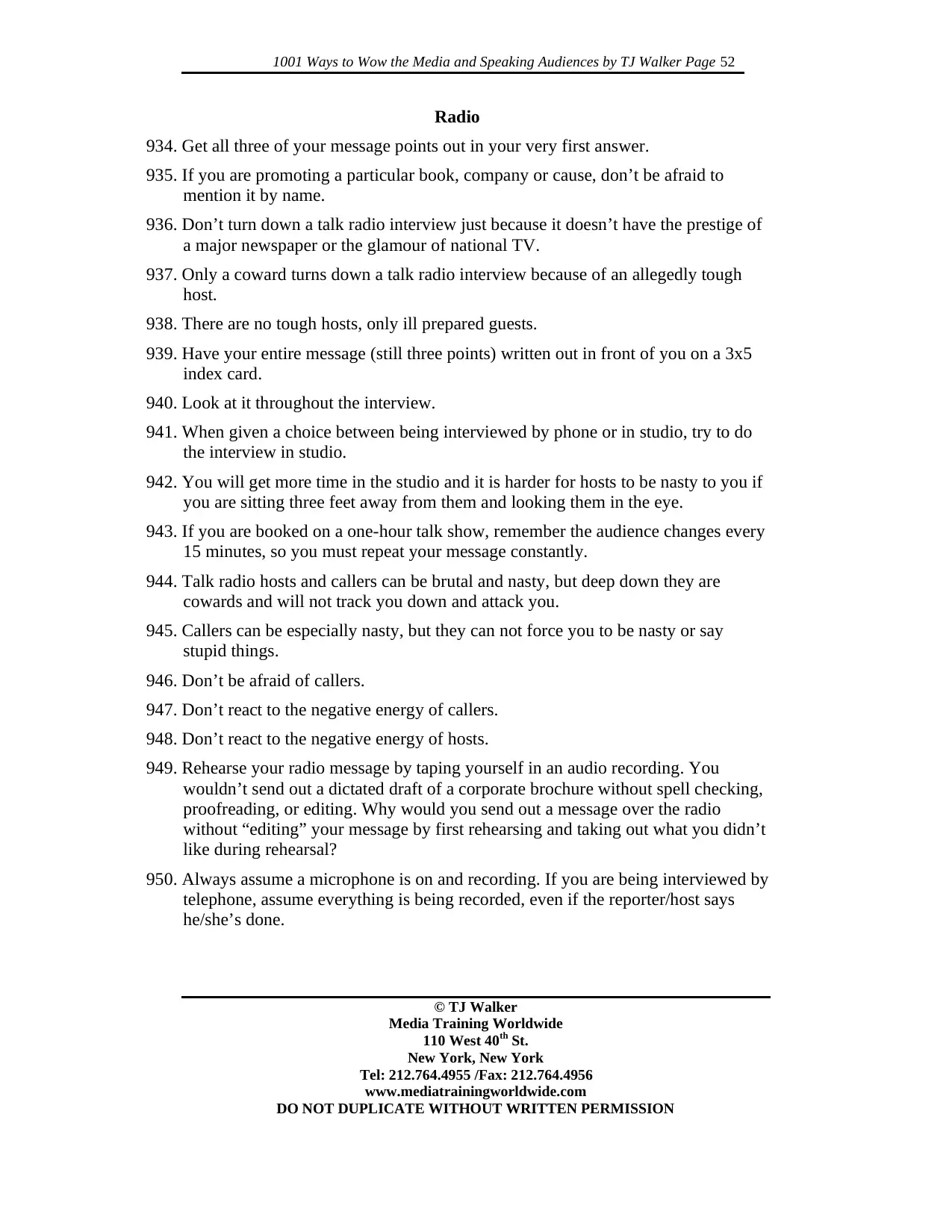
1001 Ways to Wow the Media and Speaking Audiences by TJ Walker Page 52
© TJ Walker
Media Training Worldwide
110 West 40th St.
New York, New York
Tel: 212.764.4955 /Fax: 212.764.4956
www.mediatrainingworldwide.com
DO NOT DUPLICATE WITHOUT WRITTEN PERMISSION
Radio
934. Get all three of your message points out in your very first answer.
935. If you are promoting a particular book, company or cause, don’t be afraid to
mention it by name.
936. Don’t turn down a talk radio interview just because it doesn’t have the prestige of
a major newspaper or the glamour of national TV.
937. Only a coward turns down a talk radio interview because of an allegedly tough
host.
938. There are no tough hosts, only ill prepared guests.
939. Have your entire message (still three points) written out in front of you on a 3x5
index card.
940. Look at it throughout the interview.
941. When given a choice between being interviewed by phone or in studio, try to do
the interview in studio.
942. You will get more time in the studio and it is harder for hosts to be nasty to you if
you are sitting three feet away from them and looking them in the eye.
943. If you are booked on a one-hour talk show, remember the audience changes every
15 minutes, so you must repeat your message constantly.
944. Talk radio hosts and callers can be brutal and nasty, but deep down they are
cowards and will not track you down and attack you.
945. Callers can be especially nasty, but they can not force you to be nasty or say
stupid things.
946. Don’t be afraid of callers.
947. Don’t react to the negative energy of callers.
948. Don’t react to the negative energy of hosts.
949. Rehearse your radio message by taping yourself in an audio recording. You
wouldn’t send out a dictated draft of a corporate brochure without spell checking,
proofreading, or editing. Why would you send out a message over the radio
without “editing” your message by first rehearsing and taking out what you didn’t
like during rehearsal?
950. Always assume a microphone is on and recording. If you are being interviewed by
telephone, assume everything is being recorded, even if the reporter/host says
he/she’s done.
© TJ Walker
Media Training Worldwide
110 West 40th St.
New York, New York
Tel: 212.764.4955 /Fax: 212.764.4956
www.mediatrainingworldwide.com
DO NOT DUPLICATE WITHOUT WRITTEN PERMISSION
Radio
934. Get all three of your message points out in your very first answer.
935. If you are promoting a particular book, company or cause, don’t be afraid to
mention it by name.
936. Don’t turn down a talk radio interview just because it doesn’t have the prestige of
a major newspaper or the glamour of national TV.
937. Only a coward turns down a talk radio interview because of an allegedly tough
host.
938. There are no tough hosts, only ill prepared guests.
939. Have your entire message (still three points) written out in front of you on a 3x5
index card.
940. Look at it throughout the interview.
941. When given a choice between being interviewed by phone or in studio, try to do
the interview in studio.
942. You will get more time in the studio and it is harder for hosts to be nasty to you if
you are sitting three feet away from them and looking them in the eye.
943. If you are booked on a one-hour talk show, remember the audience changes every
15 minutes, so you must repeat your message constantly.
944. Talk radio hosts and callers can be brutal and nasty, but deep down they are
cowards and will not track you down and attack you.
945. Callers can be especially nasty, but they can not force you to be nasty or say
stupid things.
946. Don’t be afraid of callers.
947. Don’t react to the negative energy of callers.
948. Don’t react to the negative energy of hosts.
949. Rehearse your radio message by taping yourself in an audio recording. You
wouldn’t send out a dictated draft of a corporate brochure without spell checking,
proofreading, or editing. Why would you send out a message over the radio
without “editing” your message by first rehearsing and taking out what you didn’t
like during rehearsal?
950. Always assume a microphone is on and recording. If you are being interviewed by
telephone, assume everything is being recorded, even if the reporter/host says
he/she’s done.
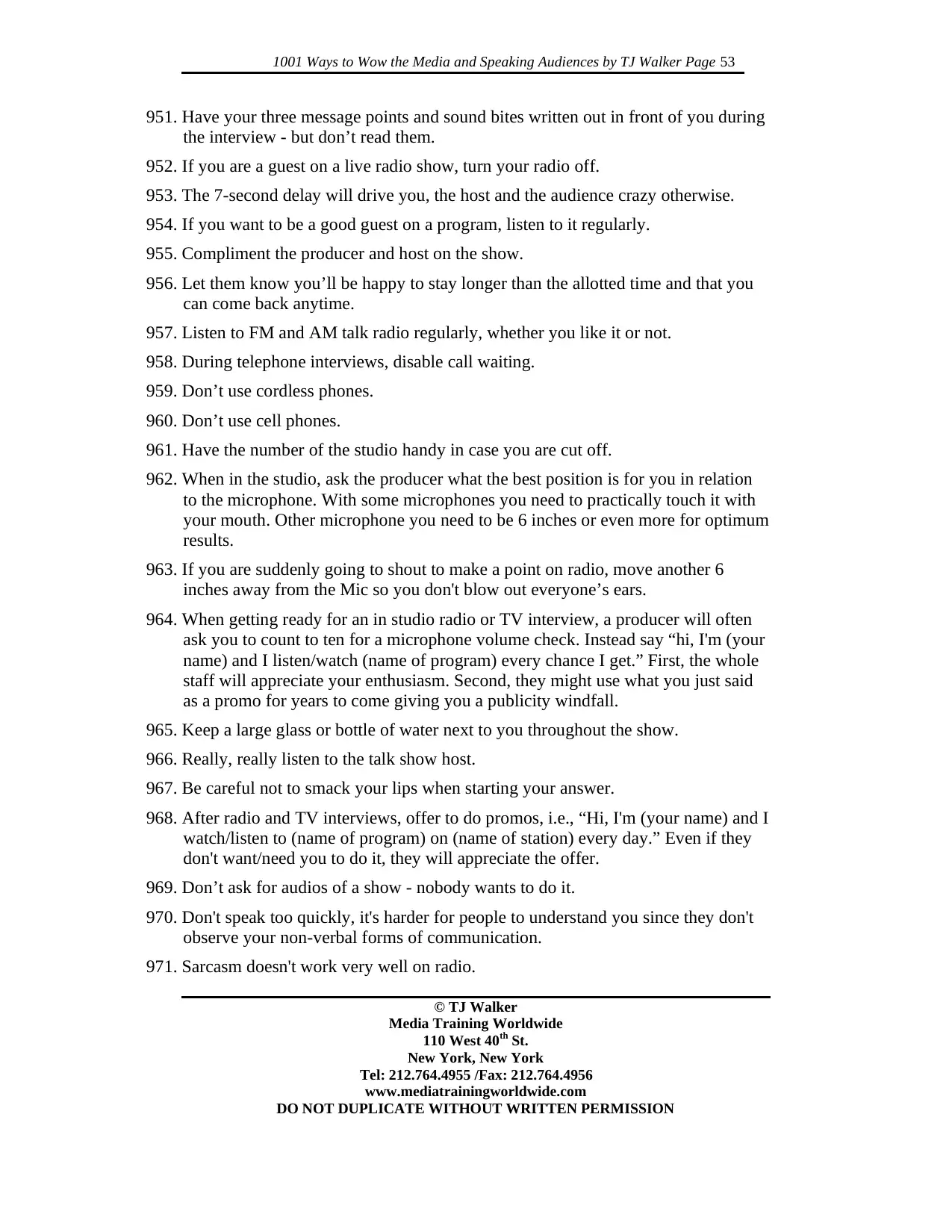
1001 Ways to Wow the Media and Speaking Audiences by TJ Walker Page 53
© TJ Walker
Media Training Worldwide
110 West 40th St.
New York, New York
Tel: 212.764.4955 /Fax: 212.764.4956
www.mediatrainingworldwide.com
DO NOT DUPLICATE WITHOUT WRITTEN PERMISSION
951. Have your three message points and sound bites written out in front of you during
the interview - but don’t read them.
952. If you are a guest on a live radio show, turn your radio off.
953. The 7-second delay will drive you, the host and the audience crazy otherwise.
954. If you want to be a good guest on a program, listen to it regularly.
955. Compliment the producer and host on the show.
956. Let them know you’ll be happy to stay longer than the allotted time and that you
can come back anytime.
957. Listen to FM and AM talk radio regularly, whether you like it or not.
958. During telephone interviews, disable call waiting.
959. Don’t use cordless phones.
960. Don’t use cell phones.
961. Have the number of the studio handy in case you are cut off.
962. When in the studio, ask the producer what the best position is for you in relation
to the microphone. With some microphones you need to practically touch it with
your mouth. Other microphone you need to be 6 inches or even more for optimum
results.
963. If you are suddenly going to shout to make a point on radio, move another 6
inches away from the Mic so you don't blow out everyone’s ears.
964. When getting ready for an in studio radio or TV interview, a producer will often
ask you to count to ten for a microphone volume check. Instead say “hi, I'm (your
name) and I listen/watch (name of program) every chance I get.” First, the whole
staff will appreciate your enthusiasm. Second, they might use what you just said
as a promo for years to come giving you a publicity windfall.
965. Keep a large glass or bottle of water next to you throughout the show.
966. Really, really listen to the talk show host.
967. Be careful not to smack your lips when starting your answer.
968. After radio and TV interviews, offer to do promos, i.e., “Hi, I'm (your name) and I
watch/listen to (name of program) on (name of station) every day.” Even if they
don't want/need you to do it, they will appreciate the offer.
969. Don’t ask for audios of a show - nobody wants to do it.
970. Don't speak too quickly, it's harder for people to understand you since they don't
observe your non-verbal forms of communication.
971. Sarcasm doesn't work very well on radio.
© TJ Walker
Media Training Worldwide
110 West 40th St.
New York, New York
Tel: 212.764.4955 /Fax: 212.764.4956
www.mediatrainingworldwide.com
DO NOT DUPLICATE WITHOUT WRITTEN PERMISSION
951. Have your three message points and sound bites written out in front of you during
the interview - but don’t read them.
952. If you are a guest on a live radio show, turn your radio off.
953. The 7-second delay will drive you, the host and the audience crazy otherwise.
954. If you want to be a good guest on a program, listen to it regularly.
955. Compliment the producer and host on the show.
956. Let them know you’ll be happy to stay longer than the allotted time and that you
can come back anytime.
957. Listen to FM and AM talk radio regularly, whether you like it or not.
958. During telephone interviews, disable call waiting.
959. Don’t use cordless phones.
960. Don’t use cell phones.
961. Have the number of the studio handy in case you are cut off.
962. When in the studio, ask the producer what the best position is for you in relation
to the microphone. With some microphones you need to practically touch it with
your mouth. Other microphone you need to be 6 inches or even more for optimum
results.
963. If you are suddenly going to shout to make a point on radio, move another 6
inches away from the Mic so you don't blow out everyone’s ears.
964. When getting ready for an in studio radio or TV interview, a producer will often
ask you to count to ten for a microphone volume check. Instead say “hi, I'm (your
name) and I listen/watch (name of program) every chance I get.” First, the whole
staff will appreciate your enthusiasm. Second, they might use what you just said
as a promo for years to come giving you a publicity windfall.
965. Keep a large glass or bottle of water next to you throughout the show.
966. Really, really listen to the talk show host.
967. Be careful not to smack your lips when starting your answer.
968. After radio and TV interviews, offer to do promos, i.e., “Hi, I'm (your name) and I
watch/listen to (name of program) on (name of station) every day.” Even if they
don't want/need you to do it, they will appreciate the offer.
969. Don’t ask for audios of a show - nobody wants to do it.
970. Don't speak too quickly, it's harder for people to understand you since they don't
observe your non-verbal forms of communication.
971. Sarcasm doesn't work very well on radio.
Paraphrase This Document
Need a fresh take? Get an instant paraphrase of this document with our AI Paraphraser
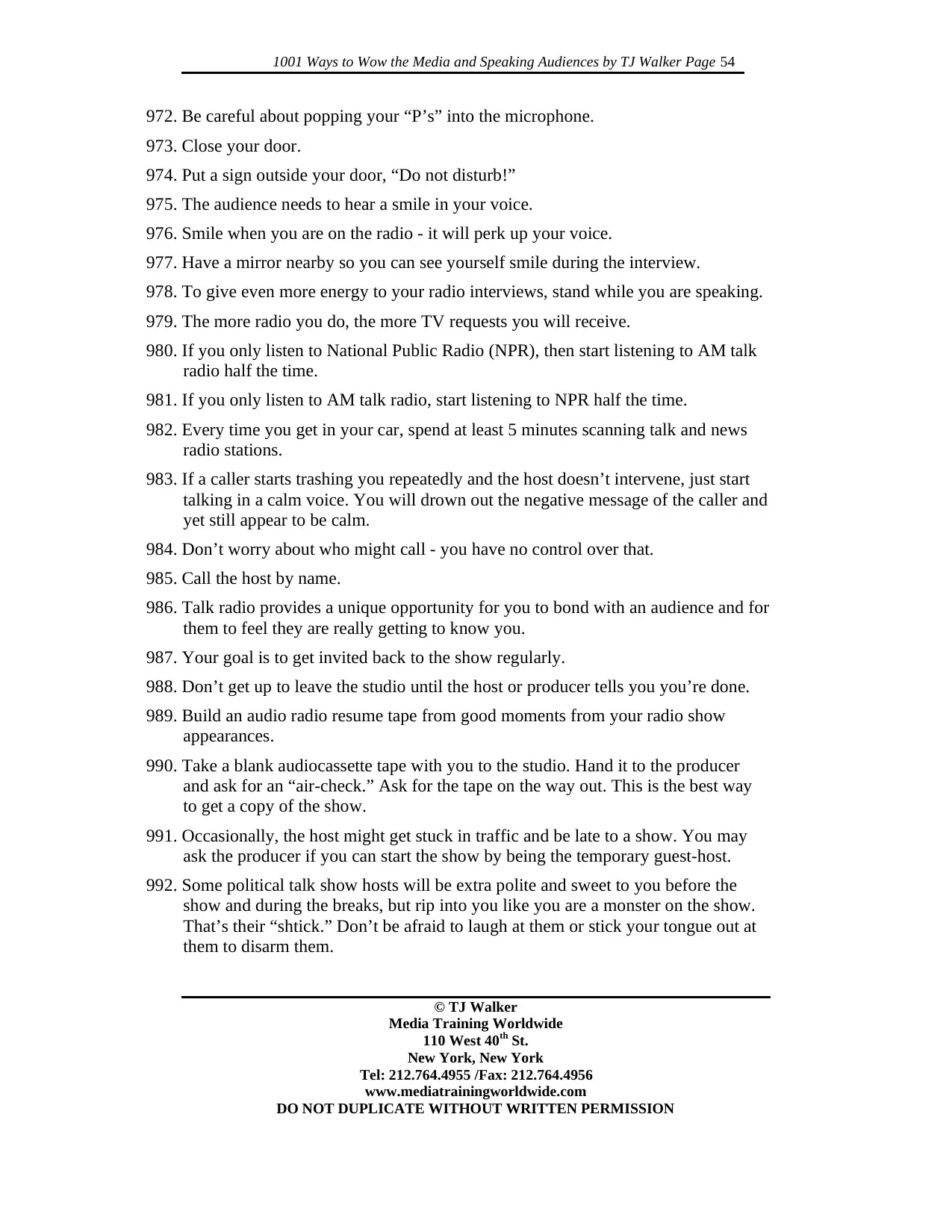
1001 Ways to Wow the Media and Speaking Audiences by TJ Walker Page 54
© TJ Walker
Media Training Worldwide
110 West 40th St.
New York, New York
Tel: 212.764.4955 /Fax: 212.764.4956
www.mediatrainingworldwide.com
DO NOT DUPLICATE WITHOUT WRITTEN PERMISSION
972. Be careful about popping your “P’s” into the microphone.
973. Close your door.
974. Put a sign outside your door, “Do not disturb!”
975. The audience needs to hear a smile in your voice.
976. Smile when you are on the radio - it will perk up your voice.
977. Have a mirror nearby so you can see yourself smile during the interview.
978. To give even more energy to your radio interviews, stand while you are speaking.
979. The more radio you do, the more TV requests you will receive.
980. If you only listen to National Public Radio (NPR), then start listening to AM talk
radio half the time.
981. If you only listen to AM talk radio, start listening to NPR half the time.
982. Every time you get in your car, spend at least 5 minutes scanning talk and news
radio stations.
983. If a caller starts trashing you repeatedly and the host doesn’t intervene, just start
talking in a calm voice. You will drown out the negative message of the caller and
yet still appear to be calm.
984. Don’t worry about who might call - you have no control over that.
985. Call the host by name.
986. Talk radio provides a unique opportunity for you to bond with an audience and for
them to feel they are really getting to know you.
987. Your goal is to get invited back to the show regularly.
988. Don’t get up to leave the studio until the host or producer tells you you’re done.
989. Build an audio radio resume tape from good moments from your radio show
appearances.
990. Take a blank audiocassette tape with you to the studio. Hand it to the producer
and ask for an “air-check.” Ask for the tape on the way out. This is the best way
to get a copy of the show.
991. Occasionally, the host might get stuck in traffic and be late to a show. You may
ask the producer if you can start the show by being the temporary guest-host.
992. Some political talk show hosts will be extra polite and sweet to you before the
show and during the breaks, but rip into you like you are a monster on the show.
That’s their “shtick.” Don’t be afraid to laugh at them or stick your tongue out at
them to disarm them.
© TJ Walker
Media Training Worldwide
110 West 40th St.
New York, New York
Tel: 212.764.4955 /Fax: 212.764.4956
www.mediatrainingworldwide.com
DO NOT DUPLICATE WITHOUT WRITTEN PERMISSION
972. Be careful about popping your “P’s” into the microphone.
973. Close your door.
974. Put a sign outside your door, “Do not disturb!”
975. The audience needs to hear a smile in your voice.
976. Smile when you are on the radio - it will perk up your voice.
977. Have a mirror nearby so you can see yourself smile during the interview.
978. To give even more energy to your radio interviews, stand while you are speaking.
979. The more radio you do, the more TV requests you will receive.
980. If you only listen to National Public Radio (NPR), then start listening to AM talk
radio half the time.
981. If you only listen to AM talk radio, start listening to NPR half the time.
982. Every time you get in your car, spend at least 5 minutes scanning talk and news
radio stations.
983. If a caller starts trashing you repeatedly and the host doesn’t intervene, just start
talking in a calm voice. You will drown out the negative message of the caller and
yet still appear to be calm.
984. Don’t worry about who might call - you have no control over that.
985. Call the host by name.
986. Talk radio provides a unique opportunity for you to bond with an audience and for
them to feel they are really getting to know you.
987. Your goal is to get invited back to the show regularly.
988. Don’t get up to leave the studio until the host or producer tells you you’re done.
989. Build an audio radio resume tape from good moments from your radio show
appearances.
990. Take a blank audiocassette tape with you to the studio. Hand it to the producer
and ask for an “air-check.” Ask for the tape on the way out. This is the best way
to get a copy of the show.
991. Occasionally, the host might get stuck in traffic and be late to a show. You may
ask the producer if you can start the show by being the temporary guest-host.
992. Some political talk show hosts will be extra polite and sweet to you before the
show and during the breaks, but rip into you like you are a monster on the show.
That’s their “shtick.” Don’t be afraid to laugh at them or stick your tongue out at
them to disarm them.
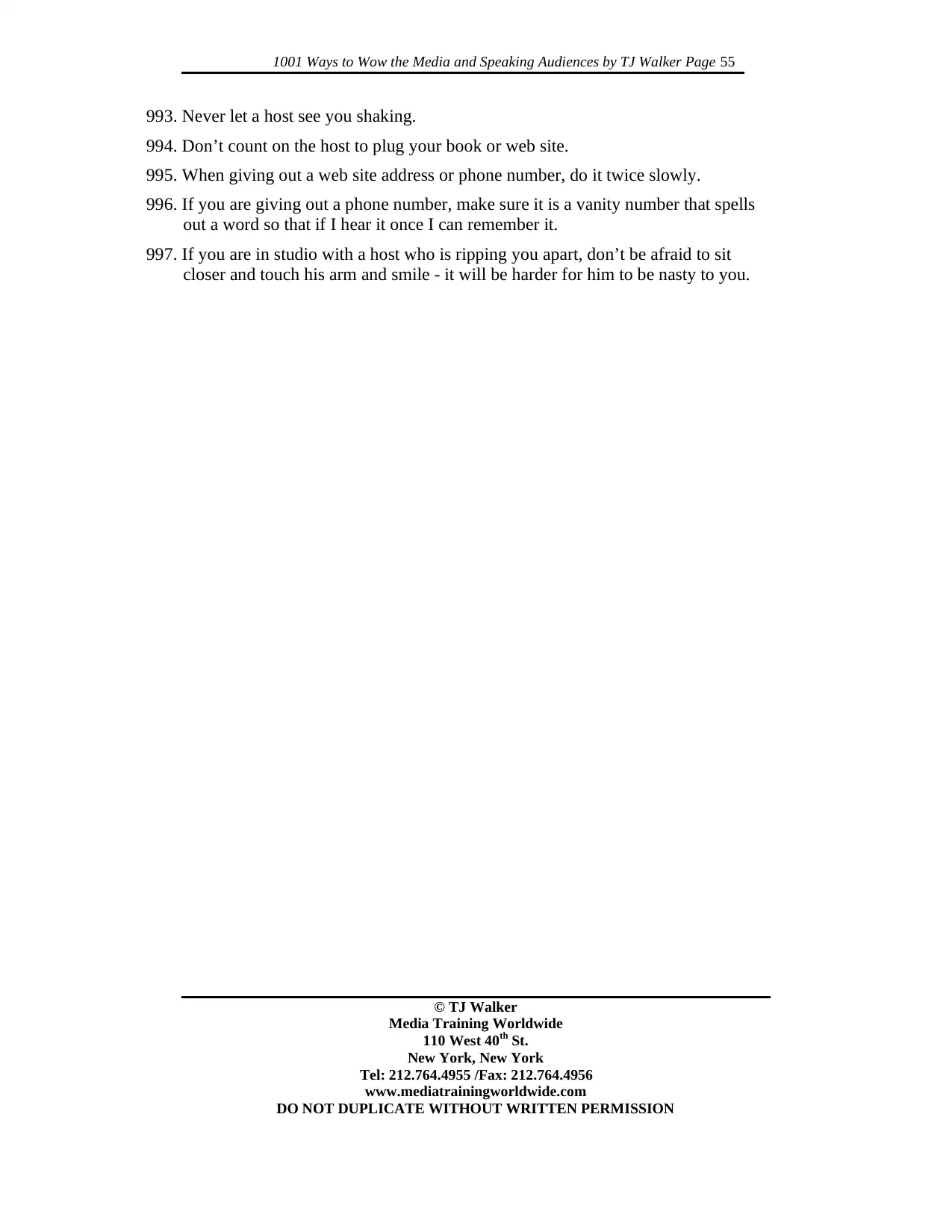
1001 Ways to Wow the Media and Speaking Audiences by TJ Walker Page 55
© TJ Walker
Media Training Worldwide
110 West 40th St.
New York, New York
Tel: 212.764.4955 /Fax: 212.764.4956
www.mediatrainingworldwide.com
DO NOT DUPLICATE WITHOUT WRITTEN PERMISSION
993. Never let a host see you shaking.
994. Don’t count on the host to plug your book or web site.
995. When giving out a web site address or phone number, do it twice slowly.
996. If you are giving out a phone number, make sure it is a vanity number that spells
out a word so that if I hear it once I can remember it.
997. If you are in studio with a host who is ripping you apart, don’t be afraid to sit
closer and touch his arm and smile - it will be harder for him to be nasty to you.
© TJ Walker
Media Training Worldwide
110 West 40th St.
New York, New York
Tel: 212.764.4955 /Fax: 212.764.4956
www.mediatrainingworldwide.com
DO NOT DUPLICATE WITHOUT WRITTEN PERMISSION
993. Never let a host see you shaking.
994. Don’t count on the host to plug your book or web site.
995. When giving out a web site address or phone number, do it twice slowly.
996. If you are giving out a phone number, make sure it is a vanity number that spells
out a word so that if I hear it once I can remember it.
997. If you are in studio with a host who is ripping you apart, don’t be afraid to sit
closer and touch his arm and smile - it will be harder for him to be nasty to you.
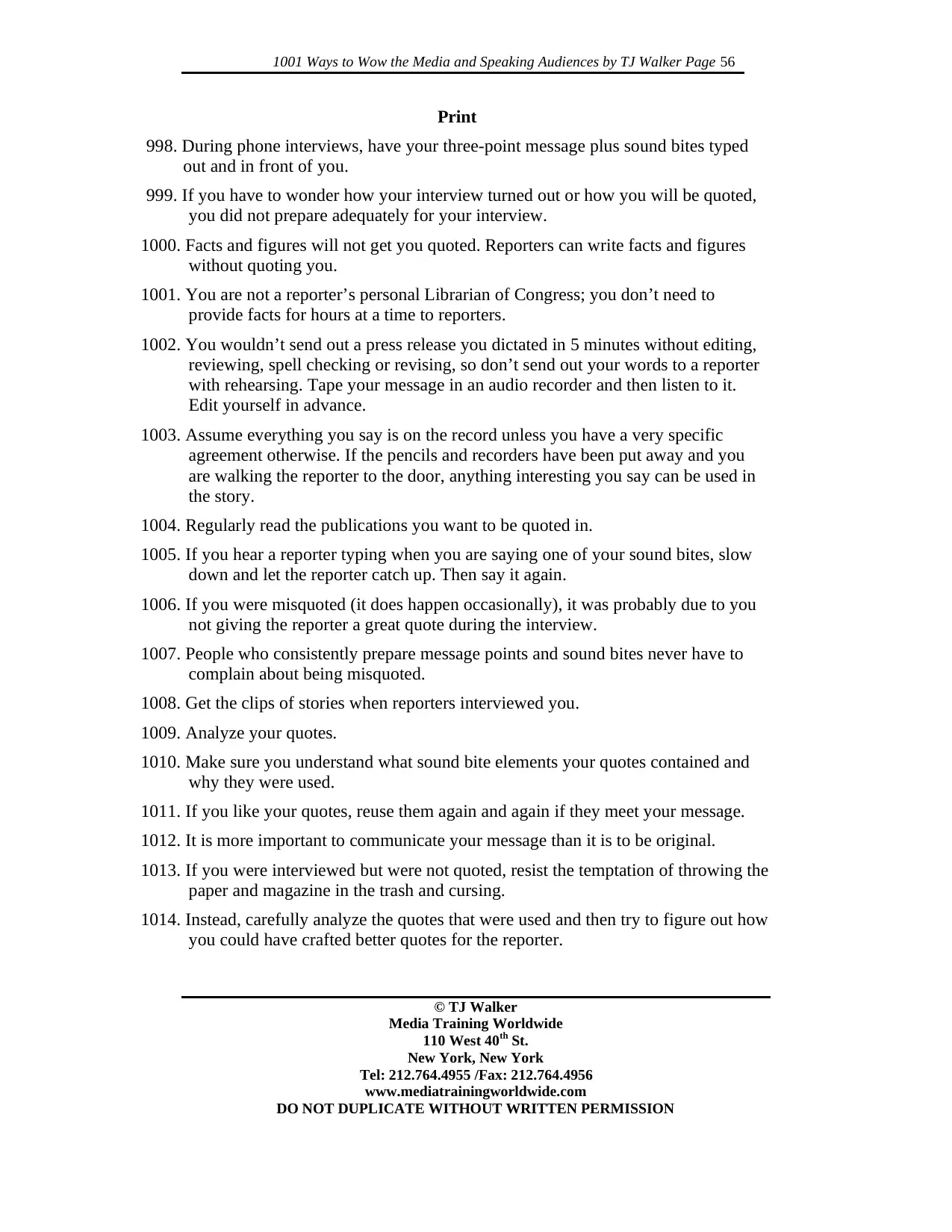
1001 Ways to Wow the Media and Speaking Audiences by TJ Walker Page 56
© TJ Walker
Media Training Worldwide
110 West 40th St.
New York, New York
Tel: 212.764.4955 /Fax: 212.764.4956
www.mediatrainingworldwide.com
DO NOT DUPLICATE WITHOUT WRITTEN PERMISSION
Print
998. During phone interviews, have your three-point message plus sound bites typed
out and in front of you.
999. If you have to wonder how your interview turned out or how you will be quoted,
you did not prepare adequately for your interview.
1000. Facts and figures will not get you quoted. Reporters can write facts and figures
without quoting you.
1001. You are not a reporter’s personal Librarian of Congress; you don’t need to
provide facts for hours at a time to reporters.
1002. You wouldn’t send out a press release you dictated in 5 minutes without editing,
reviewing, spell checking or revising, so don’t send out your words to a reporter
with rehearsing. Tape your message in an audio recorder and then listen to it.
Edit yourself in advance.
1003. Assume everything you say is on the record unless you have a very specific
agreement otherwise. If the pencils and recorders have been put away and you
are walking the reporter to the door, anything interesting you say can be used in
the story.
1004. Regularly read the publications you want to be quoted in.
1005. If you hear a reporter typing when you are saying one of your sound bites, slow
down and let the reporter catch up. Then say it again.
1006. If you were misquoted (it does happen occasionally), it was probably due to you
not giving the reporter a great quote during the interview.
1007. People who consistently prepare message points and sound bites never have to
complain about being misquoted.
1008. Get the clips of stories when reporters interviewed you.
1009. Analyze your quotes.
1010. Make sure you understand what sound bite elements your quotes contained and
why they were used.
1011. If you like your quotes, reuse them again and again if they meet your message.
1012. It is more important to communicate your message than it is to be original.
1013. If you were interviewed but were not quoted, resist the temptation of throwing the
paper and magazine in the trash and cursing.
1014. Instead, carefully analyze the quotes that were used and then try to figure out how
you could have crafted better quotes for the reporter.
© TJ Walker
Media Training Worldwide
110 West 40th St.
New York, New York
Tel: 212.764.4955 /Fax: 212.764.4956
www.mediatrainingworldwide.com
DO NOT DUPLICATE WITHOUT WRITTEN PERMISSION
998. During phone interviews, have your three-point message plus sound bites typed
out and in front of you.
999. If you have to wonder how your interview turned out or how you will be quoted,
you did not prepare adequately for your interview.
1000. Facts and figures will not get you quoted. Reporters can write facts and figures
without quoting you.
1001. You are not a reporter’s personal Librarian of Congress; you don’t need to
provide facts for hours at a time to reporters.
1002. You wouldn’t send out a press release you dictated in 5 minutes without editing,
reviewing, spell checking or revising, so don’t send out your words to a reporter
with rehearsing. Tape your message in an audio recorder and then listen to it.
Edit yourself in advance.
1003. Assume everything you say is on the record unless you have a very specific
agreement otherwise. If the pencils and recorders have been put away and you
are walking the reporter to the door, anything interesting you say can be used in
the story.
1004. Regularly read the publications you want to be quoted in.
1005. If you hear a reporter typing when you are saying one of your sound bites, slow
down and let the reporter catch up. Then say it again.
1006. If you were misquoted (it does happen occasionally), it was probably due to you
not giving the reporter a great quote during the interview.
1007. People who consistently prepare message points and sound bites never have to
complain about being misquoted.
1008. Get the clips of stories when reporters interviewed you.
1009. Analyze your quotes.
1010. Make sure you understand what sound bite elements your quotes contained and
why they were used.
1011. If you like your quotes, reuse them again and again if they meet your message.
1012. It is more important to communicate your message than it is to be original.
1013. If you were interviewed but were not quoted, resist the temptation of throwing the
paper and magazine in the trash and cursing.
1014. Instead, carefully analyze the quotes that were used and then try to figure out how
you could have crafted better quotes for the reporter.
Secure Best Marks with AI Grader
Need help grading? Try our AI Grader for instant feedback on your assignments.
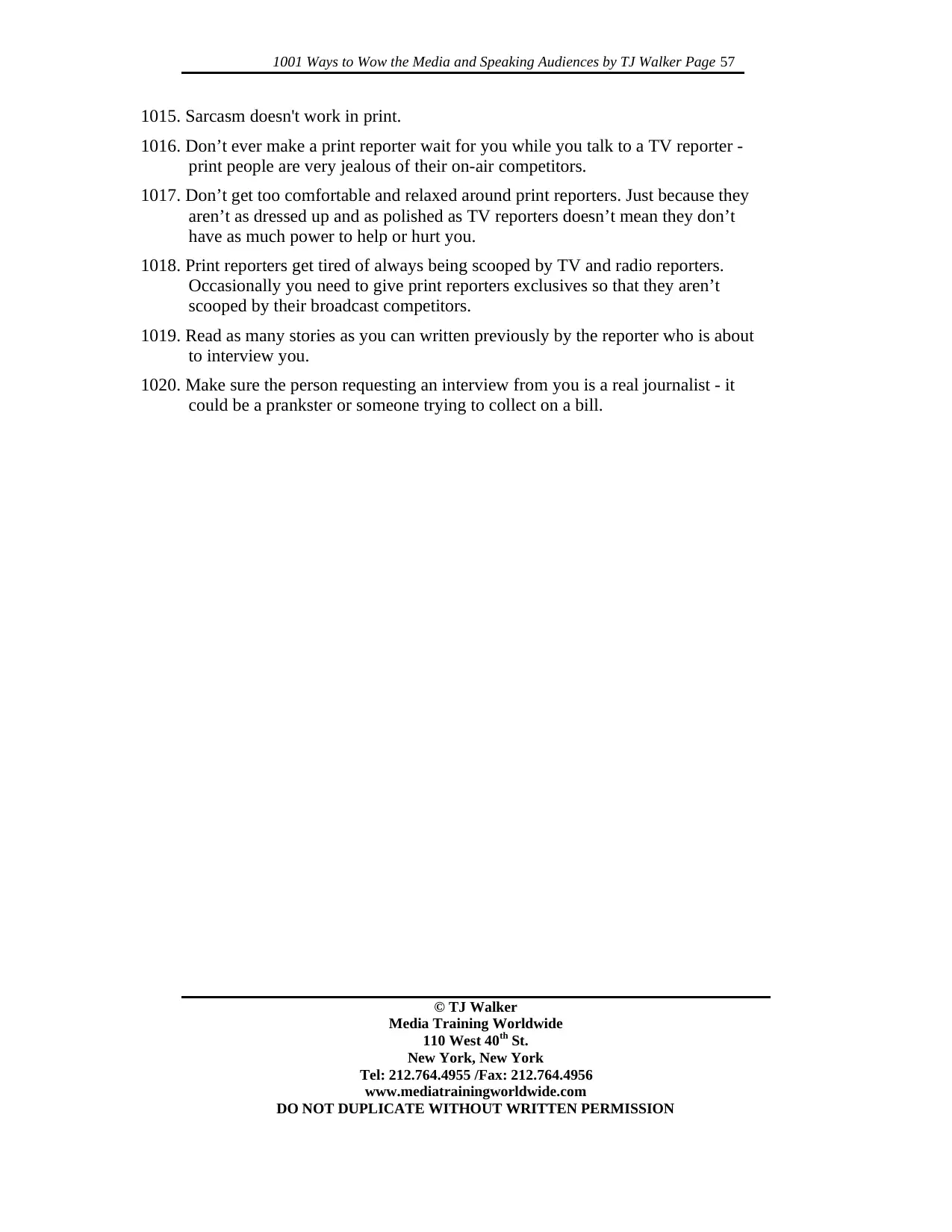
1001 Ways to Wow the Media and Speaking Audiences by TJ Walker Page 57
© TJ Walker
Media Training Worldwide
110 West 40th St.
New York, New York
Tel: 212.764.4955 /Fax: 212.764.4956
www.mediatrainingworldwide.com
DO NOT DUPLICATE WITHOUT WRITTEN PERMISSION
1015. Sarcasm doesn't work in print.
1016. Don’t ever make a print reporter wait for you while you talk to a TV reporter -
print people are very jealous of their on-air competitors.
1017. Don’t get too comfortable and relaxed around print reporters. Just because they
aren’t as dressed up and as polished as TV reporters doesn’t mean they don’t
have as much power to help or hurt you.
1018. Print reporters get tired of always being scooped by TV and radio reporters.
Occasionally you need to give print reporters exclusives so that they aren’t
scooped by their broadcast competitors.
1019. Read as many stories as you can written previously by the reporter who is about
to interview you.
1020. Make sure the person requesting an interview from you is a real journalist - it
could be a prankster or someone trying to collect on a bill.
© TJ Walker
Media Training Worldwide
110 West 40th St.
New York, New York
Tel: 212.764.4955 /Fax: 212.764.4956
www.mediatrainingworldwide.com
DO NOT DUPLICATE WITHOUT WRITTEN PERMISSION
1015. Sarcasm doesn't work in print.
1016. Don’t ever make a print reporter wait for you while you talk to a TV reporter -
print people are very jealous of their on-air competitors.
1017. Don’t get too comfortable and relaxed around print reporters. Just because they
aren’t as dressed up and as polished as TV reporters doesn’t mean they don’t
have as much power to help or hurt you.
1018. Print reporters get tired of always being scooped by TV and radio reporters.
Occasionally you need to give print reporters exclusives so that they aren’t
scooped by their broadcast competitors.
1019. Read as many stories as you can written previously by the reporter who is about
to interview you.
1020. Make sure the person requesting an interview from you is a real journalist - it
could be a prankster or someone trying to collect on a bill.
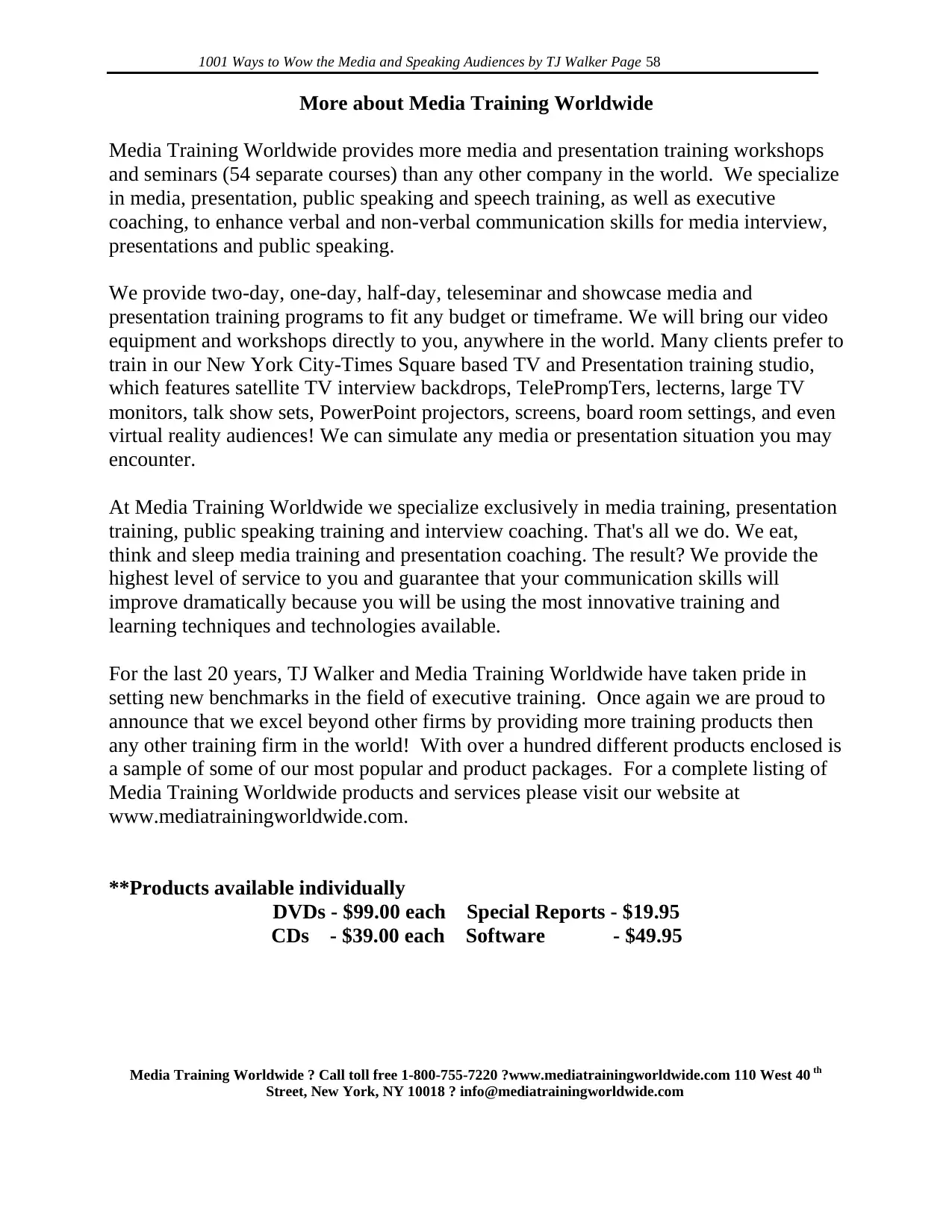
1001 Ways to Wow the Media and Speaking Audiences by TJ Walker Page 58
Media Training Worldwide ? Call toll free 1-800-755-7220 ?www.mediatrainingworldwide.com 110 West 40 th
Street, New York, NY 10018 ? info@mediatrainingworldwide.com
More about Media Training Worldwide
Media Training Worldwide provides more media and presentation training workshops
and seminars (54 separate courses) than any other company in the world. We specialize
in media, presentation, public speaking and speech training, as well as executive
coaching, to enhance verbal and non-verbal communication skills for media interview,
presentations and public speaking.
We provide two-day, one-day, half-day, teleseminar and showcase media and
presentation training programs to fit any budget or timeframe. We will bring our video
equipment and workshops directly to you, anywhere in the world. Many clients prefer to
train in our New York City-Times Square based TV and Presentation training studio,
which features satellite TV interview backdrops, TelePrompTers, lecterns, large TV
monitors, talk show sets, PowerPoint projectors, screens, board room settings, and even
virtual reality audiences! We can simulate any media or presentation situation you may
encounter.
At Media Training Worldwide we specialize exclusively in media training, presentation
training, public speaking training and interview coaching. That's all we do. We eat,
think and sleep media training and presentation coaching. The result? We provide the
highest level of service to you and guarantee that your communication skills will
improve dramatically because you will be using the most innovative training and
learning techniques and technologies available.
For the last 20 years, TJ Walker and Media Training Worldwide have taken pride in
setting new benchmarks in the field of executive training. Once again we are proud to
announce that we excel beyond other firms by providing more training products then
any other training firm in the world! With over a hundred different products enclosed is
a sample of some of our most popular and product packages. For a complete listing of
Media Training Worldwide products and services please visit our website at
www.mediatrainingworldwide.com.
**Products available individually
DVDs - $99.00 each Special Reports - $19.95
CDs - $39.00 each Software - $49.95
Media Training Worldwide ? Call toll free 1-800-755-7220 ?www.mediatrainingworldwide.com 110 West 40 th
Street, New York, NY 10018 ? info@mediatrainingworldwide.com
More about Media Training Worldwide
Media Training Worldwide provides more media and presentation training workshops
and seminars (54 separate courses) than any other company in the world. We specialize
in media, presentation, public speaking and speech training, as well as executive
coaching, to enhance verbal and non-verbal communication skills for media interview,
presentations and public speaking.
We provide two-day, one-day, half-day, teleseminar and showcase media and
presentation training programs to fit any budget or timeframe. We will bring our video
equipment and workshops directly to you, anywhere in the world. Many clients prefer to
train in our New York City-Times Square based TV and Presentation training studio,
which features satellite TV interview backdrops, TelePrompTers, lecterns, large TV
monitors, talk show sets, PowerPoint projectors, screens, board room settings, and even
virtual reality audiences! We can simulate any media or presentation situation you may
encounter.
At Media Training Worldwide we specialize exclusively in media training, presentation
training, public speaking training and interview coaching. That's all we do. We eat,
think and sleep media training and presentation coaching. The result? We provide the
highest level of service to you and guarantee that your communication skills will
improve dramatically because you will be using the most innovative training and
learning techniques and technologies available.
For the last 20 years, TJ Walker and Media Training Worldwide have taken pride in
setting new benchmarks in the field of executive training. Once again we are proud to
announce that we excel beyond other firms by providing more training products then
any other training firm in the world! With over a hundred different products enclosed is
a sample of some of our most popular and product packages. For a complete listing of
Media Training Worldwide products and services please visit our website at
www.mediatrainingworldwide.com.
**Products available individually
DVDs - $99.00 each Special Reports - $19.95
CDs - $39.00 each Software - $49.95
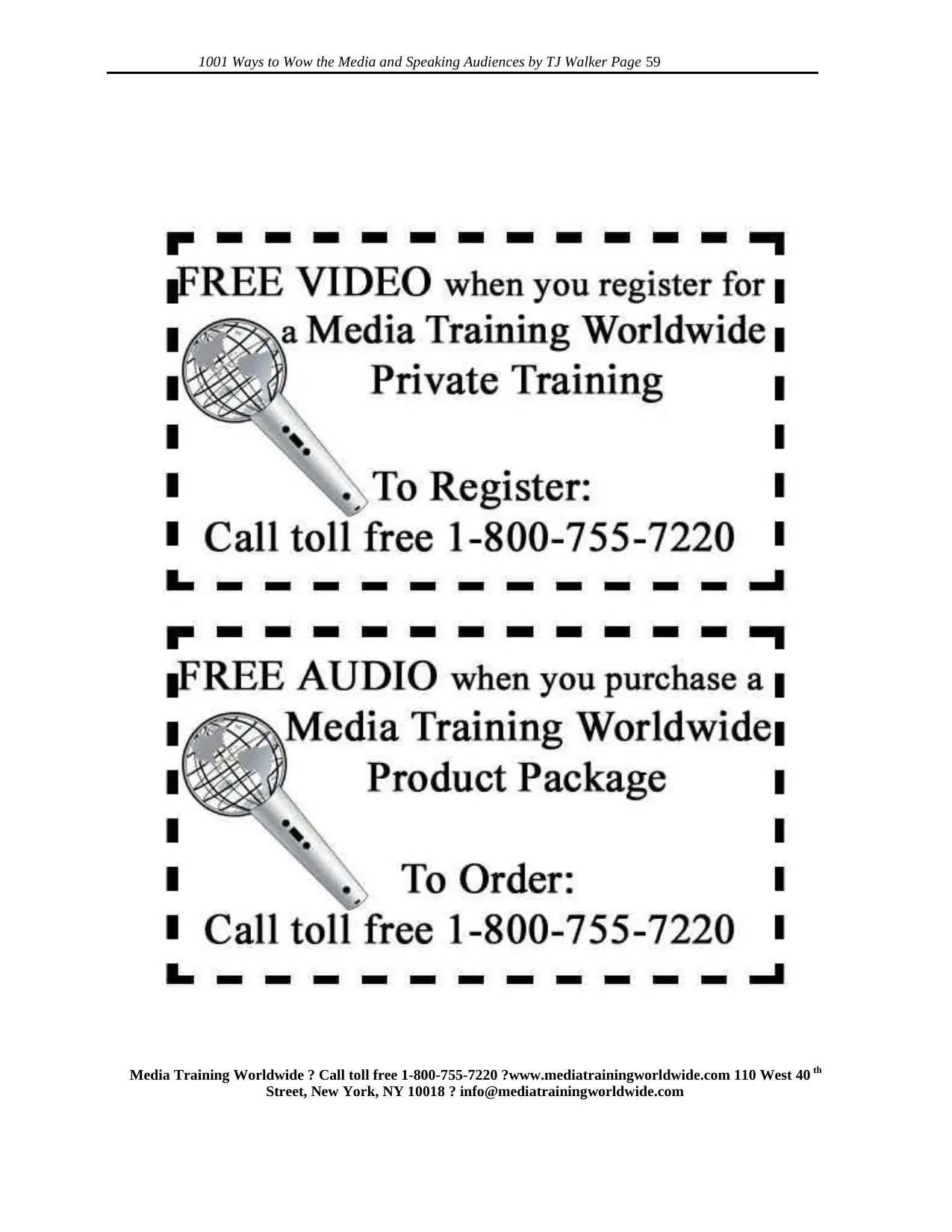
1001 Ways to Wow the Media and Speaking Audiences by TJ Walker Page 59
Media Training Worldwide ? Call toll free 1-800-755-7220 ?www.mediatrainingworldwide.com 110 West 40 th
Street, New York, NY 10018 ? info@mediatrainingworldwide.com
Media Training Worldwide ? Call toll free 1-800-755-7220 ?www.mediatrainingworldwide.com 110 West 40 th
Street, New York, NY 10018 ? info@mediatrainingworldwide.com
Paraphrase This Document
Need a fresh take? Get an instant paraphrase of this document with our AI Paraphraser
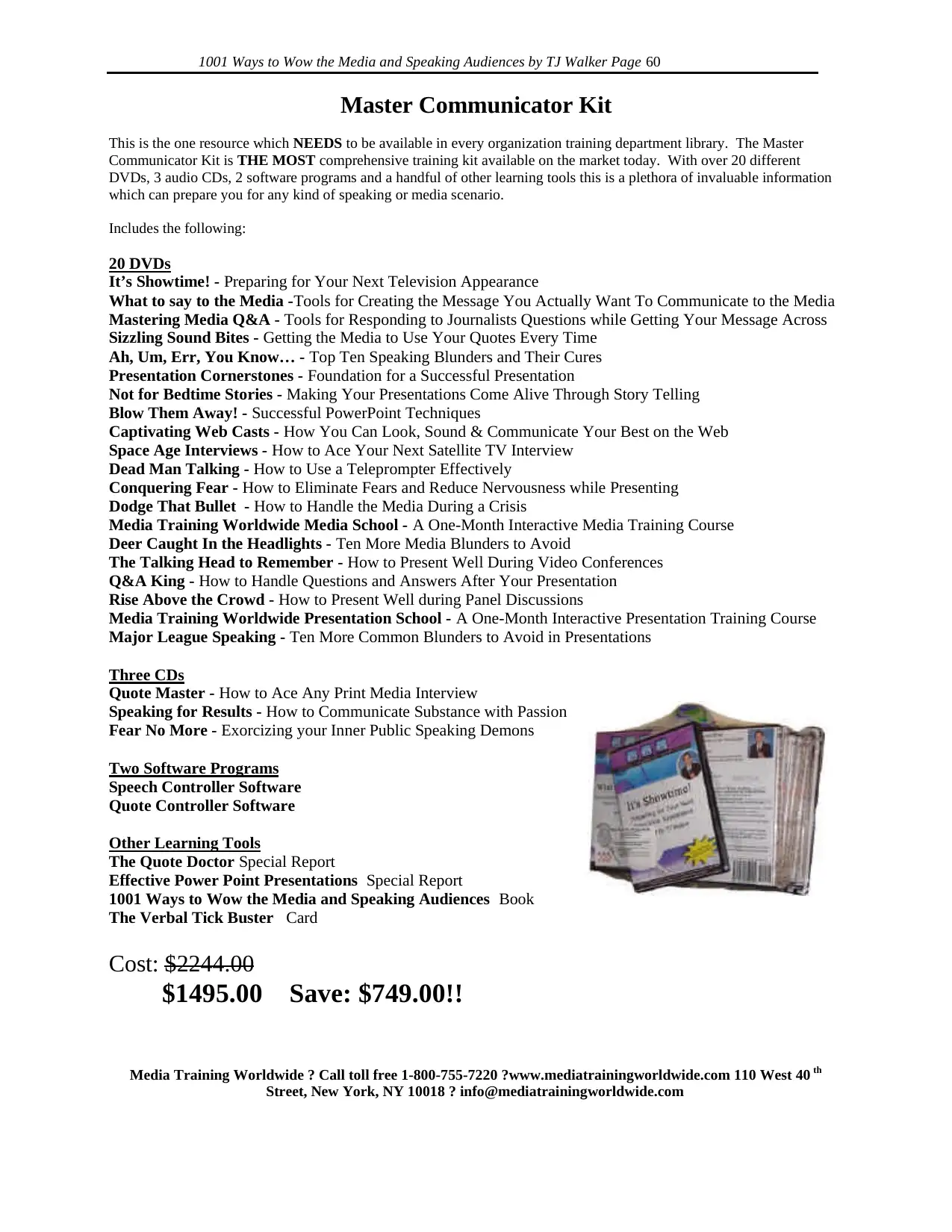
1001 Ways to Wow the Media and Speaking Audiences by TJ Walker Page 60
Media Training Worldwide ? Call toll free 1-800-755-7220 ?www.mediatrainingworldwide.com 110 West 40 th
Street, New York, NY 10018 ? info@mediatrainingworldwide.com
Master Communicator Kit
This is the one resource which NEEDS to be available in every organization training department library. The Master
Communicator Kit is THE MOST comprehensive training kit available on the market today. With over 20 different
DVDs, 3 audio CDs, 2 software programs and a handful of other learning tools this is a plethora of invaluable information
which can prepare you for any kind of speaking or media scenario.
Includes the following:
20 DVDs
It’s Showtime! - Preparing for Your Next Television Appearance
What to say to the Media -Tools for Creating the Message You Actually Want To Communicate to the Media
Mastering Media Q&A - Tools for Responding to Journalists Questions while Getting Your Message Across
Sizzling Sound Bites - Getting the Media to Use Your Quotes Every Time
Ah, Um, Err, You Know… - Top Ten Speaking Blunders and Their Cures
Presentation Cornerstones - Foundation for a Successful Presentation
Not for Bedtime Stories - Making Your Presentations Come Alive Through Story Telling
Blow Them Away! - Successful PowerPoint Techniques
Captivating Web Casts - How You Can Look, Sound & Communicate Your Best on the Web
Space Age Interviews - How to Ace Your Next Satellite TV Interview
Dead Man Talking - How to Use a Teleprompter Effectively
Conquering Fear - How to Eliminate Fears and Reduce Nervousness while Presenting
Dodge That Bullet - How to Handle the Media During a Crisis
Media Training Worldwide Media School - A One-Month Interactive Media Training Course
Deer Caught In the Headlights - Ten More Media Blunders to Avoid
The Talking Head to Remember - How to Present Well During Video Conferences
Q&A King - How to Handle Questions and Answers After Your Presentation
Rise Above the Crowd - How to Present Well during Panel Discussions
Media Training Worldwide Presentation School - A One-Month Interactive Presentation Training Course
Major League Speaking - Ten More Common Blunders to Avoid in Presentations
Three CDs
Quote Master - How to Ace Any Print Media Interview
Speaking for Results - How to Communicate Substance with Passion
Fear No More - Exorcizing your Inner Public Speaking Demons
Two Software Programs
Speech Controller Software
Quote Controller Software
Other Learning Tools
The Quote Doctor Special Report
Effective Power Point Presentations Special Report
1001 Ways to Wow the Media and Speaking Audiences Book
The Verbal Tick Buster Card
Cost: $2244.00
$1495.00 Save: $749.00!!
Media Training Worldwide ? Call toll free 1-800-755-7220 ?www.mediatrainingworldwide.com 110 West 40 th
Street, New York, NY 10018 ? info@mediatrainingworldwide.com
Master Communicator Kit
This is the one resource which NEEDS to be available in every organization training department library. The Master
Communicator Kit is THE MOST comprehensive training kit available on the market today. With over 20 different
DVDs, 3 audio CDs, 2 software programs and a handful of other learning tools this is a plethora of invaluable information
which can prepare you for any kind of speaking or media scenario.
Includes the following:
20 DVDs
It’s Showtime! - Preparing for Your Next Television Appearance
What to say to the Media -Tools for Creating the Message You Actually Want To Communicate to the Media
Mastering Media Q&A - Tools for Responding to Journalists Questions while Getting Your Message Across
Sizzling Sound Bites - Getting the Media to Use Your Quotes Every Time
Ah, Um, Err, You Know… - Top Ten Speaking Blunders and Their Cures
Presentation Cornerstones - Foundation for a Successful Presentation
Not for Bedtime Stories - Making Your Presentations Come Alive Through Story Telling
Blow Them Away! - Successful PowerPoint Techniques
Captivating Web Casts - How You Can Look, Sound & Communicate Your Best on the Web
Space Age Interviews - How to Ace Your Next Satellite TV Interview
Dead Man Talking - How to Use a Teleprompter Effectively
Conquering Fear - How to Eliminate Fears and Reduce Nervousness while Presenting
Dodge That Bullet - How to Handle the Media During a Crisis
Media Training Worldwide Media School - A One-Month Interactive Media Training Course
Deer Caught In the Headlights - Ten More Media Blunders to Avoid
The Talking Head to Remember - How to Present Well During Video Conferences
Q&A King - How to Handle Questions and Answers After Your Presentation
Rise Above the Crowd - How to Present Well during Panel Discussions
Media Training Worldwide Presentation School - A One-Month Interactive Presentation Training Course
Major League Speaking - Ten More Common Blunders to Avoid in Presentations
Three CDs
Quote Master - How to Ace Any Print Media Interview
Speaking for Results - How to Communicate Substance with Passion
Fear No More - Exorcizing your Inner Public Speaking Demons
Two Software Programs
Speech Controller Software
Quote Controller Software
Other Learning Tools
The Quote Doctor Special Report
Effective Power Point Presentations Special Report
1001 Ways to Wow the Media and Speaking Audiences Book
The Verbal Tick Buster Card
Cost: $2244.00
$1495.00 Save: $749.00!!
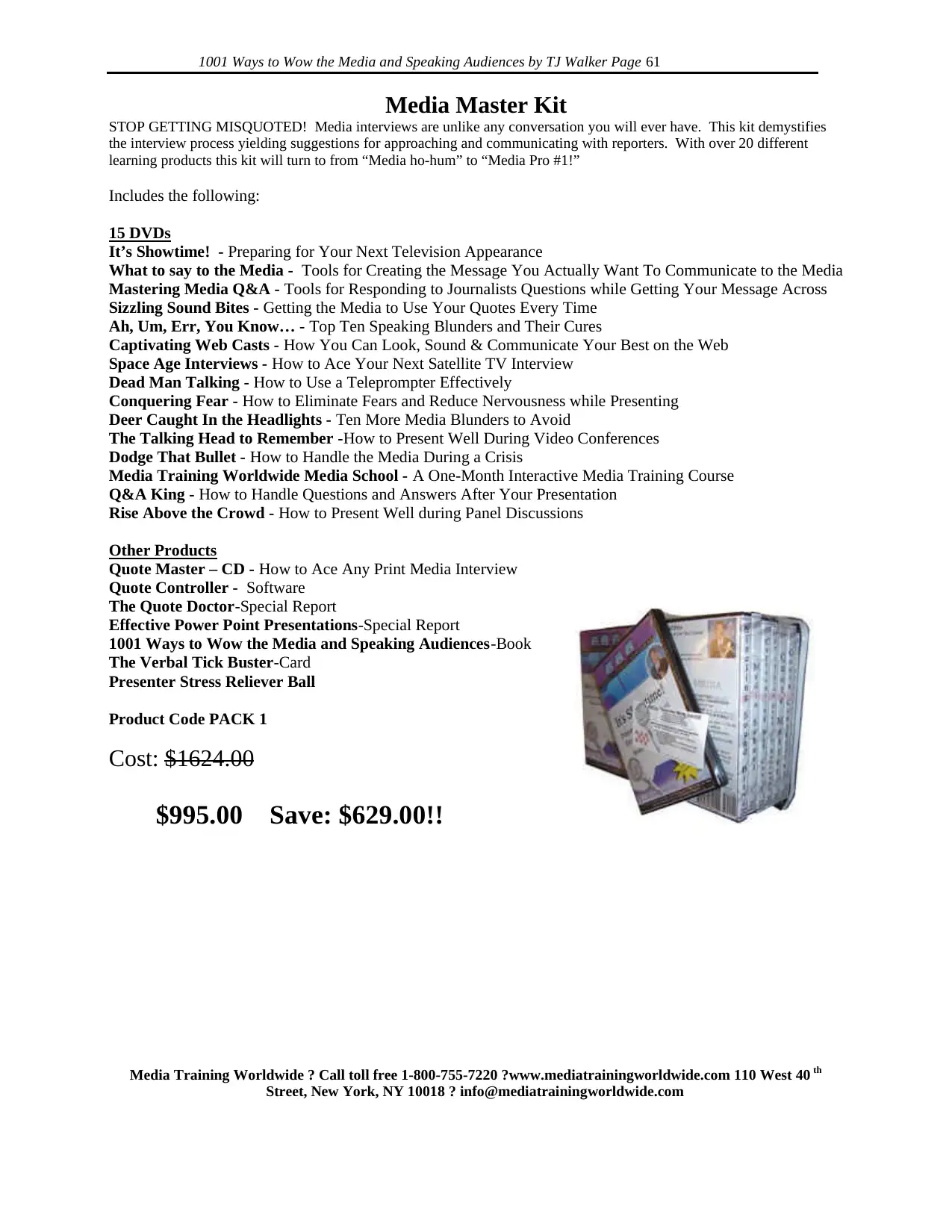
1001 Ways to Wow the Media and Speaking Audiences by TJ Walker Page 61
Media Training Worldwide ? Call toll free 1-800-755-7220 ?www.mediatrainingworldwide.com 110 West 40 th
Street, New York, NY 10018 ? info@mediatrainingworldwide.com
Media Master Kit
STOP GETTING MISQUOTED! Media interviews are unlike any conversation you will ever have. This kit demystifies
the interview process yielding suggestions for approaching and communicating with reporters. With over 20 different
learning products this kit will turn to from “Media ho-hum” to “Media Pro #1!”
Includes the following:
15 DVDs
It’s Showtime! - Preparing for Your Next Television Appearance
What to say to the Media - Tools for Creating the Message You Actually Want To Communicate to the Media
Mastering Media Q&A - Tools for Responding to Journalists Questions while Getting Your Message Across
Sizzling Sound Bites - Getting the Media to Use Your Quotes Every Time
Ah, Um, Err, You Know… - Top Ten Speaking Blunders and Their Cures
Captivating Web Casts - How You Can Look, Sound & Communicate Your Best on the Web
Space Age Interviews - How to Ace Your Next Satellite TV Interview
Dead Man Talking - How to Use a Teleprompter Effectively
Conquering Fear - How to Eliminate Fears and Reduce Nervousness while Presenting
Deer Caught In the Headlights - Ten More Media Blunders to Avoid
The Talking Head to Remember -How to Present Well During Video Conferences
Dodge That Bullet - How to Handle the Media During a Crisis
Media Training Worldwide Media School - A One-Month Interactive Media Training Course
Q&A King - How to Handle Questions and Answers After Your Presentation
Rise Above the Crowd - How to Present Well during Panel Discussions
Other Products
Quote Master – CD - How to Ace Any Print Media Interview
Quote Controller - Software
The Quote Doctor-Special Report
Effective Power Point Presentations-Special Report
1001 Ways to Wow the Media and Speaking Audiences-Book
The Verbal Tick Buster-Card
Presenter Stress Reliever Ball
Product Code PACK 1
Cost: $1624.00
$995.00 Save: $629.00!!
Media Training Worldwide ? Call toll free 1-800-755-7220 ?www.mediatrainingworldwide.com 110 West 40 th
Street, New York, NY 10018 ? info@mediatrainingworldwide.com
Media Master Kit
STOP GETTING MISQUOTED! Media interviews are unlike any conversation you will ever have. This kit demystifies
the interview process yielding suggestions for approaching and communicating with reporters. With over 20 different
learning products this kit will turn to from “Media ho-hum” to “Media Pro #1!”
Includes the following:
15 DVDs
It’s Showtime! - Preparing for Your Next Television Appearance
What to say to the Media - Tools for Creating the Message You Actually Want To Communicate to the Media
Mastering Media Q&A - Tools for Responding to Journalists Questions while Getting Your Message Across
Sizzling Sound Bites - Getting the Media to Use Your Quotes Every Time
Ah, Um, Err, You Know… - Top Ten Speaking Blunders and Their Cures
Captivating Web Casts - How You Can Look, Sound & Communicate Your Best on the Web
Space Age Interviews - How to Ace Your Next Satellite TV Interview
Dead Man Talking - How to Use a Teleprompter Effectively
Conquering Fear - How to Eliminate Fears and Reduce Nervousness while Presenting
Deer Caught In the Headlights - Ten More Media Blunders to Avoid
The Talking Head to Remember -How to Present Well During Video Conferences
Dodge That Bullet - How to Handle the Media During a Crisis
Media Training Worldwide Media School - A One-Month Interactive Media Training Course
Q&A King - How to Handle Questions and Answers After Your Presentation
Rise Above the Crowd - How to Present Well during Panel Discussions
Other Products
Quote Master – CD - How to Ace Any Print Media Interview
Quote Controller - Software
The Quote Doctor-Special Report
Effective Power Point Presentations-Special Report
1001 Ways to Wow the Media and Speaking Audiences-Book
The Verbal Tick Buster-Card
Presenter Stress Reliever Ball
Product Code PACK 1
Cost: $1624.00
$995.00 Save: $629.00!!
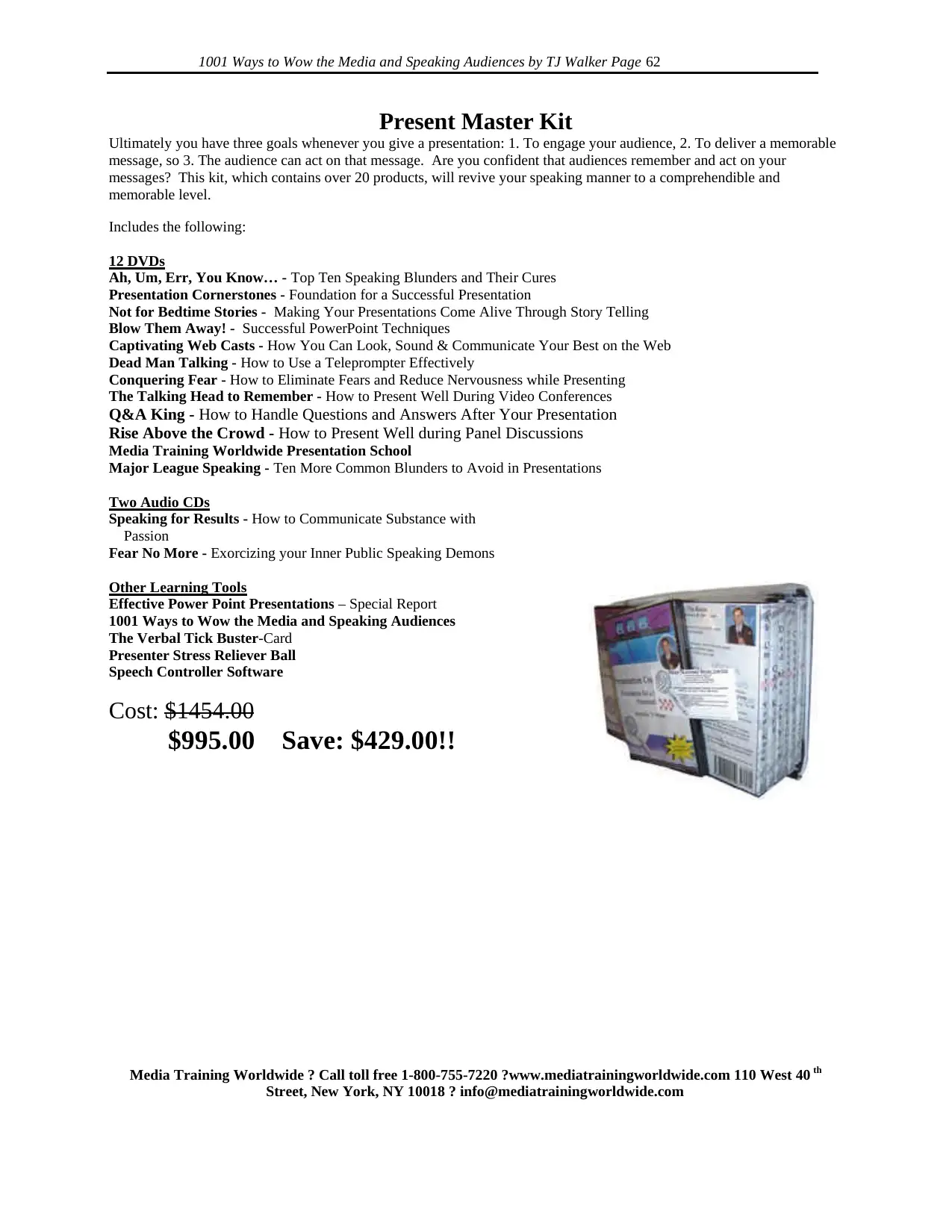
1001 Ways to Wow the Media and Speaking Audiences by TJ Walker Page 62
Media Training Worldwide ? Call toll free 1-800-755-7220 ?www.mediatrainingworldwide.com 110 West 40 th
Street, New York, NY 10018 ? info@mediatrainingworldwide.com
Present Master Kit
Ultimately you have three goals whenever you give a presentation: 1. To engage your audience, 2. To deliver a memorable
message, so 3. The audience can act on that message. Are you confident that audiences remember and act on your
messages? This kit, which contains over 20 products, will revive your speaking manner to a comprehendible and
memorable level.
Includes the following:
12 DVDs
Ah, Um, Err, You Know… - Top Ten Speaking Blunders and Their Cures
Presentation Cornerstones - Foundation for a Successful Presentation
Not for Bedtime Stories - Making Your Presentations Come Alive Through Story Telling
Blow Them Away! - Successful PowerPoint Techniques
Captivating Web Casts - How You Can Look, Sound & Communicate Your Best on the Web
Dead Man Talking - How to Use a Teleprompter Effectively
Conquering Fear - How to Eliminate Fears and Reduce Nervousness while Presenting
The Talking Head to Remember - How to Present Well During Video Conferences
Q&A King - How to Handle Questions and Answers After Your Presentation
Rise Above the Crowd - How to Present Well during Panel Discussions
Media Training Worldwide Presentation School
Major League Speaking - Ten More Common Blunders to Avoid in Presentations
Two Audio CDs
Speaking for Results - How to Communicate Substance with
Passion
Fear No More - Exorcizing your Inner Public Speaking Demons
Other Learning Tools
Effective Power Point Presentations – Special Report
1001 Ways to Wow the Media and Speaking Audiences
The Verbal Tick Buster-Card
Presenter Stress Reliever Ball
Speech Controller Software
Cost: $1454.00
$995.00 Save: $429.00!!
Media Training Worldwide ? Call toll free 1-800-755-7220 ?www.mediatrainingworldwide.com 110 West 40 th
Street, New York, NY 10018 ? info@mediatrainingworldwide.com
Present Master Kit
Ultimately you have three goals whenever you give a presentation: 1. To engage your audience, 2. To deliver a memorable
message, so 3. The audience can act on that message. Are you confident that audiences remember and act on your
messages? This kit, which contains over 20 products, will revive your speaking manner to a comprehendible and
memorable level.
Includes the following:
12 DVDs
Ah, Um, Err, You Know… - Top Ten Speaking Blunders and Their Cures
Presentation Cornerstones - Foundation for a Successful Presentation
Not for Bedtime Stories - Making Your Presentations Come Alive Through Story Telling
Blow Them Away! - Successful PowerPoint Techniques
Captivating Web Casts - How You Can Look, Sound & Communicate Your Best on the Web
Dead Man Talking - How to Use a Teleprompter Effectively
Conquering Fear - How to Eliminate Fears and Reduce Nervousness while Presenting
The Talking Head to Remember - How to Present Well During Video Conferences
Q&A King - How to Handle Questions and Answers After Your Presentation
Rise Above the Crowd - How to Present Well during Panel Discussions
Media Training Worldwide Presentation School
Major League Speaking - Ten More Common Blunders to Avoid in Presentations
Two Audio CDs
Speaking for Results - How to Communicate Substance with
Passion
Fear No More - Exorcizing your Inner Public Speaking Demons
Other Learning Tools
Effective Power Point Presentations – Special Report
1001 Ways to Wow the Media and Speaking Audiences
The Verbal Tick Buster-Card
Presenter Stress Reliever Ball
Speech Controller Software
Cost: $1454.00
$995.00 Save: $429.00!!
Secure Best Marks with AI Grader
Need help grading? Try our AI Grader for instant feedback on your assignments.
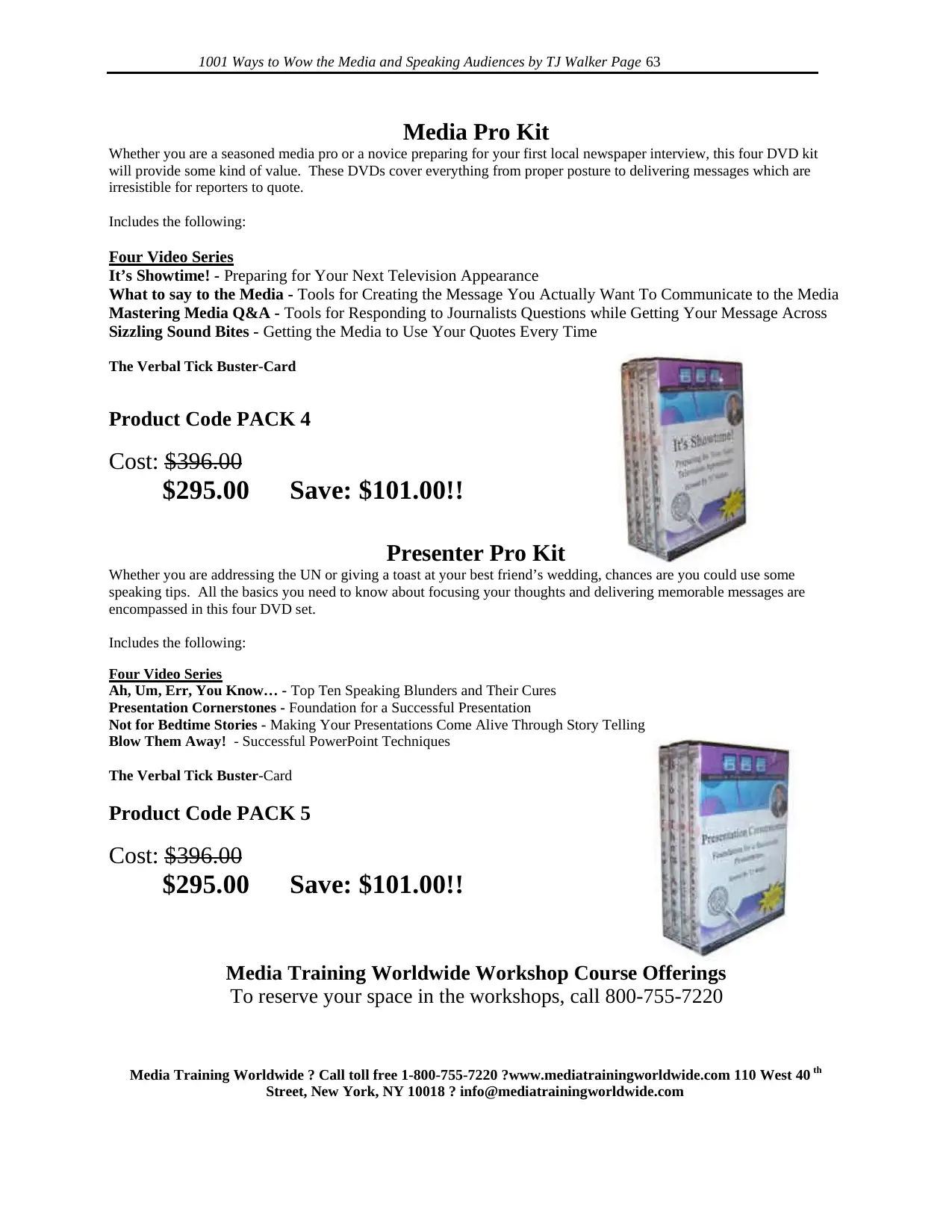
1001 Ways to Wow the Media and Speaking Audiences by TJ Walker Page 63
Media Training Worldwide ? Call toll free 1-800-755-7220 ?www.mediatrainingworldwide.com 110 West 40 th
Street, New York, NY 10018 ? info@mediatrainingworldwide.com
Media Pro Kit
Whether you are a seasoned media pro or a novice preparing for your first local newspaper interview, this four DVD kit
will provide some kind of value. These DVDs cover everything from proper posture to delivering messages which are
irresistible for reporters to quote.
Includes the following:
Four Video Series
It’s Showtime! - Preparing for Your Next Television Appearance
What to say to the Media - Tools for Creating the Message You Actually Want To Communicate to the Media
Mastering Media Q&A - Tools for Responding to Journalists Questions while Getting Your Message Across
Sizzling Sound Bites - Getting the Media to Use Your Quotes Every Time
The Verbal Tick Buster-Card
Product Code PACK 4
Cost: $396.00
$295.00 Save: $101.00!!
Presenter Pro Kit
Whether you are addressing the UN or giving a toast at your best friend’s wedding, chances are you could use some
speaking tips. All the basics you need to know about focusing your thoughts and delivering memorable messages are
encompassed in this four DVD set.
Includes the following:
Four Video Series
Ah, Um, Err, You Know… - Top Ten Speaking Blunders and Their Cures
Presentation Cornerstones - Foundation for a Successful Presentation
Not for Bedtime Stories - Making Your Presentations Come Alive Through Story Telling
Blow Them Away! - Successful PowerPoint Techniques
The Verbal Tick Buster-Card
Product Code PACK 5
Cost: $396.00
$295.00 Save: $101.00!!
Media Training Worldwide Workshop Course Offerings
To reserve your space in the workshops, call 800-755-7220
Media Training Worldwide ? Call toll free 1-800-755-7220 ?www.mediatrainingworldwide.com 110 West 40 th
Street, New York, NY 10018 ? info@mediatrainingworldwide.com
Media Pro Kit
Whether you are a seasoned media pro or a novice preparing for your first local newspaper interview, this four DVD kit
will provide some kind of value. These DVDs cover everything from proper posture to delivering messages which are
irresistible for reporters to quote.
Includes the following:
Four Video Series
It’s Showtime! - Preparing for Your Next Television Appearance
What to say to the Media - Tools for Creating the Message You Actually Want To Communicate to the Media
Mastering Media Q&A - Tools for Responding to Journalists Questions while Getting Your Message Across
Sizzling Sound Bites - Getting the Media to Use Your Quotes Every Time
The Verbal Tick Buster-Card
Product Code PACK 4
Cost: $396.00
$295.00 Save: $101.00!!
Presenter Pro Kit
Whether you are addressing the UN or giving a toast at your best friend’s wedding, chances are you could use some
speaking tips. All the basics you need to know about focusing your thoughts and delivering memorable messages are
encompassed in this four DVD set.
Includes the following:
Four Video Series
Ah, Um, Err, You Know… - Top Ten Speaking Blunders and Their Cures
Presentation Cornerstones - Foundation for a Successful Presentation
Not for Bedtime Stories - Making Your Presentations Come Alive Through Story Telling
Blow Them Away! - Successful PowerPoint Techniques
The Verbal Tick Buster-Card
Product Code PACK 5
Cost: $396.00
$295.00 Save: $101.00!!
Media Training Worldwide Workshop Course Offerings
To reserve your space in the workshops, call 800-755-7220
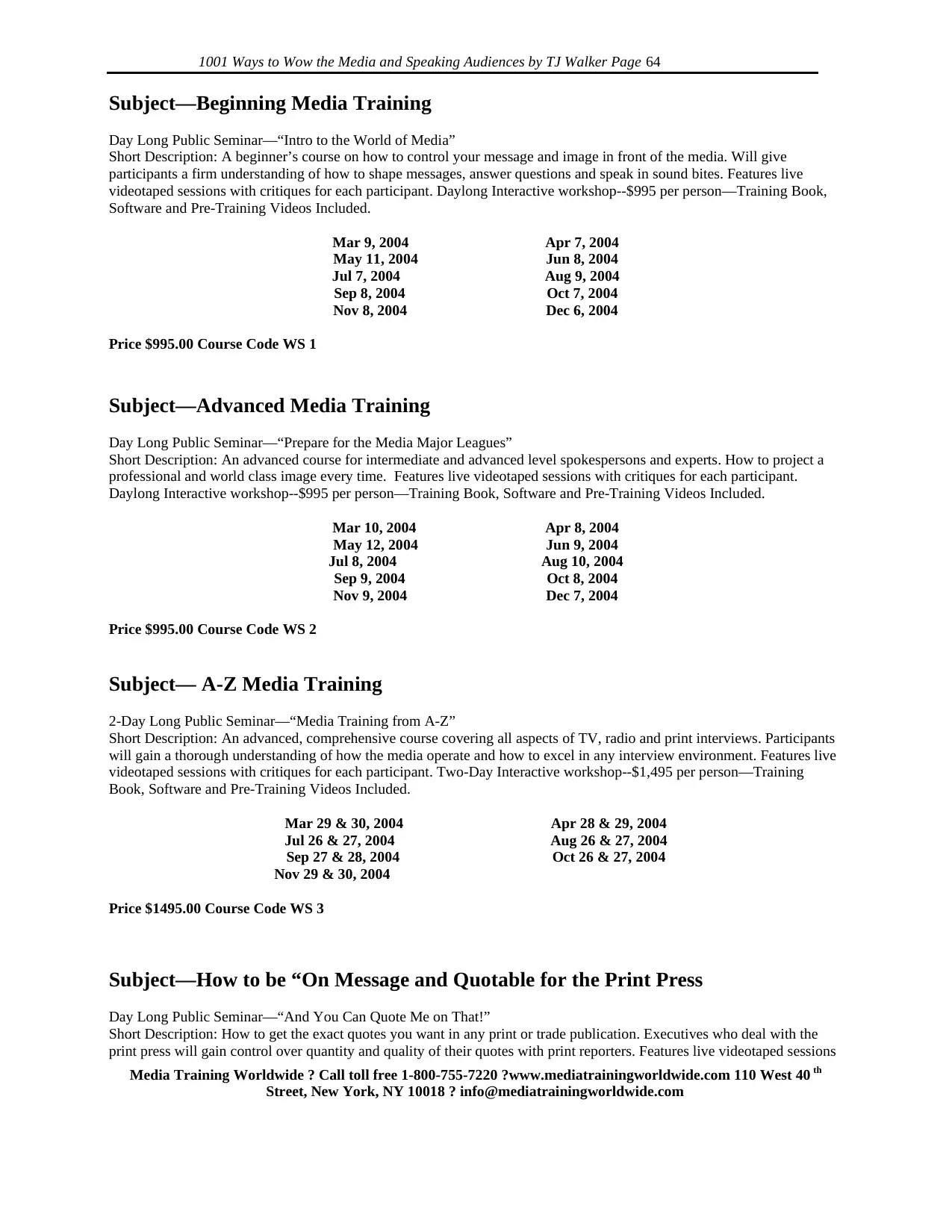
1001 Ways to Wow the Media and Speaking Audiences by TJ Walker Page 64
Media Training Worldwide ? Call toll free 1-800-755-7220 ?www.mediatrainingworldwide.com 110 West 40 th
Street, New York, NY 10018 ? info@mediatrainingworldwide.com
Subject—Beginning Media Training
Day Long Public Seminar—“Intro to the World of Media”
Short Description: A beginner’s course on how to control your message and image in front of the media. Will give
participants a firm understanding of how to shape messages, answer questions and speak in sound bites. Features live
videotaped sessions with critiques for each participant. Daylong Interactive workshop--$995 per person—Training Book,
Software and Pre-Training Videos Included.
Mar 9, 2004 Apr 7, 2004
May 11, 2004 Jun 8, 2004
Jul 7, 2004 Aug 9, 2004
Sep 8, 2004 Oct 7, 2004
Nov 8, 2004 Dec 6, 2004
Price $995.00 Course Code WS 1
Subject—Advanced Media Training
Day Long Public Seminar—“Prepare for the Media Major Leagues”
Short Description: An advanced course for intermediate and advanced level spokespersons and experts. How to project a
professional and world class image every time. Features live videotaped sessions with critiques for each participant.
Daylong Interactive workshop--$995 per person—Training Book, Software and Pre-Training Videos Included.
Mar 10, 2004 Apr 8, 2004
May 12, 2004 Jun 9, 2004
Jul 8, 2004 Aug 10, 2004
Sep 9, 2004 Oct 8, 2004
Nov 9, 2004 Dec 7, 2004
Price $995.00 Course Code WS 2
Subject— A-Z Media Training
2-Day Long Public Seminar—“Media Training from A-Z”
Short Description: An advanced, comprehensive course covering all aspects of TV, radio and print interviews. Participants
will gain a thorough understanding of how the media operate and how to excel in any interview environment. Features live
videotaped sessions with critiques for each participant. Two-Day Interactive workshop--$1,495 per person—Training
Book, Software and Pre-Training Videos Included.
Mar 29 & 30, 2004 Apr 28 & 29, 2004
Jul 26 & 27, 2004 Aug 26 & 27, 2004
Sep 27 & 28, 2004 Oct 26 & 27, 2004
Nov 29 & 30, 2004
Price $1495.00 Course Code WS 3
Subject—How to be “On Message and Quotable for the Print Press
Day Long Public Seminar—“And You Can Quote Me on That!”
Short Description: How to get the exact quotes you want in any print or trade publication. Executives who deal with the
print press will gain control over quantity and quality of their quotes with print reporters. Features live videotaped sessions
Media Training Worldwide ? Call toll free 1-800-755-7220 ?www.mediatrainingworldwide.com 110 West 40 th
Street, New York, NY 10018 ? info@mediatrainingworldwide.com
Subject—Beginning Media Training
Day Long Public Seminar—“Intro to the World of Media”
Short Description: A beginner’s course on how to control your message and image in front of the media. Will give
participants a firm understanding of how to shape messages, answer questions and speak in sound bites. Features live
videotaped sessions with critiques for each participant. Daylong Interactive workshop--$995 per person—Training Book,
Software and Pre-Training Videos Included.
Mar 9, 2004 Apr 7, 2004
May 11, 2004 Jun 8, 2004
Jul 7, 2004 Aug 9, 2004
Sep 8, 2004 Oct 7, 2004
Nov 8, 2004 Dec 6, 2004
Price $995.00 Course Code WS 1
Subject—Advanced Media Training
Day Long Public Seminar—“Prepare for the Media Major Leagues”
Short Description: An advanced course for intermediate and advanced level spokespersons and experts. How to project a
professional and world class image every time. Features live videotaped sessions with critiques for each participant.
Daylong Interactive workshop--$995 per person—Training Book, Software and Pre-Training Videos Included.
Mar 10, 2004 Apr 8, 2004
May 12, 2004 Jun 9, 2004
Jul 8, 2004 Aug 10, 2004
Sep 9, 2004 Oct 8, 2004
Nov 9, 2004 Dec 7, 2004
Price $995.00 Course Code WS 2
Subject— A-Z Media Training
2-Day Long Public Seminar—“Media Training from A-Z”
Short Description: An advanced, comprehensive course covering all aspects of TV, radio and print interviews. Participants
will gain a thorough understanding of how the media operate and how to excel in any interview environment. Features live
videotaped sessions with critiques for each participant. Two-Day Interactive workshop--$1,495 per person—Training
Book, Software and Pre-Training Videos Included.
Mar 29 & 30, 2004 Apr 28 & 29, 2004
Jul 26 & 27, 2004 Aug 26 & 27, 2004
Sep 27 & 28, 2004 Oct 26 & 27, 2004
Nov 29 & 30, 2004
Price $1495.00 Course Code WS 3
Subject—How to be “On Message and Quotable for the Print Press
Day Long Public Seminar—“And You Can Quote Me on That!”
Short Description: How to get the exact quotes you want in any print or trade publication. Executives who deal with the
print press will gain control over quantity and quality of their quotes with print reporters. Features live videotaped sessions
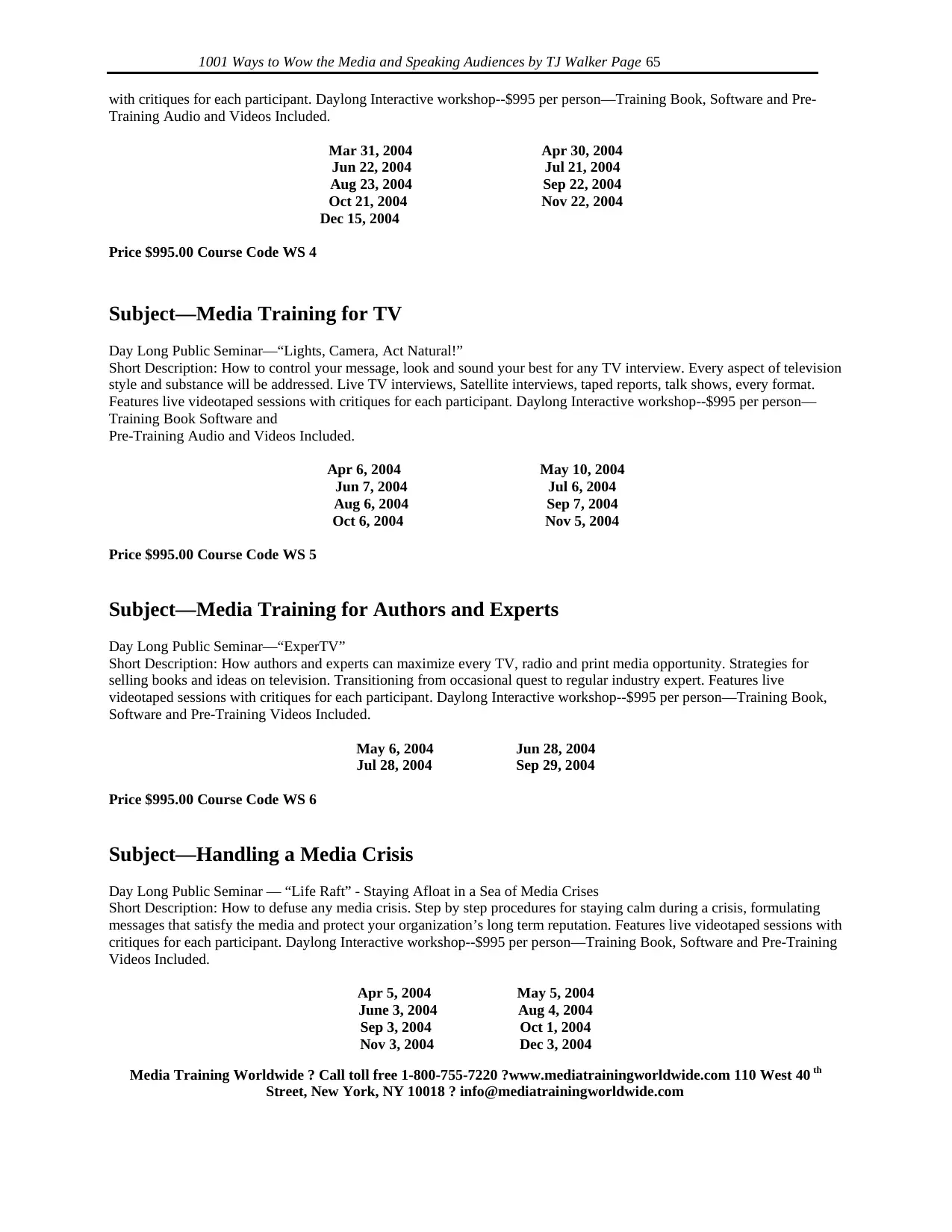
1001 Ways to Wow the Media and Speaking Audiences by TJ Walker Page 65
Media Training Worldwide ? Call toll free 1-800-755-7220 ?www.mediatrainingworldwide.com 110 West 40 th
Street, New York, NY 10018 ? info@mediatrainingworldwide.com
with critiques for each participant. Daylong Interactive workshop--$995 per person—Training Book, Software and Pre-
Training Audio and Videos Included.
Mar 31, 2004 Apr 30, 2004
Jun 22, 2004 Jul 21, 2004
Aug 23, 2004 Sep 22, 2004
Oct 21, 2004 Nov 22, 2004
Dec 15, 2004
Price $995.00 Course Code WS 4
Subject—Media Training for TV
Day Long Public Seminar—“Lights, Camera, Act Natural!”
Short Description: How to control your message, look and sound your best for any TV interview. Every aspect of television
style and substance will be addressed. Live TV interviews, Satellite interviews, taped reports, talk shows, every format.
Features live videotaped sessions with critiques for each participant. Daylong Interactive workshop--$995 per person—
Training Book Software and
Pre-Training Audio and Videos Included.
Apr 6, 2004 May 10, 2004
Jun 7, 2004 Jul 6, 2004
Aug 6, 2004 Sep 7, 2004
Oct 6, 2004 Nov 5, 2004
Price $995.00 Course Code WS 5
Subject—Media Training for Authors and Experts
Day Long Public Seminar—“ExperTV”
Short Description: How authors and experts can maximize every TV, radio and print media opportunity. Strategies for
selling books and ideas on television. Transitioning from occasional quest to regular industry expert. Features live
videotaped sessions with critiques for each participant. Daylong Interactive workshop--$995 per person—Training Book,
Software and Pre-Training Videos Included.
May 6, 2004 Jun 28, 2004
Jul 28, 2004 Sep 29, 2004
Price $995.00 Course Code WS 6
Subject—Handling a Media Crisis
Day Long Public Seminar — “Life Raft” - Staying Afloat in a Sea of Media Crises
Short Description: How to defuse any media crisis. Step by step procedures for staying calm during a crisis, formulating
messages that satisfy the media and protect your organization’s long term reputation. Features live videotaped sessions with
critiques for each participant. Daylong Interactive workshop--$995 per person—Training Book, Software and Pre-Training
Videos Included.
Apr 5, 2004 May 5, 2004
June 3, 2004 Aug 4, 2004
Sep 3, 2004 Oct 1, 2004
Nov 3, 2004 Dec 3, 2004
Media Training Worldwide ? Call toll free 1-800-755-7220 ?www.mediatrainingworldwide.com 110 West 40 th
Street, New York, NY 10018 ? info@mediatrainingworldwide.com
with critiques for each participant. Daylong Interactive workshop--$995 per person—Training Book, Software and Pre-
Training Audio and Videos Included.
Mar 31, 2004 Apr 30, 2004
Jun 22, 2004 Jul 21, 2004
Aug 23, 2004 Sep 22, 2004
Oct 21, 2004 Nov 22, 2004
Dec 15, 2004
Price $995.00 Course Code WS 4
Subject—Media Training for TV
Day Long Public Seminar—“Lights, Camera, Act Natural!”
Short Description: How to control your message, look and sound your best for any TV interview. Every aspect of television
style and substance will be addressed. Live TV interviews, Satellite interviews, taped reports, talk shows, every format.
Features live videotaped sessions with critiques for each participant. Daylong Interactive workshop--$995 per person—
Training Book Software and
Pre-Training Audio and Videos Included.
Apr 6, 2004 May 10, 2004
Jun 7, 2004 Jul 6, 2004
Aug 6, 2004 Sep 7, 2004
Oct 6, 2004 Nov 5, 2004
Price $995.00 Course Code WS 5
Subject—Media Training for Authors and Experts
Day Long Public Seminar—“ExperTV”
Short Description: How authors and experts can maximize every TV, radio and print media opportunity. Strategies for
selling books and ideas on television. Transitioning from occasional quest to regular industry expert. Features live
videotaped sessions with critiques for each participant. Daylong Interactive workshop--$995 per person—Training Book,
Software and Pre-Training Videos Included.
May 6, 2004 Jun 28, 2004
Jul 28, 2004 Sep 29, 2004
Price $995.00 Course Code WS 6
Subject—Handling a Media Crisis
Day Long Public Seminar — “Life Raft” - Staying Afloat in a Sea of Media Crises
Short Description: How to defuse any media crisis. Step by step procedures for staying calm during a crisis, formulating
messages that satisfy the media and protect your organization’s long term reputation. Features live videotaped sessions with
critiques for each participant. Daylong Interactive workshop--$995 per person—Training Book, Software and Pre-Training
Videos Included.
Apr 5, 2004 May 5, 2004
June 3, 2004 Aug 4, 2004
Sep 3, 2004 Oct 1, 2004
Nov 3, 2004 Dec 3, 2004
Paraphrase This Document
Need a fresh take? Get an instant paraphrase of this document with our AI Paraphraser
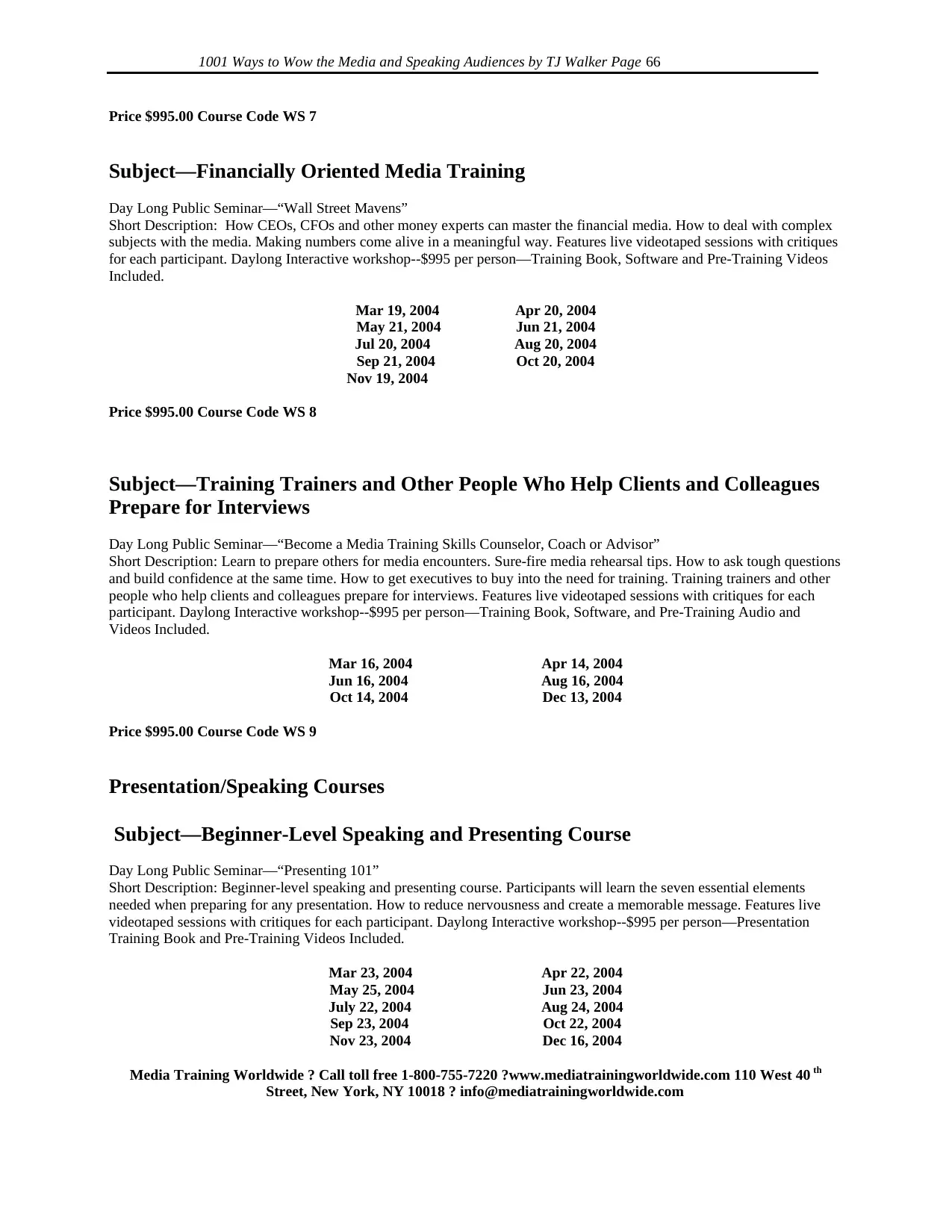
1001 Ways to Wow the Media and Speaking Audiences by TJ Walker Page 66
Media Training Worldwide ? Call toll free 1-800-755-7220 ?www.mediatrainingworldwide.com 110 West 40 th
Street, New York, NY 10018 ? info@mediatrainingworldwide.com
Price $995.00 Course Code WS 7
Subject—Financially Oriented Media Training
Day Long Public Seminar—“Wall Street Mavens”
Short Description: How CEOs, CFOs and other money experts can master the financial media. How to deal with complex
subjects with the media. Making numbers come alive in a meaningful way. Features live videotaped sessions with critiques
for each participant. Daylong Interactive workshop--$995 per person—Training Book, Software and Pre-Training Videos
Included.
Mar 19, 2004 Apr 20, 2004
May 21, 2004 Jun 21, 2004
Jul 20, 2004 Aug 20, 2004
Sep 21, 2004 Oct 20, 2004
Nov 19, 2004
Price $995.00 Course Code WS 8
Subject—Training Trainers and Other People Who Help Clients and Colleagues
Prepare for Interviews
Day Long Public Seminar—“Become a Media Training Skills Counselor, Coach or Advisor”
Short Description: Learn to prepare others for media encounters. Sure-fire media rehearsal tips. How to ask tough questions
and build confidence at the same time. How to get executives to buy into the need for training. Training trainers and other
people who help clients and colleagues prepare for interviews. Features live videotaped sessions with critiques for each
participant. Daylong Interactive workshop--$995 per person—Training Book, Software, and Pre-Training Audio and
Videos Included.
Mar 16, 2004 Apr 14, 2004
Jun 16, 2004 Aug 16, 2004
Oct 14, 2004 Dec 13, 2004
Price $995.00 Course Code WS 9
Presentation/Speaking Courses
Subject—Beginner-Level Speaking and Presenting Course
Day Long Public Seminar—“Presenting 101”
Short Description: Beginner-level speaking and presenting course. Participants will learn the seven essential elements
needed when preparing for any presentation. How to reduce nervousness and create a memorable message. Features live
videotaped sessions with critiques for each participant. Daylong Interactive workshop--$995 per person—Presentation
Training Book and Pre-Training Videos Included.
Mar 23, 2004 Apr 22, 2004
May 25, 2004 Jun 23, 2004
July 22, 2004 Aug 24, 2004
Sep 23, 2004 Oct 22, 2004
Nov 23, 2004 Dec 16, 2004
Media Training Worldwide ? Call toll free 1-800-755-7220 ?www.mediatrainingworldwide.com 110 West 40 th
Street, New York, NY 10018 ? info@mediatrainingworldwide.com
Price $995.00 Course Code WS 7
Subject—Financially Oriented Media Training
Day Long Public Seminar—“Wall Street Mavens”
Short Description: How CEOs, CFOs and other money experts can master the financial media. How to deal with complex
subjects with the media. Making numbers come alive in a meaningful way. Features live videotaped sessions with critiques
for each participant. Daylong Interactive workshop--$995 per person—Training Book, Software and Pre-Training Videos
Included.
Mar 19, 2004 Apr 20, 2004
May 21, 2004 Jun 21, 2004
Jul 20, 2004 Aug 20, 2004
Sep 21, 2004 Oct 20, 2004
Nov 19, 2004
Price $995.00 Course Code WS 8
Subject—Training Trainers and Other People Who Help Clients and Colleagues
Prepare for Interviews
Day Long Public Seminar—“Become a Media Training Skills Counselor, Coach or Advisor”
Short Description: Learn to prepare others for media encounters. Sure-fire media rehearsal tips. How to ask tough questions
and build confidence at the same time. How to get executives to buy into the need for training. Training trainers and other
people who help clients and colleagues prepare for interviews. Features live videotaped sessions with critiques for each
participant. Daylong Interactive workshop--$995 per person—Training Book, Software, and Pre-Training Audio and
Videos Included.
Mar 16, 2004 Apr 14, 2004
Jun 16, 2004 Aug 16, 2004
Oct 14, 2004 Dec 13, 2004
Price $995.00 Course Code WS 9
Presentation/Speaking Courses
Subject—Beginner-Level Speaking and Presenting Course
Day Long Public Seminar—“Presenting 101”
Short Description: Beginner-level speaking and presenting course. Participants will learn the seven essential elements
needed when preparing for any presentation. How to reduce nervousness and create a memorable message. Features live
videotaped sessions with critiques for each participant. Daylong Interactive workshop--$995 per person—Presentation
Training Book and Pre-Training Videos Included.
Mar 23, 2004 Apr 22, 2004
May 25, 2004 Jun 23, 2004
July 22, 2004 Aug 24, 2004
Sep 23, 2004 Oct 22, 2004
Nov 23, 2004 Dec 16, 2004
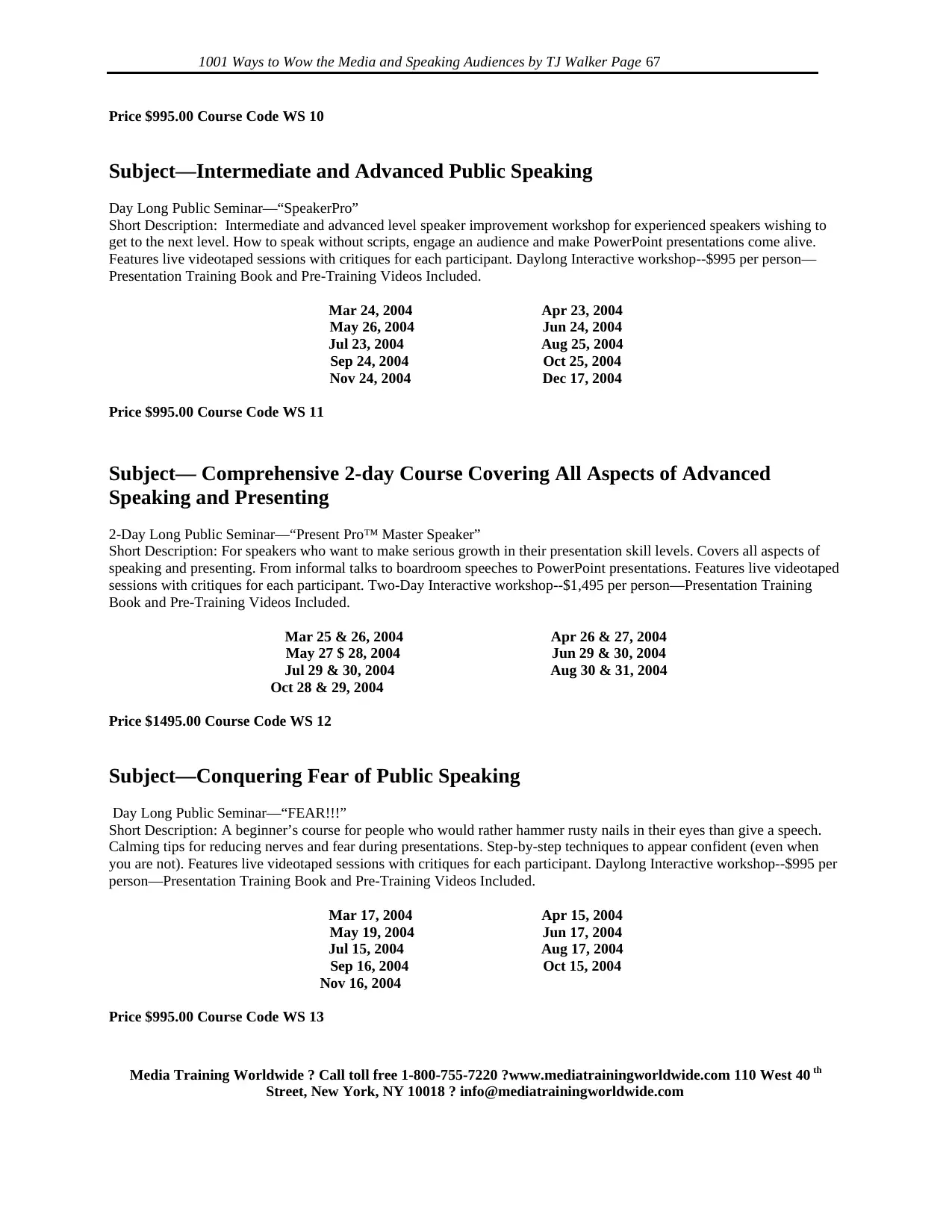
1001 Ways to Wow the Media and Speaking Audiences by TJ Walker Page 67
Media Training Worldwide ? Call toll free 1-800-755-7220 ?www.mediatrainingworldwide.com 110 West 40 th
Street, New York, NY 10018 ? info@mediatrainingworldwide.com
Price $995.00 Course Code WS 10
Subject—Intermediate and Advanced Public Speaking
Day Long Public Seminar—“SpeakerPro”
Short Description: Intermediate and advanced level speaker improvement workshop for experienced speakers wishing to
get to the next level. How to speak without scripts, engage an audience and make PowerPoint presentations come alive.
Features live videotaped sessions with critiques for each participant. Daylong Interactive workshop--$995 per person—
Presentation Training Book and Pre-Training Videos Included.
Mar 24, 2004 Apr 23, 2004
May 26, 2004 Jun 24, 2004
Jul 23, 2004 Aug 25, 2004
Sep 24, 2004 Oct 25, 2004
Nov 24, 2004 Dec 17, 2004
Price $995.00 Course Code WS 11
Subject— Comprehensive 2-day Course Covering All Aspects of Advanced
Speaking and Presenting
2-Day Long Public Seminar—“Present Pro™ Master Speaker”
Short Description: For speakers who want to make serious growth in their presentation skill levels. Covers all aspects of
speaking and presenting. From informal talks to boardroom speeches to PowerPoint presentations. Features live videotaped
sessions with critiques for each participant. Two-Day Interactive workshop--$1,495 per person—Presentation Training
Book and Pre-Training Videos Included.
Mar 25 & 26, 2004 Apr 26 & 27, 2004
May 27 $ 28, 2004 Jun 29 & 30, 2004
Jul 29 & 30, 2004 Aug 30 & 31, 2004
Oct 28 & 29, 2004
Price $1495.00 Course Code WS 12
Subject—Conquering Fear of Public Speaking
Day Long Public Seminar—“FEAR!!!”
Short Description: A beginner’s course for people who would rather hammer rusty nails in their eyes than give a speech.
Calming tips for reducing nerves and fear during presentations. Step-by-step techniques to appear confident (even when
you are not). Features live videotaped sessions with critiques for each participant. Daylong Interactive workshop--$995 per
person—Presentation Training Book and Pre-Training Videos Included.
Mar 17, 2004 Apr 15, 2004
May 19, 2004 Jun 17, 2004
Jul 15, 2004 Aug 17, 2004
Sep 16, 2004 Oct 15, 2004
Nov 16, 2004
Price $995.00 Course Code WS 13
Media Training Worldwide ? Call toll free 1-800-755-7220 ?www.mediatrainingworldwide.com 110 West 40 th
Street, New York, NY 10018 ? info@mediatrainingworldwide.com
Price $995.00 Course Code WS 10
Subject—Intermediate and Advanced Public Speaking
Day Long Public Seminar—“SpeakerPro”
Short Description: Intermediate and advanced level speaker improvement workshop for experienced speakers wishing to
get to the next level. How to speak without scripts, engage an audience and make PowerPoint presentations come alive.
Features live videotaped sessions with critiques for each participant. Daylong Interactive workshop--$995 per person—
Presentation Training Book and Pre-Training Videos Included.
Mar 24, 2004 Apr 23, 2004
May 26, 2004 Jun 24, 2004
Jul 23, 2004 Aug 25, 2004
Sep 24, 2004 Oct 25, 2004
Nov 24, 2004 Dec 17, 2004
Price $995.00 Course Code WS 11
Subject— Comprehensive 2-day Course Covering All Aspects of Advanced
Speaking and Presenting
2-Day Long Public Seminar—“Present Pro™ Master Speaker”
Short Description: For speakers who want to make serious growth in their presentation skill levels. Covers all aspects of
speaking and presenting. From informal talks to boardroom speeches to PowerPoint presentations. Features live videotaped
sessions with critiques for each participant. Two-Day Interactive workshop--$1,495 per person—Presentation Training
Book and Pre-Training Videos Included.
Mar 25 & 26, 2004 Apr 26 & 27, 2004
May 27 $ 28, 2004 Jun 29 & 30, 2004
Jul 29 & 30, 2004 Aug 30 & 31, 2004
Oct 28 & 29, 2004
Price $1495.00 Course Code WS 12
Subject—Conquering Fear of Public Speaking
Day Long Public Seminar—“FEAR!!!”
Short Description: A beginner’s course for people who would rather hammer rusty nails in their eyes than give a speech.
Calming tips for reducing nerves and fear during presentations. Step-by-step techniques to appear confident (even when
you are not). Features live videotaped sessions with critiques for each participant. Daylong Interactive workshop--$995 per
person—Presentation Training Book and Pre-Training Videos Included.
Mar 17, 2004 Apr 15, 2004
May 19, 2004 Jun 17, 2004
Jul 15, 2004 Aug 17, 2004
Sep 16, 2004 Oct 15, 2004
Nov 16, 2004
Price $995.00 Course Code WS 13
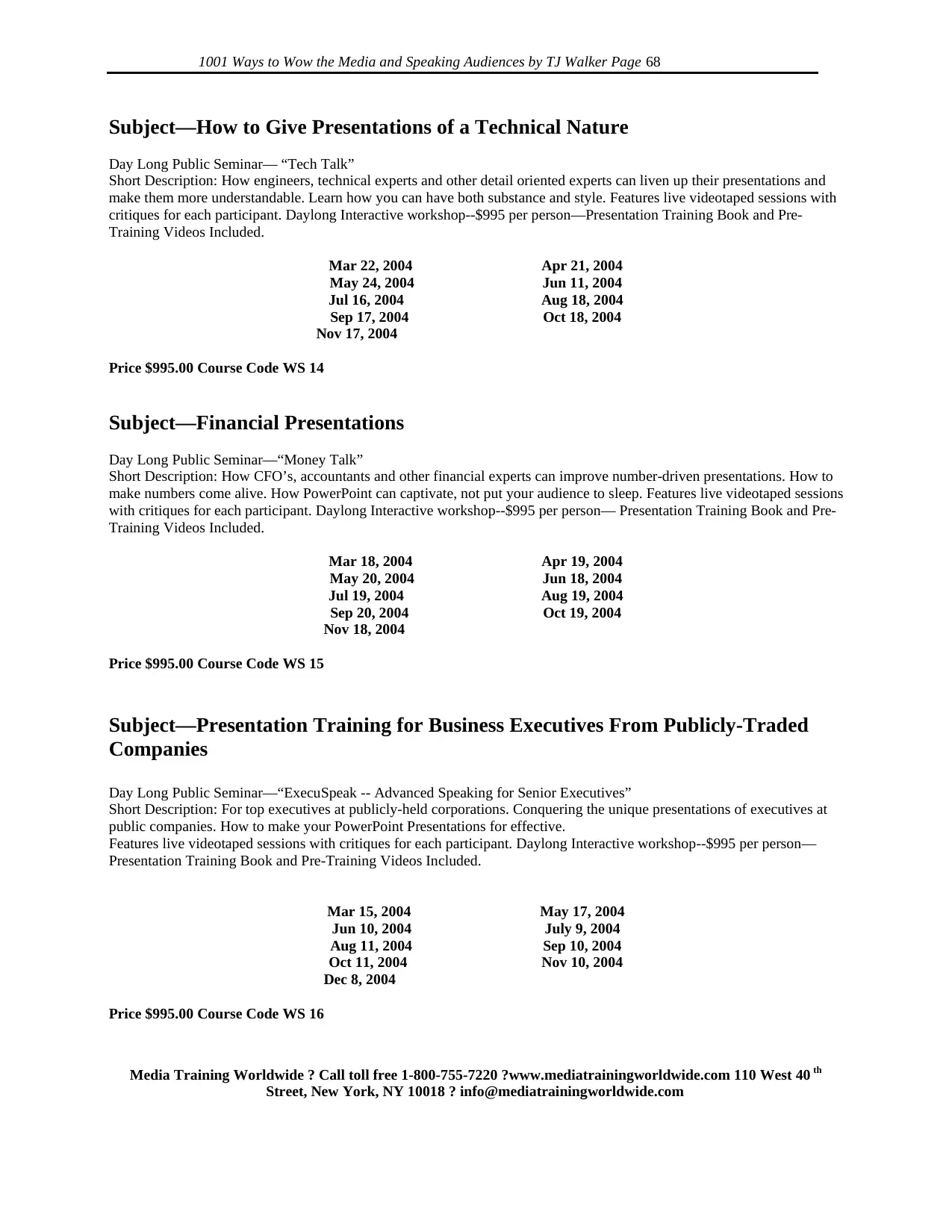
1001 Ways to Wow the Media and Speaking Audiences by TJ Walker Page 68
Media Training Worldwide ? Call toll free 1-800-755-7220 ?www.mediatrainingworldwide.com 110 West 40 th
Street, New York, NY 10018 ? info@mediatrainingworldwide.com
Subject—How to Give Presentations of a Technical Nature
Day Long Public Seminar— “Tech Talk”
Short Description: How engineers, technical experts and other detail oriented experts can liven up their presentations and
make them more understandable. Learn how you can have both substance and style. Features live videotaped sessions with
critiques for each participant. Daylong Interactive workshop--$995 per person—Presentation Training Book and Pre-
Training Videos Included.
Mar 22, 2004 Apr 21, 2004
May 24, 2004 Jun 11, 2004
Jul 16, 2004 Aug 18, 2004
Sep 17, 2004 Oct 18, 2004
Nov 17, 2004
Price $995.00 Course Code WS 14
Subject—Financial Presentations
Day Long Public Seminar—“Money Talk”
Short Description: How CFO’s, accountants and other financial experts can improve number-driven presentations. How to
make numbers come alive. How PowerPoint can captivate, not put your audience to sleep. Features live videotaped sessions
with critiques for each participant. Daylong Interactive workshop--$995 per person— Presentation Training Book and Pre-
Training Videos Included.
Mar 18, 2004 Apr 19, 2004
May 20, 2004 Jun 18, 2004
Jul 19, 2004 Aug 19, 2004
Sep 20, 2004 Oct 19, 2004
Nov 18, 2004
Price $995.00 Course Code WS 15
Subject—Presentation Training for Business Executives From Publicly-Traded
Companies
Day Long Public Seminar—“ExecuSpeak -- Advanced Speaking for Senior Executives”
Short Description: For top executives at publicly-held corporations. Conquering the unique presentations of executives at
public companies. How to make your PowerPoint Presentations for effective.
Features live videotaped sessions with critiques for each participant. Daylong Interactive workshop--$995 per person—
Presentation Training Book and Pre-Training Videos Included.
Mar 15, 2004 May 17, 2004
Jun 10, 2004 July 9, 2004
Aug 11, 2004 Sep 10, 2004
Oct 11, 2004 Nov 10, 2004
Dec 8, 2004
Price $995.00 Course Code WS 16
Media Training Worldwide ? Call toll free 1-800-755-7220 ?www.mediatrainingworldwide.com 110 West 40 th
Street, New York, NY 10018 ? info@mediatrainingworldwide.com
Subject—How to Give Presentations of a Technical Nature
Day Long Public Seminar— “Tech Talk”
Short Description: How engineers, technical experts and other detail oriented experts can liven up their presentations and
make them more understandable. Learn how you can have both substance and style. Features live videotaped sessions with
critiques for each participant. Daylong Interactive workshop--$995 per person—Presentation Training Book and Pre-
Training Videos Included.
Mar 22, 2004 Apr 21, 2004
May 24, 2004 Jun 11, 2004
Jul 16, 2004 Aug 18, 2004
Sep 17, 2004 Oct 18, 2004
Nov 17, 2004
Price $995.00 Course Code WS 14
Subject—Financial Presentations
Day Long Public Seminar—“Money Talk”
Short Description: How CFO’s, accountants and other financial experts can improve number-driven presentations. How to
make numbers come alive. How PowerPoint can captivate, not put your audience to sleep. Features live videotaped sessions
with critiques for each participant. Daylong Interactive workshop--$995 per person— Presentation Training Book and Pre-
Training Videos Included.
Mar 18, 2004 Apr 19, 2004
May 20, 2004 Jun 18, 2004
Jul 19, 2004 Aug 19, 2004
Sep 20, 2004 Oct 19, 2004
Nov 18, 2004
Price $995.00 Course Code WS 15
Subject—Presentation Training for Business Executives From Publicly-Traded
Companies
Day Long Public Seminar—“ExecuSpeak -- Advanced Speaking for Senior Executives”
Short Description: For top executives at publicly-held corporations. Conquering the unique presentations of executives at
public companies. How to make your PowerPoint Presentations for effective.
Features live videotaped sessions with critiques for each participant. Daylong Interactive workshop--$995 per person—
Presentation Training Book and Pre-Training Videos Included.
Mar 15, 2004 May 17, 2004
Jun 10, 2004 July 9, 2004
Aug 11, 2004 Sep 10, 2004
Oct 11, 2004 Nov 10, 2004
Dec 8, 2004
Price $995.00 Course Code WS 16
Secure Best Marks with AI Grader
Need help grading? Try our AI Grader for instant feedback on your assignments.
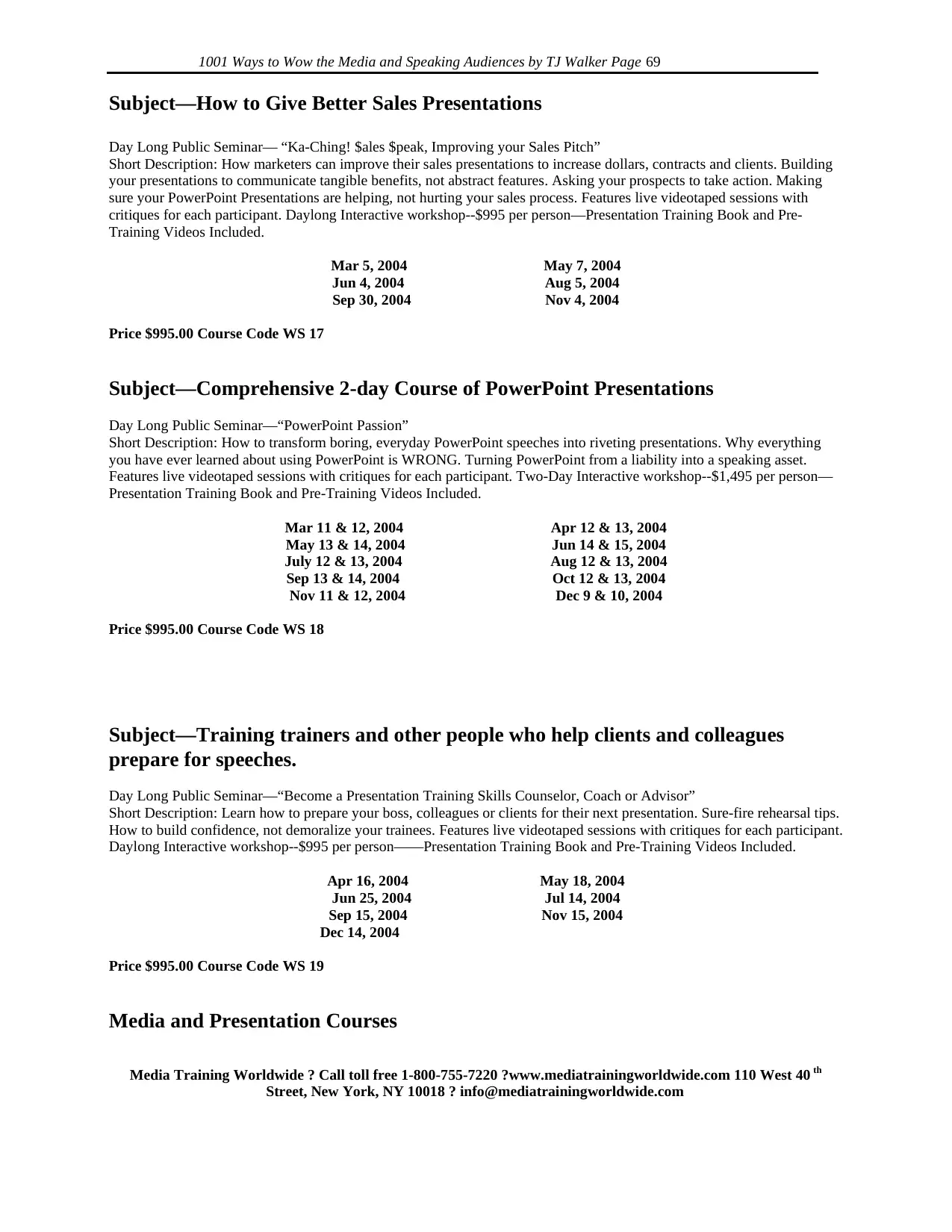
1001 Ways to Wow the Media and Speaking Audiences by TJ Walker Page 69
Media Training Worldwide ? Call toll free 1-800-755-7220 ?www.mediatrainingworldwide.com 110 West 40 th
Street, New York, NY 10018 ? info@mediatrainingworldwide.com
Subject—How to Give Better Sales Presentations
Day Long Public Seminar— “Ka-Ching! $ales $peak, Improving your Sales Pitch”
Short Description: How marketers can improve their sales presentations to increase dollars, contracts and clients. Building
your presentations to communicate tangible benefits, not abstract features. Asking your prospects to take action. Making
sure your PowerPoint Presentations are helping, not hurting your sales process. Features live videotaped sessions with
critiques for each participant. Daylong Interactive workshop--$995 per person—Presentation Training Book and Pre-
Training Videos Included.
Mar 5, 2004 May 7, 2004
Jun 4, 2004 Aug 5, 2004
Sep 30, 2004 Nov 4, 2004
Price $995.00 Course Code WS 17
Subject—Comprehensive 2-day Course of PowerPoint Presentations
Day Long Public Seminar—“PowerPoint Passion”
Short Description: How to transform boring, everyday PowerPoint speeches into riveting presentations. Why everything
you have ever learned about using PowerPoint is WRONG. Turning PowerPoint from a liability into a speaking asset.
Features live videotaped sessions with critiques for each participant. Two-Day Interactive workshop--$1,495 per person—
Presentation Training Book and Pre-Training Videos Included.
Mar 11 & 12, 2004 Apr 12 & 13, 2004
May 13 & 14, 2004 Jun 14 & 15, 2004
July 12 & 13, 2004 Aug 12 & 13, 2004
Sep 13 & 14, 2004 Oct 12 & 13, 2004
Nov 11 & 12, 2004 Dec 9 & 10, 2004
Price $995.00 Course Code WS 18
Subject—Training trainers and other people who help clients and colleagues
prepare for speeches.
Day Long Public Seminar—“Become a Presentation Training Skills Counselor, Coach or Advisor”
Short Description: Learn how to prepare your boss, colleagues or clients for their next presentation. Sure-fire rehearsal tips.
How to build confidence, not demoralize your trainees. Features live videotaped sessions with critiques for each participant.
Daylong Interactive workshop--$995 per person——Presentation Training Book and Pre-Training Videos Included.
Apr 16, 2004 May 18, 2004
Jun 25, 2004 Jul 14, 2004
Sep 15, 2004 Nov 15, 2004
Dec 14, 2004
Price $995.00 Course Code WS 19
Media and Presentation Courses
Media Training Worldwide ? Call toll free 1-800-755-7220 ?www.mediatrainingworldwide.com 110 West 40 th
Street, New York, NY 10018 ? info@mediatrainingworldwide.com
Subject—How to Give Better Sales Presentations
Day Long Public Seminar— “Ka-Ching! $ales $peak, Improving your Sales Pitch”
Short Description: How marketers can improve their sales presentations to increase dollars, contracts and clients. Building
your presentations to communicate tangible benefits, not abstract features. Asking your prospects to take action. Making
sure your PowerPoint Presentations are helping, not hurting your sales process. Features live videotaped sessions with
critiques for each participant. Daylong Interactive workshop--$995 per person—Presentation Training Book and Pre-
Training Videos Included.
Mar 5, 2004 May 7, 2004
Jun 4, 2004 Aug 5, 2004
Sep 30, 2004 Nov 4, 2004
Price $995.00 Course Code WS 17
Subject—Comprehensive 2-day Course of PowerPoint Presentations
Day Long Public Seminar—“PowerPoint Passion”
Short Description: How to transform boring, everyday PowerPoint speeches into riveting presentations. Why everything
you have ever learned about using PowerPoint is WRONG. Turning PowerPoint from a liability into a speaking asset.
Features live videotaped sessions with critiques for each participant. Two-Day Interactive workshop--$1,495 per person—
Presentation Training Book and Pre-Training Videos Included.
Mar 11 & 12, 2004 Apr 12 & 13, 2004
May 13 & 14, 2004 Jun 14 & 15, 2004
July 12 & 13, 2004 Aug 12 & 13, 2004
Sep 13 & 14, 2004 Oct 12 & 13, 2004
Nov 11 & 12, 2004 Dec 9 & 10, 2004
Price $995.00 Course Code WS 18
Subject—Training trainers and other people who help clients and colleagues
prepare for speeches.
Day Long Public Seminar—“Become a Presentation Training Skills Counselor, Coach or Advisor”
Short Description: Learn how to prepare your boss, colleagues or clients for their next presentation. Sure-fire rehearsal tips.
How to build confidence, not demoralize your trainees. Features live videotaped sessions with critiques for each participant.
Daylong Interactive workshop--$995 per person——Presentation Training Book and Pre-Training Videos Included.
Apr 16, 2004 May 18, 2004
Jun 25, 2004 Jul 14, 2004
Sep 15, 2004 Nov 15, 2004
Dec 14, 2004
Price $995.00 Course Code WS 19
Media and Presentation Courses
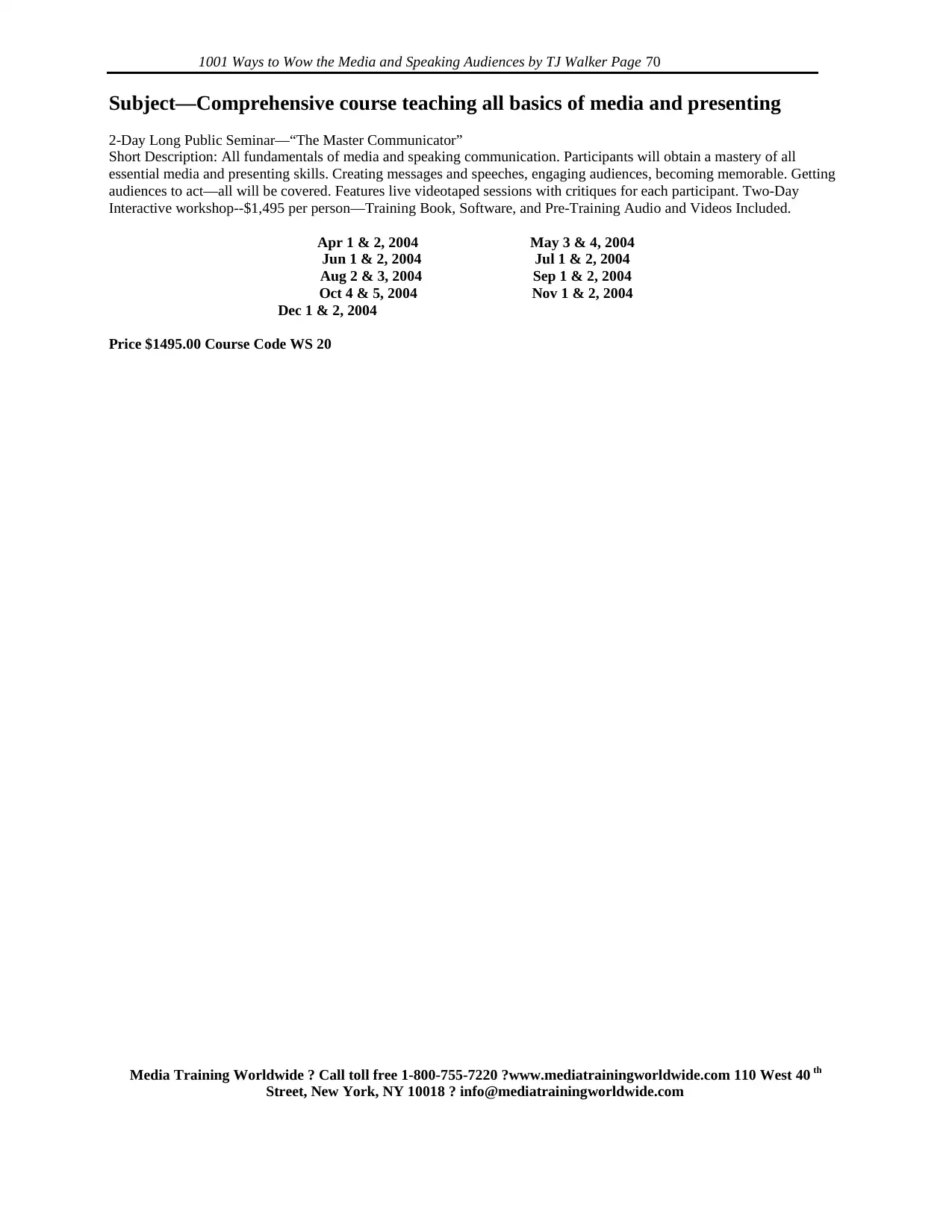
1001 Ways to Wow the Media and Speaking Audiences by TJ Walker Page 70
Media Training Worldwide ? Call toll free 1-800-755-7220 ?www.mediatrainingworldwide.com 110 West 40 th
Street, New York, NY 10018 ? info@mediatrainingworldwide.com
Subject—Comprehensive course teaching all basics of media and presenting
2-Day Long Public Seminar—“The Master Communicator”
Short Description: All fundamentals of media and speaking communication. Participants will obtain a mastery of all
essential media and presenting skills. Creating messages and speeches, engaging audiences, becoming memorable. Getting
audiences to act—all will be covered. Features live videotaped sessions with critiques for each participant. Two-Day
Interactive workshop--$1,495 per person—Training Book, Software, and Pre-Training Audio and Videos Included.
Apr 1 & 2, 2004 May 3 & 4, 2004
Jun 1 & 2, 2004 Jul 1 & 2, 2004
Aug 2 & 3, 2004 Sep 1 & 2, 2004
Oct 4 & 5, 2004 Nov 1 & 2, 2004
Dec 1 & 2, 2004
Price $1495.00 Course Code WS 20
Media Training Worldwide ? Call toll free 1-800-755-7220 ?www.mediatrainingworldwide.com 110 West 40 th
Street, New York, NY 10018 ? info@mediatrainingworldwide.com
Subject—Comprehensive course teaching all basics of media and presenting
2-Day Long Public Seminar—“The Master Communicator”
Short Description: All fundamentals of media and speaking communication. Participants will obtain a mastery of all
essential media and presenting skills. Creating messages and speeches, engaging audiences, becoming memorable. Getting
audiences to act—all will be covered. Features live videotaped sessions with critiques for each participant. Two-Day
Interactive workshop--$1,495 per person—Training Book, Software, and Pre-Training Audio and Videos Included.
Apr 1 & 2, 2004 May 3 & 4, 2004
Jun 1 & 2, 2004 Jul 1 & 2, 2004
Aug 2 & 3, 2004 Sep 1 & 2, 2004
Oct 4 & 5, 2004 Nov 1 & 2, 2004
Dec 1 & 2, 2004
Price $1495.00 Course Code WS 20
1 out of 72
Your All-in-One AI-Powered Toolkit for Academic Success.
+13062052269
info@desklib.com
Available 24*7 on WhatsApp / Email
![[object Object]](/_next/static/media/star-bottom.7253800d.svg)
Unlock your academic potential
© 2024 | Zucol Services PVT LTD | All rights reserved.